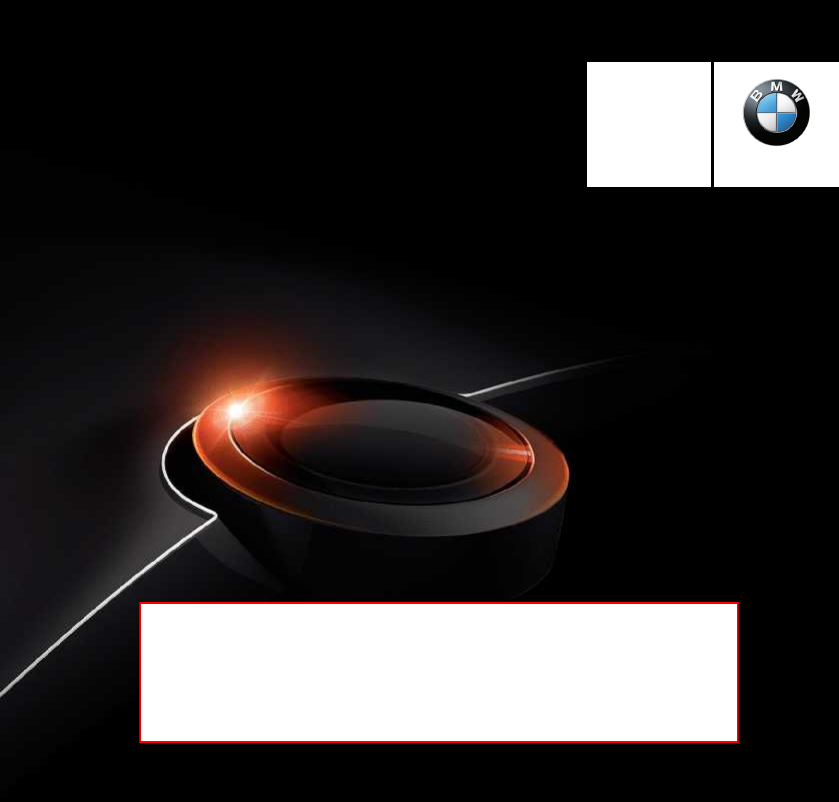Harman Becker Automotive Systems B140 Car Head Unit NBT EVO HU User Manual Manual
Harman Becker Automotive Systems Car Head Unit NBT EVO HU Manual
Contents
- 1. Manual
- 2. License Texts and Certifications
Manual

Navigation, Entertainment, Communication Owner's
Handbook
Congratulations on your choice of a BMW.
The more familiar you are with the systems of your BMW, the
more you can master their operation. We would therefore like to
offer you the following advice:
Please read the Owner's Handbook before setting out in your new
BMW. Also use the integrated Owner's Handbook in your vehicle.
It contains important notes on how to operate your Navigation,
Entertainment, Communications systems, enabling you to derive
maximum benefit from the technical advantages of these sys
tems.
Updates to the printed or integrated Owner's Handbook after go
ing to press are located as needed in the appendix to the printed
quick reference to the vehicle.
Supplementary information is provided in the other documents of
on-board literature.
We wish you a safe and enjoyable journey,
BMW AG
Online Edition for Part no. 01 40 2 912 836 - 07 12 510

© 2012 Bayerische Motoren Werke
Aktiengesellschaft
Munich, Germany
Not to be reproduced, wholly or in part, without written
permission from BMW AG, Munich.
English VI/12, 07 12 510
Printed on environmentally friendly paper, bleached
without chlorine, suitable for recycling.
Online Edition for Part no. 01 40 2 912 836 - 07 12 510
Contents
For quick access to a particular topic or item,
please consult the detailed alphabetical index,
see page 132.
Navigation
8Navigation system
9Destination input
18 Route guidance
21 Map view
24 Traffic information
27 Navigation data
28 What to do if...
Entertainment
32 Sound
35 Radio
41 CD/DVD
49 Music collection
56 External devices
64 Television, TV
68 Audio remote control in the rear
69 Rear entertainment
Communication
78 Telephone
88 Office
99 Contacts
102 ConnectedDrive
112 Extended BMW Online services
113 Rear telephone
Reference
132 From A to Z
Online Edition for Part no. 01 40 2 912 836 - 07 12 510
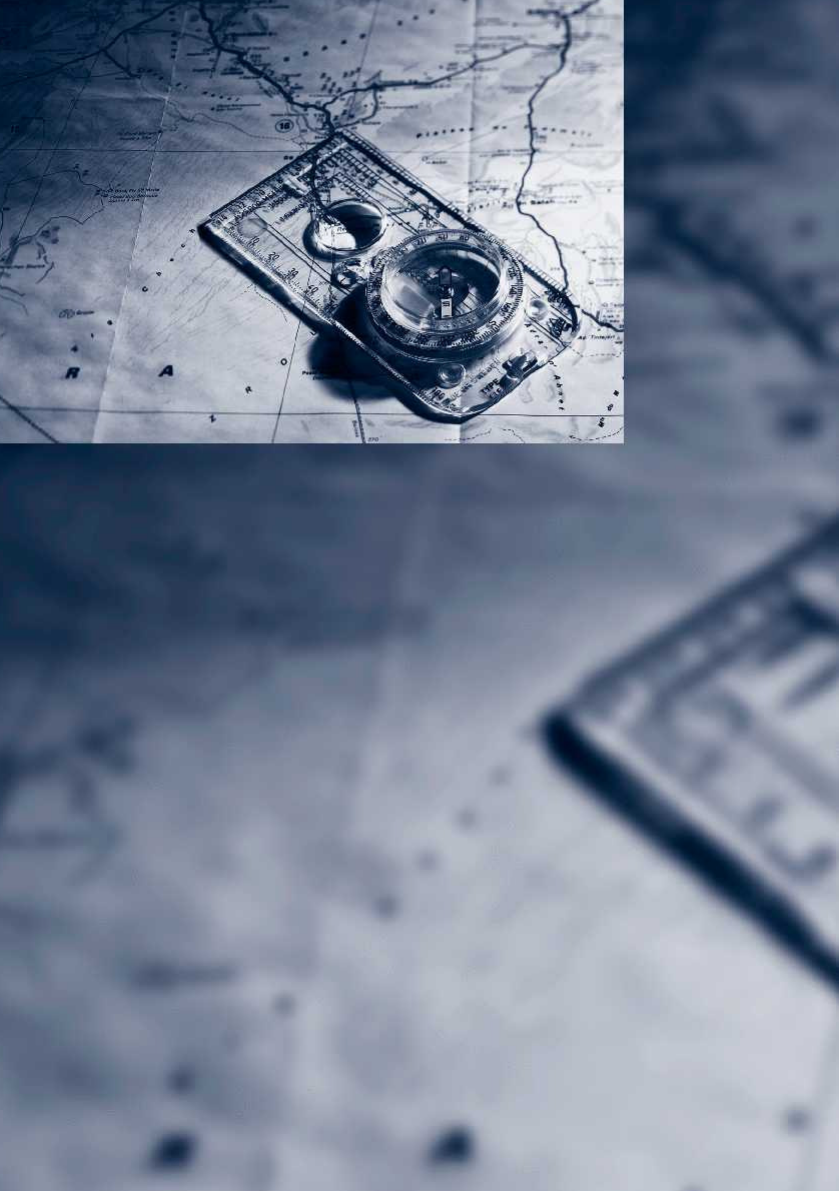
Online Edition for Part no. 01 40 2 912 836 - 07 12 510
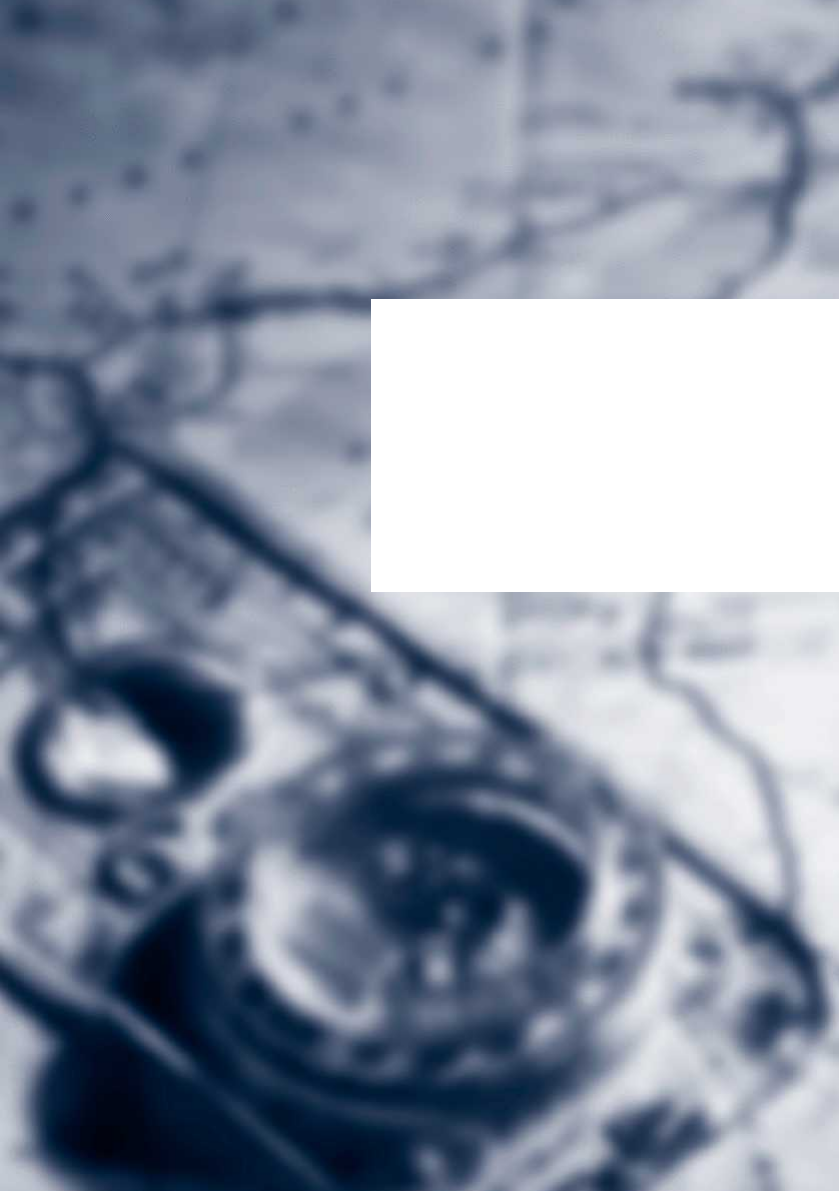
Navigation
Various examples of how the navigation system
reliably guides you to your destination are shown
here.
Online Edition for Part no. 01 40 2 912 836 - 07 12 510
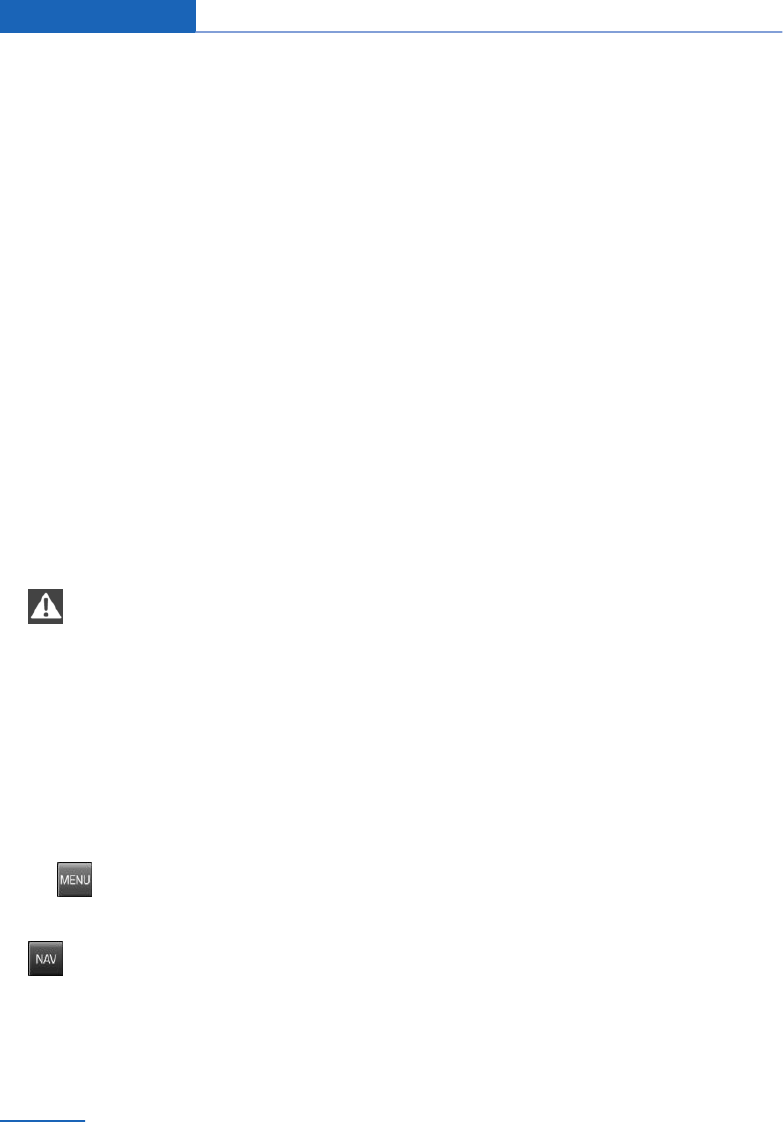
Navigation system
Vehicle Equipment
This chapter describes all standard, national and
special equipment provided in the model series.
Therefore equipment not available in a vehicle is
also described, for example the selected special
equipment or national version. That also applies
to safety-relevant functions and systems.
General
The navigation system can determine the pre
cise position of the vehicle by means of satellites
and vehicle sensors and guide you reliably to any
specified destination.
Navigation data is saved in the vehicle and can
be updated.
Note
Inputs when the vehicle is stationary
Only enter data when the car is stationary,
and always obey the traffic regulations and road
signs in the event of any contradiction between
the traffic situation and the instructions given by
the navigation system. You could otherwise
commit an offence and put vehicle occupants
and other road users at risk.◀
Call up navigation system
1. Press the button on the controller.
2. "Navigation"
The navigation system can also be directly
called up with the button on the controller.
Seite 8
Navigation Navigation system
8Online Edition for Part no. 01 40 2 912 836 - 07 12 510
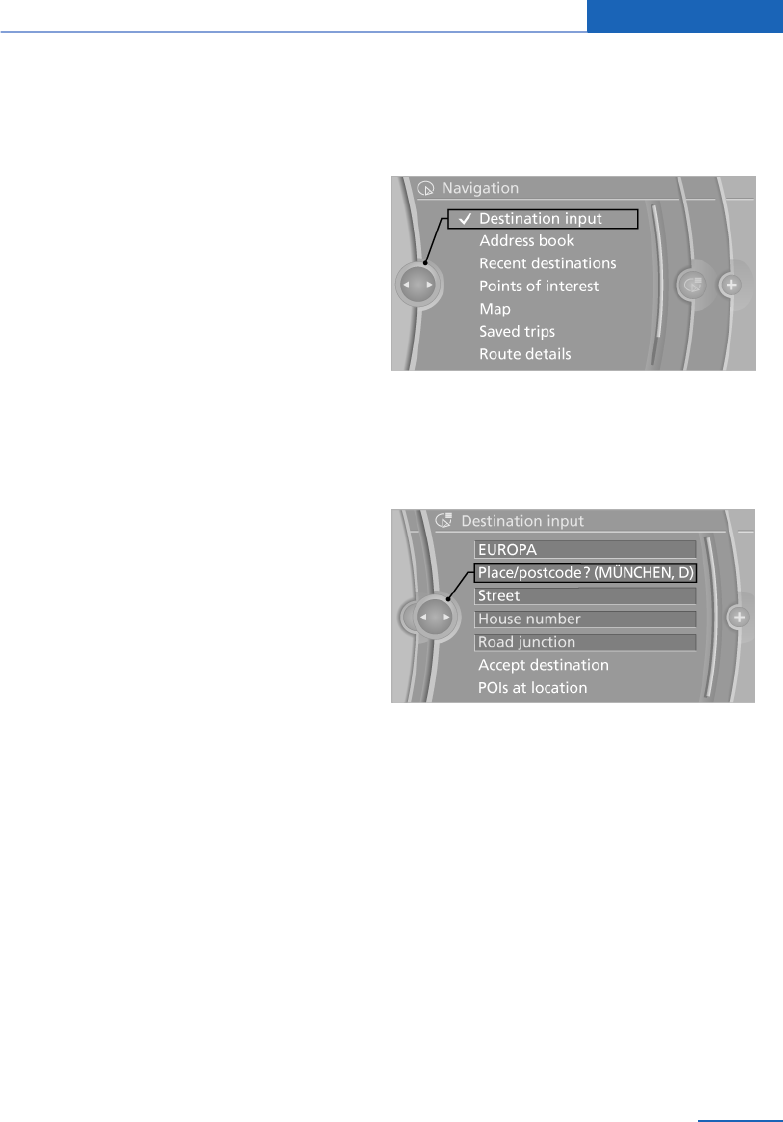
Destination input
Vehicle Equipment
This chapter describes all standard, national and
special equipment provided in the model series.
Therefore equipment not available in a vehicle is
also described, for example the selected special
equipment or national version. That also applies
to safety-relevant functions and systems.
Manual destination input
General
When you are entering a town/city or street
name, the system supports you, for example,
with automatic name completion.
Saved town/city and street names can be called
up quickly.
▷You can skip input of the country, town or
city if you wish to retain previous inputs.
▷If only the town/city has been entered, route
guidance to the town/city centre is started.
▷If part of an address is not entered or not
uniquely entered, a list with corresponding
selections is shown when the destination is
accepted. If cities or address are present
more than once, these are shown in split
screen.
For information on the split screen, see
Owner's Handbook for the vehicle.
Country input
1. "Navigation"
2. "Destination input"
3. Select "Country" or the country displayed.
Entering a town/city
1. Select "Place/postcode" or the town/city
displayed.
2. Select letters, if applicable.
The list is gradually narrowed down with
each input.
3. Tilt the controller to the right.
4. Select the name of a town/city from the list.
If there are several places with the same name:
1. Move to the list of place names.
2. Select the town/city.
Entering the postcode
1. Select "Place/postcode" or the town/city
displayed.
2. Select digits.
Seite 9
Destination input Navigation
9
Online Edition for Part no. 01 40 2 912 836 - 07 12 510
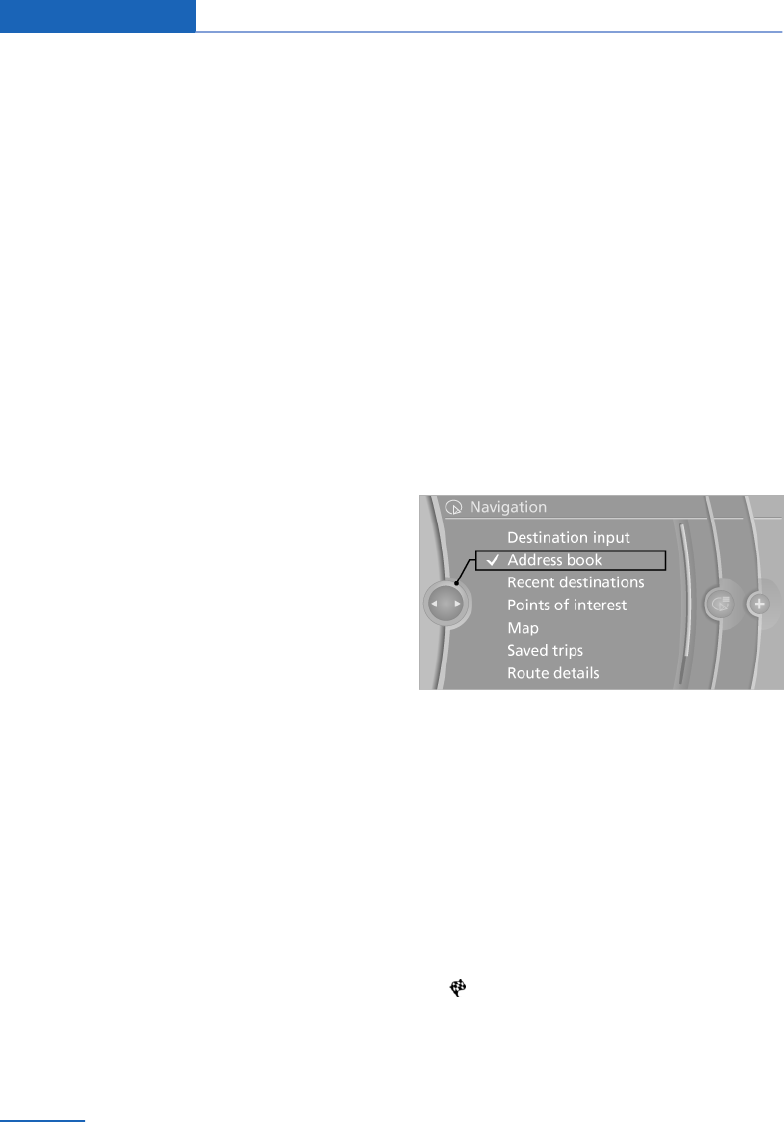
3. Move to the list of postcodes and towns/cit
ies.
4. Select an entry.
Entering a house number and street
1. Select "Street" or the displayed street.
2. Enter street in the same way as town/city.
3. "House number"
4. Select digits.
5. Move to the list of house numbers.
6. Select the house number or a range of house
numbers.
Alternative: entering a street and
junction
1. Select "Street" or the displayed street.
2. Enter the street or junction in the same way
as the town/city.
If there are several streets with the same name:
1. Move to the list of street names.
2. Select the street.
Searching by street
The desired road/street is not in the entered
town/city because it is part of another city dis
trict.
1. "Navigation"
2. "Destination input"
3. Select "Street" or the displayed street.
4. Move to the list of street names.
5. "In" select country listed.
All the roads/streets of the selected country
are offered. The respective town or city is
shown after the street name.
6. Select the letters.
7. Move to the list of street names.
8. Select the street.
Starting route guidance
1. "Accept destination"
2. "Start guidance" or "Add as another
destination"
Enter, see page 16, destination as a fur
ther destination.
Address book
Selecting a destination from the
address book
1. "Navigation"
2. "Address book"
Contacts with addresses are displayed if
these addresses for the contacts have been
checked as destinations.
3. Select a contact from the list or use "A-Z
search".
4. Where applicable, "Work address" or
"Home address"
Saving a destination in the address
book
After destination input, save the destination in
the address book.
1. "Navigation"
2. "Map"
3. "Guidance"
4. Call up "Options".
Seite 10
Navigation Destination input
10 Online Edition for Part no. 01 40 2 912 836 - 07 12 510
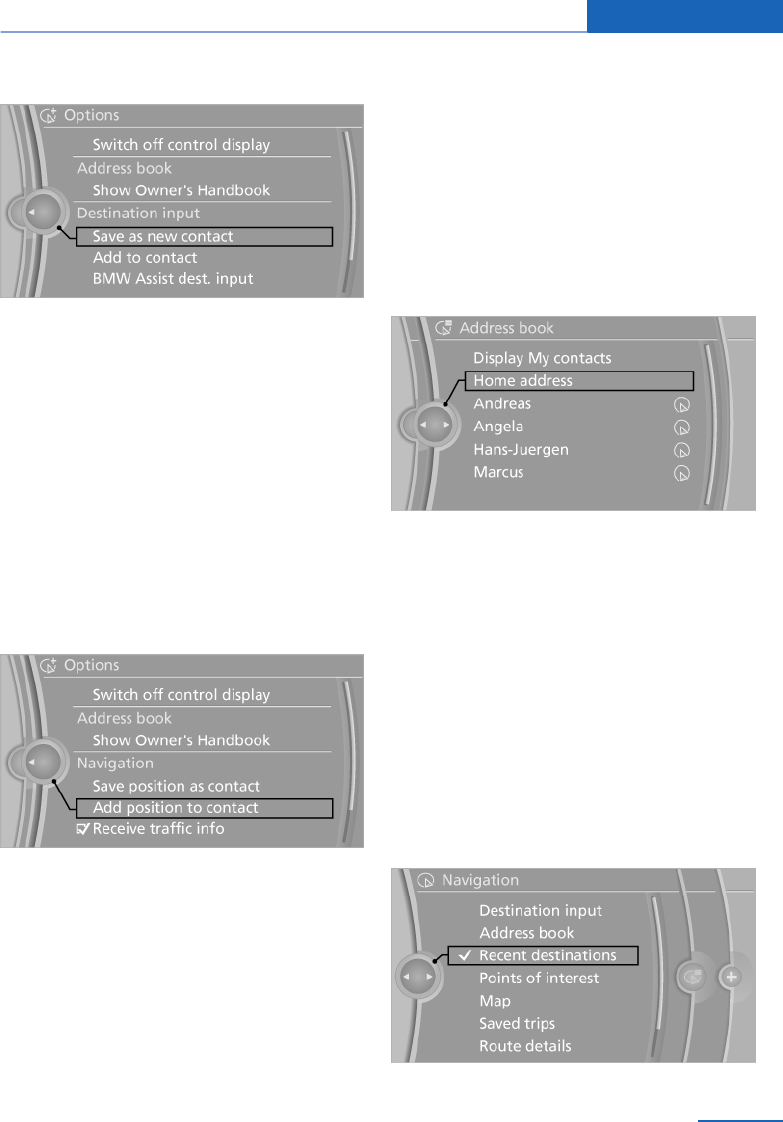
5. "Save as new contact" or "Add to contact"
6. If applicable, select an existing contact.
7. "Work address" or "Home address"
8. Enter "Surname" and, if applicable, "First
name".
9. "Save contact in vehicle"
Saving position
The current position can be saved in the address
book.
1. "Navigation"
2. Call up "Options".
3. "Save position as contact" or "Add position
to contact"
4. Select an existing contract from the list, de
pending on the selection. Select type of ad
dress and enter surname and first names.
5. "Save in car"
Edit or delete the address
1. "Navigation"
2. "Address book"
3. Mark entry.
4. Call up "Options".
5. "Edit in Contacts" or "Delete entry"
Accepting your home address as a
destination
The home address must be created.
1. "Navigation"
2. "Address book"
3. "Home address"
4. "Start guidance"
Last destinations
General
The last destinations reached are saved auto
matically.
These destinations can be called up and incor
porated into route guidance.
Calling up last destinations
1. "Navigation"
2. "Recent destinations"
Seite 11
Destination input Navigation
11
Online Edition for Part no. 01 40 2 912 836 - 07 12 510
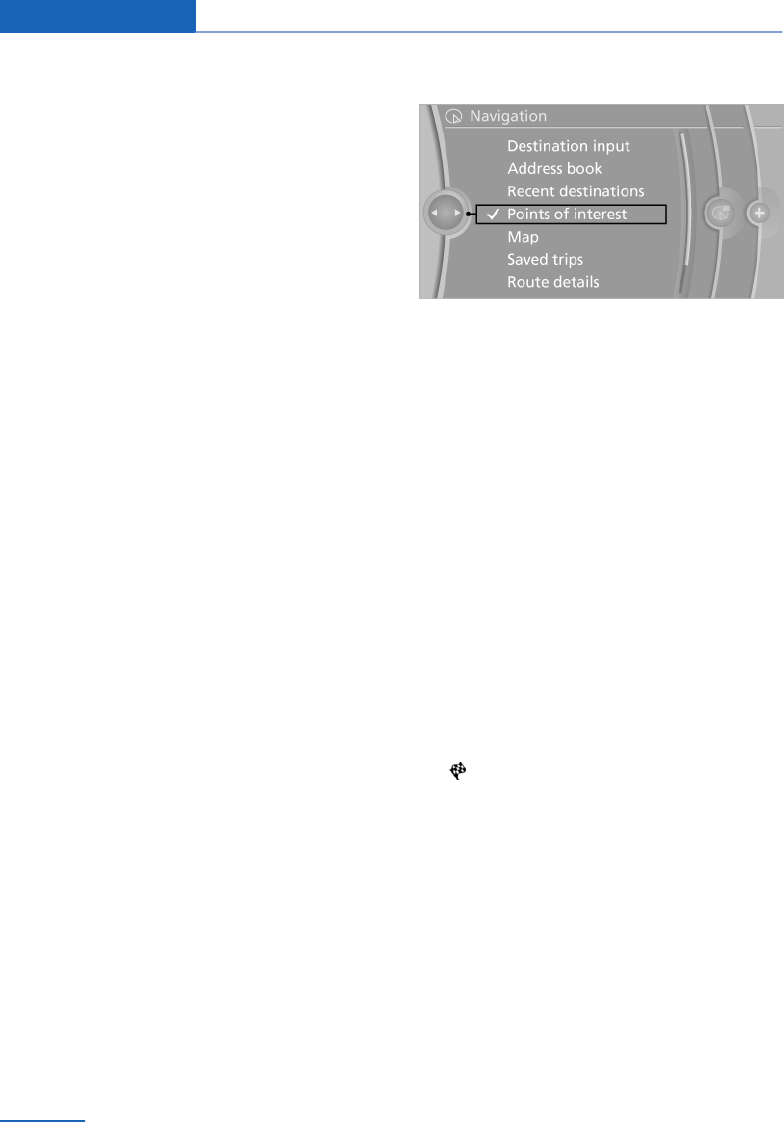
Starting route guidance
1. "Navigation"
2. "Recent destinations"
3. Select destination.
4. "Start guidance"
Editing a destination
1. "Navigation"
2. "Recent destinations"
3. Highlight destination.
4. Call up "Options".
5. "Edit destination"
Deleting the last destinations
1. "Navigation"
2. "Recent destinations"
3. Highlight destination.
4. Call up "Options".
5. "Delete entry" or "Delete all recent dest."
Points of interest
General
Even with the most up-to-date navigation data,
information on individual points of interest may
have changed, for example, service stations may
not be in operation.
Searching points of interest
Selection of points of interest, for example ho
tels or sights:
1. "Navigation"
2. "Points of interest"
3. Select search.
Google™ local search
1. "Google™ Local Search"
2. "Location"
Select or enter location.
3. "Search term"
4. Enter keyword.
Suggestions are displayed.
5. Select suggestion.
The list of points of interest is displayed.
6. Select a point of interest.
Details are displayed.
If several details are included, you can
browse through the tabs.
If a phone number is saved, a telephone con
nection can be established.
7. Select the symbol.
"Start guidance" or "Add as another
destination"
Enter destination as a further destination,
see page 16.
A-Z search
1. "A-Z search"
2. "Location"
Select or enter location.
3. "Category"
4. Selecting a category.
5. "Category details"
Seite 12
Navigation Destination input
12 Online Edition for Part no. 01 40 2 912 836 - 07 12 510
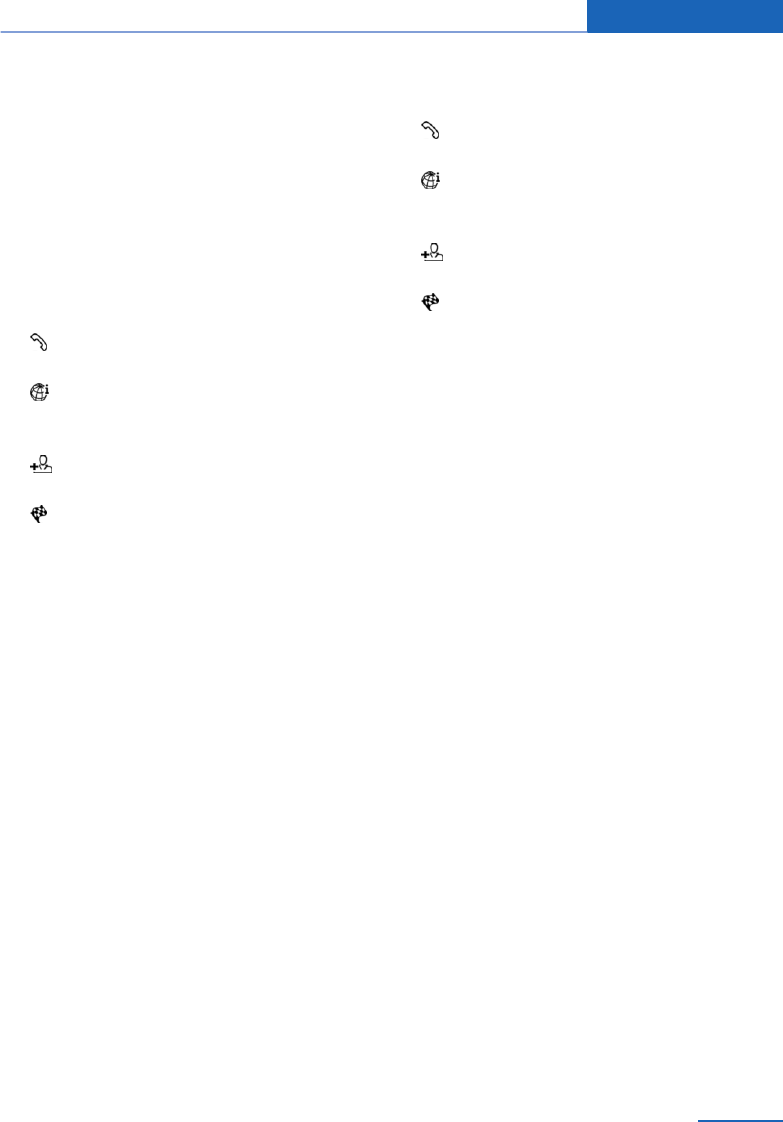
Several category details can be selected for
certain points of interest. Tilt the controller
to the left to exit the category details.
6. "Search term"
7. Enter keyword.
The list of points of interest is displayed.
8. Select a point of interest.
Details are displayed.
If several details are included, you can
browse through the tabs.
If a phone number is saved, a telephone
connection can be established.
Additional information can be shown for
many special destinations through BMW
Online.
Many special destinations can be saved
as a contact in the address book.
9. Select the symbol.
"Start guidance" or "Add as another
destination"
Enter destination as a further destination,
see page 16.
"Start search": without entering a search term,
the search is repeated using the last stored
search term.
Category search
1. "Category search"
2. "Location"
Select or enter location.
3. "Category"
4. Selecting a category.
5. "Category details"
Several category details can be selected for
certain points of interest. Tilt the controller
to the left to exit the category details.
6. "Start search"
The list of points of interest is displayed.
7. Select a point of interest.
Details are displayed.
If several details are included, you can
browse through the tabs.
If a phone number is saved, a telephone
connection can be established.
Additional information can be shown for
many special destinations through BMW
Online.
Many special destinations can be saved
as a contact in the address book.
8. Select the symbol.
"Start guidance" or "Add as another
destination"
Enter destination as a further destination,
see page 16.
Displaying points of interest
List of points of interest: points of interest are
arranged according to distance and marked with
an arrow showing the direction.
In the split screen, points of interest in the se
lected category are displayed as symbols in the
map view. The display depends on the map
scale and the category.
Destination input via BMW Assist
1. "Navigation"
2. "Destination input"
3. "BMW Assist dest. input"
A connection to the information service is es
tablished.
Displaying points of interest in the map
The categories of the points of interest can be
shown as symbols on the map.
Set categories:
1. "Navigation"
2. "Map"
3. Call up "Options".
4. "Display points of interest"
5. Select the setting.
Seite 13
Destination input Navigation
13
Online Edition for Part no. 01 40 2 912 836 - 07 12 510
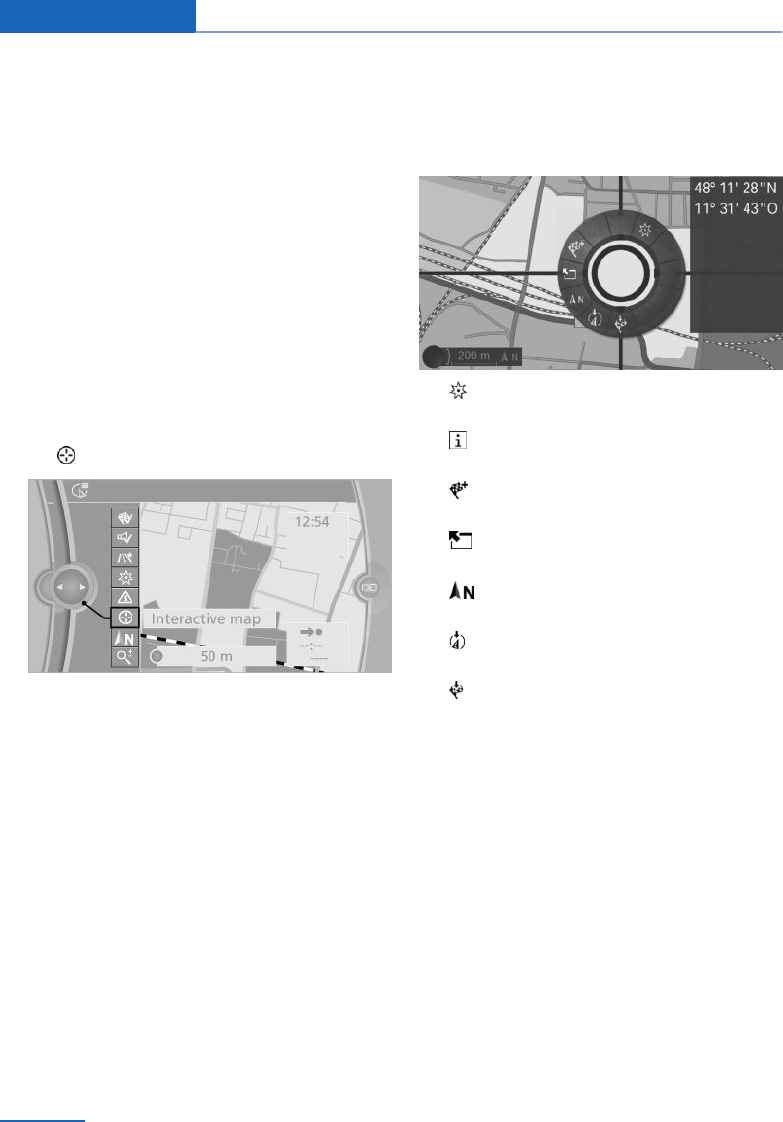
▷"All"
▷"None"
▷"Selected": up to five categories can be
preset.
The displays can be switched on and off in the
map view, see page 22.
Destination input via map
Selecting a destination
1. "Navigation"
2. "Map"
The current position of the vehicle is shown
in the map.
3. "Interactive map"
4. Select the destination with the cross-hairs.
▷To change the scale: turn the controller.
▷To move the map: tilt the controller in the
corresponding direction.
▷To move the map diagonally: tilt the con
troller in the corresponding direction
and turn it.
Specifying the street/road
If the system does not detect a street/road, one
of the following items of information is dis
played:
▷A street name in the vicinity.
▷The county.
▷The co-ordinates of the destination.
Additional functions
Press the controller to access the following ad
ditional functions available in the interactive
map:
▷ "Points of interest in vicinity": search for
points of interest is started.
▷ "Show details": any details on the desti
nation can be shown.
▷ "Start guidance": route guidance is star
ted.
▷ "Exit interactive map": changes back to
the map view.
▷ "Change map view": changes to map
view pointing north.
▷ "Display current location": the map sec
tion around the current location is displayed.
▷ "Show destination": map section around
the destination is displayed.
Destination input by voice
control
General
▷For the handbook for the voice control sys
tem, see Owner's Handbook for the vehicle.
▷A changeover between voice operation and
iDrive is possible when entering destina
tions using spoken commands.
▷Have possible voice commands read
aloud: Voice commands
Seite 14
Navigation Destination input
14 Online Edition for Part no. 01 40 2 912 836 - 07 12 510
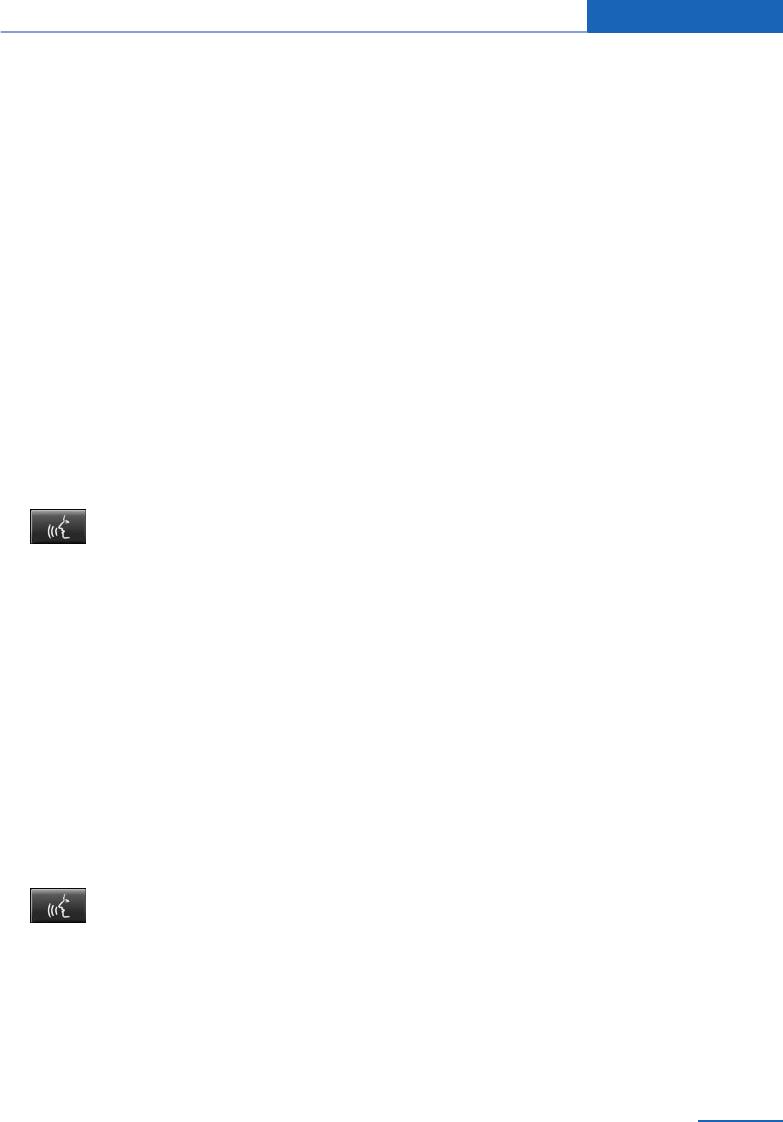
Voice commands
▷The location, street and house number can
be entered in a single command.
▷Countries, locations, roads and junctions
can be spoken as whole words in the lan
guage of the system or spelled out.
Example: to enter a town/city within Ger
many as an entire word, the language of the
system must be German.
▷Spell out the input if the language spoken
and the language of the system differ.
▷Pronounce letters fluently and avoid exces
sive intonation and pauses.
▷The options for input depend on the specific
navigation data, country and language set
tings.
Entering an address in a command
1. Press the button on the steering
wheel.
2. Destination input
3. Wait for the system prompt.
4. Say the address aloud in the sequence sug
gested.
5. Continue input as specified by the system.
If required, say each part of the address sepa
rately, for example town/city.
Entering name of town/city on its own
The place name can be spoken as a word or
spelled out.
When the destination input menu is displayed:
1. Press the button on the steering
wheel.
2. Place or Spell name of place.
3. Wait for the system to ask for the town/city.
4. Say the name of the town/city or say at least
the first three letters.
Depending on the input, up to 20 towns/cit
ies are suggested.
5. Select the town/city.
▷Selecting the suggested town/
city: Yes
▷Selecting a different town/city: New
entry
▷Select an entry, Entry ..., for example
entry 2
▷Spell the input: Spell name of place
6. Continue input as specified by the system.
If there are several places with the same name:
Where applicable, places that sound the same
are shown in a list and displayed as a place fol
lowed by three dots.
1. Select the entry: Yes or Entry ... e.g. En
try 2.
2. Select the desired location.
Entering street or junction on its own
Enter the street or junction in the same way as
the town/city.
Entering house number on its own
Depending on the data present in the navigation
system, house numbers up to 2000 can be en
tered.
1. House number
2. Say the house number.
3. Continue input as specified by the system.
Planning a trip
General
To plan a trip, more than one stopover can be
entered.
New trip
1. "Navigation"
2. "Map"
Seite 15
Destination input Navigation
15
Online Edition for Part no. 01 40 2 912 836 - 07 12 510
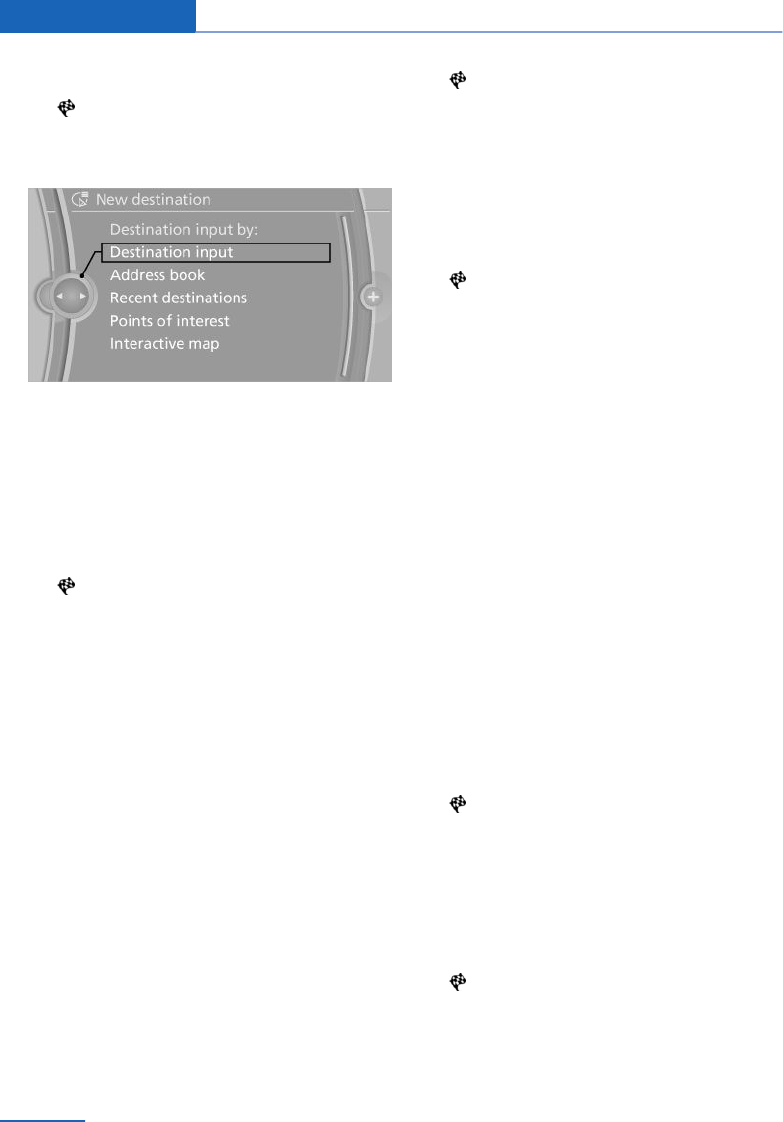
3. If necessary, tilt the controller to the left.
4. "Guidance"
5. "Enter new destination"
6. Select the mode of destination entry.
7. Enter an intermediate destination.
8. "Start guidance"
Entering a trip destination
For one trip, a maximum of 20 intermediate des
tinations can be entered.
1. "Map"
2. "Guidance"
3. "Enter new destination"
4. Select the mode of destination entry.
5. Enter an intermediate destination.
6. "Add as another destination"
The intermediate destination is added to the
destinations list and is highlighted.
7. Turn the controller until the intermediate
stop appears at the desired location in the
list.
8. Press the controller.
Starting the trip
1. Highlight the first destination after entering
all intermediate destinations.
If, for example, the second intermediate
destination is the one highlighted when you
start route guidance, the first intermediate
destination is skipped.
2. "Start guidance"
symbol indicates the active stage of the
trip.
Saving a trip
Up to 30 trips can be stored in the trip list. If
necessary, delete existing trips so that new trips
can be saved.
1. "Map"
2. "Guidance"
3. Call up "Options".
4. "Save in My trips"
5. Enter names.
6. "OK"
Selecting a trip saved in memory
1. "Navigation"
2. "Saved trips"
Until the route category is opened, the num
ber of newly arrived routes is shown behind
the relevant category.
3. Select route category.
4. Select trip.
5. "Start guidance"
Reversing the trip direction
The intermediate destinations are shown in the
list in reverse order.
1. "Map"
2. "Guidance"
3. Call up "Options".
4. "Reverse stage dest. order"
Options for the intermediate
destinations
1. "Map"
2. "Guidance"
3. "Display all stage destin."
4. Select an intermediate destination.
▷"Edit destination"
Seite 16
Navigation Destination input
16 Online Edition for Part no. 01 40 2 912 836 - 07 12 510

▷"Reposition stage dest.": move the in
termediate destination in the list.
▷"Delete stage destination"
▷"Skip stage destination"
Some options are not possible for some trips.
Deleting a trip saved in memory
1. "Saved trips"
2. Highlight the desired trip.
3. Call up "Options".
4. "Delete all trips" or "Delete trip"
Importing trips via a USB medium
1. Switch on ignition.
2. Connect USB medium to the USB interface
in the centre armrest.
3. "Navigation"
4. "Saved trips"
5. "Import trips"
6. "USB"
7. "OK"
The maximum number of trips that can be saved
on the USB medium and in the navigation sys
tem together is 30, otherwise import is not pos
sible.
Importing trips via BMW Online
1. "Navigation"
2. "Saved trips"
3. "Import trips"
4. "BMW Online"
Call up last trip
1. "Navigation"
2. "Saved trips"
3. "Last trip"
4. Select a staged destination.
5. "Start guidance"
BMW Routes
General
Recommended routes can be taken up in the
route guidance.
Start BMW route
1. "Navigation"
2. "Saved trips"
Until route categories are opened, the num
ber of newly arrived routes is shown behind
the relevant category.
3. "BMW Routes"
The routes available are shown with the
following information:
▷Region
▷Removal of the starting point of the
route
▷Name of route
The time and distance are shown in the split
screen for the relevant route.
4. Select desired route.
5. "Start guidance"
6. "Start guidance"
Ending route guidance
1. "Navigation"
2. "Map"
3. "Guidance"
4. "Stop guidance"
Seite 17
Destination input Navigation
17
Online Edition for Part no. 01 40 2 912 836 - 07 12 510
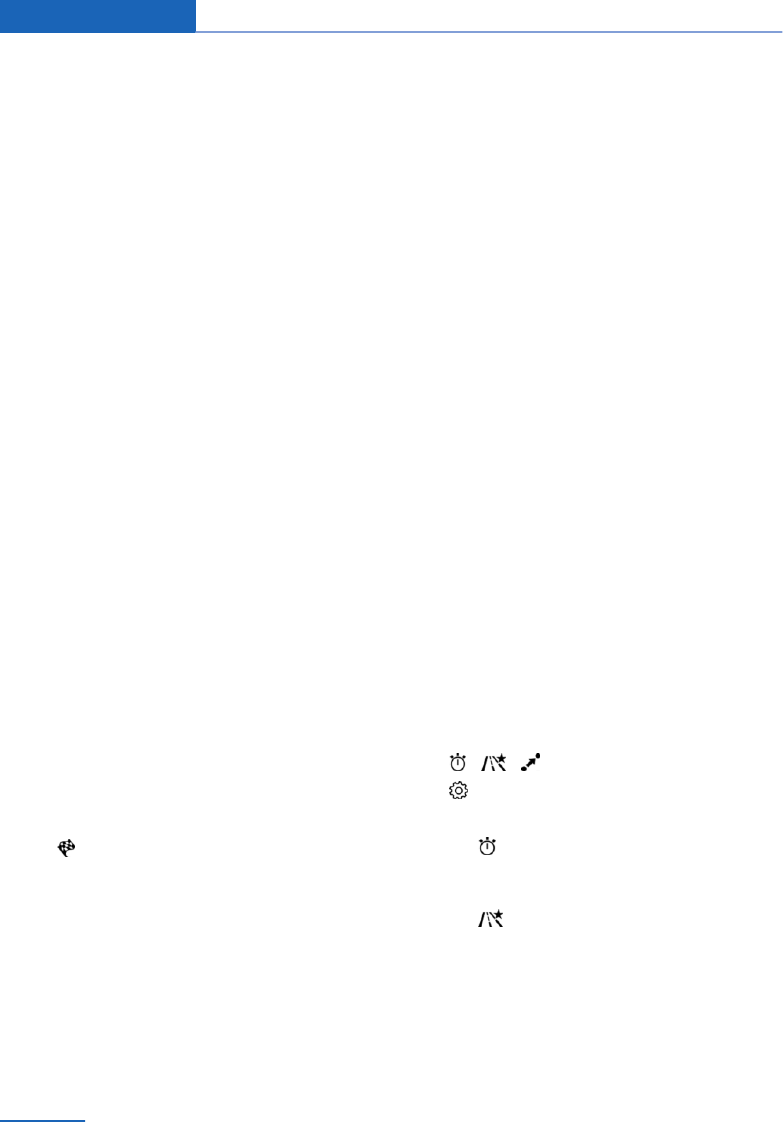
Route guidance
Vehicle Equipment
This chapter describes all standard, national and
special equipment provided in the model series.
Therefore equipment not available in a vehicle is
also described, for example the selected special
equipment or national version. That also applies
to safety-relevant functions and systems.
Route guidance
Starting
1. "Navigation"
2. Enter destination, see page 9.
3. "Accept destination"
4. "Start guidance"
▷The route is displayed on the control display.
▷The distance to the destination/intermedi
ate destination and the estimated time of ar
rival are shown in the map view.
▷An arrow view is displayed in the instrument
cluster, and on the control display and in the
HeadUp Display and as appropriate. Arrow
view, see page 19.
End
1. "Navigation"
2. "Map"
3. "Guidance"
4. "Stop guidance"
Continue
If you did not reach your destination during the
last journey, route guidance may be continued.
"Continue guidance"
Route criteria
General
You can influence the route that is calculated by
selecting various criteria.
You can change the route criteria as often as you
like during destination input or during route
guidance.
Road types form part of the navigation data and
are taken into account in route planning, for ex
ample avoid motorways.
Route guidance with traffic information, see
page 25.
Notes
The suggested route can differ from your per
sonal experience.
The settings are saved for the remote control
currently in use.
For BMW Routes the route criteria cannot be
changed.
Change
1. "Navigation"
2. "Map"
3. "Route criteria"
4. "Route criteria"
5. Select a criterion:
▷ "Fast": time-optimised route result
ing from a combination of a route as
short as feasible and fast roads.
▷ "ECO PRO": fuel-optimised route
resulting from a combination of a route
lowest possible fuel consumption and
fast roads.
Seite 18
Navigation Route guidance
18 Online Edition for Part no. 01 40 2 912 836 - 07 12 510
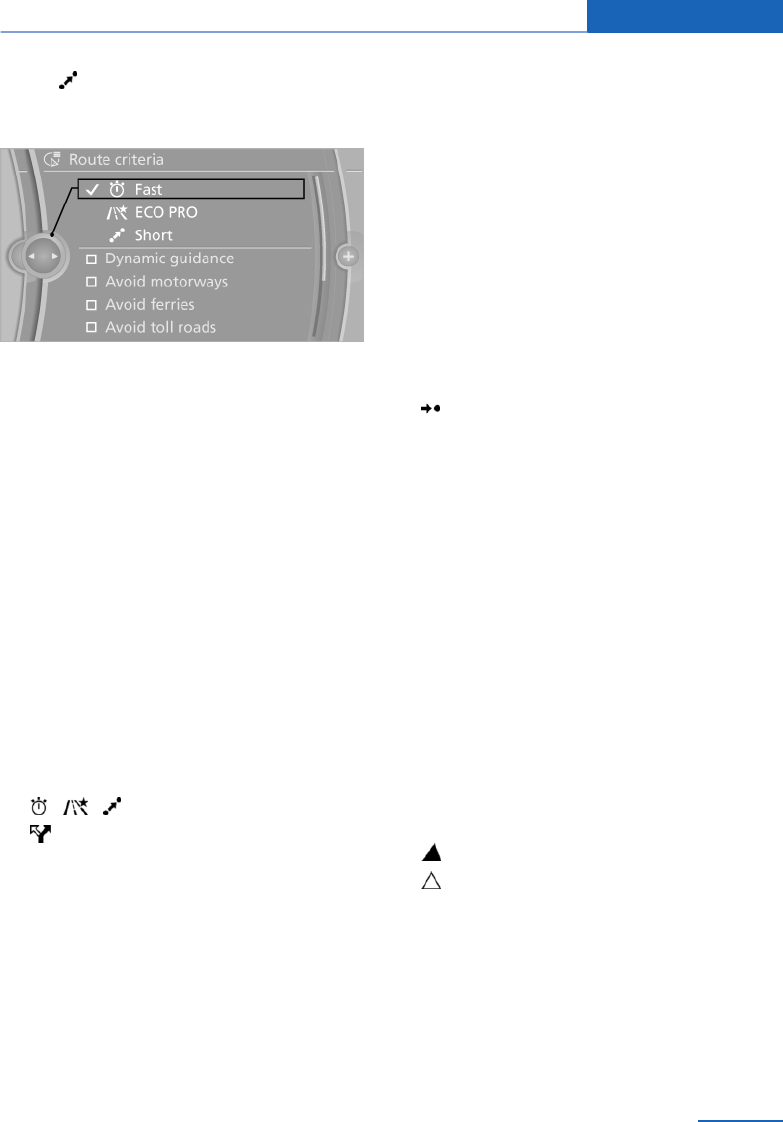
▷ "Short": distance-optimised route
resulting from a combination of a route
as short as feasible and fast roads.
6. To select supplementary route criteria, if
necessary:
▷"Dynamic guidance": traffic information
can automatically be taken into account,
see page 25, with route guidance.
▷"Avoid motorways": motorways are
avoided as far as possible.
▷"Avoid ferries": ferries are avoided as far
as possible.
▷"Avoid toll roads": routes with tolls are
avoided as far as possible.
▷"Avoid tax vignette roads": routes with
long-term tolls are avoided as far as pos
sible.
Alternative Routes
When route guidance is active, alternative
routes are suggested if possible.
1. "Route criteria"
2. "Alternat. routes"
An overview of the current route and the
proposed alternative routes is shown. In ad
dition, details such a travel time and route
length and with alternative routes any data
on fuel consumption compared with the cur
rent route are shown. The routes are illus
trated in colour in the split screen.
3. Select to take an alternative route.
Course of route
Various views of the course of the route are
available during route guidance:
▷Arrow display in the instrument cluster and
on the control display.
▷List of routine sections.
▷Map view, see page 21.
▷Depending on equipment, arrow view in
Head-Up Display.
Arrow view
The following information is displayed during
route guidance:
▷ Symbol for active route guidance with
remaining travel time and distance to desti
nation.
▷Small arrow: instruction, for example, to next
turn giving the distance and name of the new
road.
▷Large arrow: current heading.
▷Road name of the road you are currently
travelling along.
▷Traffic information.
Depending on road guidance, the illustration
changes to junction view. Any lane information
is also shown here.
Show, see page 23, arrow view in split screen.
Driving lane information
In arrow view, a triangle indicates the recom
mended lane on a multilane carriageway.
▷ Optimum lane.
▷ Lane that is also possible. But a lane
change might soon be necessary.
Display list of routine sections
With active route planning, a list of the route
sections can be displayed. For each route stage,
the distance to be driven and the traffic infor
mation are displayed.
1. "Navigation"
Seite 19
Route guidance Navigation
19
Online Edition for Part no. 01 40 2 912 836 - 07 12 510
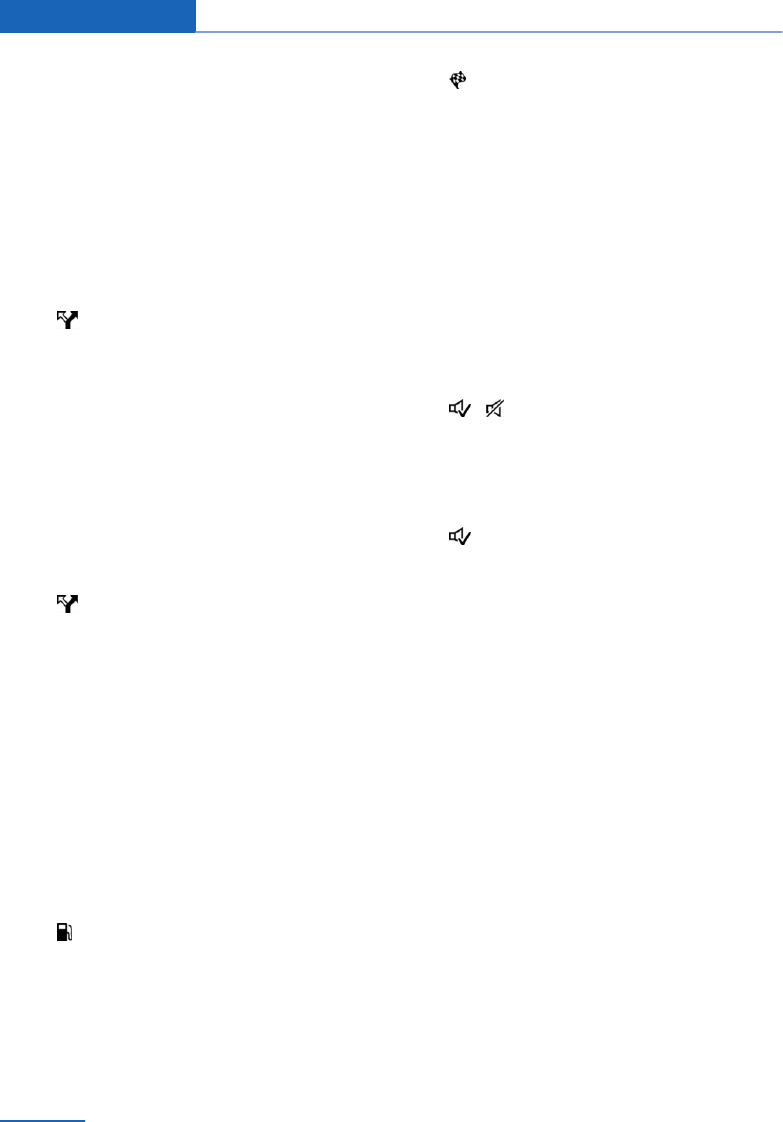
2. "Route details"
3. Mark route section.
The section of the route is also shown in the
split screen.
Bypassing a section of the route
Calculate a new route for a route stage.
1. "Navigation"
2. "Route details"
3. "New route for"
4. Turn the controller. Enter the distance
within which you want to return to the origi
nal route.
5. Press the controller.
Cancelling a bypass
In case you no longer wish to bypass this section
of the route:
1. "Navigation"
2. "Route details"
3. "New route for:"
4. "Cancel closure"
Refuelling recommendation
The remaining range is calculated and, as nee
ded, service stations along the way are dis
played.
Even with the most up-to-date navigation data,
information on individual service stations may
have changed, for example, service stations may
not be in operation.
1. "Navigation"
2. "Route details"
3. "Refuelling recommend."
A list of service stations is displayed.
4. Highlight the service station.
The position of the service station is shown
in the split-screen.
5. Select the service station.
6. Select the symbol.
7. "Start guidance": route guidance to the
service station you selected is started.
"Add as another destination": the service
station is added to the course of the route.
Voice instruction
Switching on/off
The setting is saved for the remote control cur
rently in use.
1. "Navigation"
2. "Map"
3. "Spoken instructions"
Repeat
1. "Navigation"
2. "Map"
3. Highlight the symbol.
4. Press the controller twice.
Volume control
Turn the volume knob during the voice instruc
tions until the desired volume is obtained.
Store in favourites buttons
The function Enable/disable voice instructions
can be saved to a favourites button for quick ac
cess.
Seite 20
Navigation Route guidance
20 Online Edition for Part no. 01 40 2 912 836 - 07 12 510
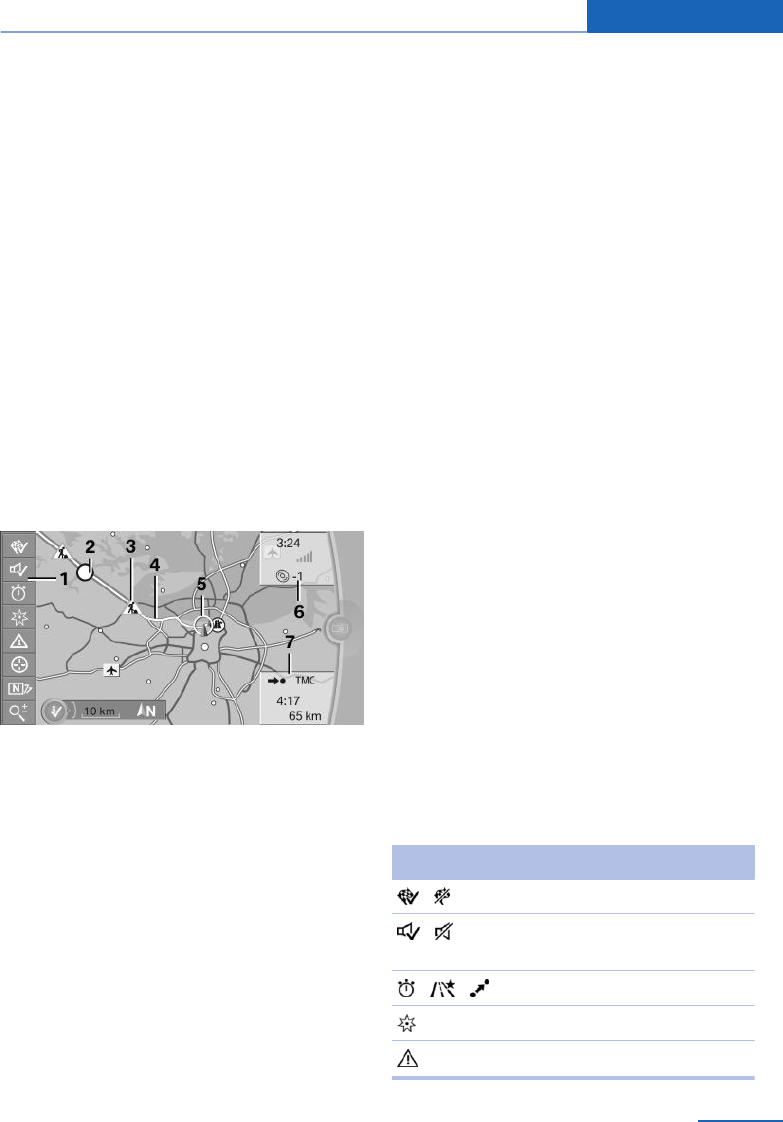
Map view
Vehicle Equipment
This chapter describes all standard, national and
special equipment provided in the model series.
Therefore equipment not available in a vehicle is
also described, for example the selected special
equipment or national version. That also applies
to safety-relevant functions and systems.
Displays
1. "Navigation"
2. "Map"
Overview
1Function bar
2Route stage with traffic obstruction
3Road sign for traffic obstruction
4Planned route
5Location
6Upper status field
7Lower status field
Lines on the map
Roads and streets are displayed in various col
ours and lines in accordance with their classifi
cation. Dotted lines denote train and ferry con
nections. National borders are denoted by thin
lines.
Traffic obstructions
When receiving traffic information from a radio
station, traffic obstructions can be shown on the
map, see page 24.
Lines along the planned route denote route
stages with traffic obstructions, depending on
the map scale. The position of the lines on the
route show the direction of the obstruction.
Road signs classify the obstructions.
▷Red road sign: the obstruction affects the
planned route or direction of travel.
▷Grey road sign: the obstruction does not af
fect the planned route or direction of travel.
Planned route
After starting route guidance, the planned route
is shown on the map.
Status fields
Display/hide: press the controller.
▷Upper status field: time, telephone and en
tertainment details.
▷Lower status field: symbol for active route
guidance, status of traffic information, arrival
time and distance to destination.
Function bar
The following functions are available using the
function bar:
Symbol Function
Route guidance active/inactive.
Voice instructions active/inac
tive.
Change route criteria.
Search for point of interest.
Traffic information functions.
Seite 21
Map view Navigation
21
Online Edition for Part no. 01 40 2 912 836 - 07 12 510
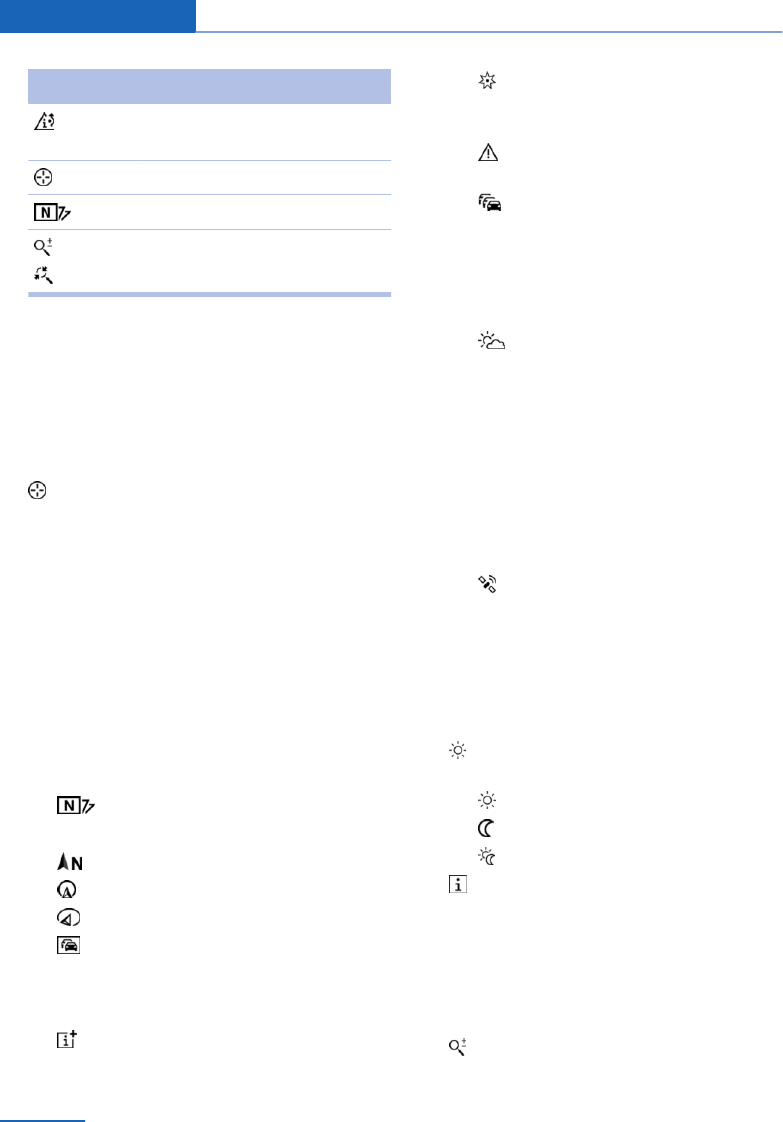
Symbol Function
Proposed diversions are avail
able.
Interactive map.
Set map view.
Changes the scale.
To switch to the toolbar, tilt the controller to the
left.
Map section
Change
"Interactive map"
▷To move the map: tilt the controller in the
corresponding direction.
▷To move the map diagonally: tilt the control
ler in the corresponding direction and turn it.
Settings
The settings are saved for the remote control
currently in use.
1. "Navigation"
2. "Map"
3. "Map views"
Set map view.
▷ "North-oriented"
▷ "In direct. of travel"
▷ "Perspective"
▷ "Traffic info map": information on traffic
flow is shown in a special map view. The
symbols of the other additional information
set are also shown.
▷ "Additional info"
▷ "Points of interest": symbols for
points of interest are shown. Set display,
see page 13.
▷ "Traffic events": symbols for traffic
information, see page 24, are shown.
▷ "Traffic flow": depending on the
scale, the length, direction and effect, a
traffic obstruction are indicated by road
signs in the map or coloured lines along
the calculated route. Information on traf
fic flow in the map view, see page 25.
▷ "Weather": weather symbols are
shown on the map.
Displayed symbols: clear skies, overcast
skies, rain, thunderstorms and snow,
with the current temperature in each
case.
The weather information is automati
cally updated.
The symbols are displayed in specific
selected scales.
▷ "Satellite images": depending on
availability and resolution, satellite im
ages are shown as the background in
several scales.
▷3D "Perspec. view in 3D": distinctive lo
cations in the navigation data are shown
on the map in 3D.
▷ "Map mode": according to lighting con
ditions, select and make settings.
▷ "Day"
▷ "Night"
▷ "Automatic"
▷ "Status info": fade in/out status fields.
Status fields, see page 21.
Scale
Change
1. Select the symbol.
2. To change the scale: turn the controller.
Seite 22
Navigation Map view
22 Online Edition for Part no. 01 40 2 912 836 - 07 12 510

Automatically set scale
"Autoscale": in the north-pointing map view,
the route between location and destination is
shown. This view is also selected when the scale
is set so wide that the following is shown:
"AUTO".
Map view for split-screen
Regardless of the main screen, the map view can
be selected for the split-screen.
1. Call up "Options".
2. "Split screen"
3. Tilt the controller repeatedly to the right until
the split screen is selected.
4. Press the controller.
5. Select map view.
▷"Arrow view"
▷"Map north-oriented"
▷"Map in direction of travel"
▷"Map perspective"
▷"Position"
▷"Guiding Plus": selected sections of
route, for example motorway intersec
tions, are shown in perspective.
▷"Traffic information map": map is opti
mised to the display of traffic informa
tion.
6. To change the scale: switch to split screen
and turn controller.
Images to the destination
Displays
Photos can be displayed for certain destinations
when route guidance is active.
1. "Navigation"
2. "Map"
3. "Guidance"
4. "Pictures at destination"
5. Depending on the offering, various photos
can be selected.
Seite 23
Map view Navigation
23
Online Edition for Part no. 01 40 2 912 836 - 07 12 510
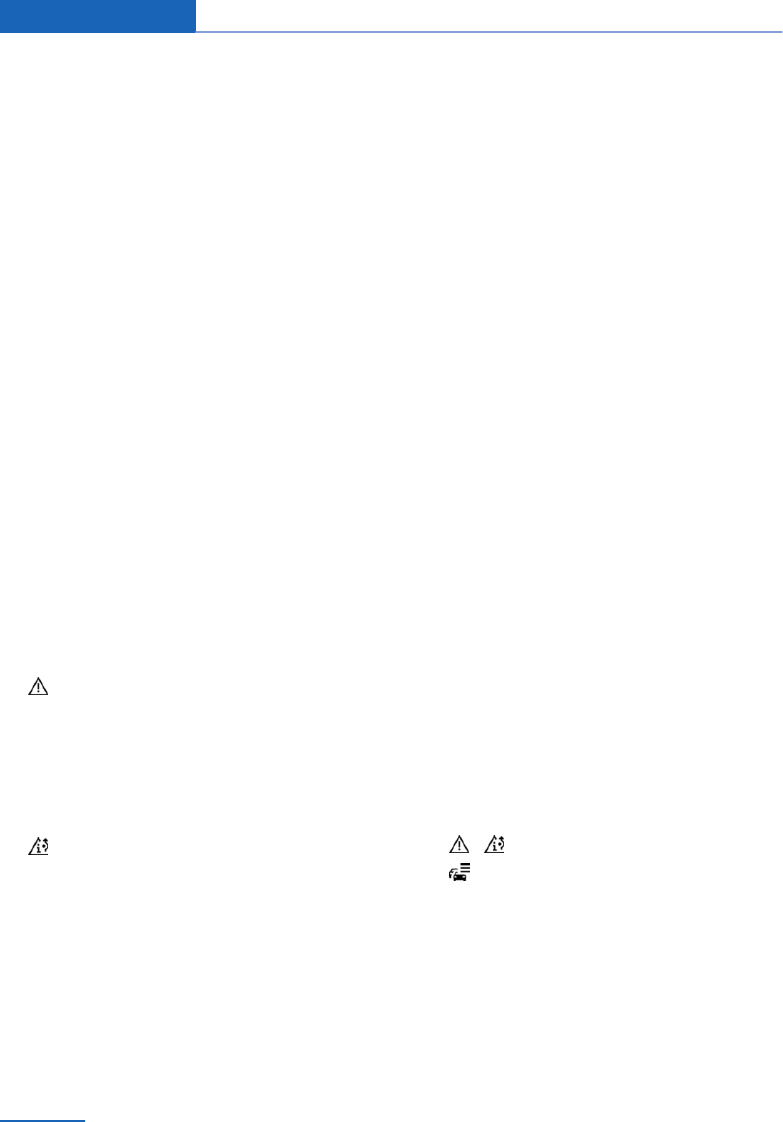
Traffic information
Vehicle Equipment
This chapter describes all standard, national and
special equipment provided in the model series.
Therefore equipment not available in a vehicle is
also described, for example the selected special
equipment or national version. That also applies
to safety-relevant functions and systems.
General
Traffic information from radio stations sending
a traffic warning service on the Traffic Message
Channel, TMC, is shown in the map view and
considered when calculating route. Information
on traffic obstructions and dangers is continu
ously updated.
Traffic information is displayed on the map by
symbols.
Traffic information for the vicinity is stored in a
list.
Display
The symbol in the function bar of the map
view turns yellow, if the traffic information con
cerns the calculated route and the expected de
lay is less than 20 minutes. The symbol turns red
if the expected delay is more than 20 minutes or
the route is blocked or there is a danger mes
sage for the route.
The symbol shows that there are suitable di
versions from the traffic information.
Real-Time Traffic Information, RTTI
In some countries additional bookable services
send real-time traffic information, RTTI, which is
then used and shown instead of traffic informa
tion from the radio station.
The location of traffic obstructions is specified
more comprehensively and precisely with real-
time traffic information. In addition, the traffic
situation off the motorways, for example, on side
streets and urban roads, is extensively recorded
and shown. Diversion recommendations can be
calculated more precisely on the basis of this
information. This lowers the risk of coming
across another traffic obstruction on diversions.
Several recommended diversions or further in
formation may be provided.
When driving in countries in which real-time traf
fic information is available, the traffic information
continues to use radio stations.
It is shown in the lower status field, see
page 21, in map view whether TMC or RTTI in
formation is used.
Reception
Switching on/off
1. "Navigation"
2. Call up "Options".
3. "Receive traffic info"
Traffic information list
Displays
1. "Navigation"
2. "Map"
3. "Traffic information"
4. "Traffic reports"
With active route guidance traffic informa
tion affecting the computed route is first
shown with red symbols. Then the traffic in
formation not affecting the route with grey
symbols. The various items of traffic infor
mation are sorted by distance from the ve
hicle's current position.
5. Select the item of traffic information.
Seite 24
Navigation Traffic information
24 Online Edition for Part no. 01 40 2 912 836 - 07 12 510
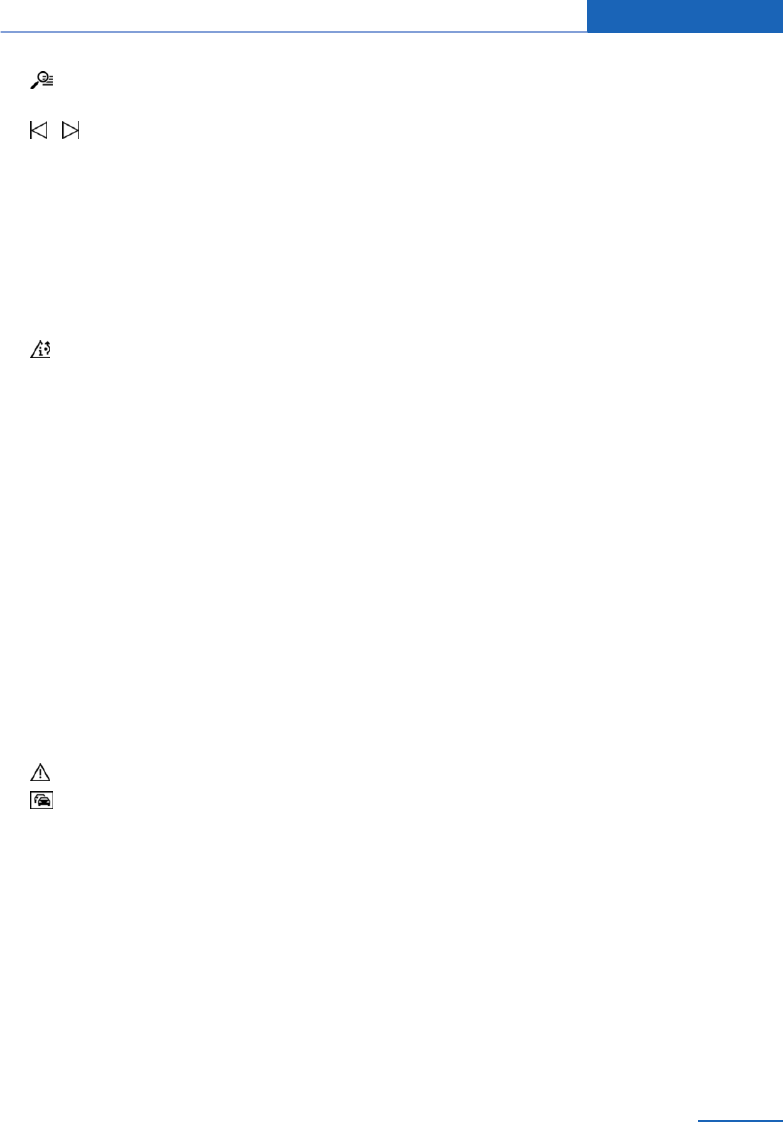
"More information": displays further in
formation.
6. If applicable, browse to the next or
the preceding item of traffic information.
Recommended diversions
Displays
1. "Navigation"
2. "Map"
3. "Diversion": a list of recommended di
versions is shown.
Traffic information in the map
Traffic overview
With the function switched on, the map view
changes to grey scale, set to point north and
changes the scale as needed. The symbols for
additional information are greyed out. This op
timises the traffic information display. Day/night
mode is not taken into consideration for this set
ting.
Show traffic overview
1. "Navigation"
2. "Map"
3. "Traffic information"
4. "Traffic info map"
Leave traffic overview
Tilt the controller to the left. The original map
view is shown.
Symbols in the map view
Depending on the scale of the map and location
of the traffic obstruction in relation to the route,
the symbols for traffic obstructions are dis
played.
Information on traffic flow in the map
view
Depending on the scale, the length, direction
and effect of a traffic obstruction are indicated
by road signs in the map or coloured lines along
the calculated route.
▷Black: obstruction.
▷Red: traffic jam.
▷Orange: queuing traffic.
▷Yellow: heavy traffic.
▷Green: free-flowing traffic.
▷Grey: general traffic information, for exam
ple roadworks.
The information displayed depend on the spe
cific traffic information service.
Traffic information with route
guidance
Principle
If there is information on traffic obstructions, the
system calculates the possible proposed diver
sions.
General
Two types of route guidance are possible.
▷Partially dynamic route guidance: diversion
suggestions from the navigation system
may be taken.
▷Dynamic route guidance: diversion sugges
tions are automatically recorded in the route
guidance.
Partially dynamic route guidance
Partially dynamic route guidance is active when
traffic information reception is switched on.
The systems takes into account the existing
traffic information during the route guidance. A
message is displayed depending on the route,
the traffic information and the possible diversion
Seite 25
Traffic information Navigation
25
Online Edition for Part no. 01 40 2 912 836 - 07 12 510
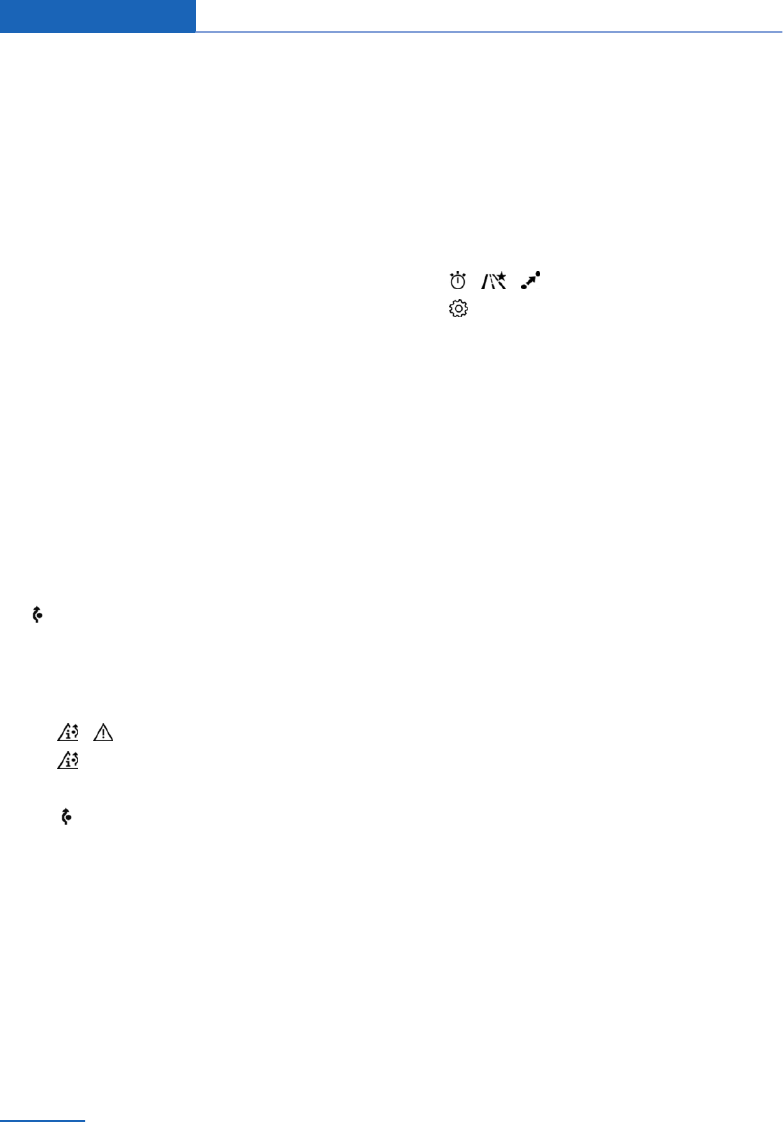
routes. If there is a traffic obstruction, a diversion
is offered if possible.
For particular dangers, for example objects on
the road, a message is displayed with no diver
sion option.
The upper part of the message shows:
▷Symbol of the first traffic disruption, or with
distance to the start of the traffic disruption.
▷Distance to the start of the diversion.
The lower part of the message shows:
▷Remaining route to be driven and arrival time
on the original route, with white symbol.
▷Difference in route length and gain in time of
the diversion compared with the original
route, with coloured symbol.
The following is shown in the split screen:
▷Original route, white.
▷Diversion, coloured.
Accepting a diversion
In the message:
"Diversion"
Via the toolbar:
1. "Navigation"
2. "Map"
3. "Traffic information"
4. "Diversion"
5. Open desired diversion.
6. "Diversion"
Dynamic route guidance
The route is automatically changed if a traffic
obstruction is encountered.
▷The system does not indicate traffic ob
structions on the original route.
▷Traffic information is still displayed on the
map.
▷Depending on the type of road and the na
ture and length of the traffic congestion, it is
also possible that the route is calculated so
that it cuts across the traffic congestion.
▷Particular dangers are displayed independ
ently of the setting.
Activating dynamic route guidance
1. "Navigation"
2. "Map"
3. "Route criteria"
4. "Route criteria"
5. "Dynamic guidance"
Country-specific information
via BMW Online
Specific information on countries can be trans
ferred via BMW Online, for example speed limits
on B roads.
1. "Navigation"
2. Call up "Options".
3. "Country info (BMW Online)"
Seite 26
Navigation Traffic information
26 Online Edition for Part no. 01 40 2 912 836 - 07 12 510
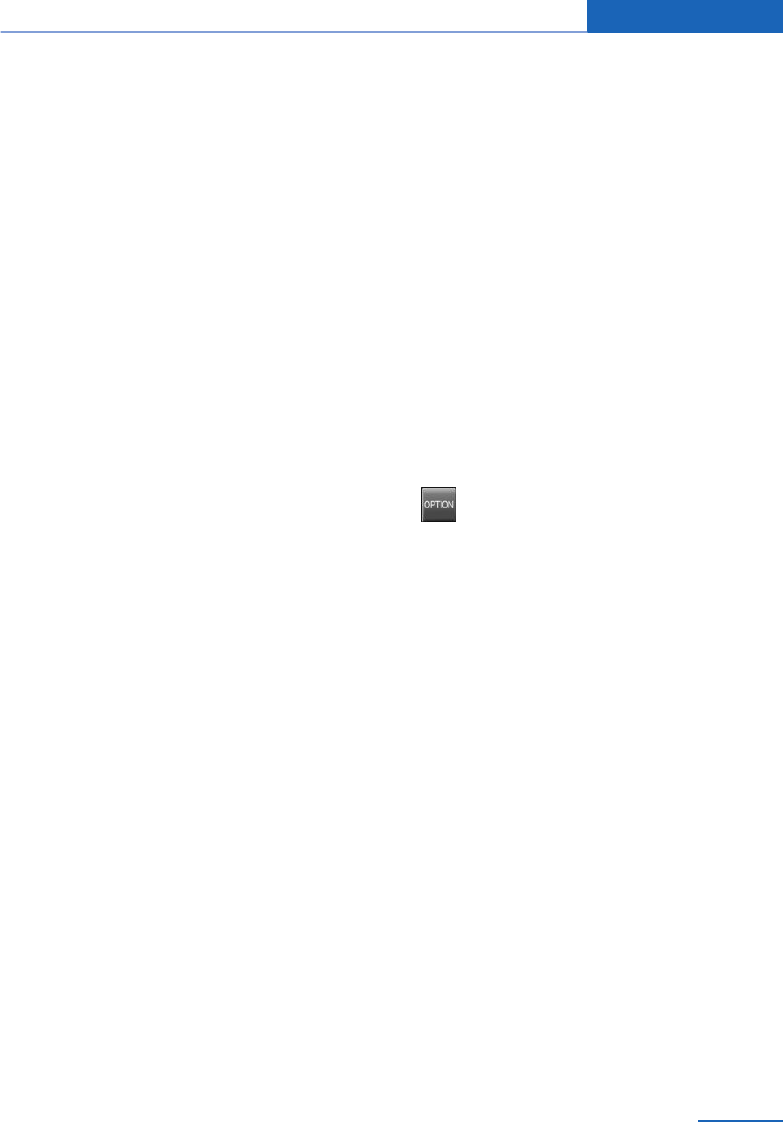
Navigation data
Vehicle Equipment
This chapter describes all standard, national and
special equipment provided in the model series.
Therefore equipment not available in a vehicle is
also described, for example the selected special
equipment or national version. That also applies
to safety-relevant functions and systems.
Information on navigation
data
1. "Navigation"
2. Call up "Options".
3. "Navigation system version" Information re
garding the version of the data is displayed.
Updating
General
Navigation data is saved in the vehicle and can
be updated using USB medium.
You can obtain up-to-date navigation data and
the activation code from your Service centre.
Notes
Depending on the volume of data, updating the
data can take several hours.
Update while the vehicle is in motion, to save the
battery.
Only the basic functions of the navigation sys
tem are available while an update is in progress.
You can check the status of the update process.
Updating
1. Connect USB medium with the new naviga
tion data to the USB interface in the centre
armrest.
2. Follow the instructions on the control dis
play.
3. Enter activation code for the navigation data.
The navigation data are updated. After an
interruption in the trip, follow the instruc
tions on the control display.
4. After updating, remove the media with nav
igation data.
Checking status
1. Press the button.
2. "Navigation update"
Seite 27
Navigation data Navigation
27
Online Edition for Part no. 01 40 2 912 836 - 07 12 510

What to do if...
Vehicle Equipment
This chapter describes all standard, national and
special equipment provided in the model series.
Therefore equipment not available in a vehicle is
also described, for example the selected special
equipment or national version. That also applies
to safety-relevant functions and systems.
What to do if...
▷The current position cannot be displayed.
The car is in an area not covered by the data,
is in a poor reception area or the system is
currently calculating the position. Reception
will normally be possible outdoors.
▷A destination without a street is not trans
ferred to the route guidance system.
No city centre can be determined for the
place entered.
Enter any street in the place selected and
start route guidance.
▷A destination is not transferred to the route
guidance system.
The data for the destination is not available
in the navigation data. Choose a destination
as close as possible to the original one.
▷Letters cannot be selected for destination
input.
The data stored do not contain the destina
tion data.
Choose a destination as close as possible to
the original one.
▷Map view shown in grey scales?
"Traffic info map" Active: indications on the
Control Display are toggled to grey-scale.
This facilitates optimum traffic information
display. Deactivate traffic information map,
see page 25.
▷Spoken instructions cease to be given im
mediately before junctions during route
guidance?
Area is not fully recorded, or you have devi
ated from the suggested route and the sys
tem requires a few seconds to calculate a
new route.
Seite 28
Navigation What to do if...
28 Online Edition for Part no. 01 40 2 912 836 - 07 12 510

Seite 29
What to do if... Navigation
29
Online Edition for Part no. 01 40 2 912 836 - 07 12 510
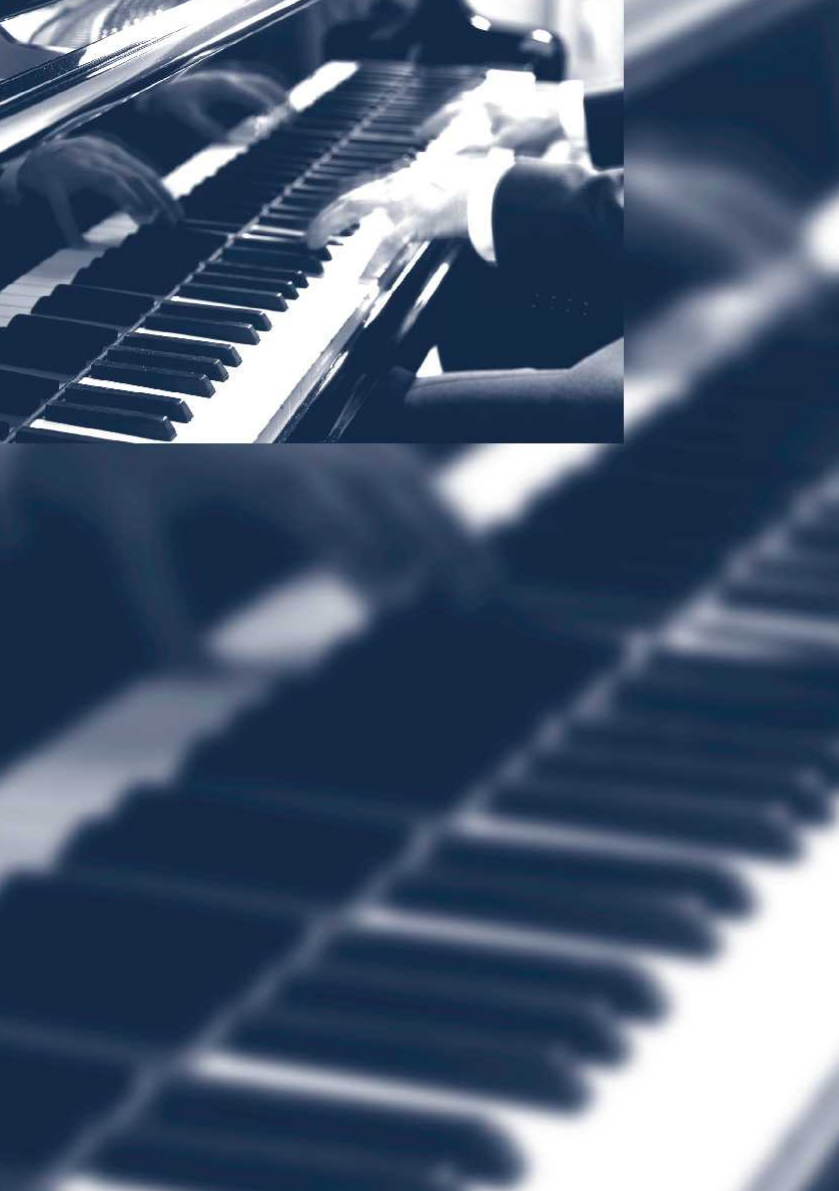
Online Edition for Part no. 01 40 2 912 836 - 07 12 510
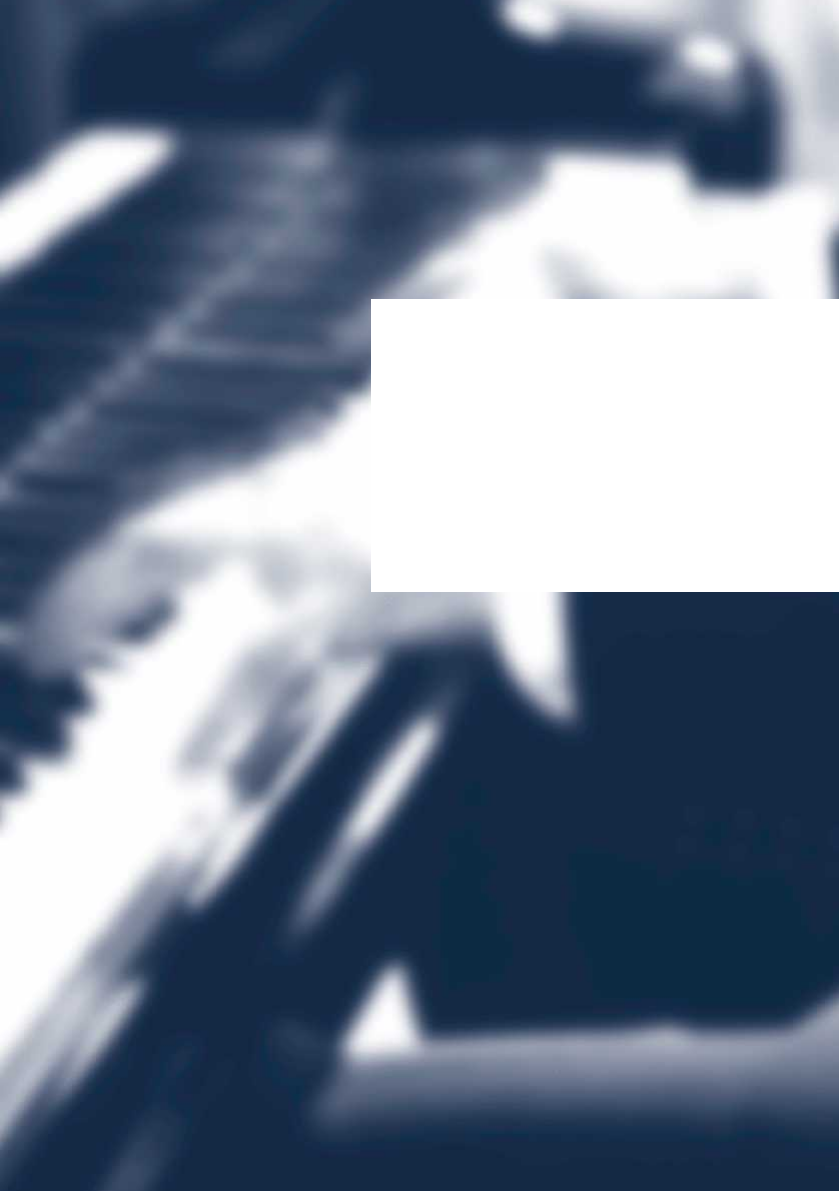
Entertainment
This chapter ensures your enjoyment when
receiving radio and television stations or when
playing CDs, DVDs and tracks from the music
collection.
Online Edition for Part no. 01 40 2 912 836 - 07 12 510
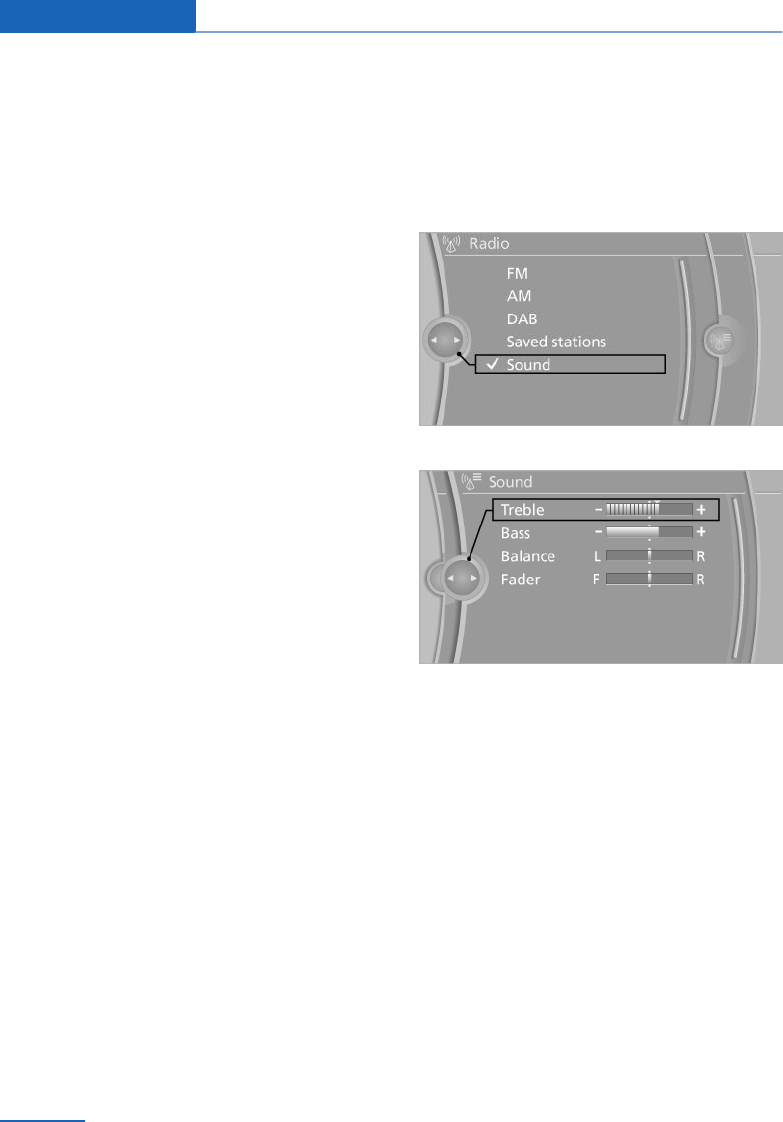
Sound
Vehicle Equipment
This chapter describes all standard, national and
special equipment provided in the model series.
Therefore equipment not available in a vehicle is
also described, for example the selected special
equipment or national version. That also applies
to safety-relevant functions and systems.
General
The sound settings are saved for the remote
control currently in use.
Sound settings
Call up
1. "Multimedia", "Radio" or "Settings"
2. "Sound"
Resetting
1. "Sound"
2. "Reset"
Treble, bass, balance, fader
General
▷"Treble": treble adjustment.
▷"Bass": bass adjustment.
▷"Balance": left/right volume distribution.
▷"Fader": front/rear volume distribution.
Adjusting
1. "Multimedia", "Radio" or "Settings"
2. "Sound"
3. Select the desired sound setting.
4. Adjusting: turn the controller.
5. Saving: press the controller.
Equaliser
Setting for individual sound frequency ranges.
Adjusting
1. "Multimedia", "Radio" or "Settings"
2. "Sound"
3. "Equaliser"
Seite 32
Entertainment Sound
32 Online Edition for Part no. 01 40 2 912 836 - 07 12 510
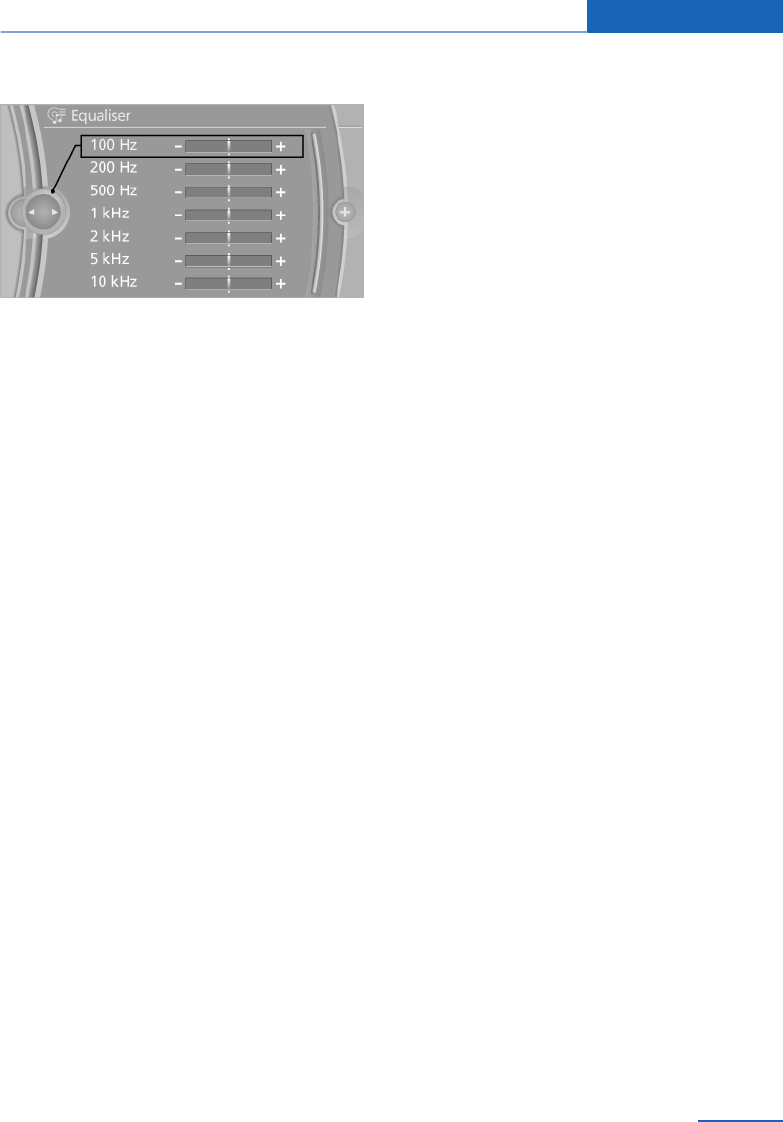
4. Select the desired setting.
5. Adjusting: turn the controller.
6. Saving: press the controller.
Multichannel reproduction,
surround
General
Choice of stereo and multichannel reproduc
tion, surround.
Adjusting
1. "Multimedia", "Radio" or "Settings"
2. "Sound"
3. "Surround" or"L7 surround"
When surround is activated, multichannel re
production is simulated when playing an audio
track in stereo.
LOGIC7 and the LOGIC7 logo are registered
trademarks of Lexicon, Inc., a company of the
Harman International Group.
Bang & Olufsen High End
Surround Sound System
The settings for loudspeaker illumination are
saved for the remote control currently in use.
Setting the sound
1. "Multimedia", "Radio" or "Settings"
2. "Sound"
3. "Bang & Olufsen"
4. Select the desired sound setting.
▷"Studio": studio sound.
▷"Expanded": open room sound.
Center speaker
An additional speaker is provided in the centre
of the instrument panel. This automatically ex
tends when Entertainment is switched on and is
illuminated according to the illumination setting.
With Entertainment switched off or mute
switching, the speaker contracts again.
Volume
General
▷"Speed volume": adaptation of the volume
depending on speed.
▷With Bang & Olufsen High End Surround
Sound System: automatic adjustment of the
volume depending on drive noises audible in
the interior, for example wind noise, no extra
setting needed through Speed Volume.
▷"PDC": volume of the PDC sound signal rel
ative to the sound output from the enter
tainment system.
▷"Gong": volume of the sound signal, for ex
ample for seat belt reminder, in relation to
the sound output from the entertainment
system.
▷"Microphone": microphone volume during a
telephone call.
▷"Loudspeak.": loudspeaker volume during a
telephone call.
The following volumes are stored only for the
respective connected telephone:
"Microphone", "Loudspeak.".
Adjusting
1. "Multimedia", "Radio" or "Settings"
2. "Sound"
Seite 33
Sound Entertainment
33
Online Edition for Part no. 01 40 2 912 836 - 07 12 510
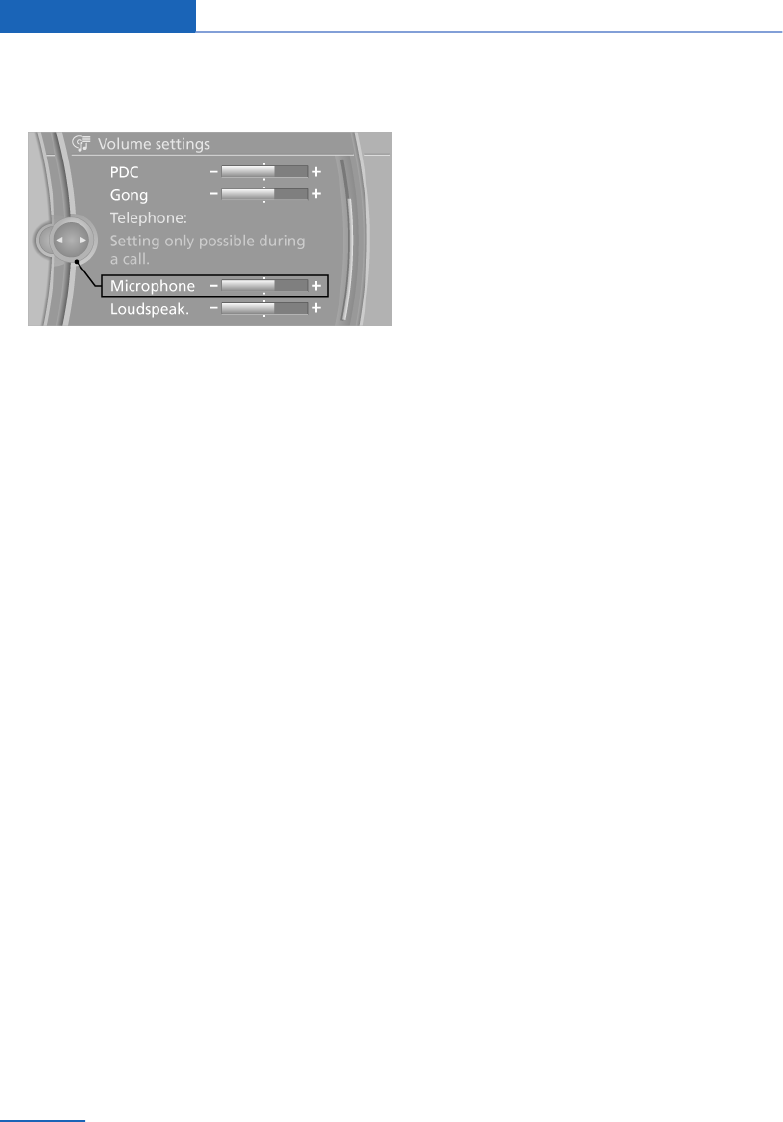
3. "Volume settings"
4. Select the desired volume setting.
5. Adjusting: turn the controller.
6. Saving: press the controller.
Seite 34
Entertainment Sound
34 Online Edition for Part no. 01 40 2 912 836 - 07 12 510
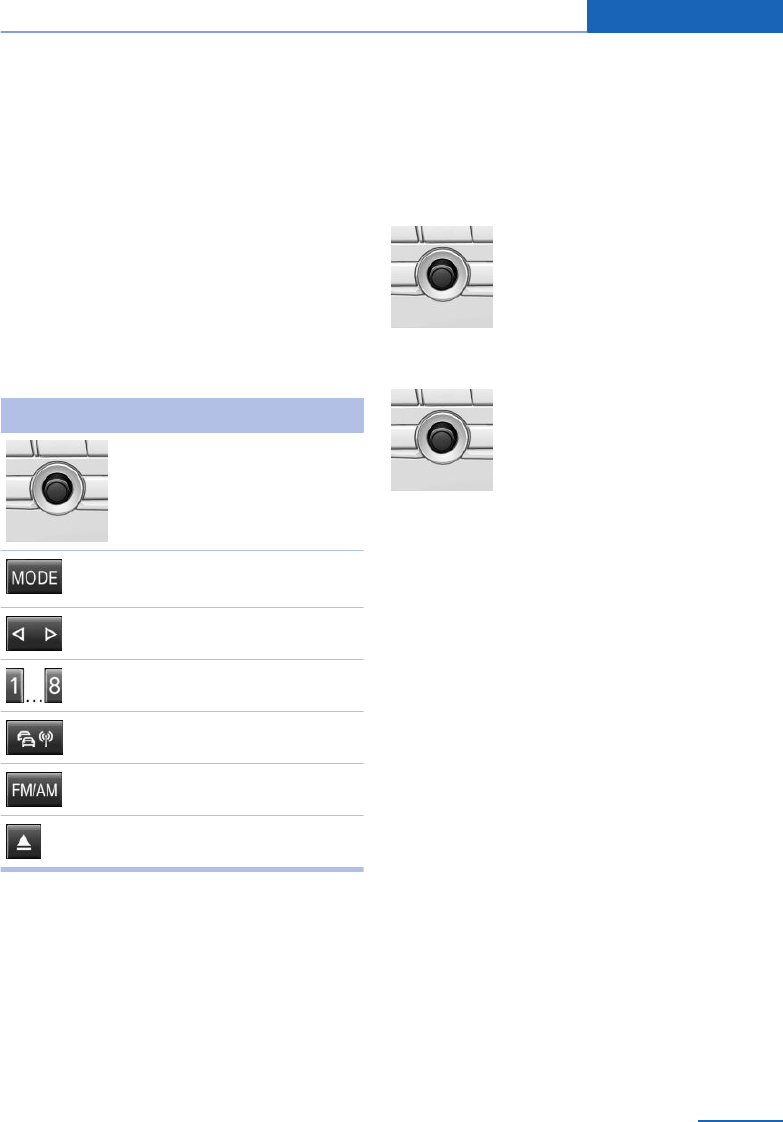
Radio
Vehicle Equipment
This chapter describes all standard, national and
special equipment provided in the model series.
Therefore equipment not available in a vehicle is
also described, for example the selected special
equipment or national version. That also applies
to safety-relevant functions and systems.
Control functions
Press the button Function
Press: switch sound output
on/off.
Turn: set volume.
Switches entertainment
sources.
Change station/track
Favourites buttons
Traffic information on/off
Change waveband
Eject CD/DVD
Sound output
Switching on/off
With the ignition switched off:
press button.
Muting
With the ignition switched on, or
engine running: press button.
AM/FM stations
Selecting station
1. "Radio"
2. "FM" or "AM"
The station last played is played and shown.
Seite 35
Radio Entertainment
35
Online Edition for Part no. 01 40 2 912 836 - 07 12 510
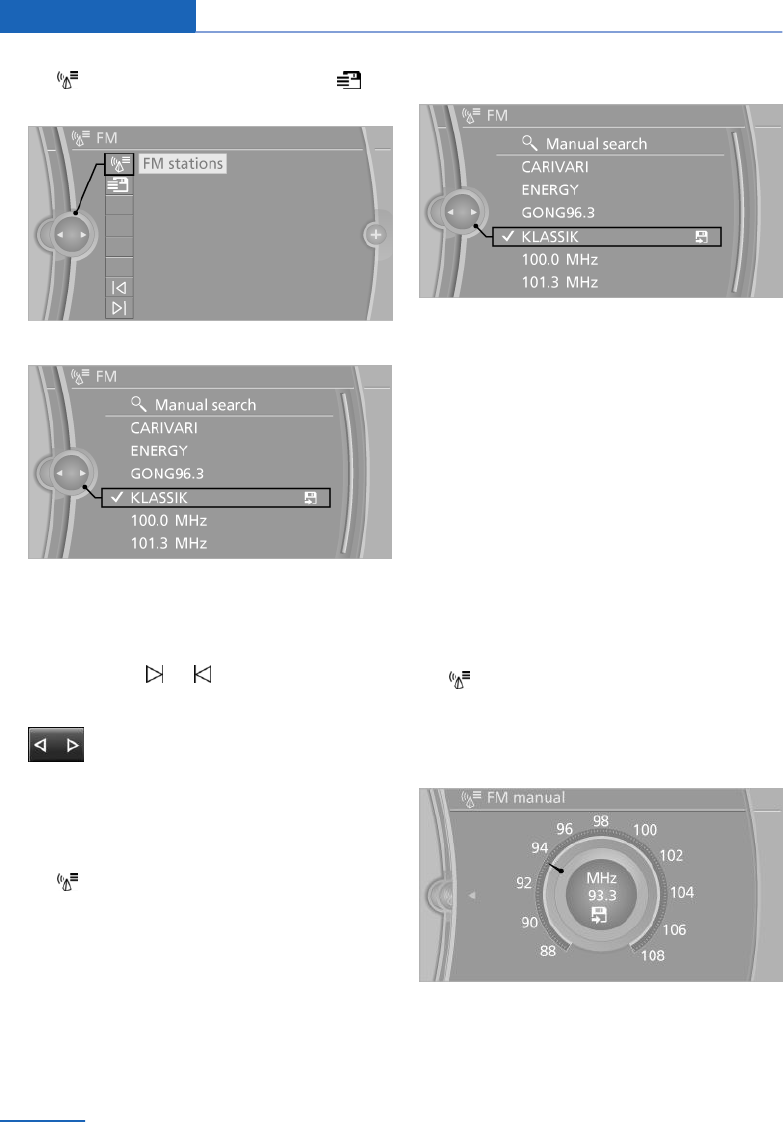
3. "FM stations", "AM stations" or
"Saved stations".
4. Select the desired station.
The selected station is saved for the remote
control currently in use.
Changing stations
Select symbol or .
Using buttons on the radio:
Press the button.
Saving stations
1. "Radio"
2. "FM" or "AM"
3. "FM stations" or "AM stations"
4. Highlight the desired station.
5. Press and hold down the controller.
6. Mark desired storage place and press con
troller.
The stations are saved for the remote control
currently in use.
The stations can also be saved on the favourites
buttons.
With navigation system: The station can also be
stored on the favourite buttons.
Manual station selection
Station selection via frequency.
1. "Radio"
2. "FM" or "AM"
3. "FM stations" or "AM stations"
4. "Manual search"
5. Select another band as necessary.
6. To select the frequency: turn the controller.
Save frequency: hold down controller.
Seite 36
Entertainment Radio
36 Online Edition for Part no. 01 40 2 912 836 - 07 12 510
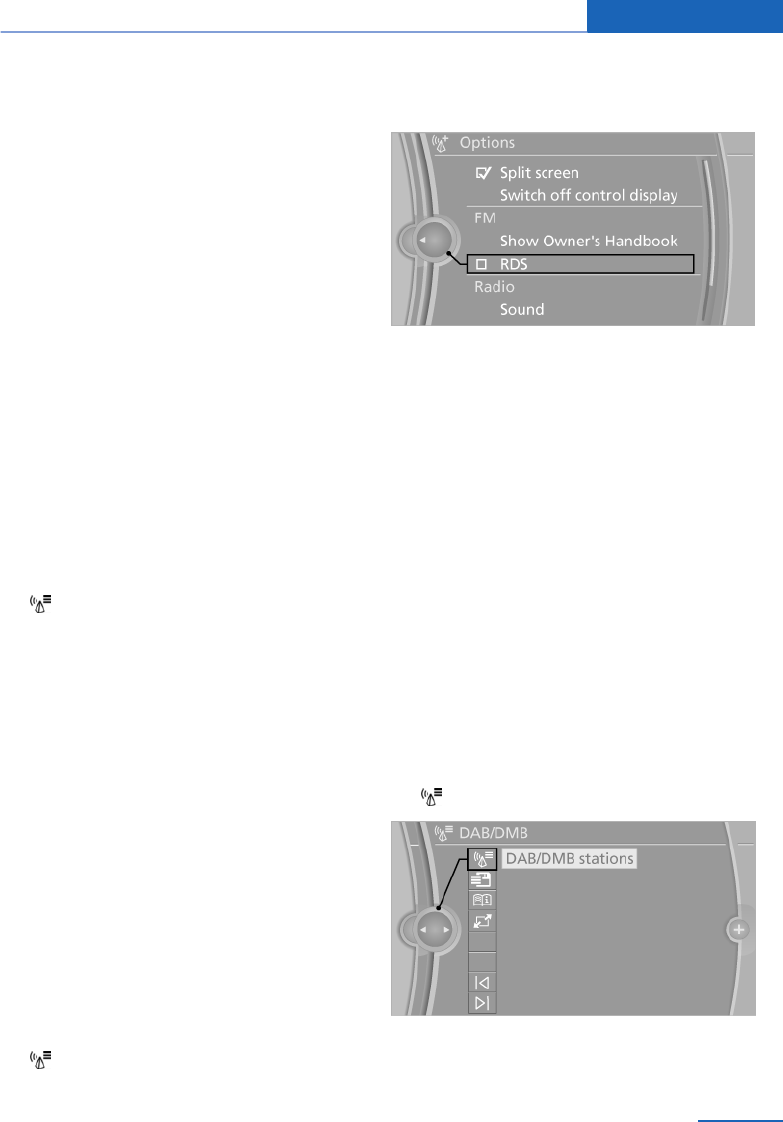
Rename station
A station with changing station names can be
renamed.
1. "Radio"
2. "FM"
3. Select the desired station.
4. Call up "Options".
5. "Rename as:"
Wait until the desired name is displayed.
The selected station name is in the list of current
stations and the stored station is selected.
Displaying additional information
If a radio station broadcasts a radio text or radio
text plus, this information can be shown, for ex
ample, title or performer of a piece of music.
Availability, content and sequence depend on
the radio station.
1. "Radio"
2. "FM"
3. "FM stations"
4. Select station.
5. Call up "Options".
6. "Station information"
RDS
Principle
RDS broadcasts additional information in the
FM waveband, for example the station name.
For a station with a number of frequencies, an
automatic changeover to the frequency with the
best reception quality takes place if required.
Switching on/off
It is recommended that you switch on RDS.
1. "Radio"
2. "FM"
3. "FM stations"
4. Call up "Options".
5. "RDS"
The setting is saved for the remote control cur
rently in use.
Digital radio DAB, DAB/DMB
Principle
Digital stations are bundled into what are known
as bouquets. Some stations feature additional
programmes. Sports stations, for example, may
broadcast various sports events at the same
time.
Depending on what the station provides, addi
tional information or even images transmitted by
the station can be shown.
Selecting station
1. "Radio"
2. "DAB/DMB"
3. "DAB/DMB stations"
Seite 37
Radio Entertainment
37
Online Edition for Part no. 01 40 2 912 836 - 07 12 510
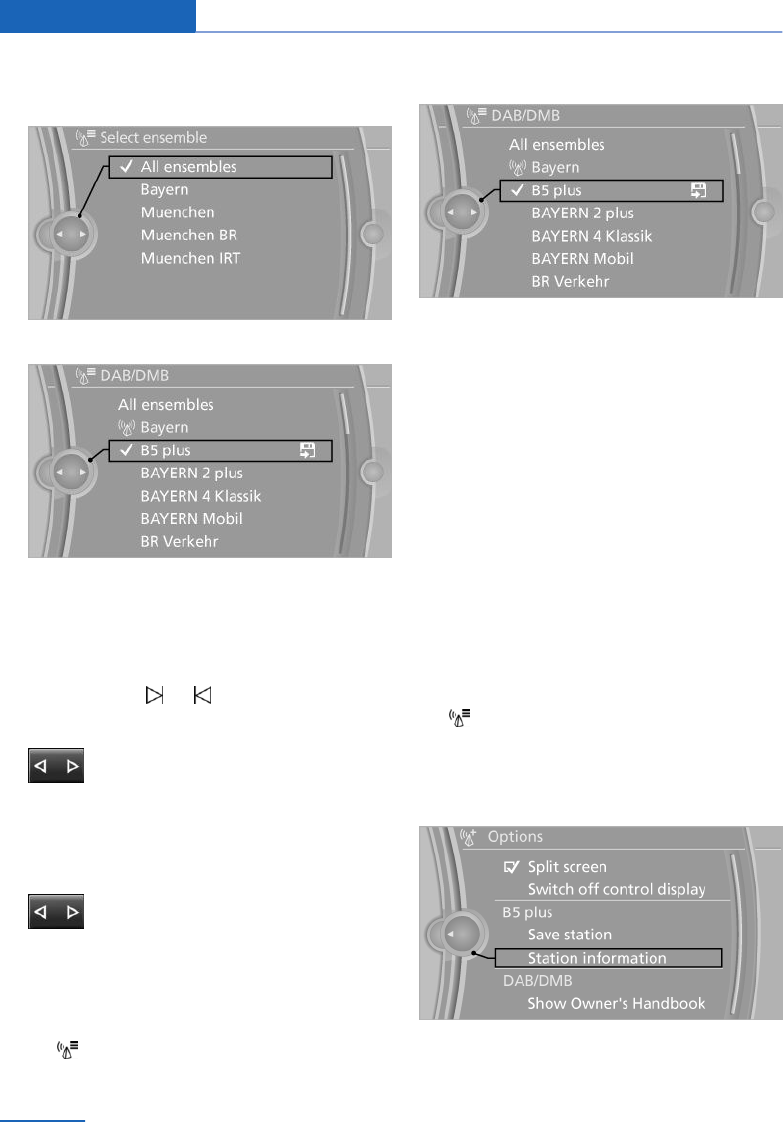
4. Select the top entry in the list: "All
ensembles" or everything shown.
5. Select the desired station.
Some information on the station playing and
schedule is shown. The type of information de
pends on what the station is sending.
Changing stations
Select symbol or .
Or
Press the button.
Changing the ensemble
It is only possible to change the ensemble if the
following has been selected: "All ensembles".
Press and hold down the button.
Saving stations
1. "Radio"
2. "DAB/DMB"
3. "DAB/DMB stations"
4. Select the desired station.
5. Press the controller again.
6. Select the desired memory location.
The stations are saved for the remote control
currently in use.
The stations can also be saved on the favourites
buttons or radio station buttons.
Additional information
If a radio station broadcasts a radio text or radio
text plus, this information can be shown, for ex
ample, title or performer of a piece of music or
the telephone number or e-mail address of the
radio station. Availability, content and sequence
depend on the radio station.
1. "Radio"
2. "DAB/DMB"
3. "DAB/DMB stations"
4. Select the desired station.
5. Call up "Options".
6. "Station information"
Seite 38
Entertainment Radio
38 Online Edition for Part no. 01 40 2 912 836 - 07 12 510
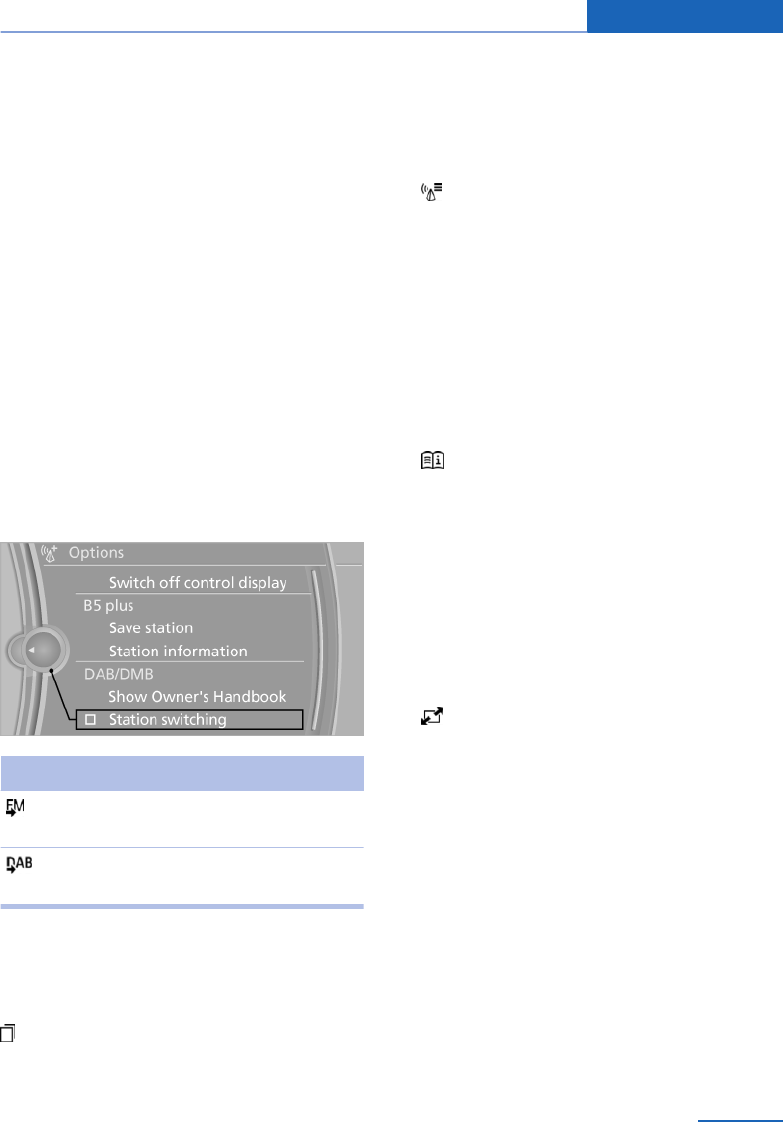
Automatic station following
General
With station following activated, the radio auto
matically switches to a new station when the
previous one can no longer be received.
First of all, a search is run for the station in an
other ensemble. If it is not available in another
ensemble, the station's analogue frequency is
searched for.
Automatic changeover is only possible if the
corresponding station's signal is available in ad
equate quality and the IDs of the stations match.
Enabling automatic station following
1. "Radio"
2. "DAB/DMB"
3. Call up "Options".
4. "Station switching"
Symbol Meaning
A digital station is reproduced in an
alogue.
A digital station is reproduced digi
tally in another group.
The setting is saved for the remote control cur
rently in use.
Additional programmes
Symbol indicates that a selected station con
tains additional programmes. Sports stations,
for example, may broadcast various sports
events at the same time.
1. "Radio"
2. "DAB/DMB"
3. "DAB/DMB stations"
4. Select the desired station.
5. Press the controller.
6. Select the additional station.
Electronic Programme Guide
Several stations broadcast their programme
guide electronically.
1. "Radio"
2. "DAB/DMB"
3. "Programme"
The radio schedule for the programme on now
and next is shown.
Enlarge image
If a radio station transmits images, these are
shown. The image display can be shown en
larged.
1. "Radio"
2. "DAB/DMB"
3. "Enlarge image"
Reduce image again: tip controller to the left.
Saved stations
General
Forty stations can be saved.
Calling up a station
1. "Radio"
2. "Saved stations"
3. Select the desired station.
Seite 39
Radio Entertainment
39
Online Edition for Part no. 01 40 2 912 836 - 07 12 510
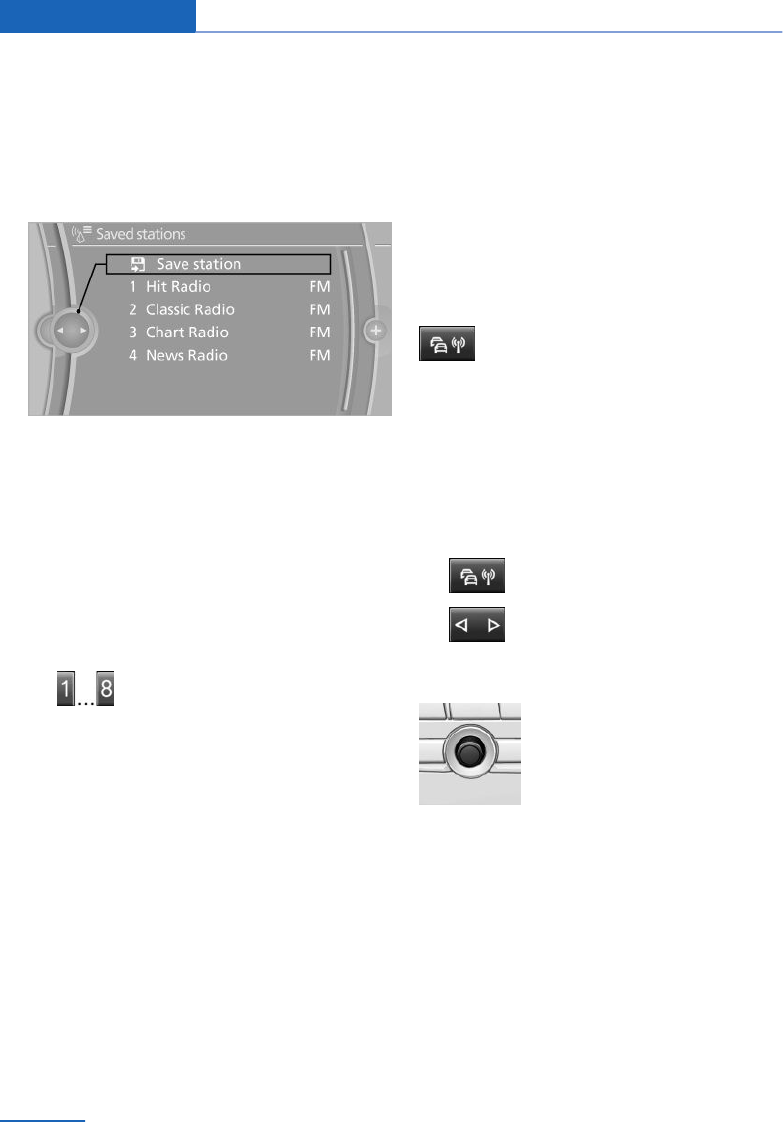
Saving stations
The currently selected station is saved.
1. "Radio"
2. "Saved stations"
3. "Save station"
4. Select the desired memory location.
The list of saved stations is saved for the remote
control currently in use.
The stations can also be saved on the favourites
buttons.
Without navigation system and
telephone: store station on radio
station buttons
1. Select the desired station.
2. Press the desired button for longer
than two seconds.
To call up a stored station, briefly pressure the
corresponding button.
Deleting a station
1. "Radio"
2. "Saved stations"
3. Select the desired station.
4. Call up "Options".
5. "Delete entry"
Traffic reports
Display in the status field
▷TP white: traffic radio switched on, traffic
radio station available.
▷TP grey: traffic radio switched on, no traffic
radio station available.
▷No display: Traffic Program is switched off.
Switching on/off
Press the button.
The traffic report station with the stron
gest reception is chosen.
The setting is saved for the remote control cur
rently in use.
Interrupting
Press one of the following buttons during a traf
fic radio report:
▷
▷
Adjusting the volume
Turn the knob during a traffic re
port until the desired volume is
obtained.
Seite 40
Entertainment Radio
40 Online Edition for Part no. 01 40 2 912 836 - 07 12 510
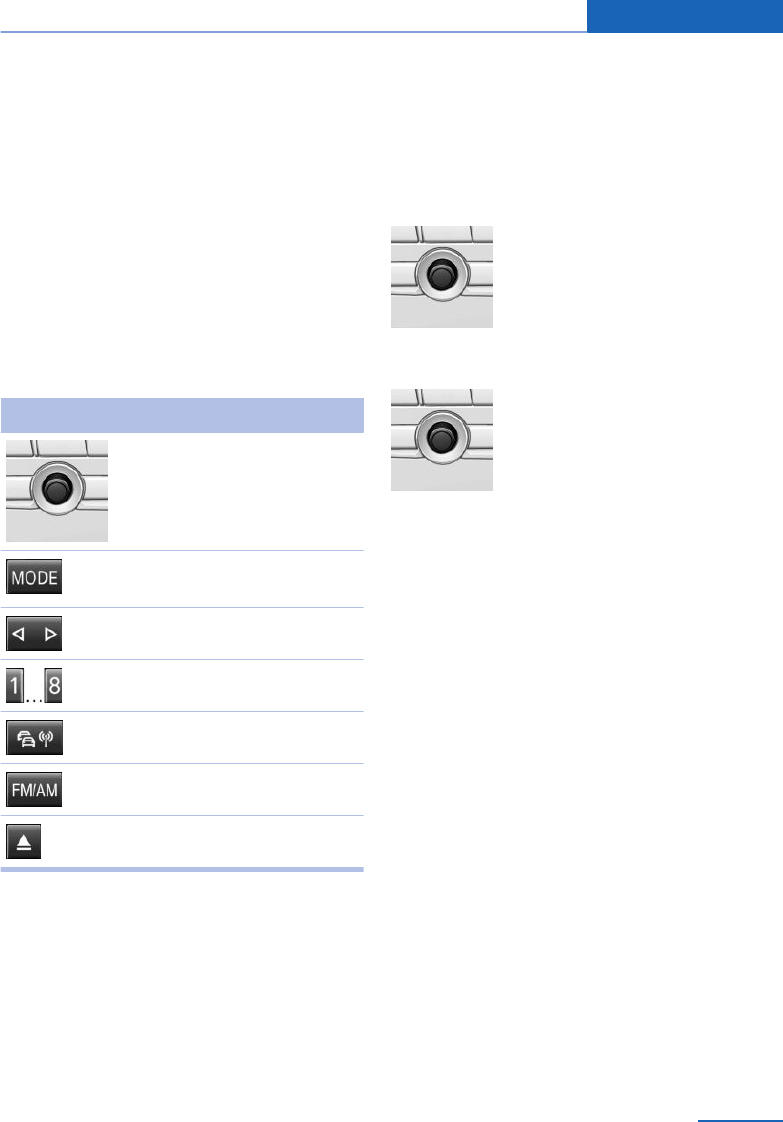
CD/DVD
Vehicle Equipment
This chapter describes all standard, national and
special equipment provided in the model series.
Therefore equipment not available in a vehicle is
also described, for example the selected special
equipment or national version. That also applies
to safety-relevant functions and systems.
Control functions
Press the button Function
Press: switch sound output
on/off.
Turn: set volume.
Switches entertainment
sources.
Change station/track
Favourites buttons
Traffic information on/off
Change waveband
Eject CD/DVD
Sound output
Switching on/off
With the ignition switched off:
press button.
Muting
With the ignition switched on, or
engine running: press button.
Playback
Inserting a CD/ DVD
Insert the CD/DVD with the label side upper
most.
The disk begins to play automatically.
It may take a few minutes to read compressed
audio files.
Starting play
A CD/DVD is in the CD/DVD player or the DVD
changer.
1. "Multimedia"
2. "CD/DVD"
Seite 41
CD/DVD Entertainment
41
Online Edition for Part no. 01 40 2 912 836 - 07 12 510
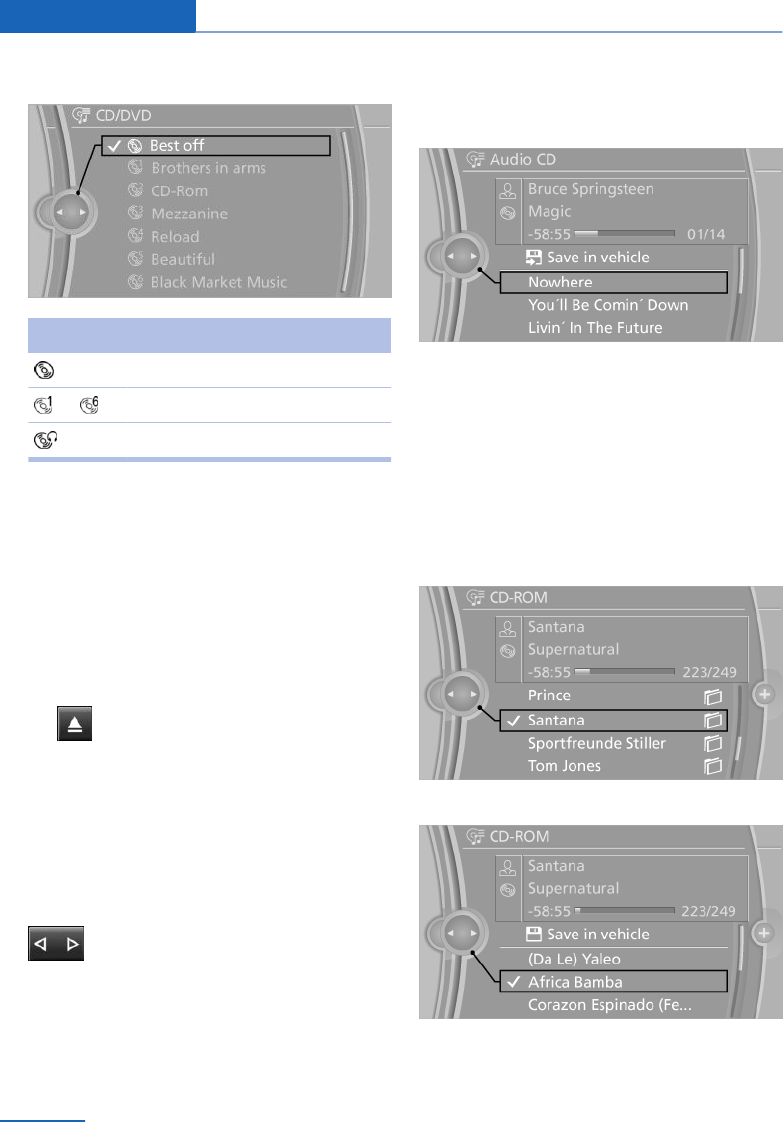
3. Select the desired CD or DVD.
Symbol Meaning
CD/DVD player
... DVD changer
CD/DVD player in the rear
Formats that can be played
▷DVD-ROM, DVD-R, DVD+R, DVD-RW, DVD
+RW, DVD-R DL, DVD+R DL, DVD-Audio,
DVD-Video.
▷CD: CD-ROM, CD-R, CD-RW, CD-DA.
▷Compressed audio files: mp3, wma, aac,
m4a, m4b, ogg.
Remove the CD/DVD
1. Press the button.
The CD/DVD is pushed out slightly.
2. Remove the CD/DVD.
Audio
Selecting a track using button
Press button repeatedly until the de
sired track is played.
Selecting a track using iDrive
Audio CDs
Select the desired track to start playback.
CDs/DVDs with compressed audio files
Depending on the data, it might occur that not
all characters on the CD/DVD are displayed cor
rectly.
1. Select the directory as appropriate.
To change to a higher-level directory: tilt the
controller to the left.
2. Select the desired track to start playback.
Seite 42
Entertainment CD/DVD
42 Online Edition for Part no. 01 40 2 912 836 - 07 12 510
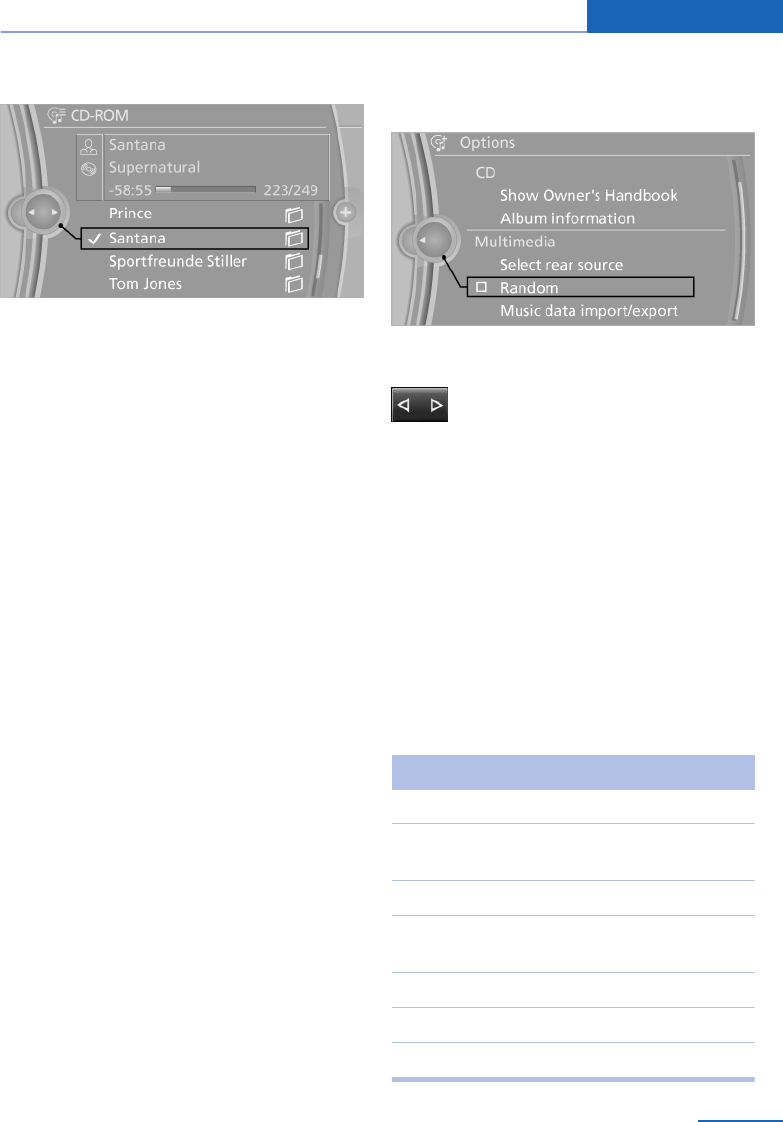
Displaying track information
If information is saved for a track, this is dis
played automatically:
▷Artist.
▷Album name
▷Number of tracks on the CD/DVD.
▷File name of the track.
▷Track image of the CD/DVD.
Updating album information
The album information for a CD is shown auto
matically. If the album information is not shown
correctly, because there are several similar al
bums, the album information can be updated.
1. "Multimedia"
2. "CD/DVD"
3. Call up "Options".
4. "Album information"
5. Select the desired entry.
Random playback
All the tracks on the CD/DVD are played in ran
dom order.
1. "Multimedia"
2. "CD/DVD"
3. Select the desired CD or DVD.
4. Call up "Options".
5. "Random"
Fast forward/rewind
Keep button pressed.
Video
General
The video image is shown on the front control
display up to a speed of approximately 3 km/h.
In some countries, it is only shown with the park
ing brake engaged or in gear position P.
Country codes
Only DVDs with the code of your home region
can be played. See also the information on your
DVD.
Code Region
1 USA, Canada
2 Japan, Europe, Middle East, South Af
rica
3 South-East Asia
4 Australia, Central and South America,
New Zealand
5 North-West Asia, North Africa
6 China
0 All regions
Seite 43
CD/DVD Entertainment
43
Online Edition for Part no. 01 40 2 912 836 - 07 12 510
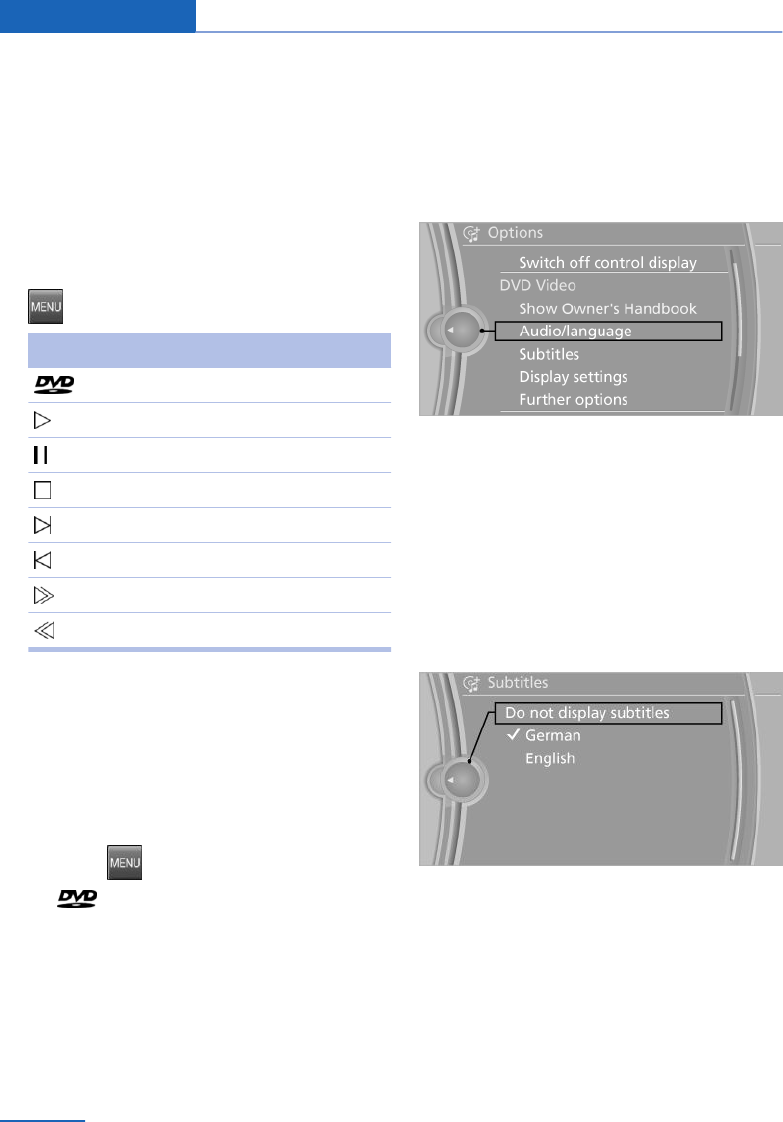
Playback
1. "Multimedia"
2. "CD/DVD"
3. Select a DVD with video content.
4. "Play"
Video menu
To open the Video menu:
Press button during playback.
Symbol Function
Calls up the DVD menu.
Starts playback.
Pause
Stop
Next chapter
Previous chapter
Fast forward
Rewind
For fast forward/rewind: each time the controller
is pressed, the speed increases. To stop, start
playback.
DVD menu
Many DVDs have their own menu. The display
depends on the contents of the DVD.
1. Press button to call up the video menu.
2. "DVD menu"
3. To select menu items: tilt and press the con
troller.
DVD Settings
Depending on the DVD, some settings are only
possible via the DVD menu, see also information
on your DVD.
Selecting language
The languages available depend on the DVD.
1. Turn the controller while the DVD is playing.
2. Call up "Options".
3. "Audio/language"
4. Select the desired language.
Selecting subtitles
The available subtitles depend on the DVD.
1. Turn the controller while the DVD is playing.
2. Call up "Options".
3. "Subtitles"
4. Select the desired language or "Do not
display subtitles".
Setting the brightness, contrast, colour
1. Turn the controller while the DVD is playing.
2. Call up "Options".
3. "Display settings"
Seite 44
Entertainment CD/DVD
44 Online Edition for Part no. 01 40 2 912 836 - 07 12 510
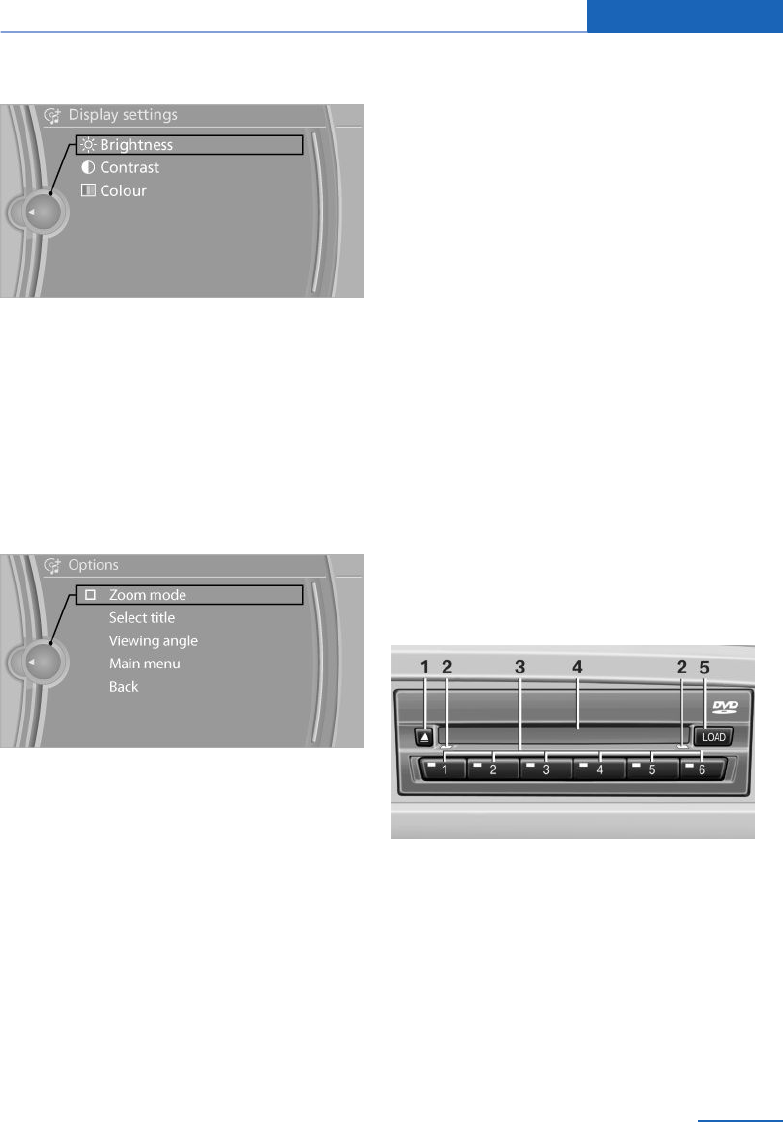
4. "Brightness", "Contrast" or "Colour"
5. Turn the controller until the desired setting
is reached and press the controller.
Selecting zoom
Display video picture over full screen.
1. Turn the controller while the DVD is playing.
2. Call up "Options".
3. "Further options"
4. "Zoom mode"
Selecting title
DVD video:
1. With the DVD menu displayed, turn the con
troller.
2. Call up "Options".
3. "Further options"
4. "Select title"
5. Select the desired title.
Select camera angle
The availability of an alternative camera angle
depends on the DVD and the current track on
the DVD.
1. Turn the controller while the DVD is playing.
2. Call up "Options".
3. "Further options"
4. "Viewing angle"
5. Select the desired angle of view.
Calling up the main menu, Back
These functions are not included on every DVD.
Therefore, they may not be available for use.
DVD changer
General
The DVD changer is located, depending on the
vehicle, in the glove box, through the glove box
or in the boot behind the left side trim.
Overview
1Emptying the DVD compartments
2LED on the DVD compartment
3Buttons for DVD compartments
4DVD compartment
5Filling the DVD compartments
Seite 45
CD/DVD Entertainment
45
Online Edition for Part no. 01 40 2 912 836 - 07 12 510
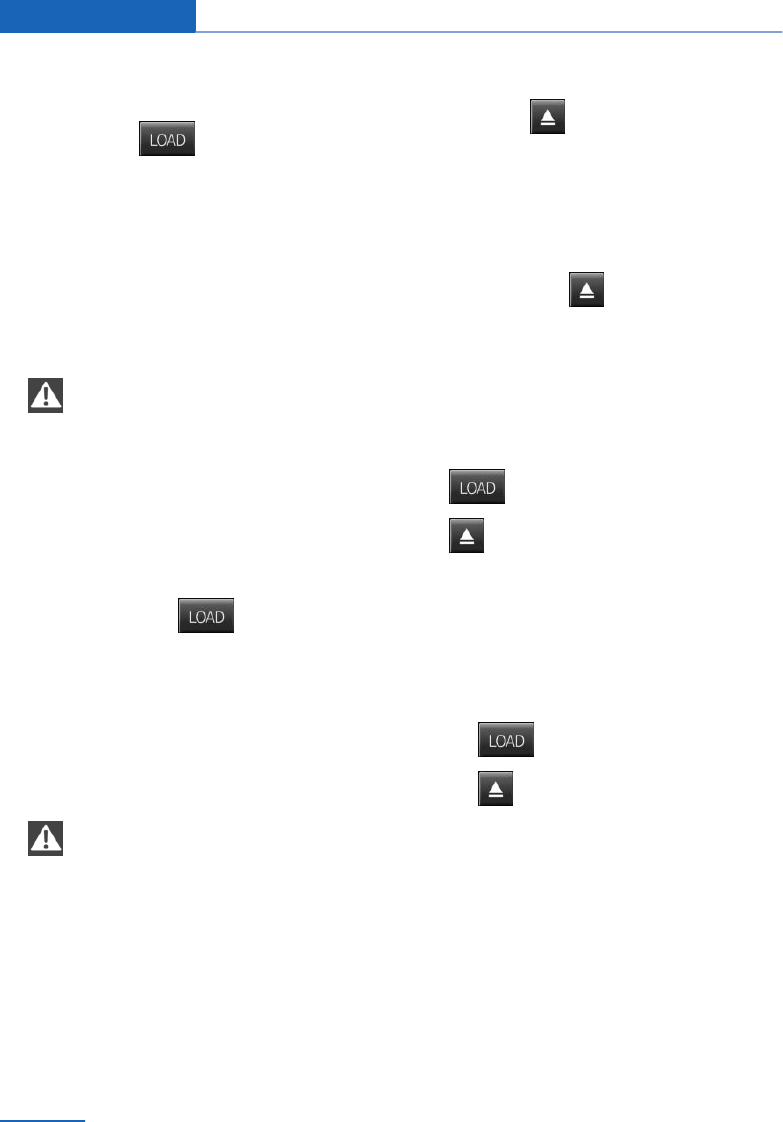
Filling the DVD compartments
individually
1. Press the button once.
The LED on the first vacant compartment
flashes.
2. Select a different compartment if necessary.
3. Wait until the LEDs on the DVD compart
ment flash.
4. Insert a single CD or DVD in the centre.
The CD/DVD is pulled in automatically and
stored in the selected compartment.
Inserting CDs/DVDs
Only insert CD/DVD if the LEDs on the
DVD compartment are flashing, otherwise the
CD/DVD or the DVD changer could be damaged.
Do not force the CD/DVD into the drive; it could
jam and you might not be able to eject it.◀
Filling all the available DVD
compartments
1. Hold down the button once.
The LEDs on the vacant compartments
flash.
2. Wait until the LEDs on the DVD compart
ment flash and then insert a CD or DVD,
making sure it is centred.
The CDs/DVDs are drawn in automatically
and stowed in the empty compartments.
Inserting CDs/DVDs
Only insert CD/DVD if the LEDs on the
DVD compartment are flashing, otherwise the
CD/DVD or the DVD changer could be damaged.
Do not force the CD/DVD into the drive; it could
jam and you might not be able to eject it.◀
It may take a few minutes to read the CDs/DVDs
after loading.
Removing CDs/DVDs individually
1. Press the button once.
2. Select the DVD compartment.
The CD/DVD is pushed out slightly.
3. Remove the CD/DVD.
Removing all CDs/DVDs
1. Hold down the button once.
2. Remove the CDs/DVDs.
Interrupt function
Filling the DVD trays or removing the CDs/DVDs
may be interrupted.
Press the appropriate button.
▷
▷
Faults
If the LEDs on the DVD slot and the LEDs on the
DVD trays flash rapidly, there is a fault.
Repairing the fault:
1. Press one of the following buttons:
▷
▷
The last CD/DVD inserted is pushed out
slightly.
2. Remove the CD/DVD.
When the LEDs are no longer flashing quickly,
the DVD changer is operational again.
Playing audio tracks
The audio track of a DVD can be played even if
video playback is not possible in the vehicle.
Only the main film is played, without intro or ex
tras.
Seite 46
Entertainment CD/DVD
46 Online Edition for Part no. 01 40 2 912 836 - 07 12 510
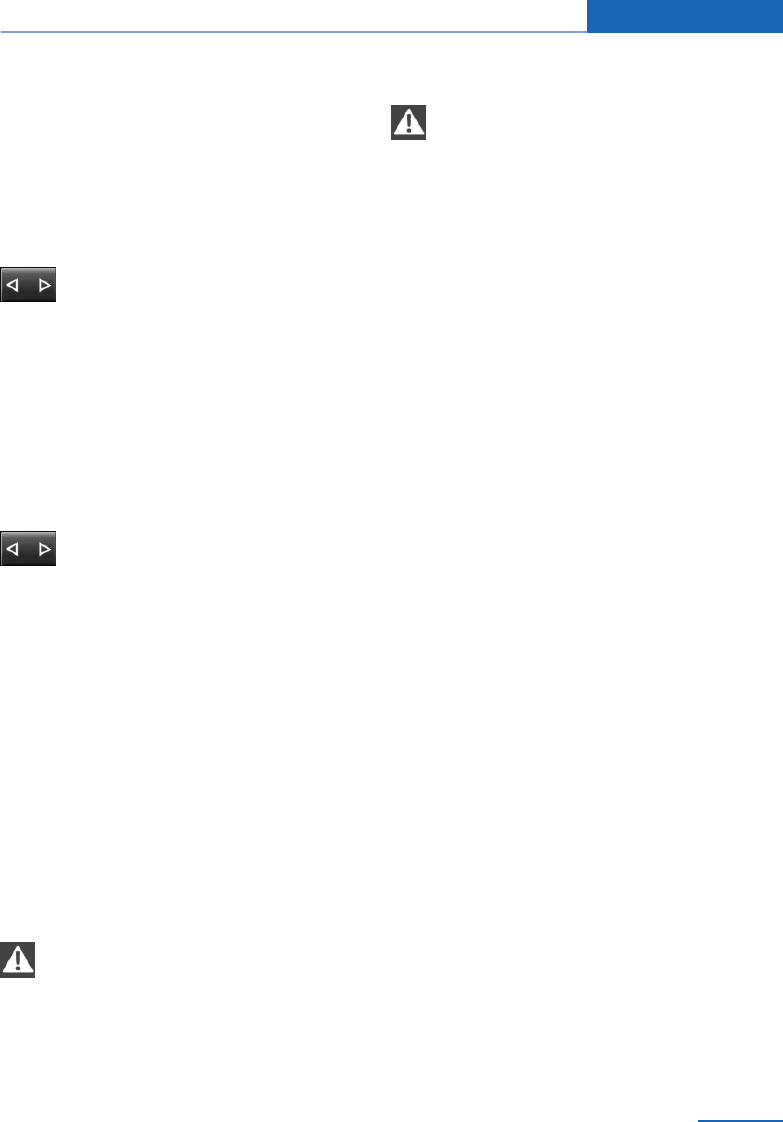
Starting play
There is a DVD in the DVD changer.
1. "Multimedia"
2. "CD/DVD"
3. Select the desired DVD.
Selecting a chapter using the button
Press button repeatedly until the de
sired chapter is played.
Selecting a chapter using iDrive
1. "Multimedia"
2. "CD/DVD"
3. Select the desired DVD.
4. Select the desired chapter.
Fast forward/rewind
Keep button pressed.
Selecting language
The languages available depend on the DVD.
1. "Multimedia"
2. "CD/DVD"
3. Select the desired DVD.
4. Call up "Options".
5. "Audio/language"
6. Select the desired language.
Notes
CD/DVD player and changer
Do not remove the cover
All BMW CD/DVD players and changers
are Class 1 laser products. Do not operate when
the cover is damaged, otherwise it could cause
severe eye injuries.◀
CDs and DVDs
Using CDs/DVDs
▷Do not use CDs/DVDs with adhesive
labels that have been affixed subse
quently, as these may peel off while in
the drive as a result of the tempera
tures to which these media are ex
posed during playing. This could dam
age the system irreparably.
▷Use only round CDs/DVDs with a standard
diameter of 12 cm and do not use CDs/DVDs
in conjunction with adapters, for example
CD singles. Otherwise the CDs or the
adapter could jam and be impossible to
eject.
▷Do not use combined CD/DVDs, for example
DVD Plus, as otherwise the CD/DVD could
jam and be impossible to eject.◀
General malfunctions
▷The CD/DVD players and changers have
been optimised for operation in your vehicle.
In some instances, they may be more sen
sitive to faulty CDs/DVDs than devices for
stationary use.
▷If a CD/DVD cannot be played back, first
check whether it has been inserted cor
rectly.
Atmospheric humidity
The CD/DVD or the focussing lens can carry
condensation due to high humidity and playback
may temporarily not be possible.
Malfunctions with individual CDs/DVDs
If malfunctions occur only with individual CDs/
DVDs, this can be due to one of the following:
Self-recorded CDs/DVDs
▷With self-recorded CDs/DVDs, possible
causes include inconsistent data-creation
or burning process, low quality or high age
of the CD/DVD blank.
Seite 47
CD/DVD Entertainment
47
Online Edition for Part no. 01 40 2 912 836 - 07 12 510
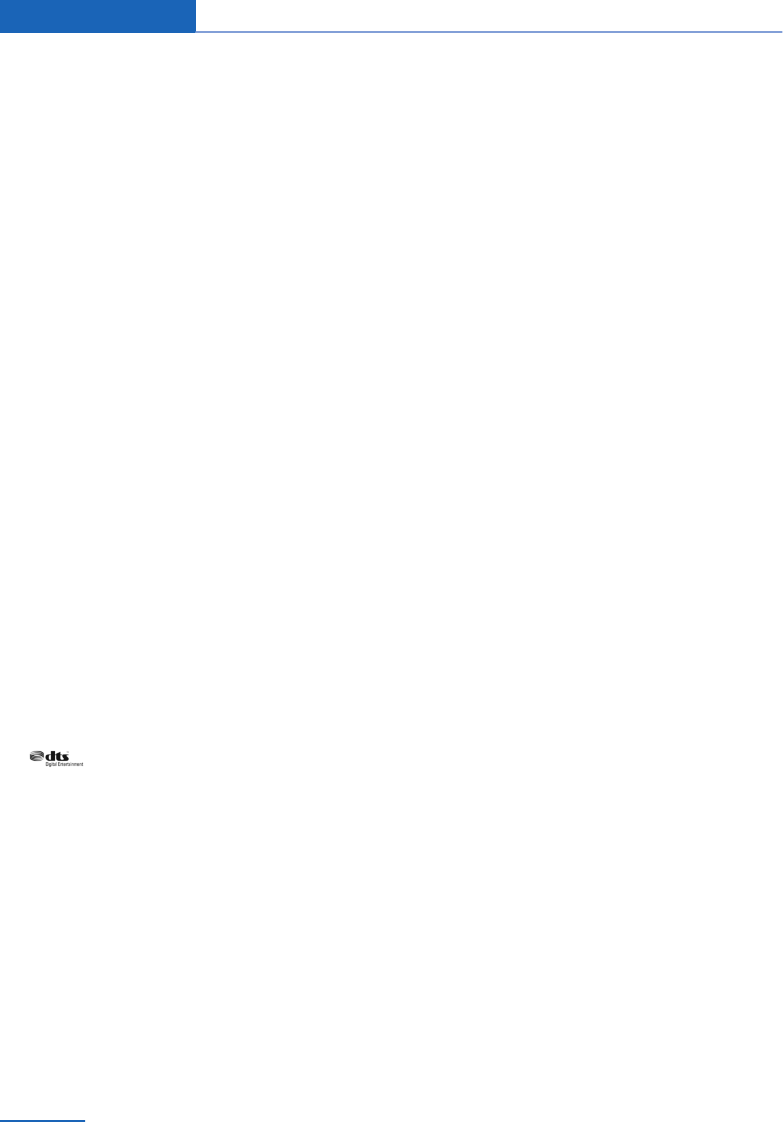
▷Only write on the upper side of CDs/DVDs
using a special marker pen.
Damage
▷Avoid causing fingerprints and protect
against dust, scratches and moisture.
▷Store CDs/DVDs in a case.
▷Do not expose CDs/DVDs to temperatures
above 50 ℃, high levels of humidity or direct
sunlight.
CDs/DVDs with copy protection
CDs/DVDs are often copy-protected by the
manufacturer. This could result in CDs/DVDs
being impossible to play, or only being playable
with restrictions.
MACROVISION
This product contains copyrighted technology
based on a number of registered US patents and
intellectual property of the Macrovision Corpo
ration and other manufacturers. The use of this
copy protection must be approved by Macrovi
sion. Media with the corresponding protection –
unless otherwise agreed with Macrovision – may
only be shown privately. It is prohibited to copy
this technology.
DTS Digital Surround™
Manufactured under licence of US pat
ent numbers: 5,451,942; 5,956,674;
5,974,380; 5,978,762; 6,487,535 & and other
patents issued and applied for in the USA and
worldwide. DTS and the logo are registered
trademarks & DTS Digital Surround and the DTS
logos are trademarks of DTS Inc. © DTS, Inc. All
rights reserved.
Seite 48
Entertainment CD/DVD
48 Online Edition for Part no. 01 40 2 912 836 - 07 12 510
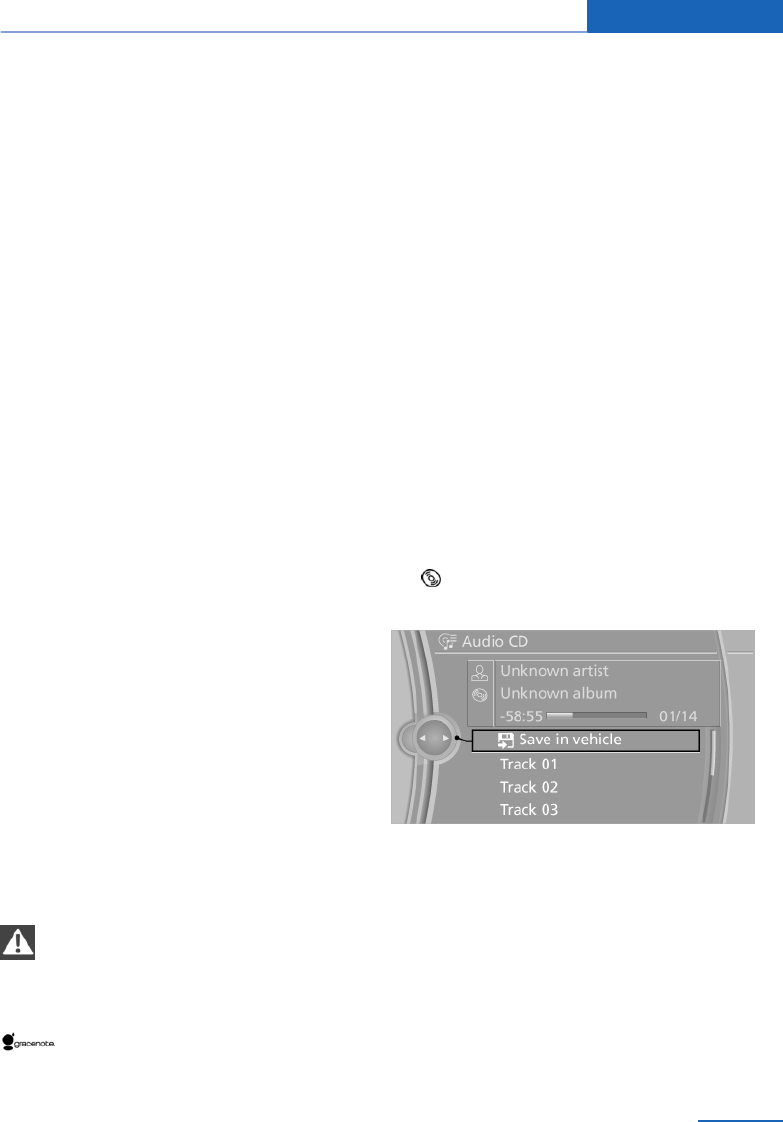
Music collection
Vehicle Equipment
This chapter describes all standard, national and
special equipment provided in the model series.
Therefore equipment not available in a vehicle is
also described, for example the selected special
equipment or national version. That also applies
to safety-relevant functions and systems.
Music memory
Principle
Tracks from CDs/DVDs and USB media can be
saved in the music collection on a hard disk in
the vehicle and played from there.
General
▷Audio CD: tracks are converted into a com
pressed audio format. Information on the al
bum, for example artist, is saved, if applica
ble.
▷CD/DVD or USB medium with compressed
audio files: the entire content of the CD/DVD
or USB medium is saved as an album in the
vehicle. All audio files with the formats sup
ported, see page 42, in the vehicle are
stored. Tracks and directories can be de
leted later individually, Delete tracks and di
rectory, see page 54.
Notes
Tracks with copy protection, DRM, are saved,
but cannot be played.
Backing up music data
Back up music data regularly, as otherwise
it could be lost in the event of a fault in the hard
disk.◀
Music recognition technology and re
lated data are provided by Gracenote®.
Gracenote is the industry standard in music rec
ognition technology and related content deliv
ery. For more information, please visit
www.gracenote.com.
CD and music-related data from Gracenote, Inc.,
copyright © 2000-2009 Gracenote. Gracenote
Software, copyright © 2000-2009 Gracenote.
This product and service may practice one or
more of the following U.S. Patents: #5.987.525;
#6.061.680; #6.154.773, #6.161.132,
#6.230.192, #6.230.207, #6.240.459,
#6.330.593, and other patents issued or pend
ing. Some services supplied under license from
Open Globe, Inc. for U.S. Patent: #6.304.523.
Saving from CD/DVD
1. Insert a CD or DVD in the CD/DVD player.
2. "Multimedia"
3. "CD/DVD"
4. Select the symbol for the CD/DVD player.
5. "Save in vehicle"
The music collection is displayed and the first
track of the CD/DVD is played. The tracks are
played in the normal order during saving.
During saving, bear the following in mind:
Do not switch to the CD/DVD player and do not
remove the CD from the CD/DVD player, as oth
erwise saving is interrupted. It is possible to
change over to the other audio sources without
interrupting saving. Tracks of the current CD/
DVD that have already been saved can also be
called up.
Seite 49
Music collection Entertainment
49
Online Edition for Part no. 01 40 2 912 836 - 07 12 510
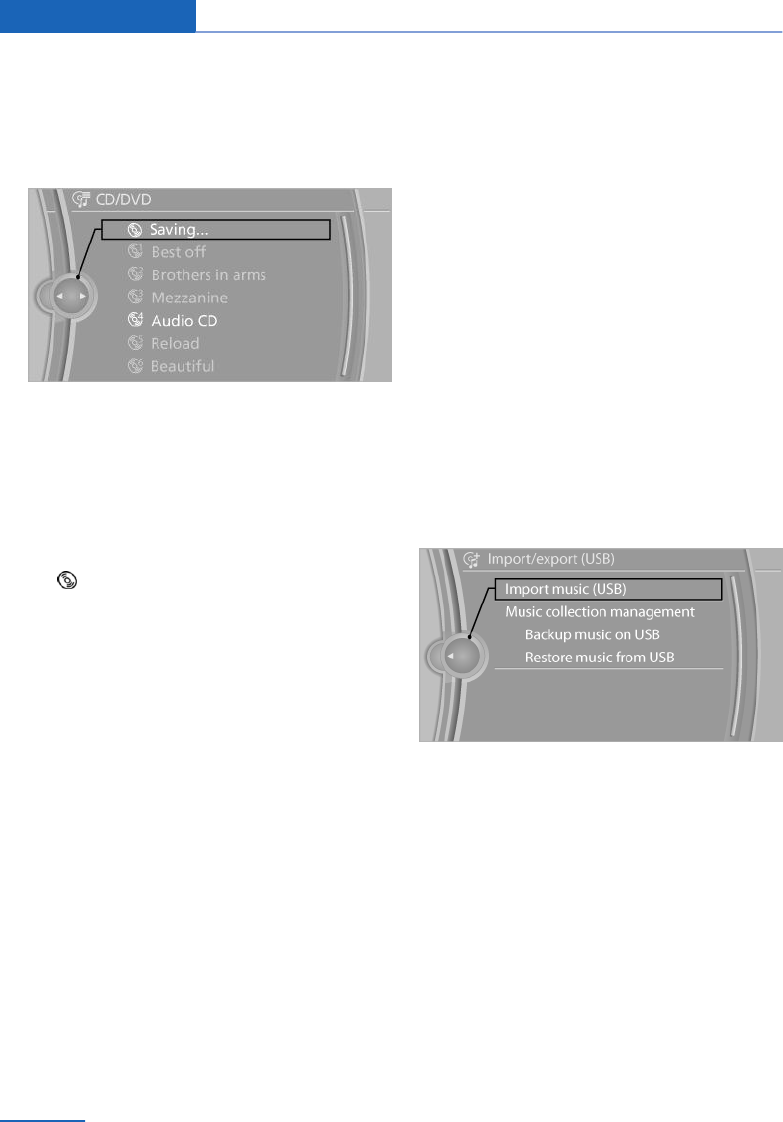
Interrupting saving
1. "Multimedia"
2. "CD/DVD"
3. "Saving..."
4. "Cancel saving"
The saving process is interrupted and can be
continued at any time.
Resuming saving
1. "Multimedia"
2. "CD/DVD"
3. Select the symbol for the CD/DVD player.
4. "Continue saving"
CD/DVD saving is continued at the start of the
track for which saving was interrupted.
Information on the album
During the saving process, the information, for
example the name of the artist, is saved for the
tracks if this information is available in the data
base in the vehicle or on the CD.
To update the database, contact your Service
centre.
If no information is saved for the tracks, it might
be possible to update the entire album informa
tion, see page 54, of the CD via BMW Online.
Saving from a USB medium
To save music, a suitable medium must be con
nected to the USB interface in the centre arm
rest.
▷Suitable media: USB mass storage facilities,
for example USB memory sticks or MP3
players with USB interface.
▷Unsuitable media: USB hard disks, USB
hubs, USB memory card readers with a
number of bays, Apple iPod/iPhone. Music
from an Apple iPod/iPhone can be played in
the AUX-IN port or USB interface in the cen
tre armrest.
▷File systems: current file systems for USB
devices are supported. FAT 32 format is
recommended.
1. Connect USB medium to the USB interface
in the centre armrest.
2. "Multimedia"
3. "Music collection"
4. Call up "Options".
5. "Music data import/export"
6. "Import music (USB)"
Playing music
Music search
All tracks for which information is saved can be
called up via music search. All tracks for which
no information is saved can be called up via the
music directory.
1. "Multimedia"
2. "Music collection"
Seite 50
Entertainment Music collection
50 Online Edition for Part no. 01 40 2 912 836 - 07 12 510
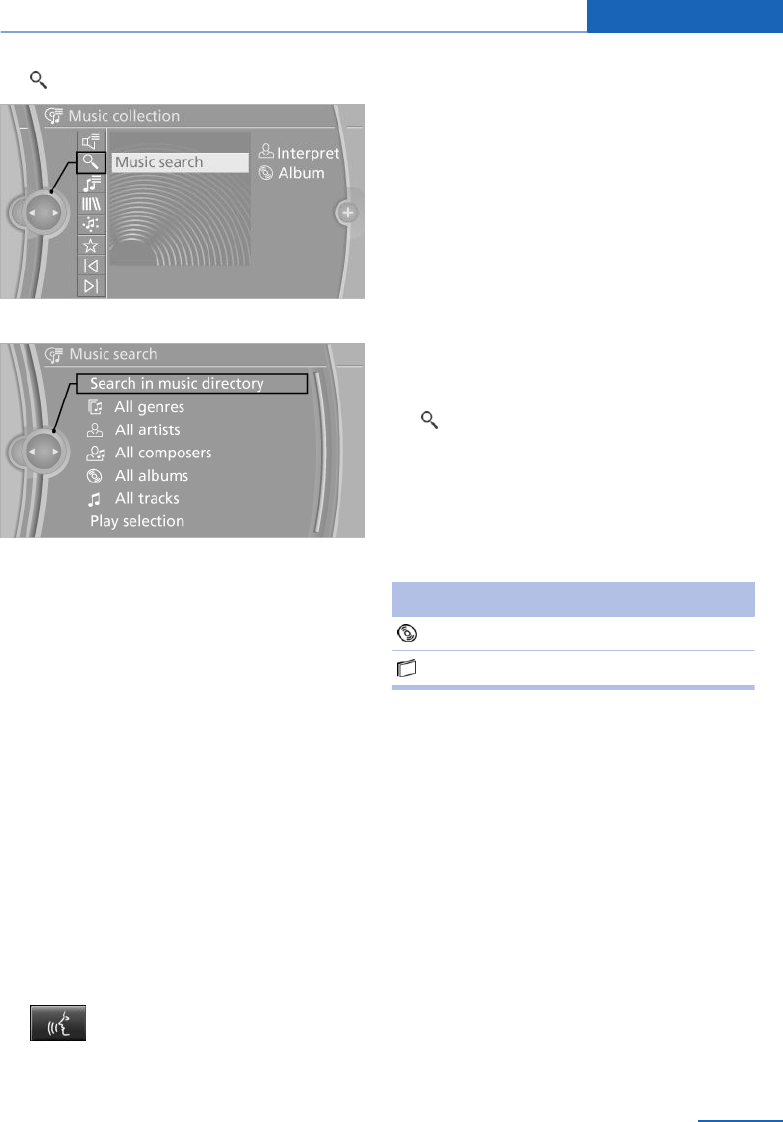
3. "Music search"
4. Select the desired category.
5. Select the desired entry:
▷Select "A-Z search" and make the de
sired entry.
All entries containing the character
string entered are listed, even if this is
not at the start of the entry.
▷Select the desired entry from the list.
6. Select further categories as appropriate.
The tracks found are listed in alphabetical
order.
7. "Play selection"
Starting new music search
"Reset search"
Music search using voice control
For the handbook for the voice control system,
see Owner's Handbook for the vehicle.
1. Press the button on the steering
wheel.
2. Music search
3. Call up the desired category, for exam
ple Select artist.
4. Say the desired entry from the list.
5. Select further categories as appropriate.
Selecting the track directly: Track ....
Say the spoken command and the name of the
desired track together in one command.
Music Directory
All albums stored are listed in the music direc
tory.
1. "Multimedia"
2. "Music collection"
3. "Music search"
4. "Search folder"
All directories stores are shown as a list.
5. Select desired directory.
To change to a higher-level directory: tilt the
controller to the left.
Symbol Format
Audio CD
Compressed audio files
Sort music directory
The list can be sorted alphabetically by name or
by storage date.
1. "Sorting"
2. "By name" or "By date"
Currently playing
Listing of the track which is currently being
played back. For example, the list of tracks found
via the music search, a playlist or list of similar
tracks found.
1. "Multimedia"
2. "Music collection"
Seite 51
Music collection Entertainment
51
Online Edition for Part no. 01 40 2 912 836 - 07 12 510
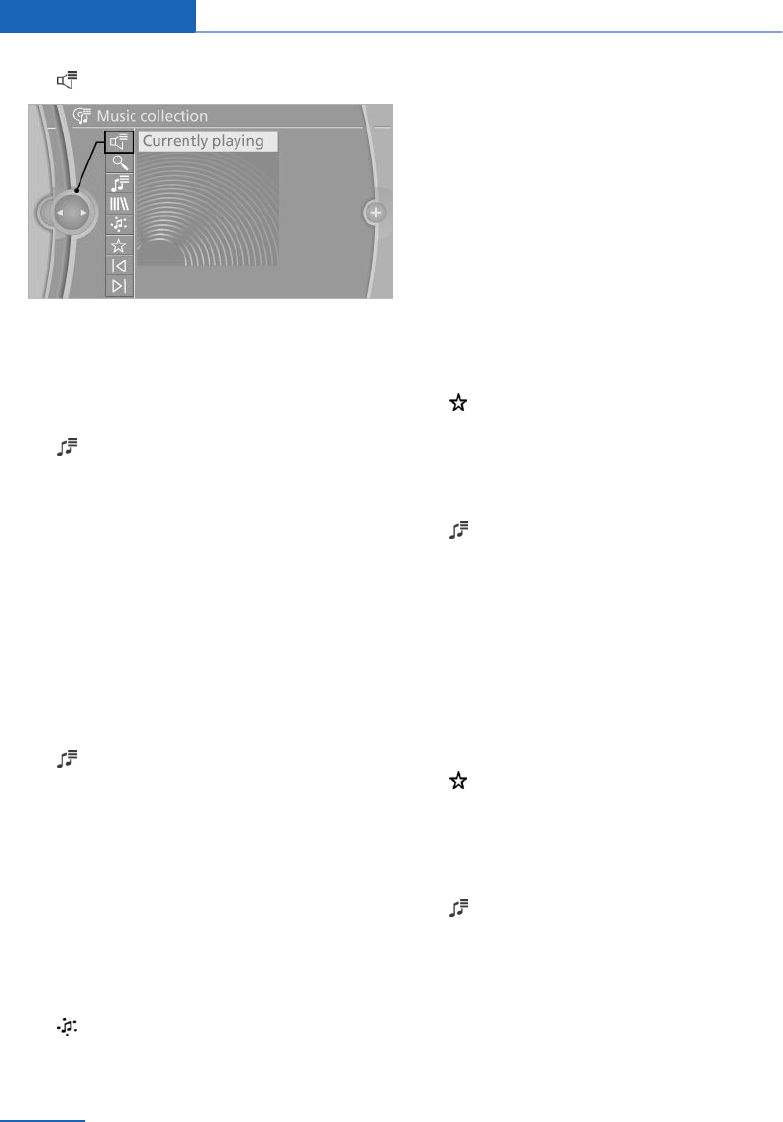
3. "Currently playing"
4. If applicable, select the desired track.
Playlists
1. "Multimedia"
2. "Music collection"
3. "Playlists"
The following lists are shown:
▷"My favourites"
All tracks which have been marked as fa
vourite.
▷"Top 50"
The 50 most played tracks.
▷"More music like this"
All playlists which have be automatically cre
ated by searching for similar music.
Delete playlist
1. "Playlists"
2. Mark playlist which is to be deleted.
3. Call up "Options".
4. "Delete playlist"
Similar music
Music stored in the vehicle similar to the track
currently playing can be searched for.
1. "Multimedia"
2. "Music collection"
3. "More like this (local)"
A playlist with the track found is stored.
A maximum of 100 titles are stored. The number
of playlists is restricted and an old playlist may
be deleted when storing a new one.
Favourites
If a track is currently being played, this can be
marked and stored as a favourite.
Store track as a favourite
A track must be currently be playing to store it
as a favourite.
1. "Multimedia"
2. "Music collection"
3. "Add to favourites"
Calling up stored favourites
1. "Multimedia"
2. "Music collection"
3. "Playlists"
4. "My favourites"
5. Select the desired title.
The favourites can be stored in the vehicle as a
playlist, see page 52.
Deleting individual tracks from
favourites
1. The track which is to be deleted from the list
of favourites is to be called up.
2. "Delete from favourites"
Delete individual track from favourites
Individual or other tracks can be deleted from
favourites.
1. "Playlists"
2. "My favourites"
3. Call up "Options".
4. "Delete all tracks from favourites"
Seite 52
Entertainment Music collection
52 Online Edition for Part no. 01 40 2 912 836 - 07 12 510
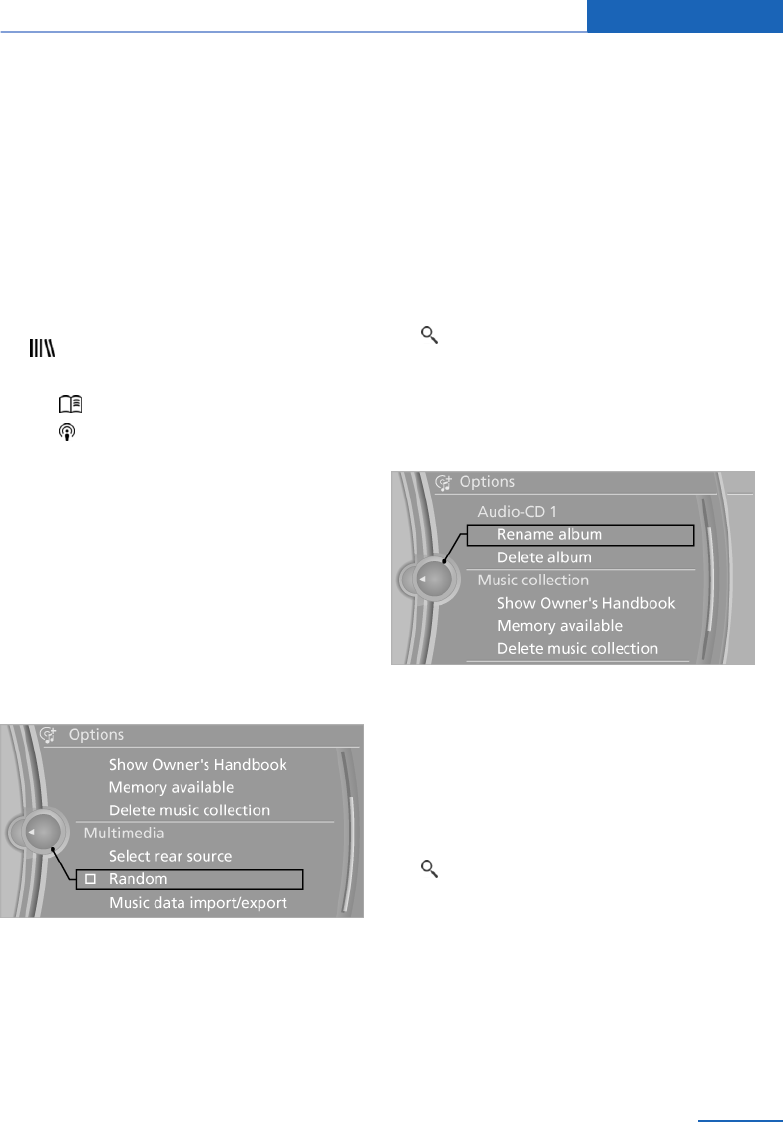
Store favourites as playlists
The list of favourites can be stored in the vehicle
as a playlist.
1. "My favourites"
2. Call up "Options".
3. "Save as playlist"
Audio books and podcasts
Audio books and podcasts can be called up sep
arately.
1. "More media"
2. Call up desired entry:
▷ "Audio books"
▷ "Podcasts"
3. Select the directory as appropriate.
4. Call up desired file.
Random playback
All the tracks in the selection are played in ran
dom order.
1. "Multimedia"
2. "Music collection"
3. Call up "Options".
4. "Random"
Managing music
Music Directory
Rename folder or track
If applicable, the name of the album is entered
automatically during saving. If the name is un
known it can also be changed.
1. "Multimedia"
2. "Music collection"
3. "Music search"
4. "Search folder"
5. Mark desired folder or title.
6. Call up "Options".
7. "Rename track" or "Rename folder"
8. Select the letters individually.
Delete directory
A directory cannot be deleted if a track is being
played back directly from it.
1. "Multimedia"
2. "Music collection"
3. "Music search"
4. "Search folder"
5. Mark desired directory.
6. Call up "Options".
7. "Delete directory"
Seite 53
Music collection Entertainment
53
Online Edition for Part no. 01 40 2 912 836 - 07 12 510
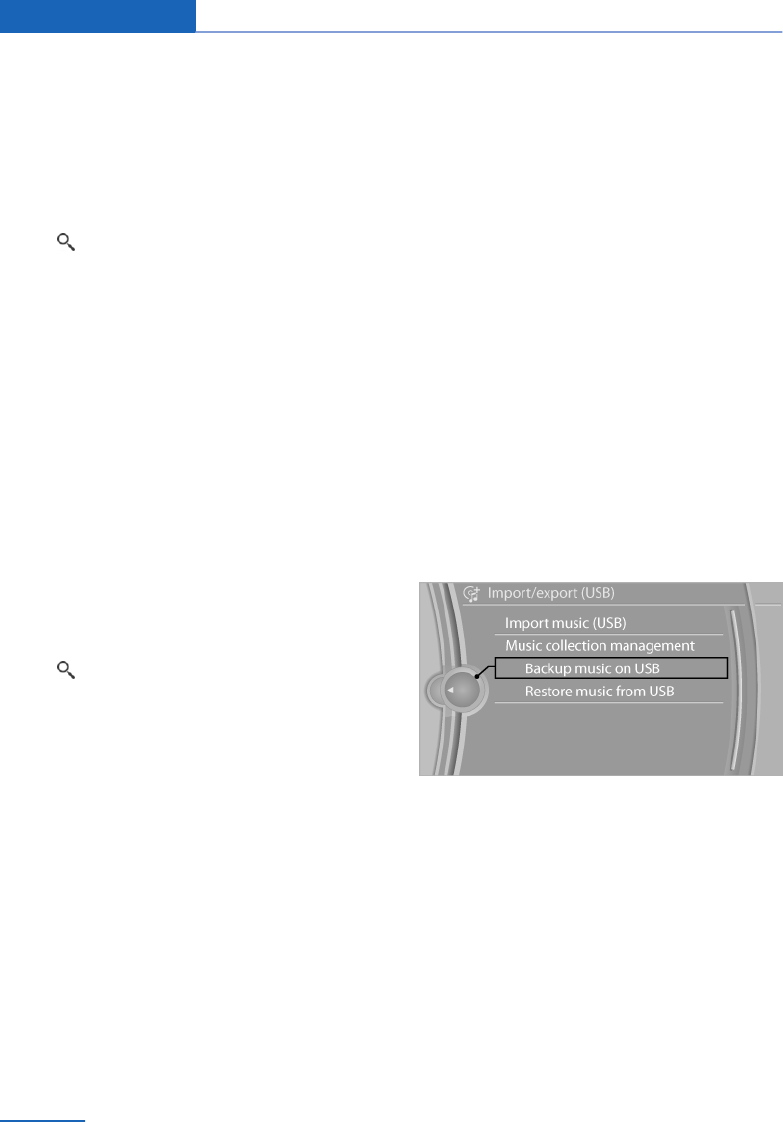
Delete track and folder
It may not be possible to delete a track while it
is being played. A folder cannot be deleted if a
track is being played back directly from it.
1. "Multimedia"
2. "Music collection"
3. "Music search"
4. "Search folder"
5. Highlight the folder or track.
6. Call up "Options".
7. "Delete folder" or "Delete track"
Album information
If no information was saved for audio CDs during
saving, it can be updated later via BMW Online
as required.
The update takes place for each individual al
bum.
Updating album information via BMW
Online
1. "Multimedia"
2. "Music collection"
3. "Music search"
4. "Search folder"
5. Highlight the desired album.
6. Call up "Options".
7. "Album information"
8. "Update album information"
If it was possible to save the album information,
the name of the album is displayed.
Free capacity
Display free capacity in the music collection.
1. "Multimedia"
2. "Music collection"
3. Call up "Options".
4. "Manage music collection"
5. "Memory available"
Music collection
Backing up music collection
The entire music collection can be backed up on
a USB medium. Ensure that the USB medium
has adequate free capacity.
Depending on the number of tracks, backing up
the music collection can take up to two hours.
This is why it is best to make the backup during
a longer journey. If the backup cannot be cre
ated, do not remove USB medium, the back-up
will be continued on the next journey.
1. Start the engine.
2. Connect USB medium to the USB interface
in the centre armrest.
3. "Multimedia"
4. "Music collection"
5. Call up "Options".
6. "Music data import/export"
7. "Backup music on USB"
Saving music collection to the vehicle
When the music collection is saved from a USB
medium to the vehicle the existing music col
lection in the vehicle is replaced. It is best to
make the backup during a longer journey. If it
cannot be saved, do not remove USB medium,
the saving will be continued on the next journey.
1. "Multimedia"
2. "Music collection"
3. Call up "Options".
Seite 54
Entertainment Music collection
54 Online Edition for Part no. 01 40 2 912 836 - 07 12 510

4. "Music data import/export"
5. "Restore music from USB"
Deleting music collection
1. "Multimedia"
2. "Music collection"
3. Call up "Options".
4. "Manage music collection"
5. "Delete music"
6. Select any category, the tracks of which are
to be deleted.
7. "Delete music"
Seite 55
Music collection Entertainment
55
Online Edition for Part no. 01 40 2 912 836 - 07 12 510
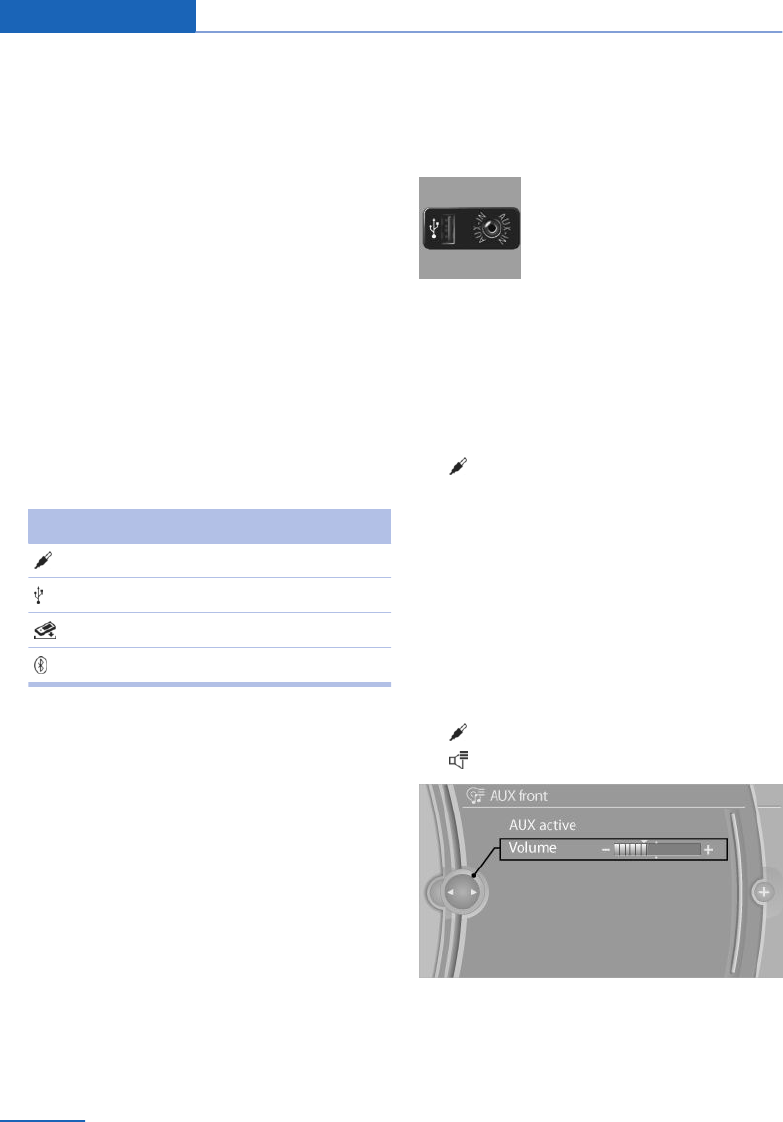
External devices
Vehicle Equipment
This chapter describes all standard, national and
special equipment provided in the model series.
Therefore equipment not available in a vehicle is
also described, for example the selected special
equipment or national version. That also applies
to safety-relevant functions and systems.
Principle
Various external devices can be connected to
the vehicle. Sound output is via the vehicle loud
speakers. Depending on how the external de
vice is connected to the vehicle, it can be oper
ating using iDrive.
Symbol Meaning
AUX-IN port
USB audio interface
Music interface for smartphones
Bluetooth audio
AUX-IN port
Overview
▷Connection of audio devices is possible, for
example MP3 players. The sound output is
via the vehicle loudspeakers.
▷Recommendation: medium sound and vol
ume settings on the audio device. The
sound might depend on the quality of the
audio files.
Connecting
AUX-IN port is in the centre con
sole.
Connect the headphones or line-
out connection of the equipment
to the jack connector.
Playback
1. Connect the audio device, switch it on and
select a track.
2. "Multimedia"
3. "External devices"
4. "AUX front"
Volume control
The volume of the sound output depends on the
audio device. If this volume differs significantly
from other audio sources, it makes sense to bal
ance the volumes.
Adjust volume
1. "Multimedia"
2. "External devices"
3. "AUX front"
4. "Volume"
5. Turn the controller until the desired volume
setting is reached and press the controller.
Seite 56
Entertainment External devices
56 Online Edition for Part no. 01 40 2 912 836 - 07 12 510
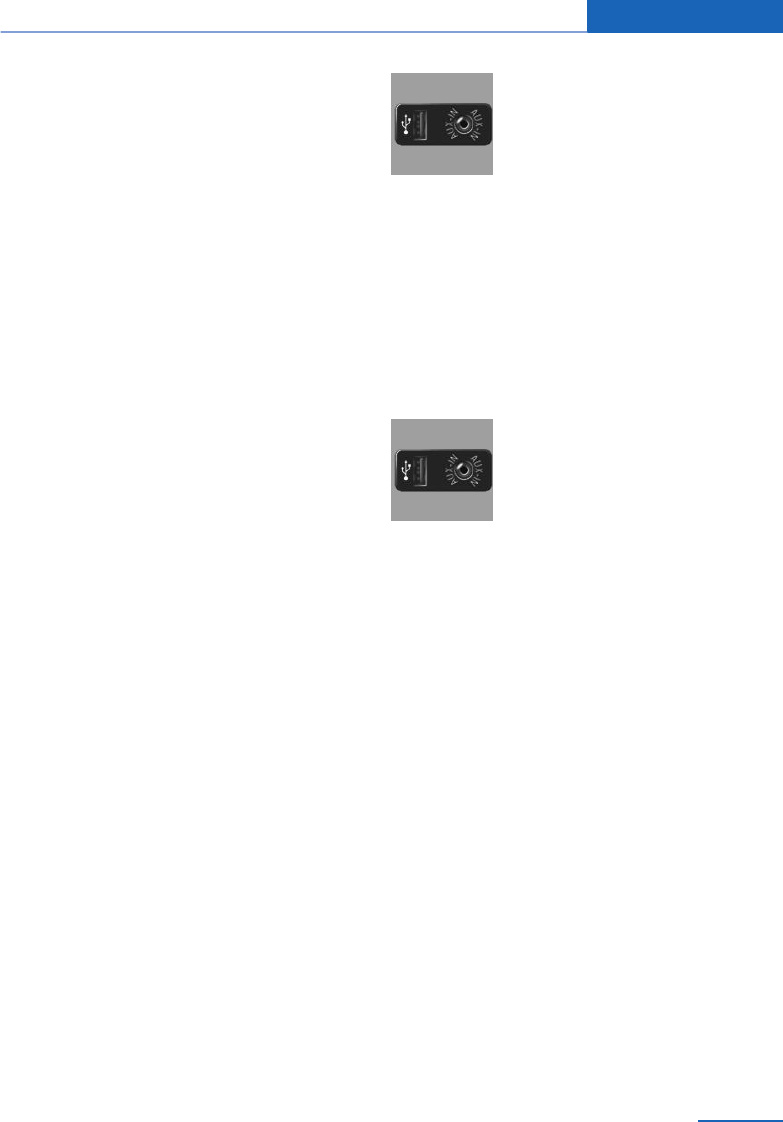
USB audio interface /music
interface for smartphones
Overview
External devices can be connected, Operation
is done using the iDrive. The sound output is via
the vehicle loudspeakers.
Connection options for external
devices
▷Connection is via USB audio interface: Ap
ple iPod/iPhone, USB devices, for example
MP3 player, USB memory sticks or mobile
phones that are supported by the USB audio
interface.
▷Connection via snap-in adapter, for equip
ment with music interface for smartphones:
Apple iPhone or mobile phones.
Due to the large variety of the audio devices
available on the market, operation using the ve
hicle cannot be ensured for every device/mobile
phone.
Ask at your Service centre regarding suitable
devices/mobile phones.
Audio files
Normal audio files, video files and playlists can
be reproduced.
File systems
Current file systems for USB devices are sup
ported. Formats FAT 32 and NTFS are recom
mended.
Connection of Apple iPod/iPhone via
USB audio interface
The USB audio interface is located in the centre
armrest.
Use a flexible adapter cable for connecting, for
example, the original adapter cable of the iPod/
iPhone.
Connect Apple iPod/iPhone to
the USB interface.
The menu structure of the Apple
iPod/iPhone is supported by the
USB audio interface.
Connection of USB device via USB
audio interface
The USB audio interface is located in the centre
armrest.
Use a flexible adapter cable for connecting, to
protect the USB interface and the USB device
from mechanical damage, for example, the
adapter cable supplied with the USB device.
Connect the USB device to the
USB interface.
The menu structure of the Apple
iPod/iPhone is supported by the
USB audio interface.
After connecting for the first time
Information on all titles, e.g. artist, genre or title,
as well as the playback lists are transferred to
the vehicle. This might take some time, depend
ing on the USB device and the number of tracks.
During transfer, the tracks can be called up via
the file directory.
Number of tracks
The information from up to four USB devices or
for a total of approximately 40,000 tracks can be
saved in the vehicle. If a fifth device is connected
or if more than 40,000 tracks are saved, the in
formation for existing tracks is deleted.
Copy protection
Music tracks with integrated Digital Rights Man
agement, (DRM), cannot be played.
Playback
1. "Multimedia"
2. "External devices"
Seite 57
External devices Entertainment
57
Online Edition for Part no. 01 40 2 912 836 - 07 12 510
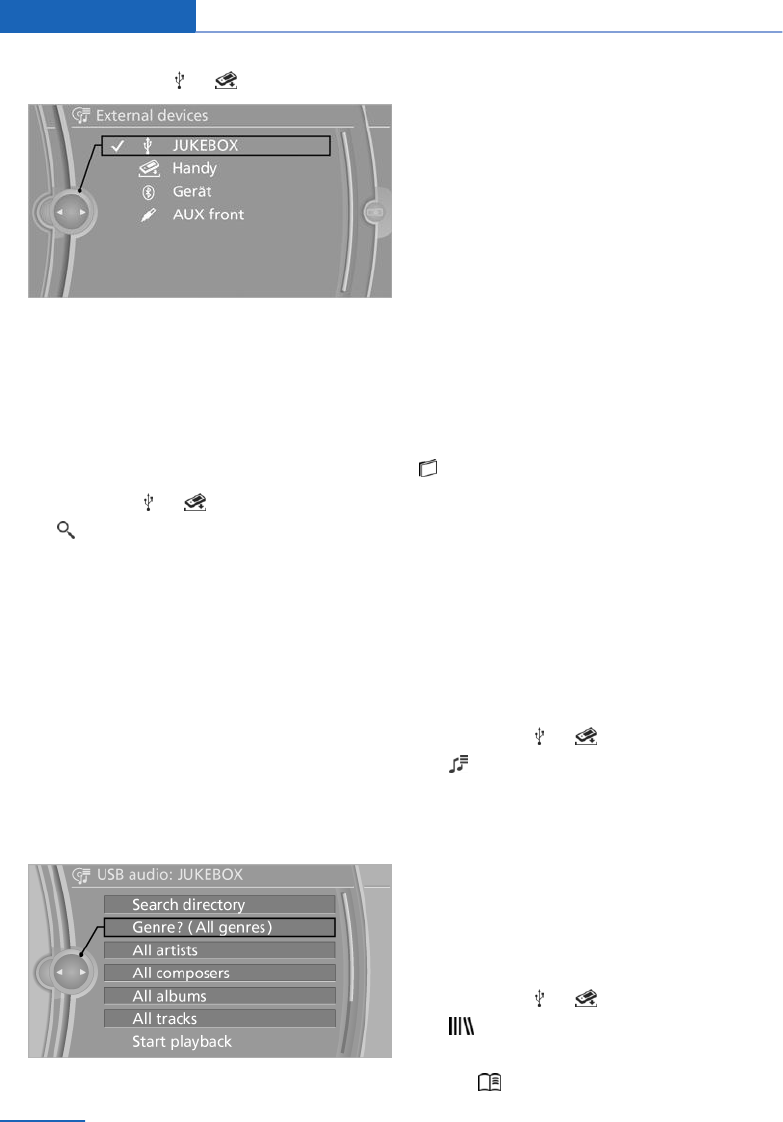
3. Select symbol or .
Playback is started.
Searching for tracks
The titles are displayed if they have been cre
ated with Roman letters.
1. "Multimedia"
2. "External devices"
3. Select the or symbol.
4. "Music search"
Search for track by information
1. Select the desired category, for example
"Genre" or "Artist".
All entries are shown in a list.
▷Call up "A-Z search" and make the de
sired entry. When you enter a character,
a filter is run on the basis of this charac
ter as the first letter. When you enter
several characters, all the results that
contain this character string are dis
played.
▷Select the desired entry from the list.
2. Select further categories as appropriate.
Not all categories need to be selected. If, for
example, all the tracks of a certain artist are
to be displayed, it is sufficient to call up only
this artist. All tracks by that artist will be dis
played.
3. "Play selection"
Starting a new track search
"Reset search"
Search through directory
When connecting using the USB audio interface
in the centre armrest, the file directory of the
device is shown.
"Search directory"
A list of directories and tracks is displayed.
This symbol marks directories.
Select track:
Select desired track or directory.
To change to a higher-level directory tilt the
controller to the left.
Playlists
Calling up playlists.
1. "Multimedia"
2. "External devices"
3. Select the or symbol.
4. "Playlists"
5. Select desired playlist.
More media, audio books, podcasts,
videos
Audio books, podcasts and videos can be called
up separately on the device.
1. "Multimedia"
2. "External devices"
3. Select the or symbol.
4. "More media"
5. Call up desired medium:
▷ "Audio books"
Seite 58
Entertainment External devices
58 Online Edition for Part no. 01 40 2 912 836 - 07 12 510
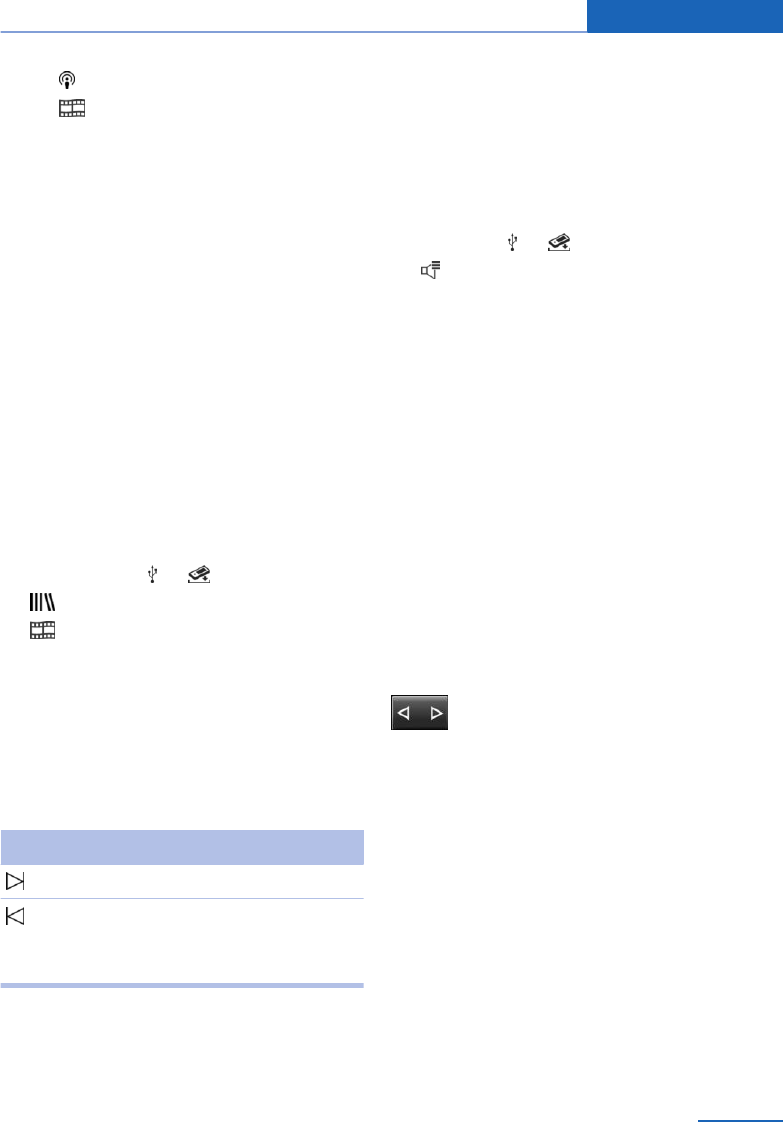
▷ "Podcasts"
▷ "Video"
Video playback
Overview
Video playback is possible under the following
preconditions:
▷iPod/iPhone: connection via snap-in
adapter.
▷USB devices: connect via USB interface or
snap-in adapter.
Playback
The video image is shown on the front control
display up to a speed of approximately 3 km/h.
In some countries, it is only shown with the park
ing brake engaged or in gear position P.
1. "Multimedia"
2. "External devices"
3. Select symbol or .
4. "More media"
5. "Video"
6. Select the directory as appropriate.
To change to a higher-level directory: tilt the
controller to the left.
7. Select the desired video file to start play
back.
Video menu
Symbol Function
Next video file
Previous video file
Select symbol twice to play back the
previous video file.
Currently playing
Listing of the track which is currently being
played back. For example, the list of tracks which
are found through the track search or a playlist.
1. "Multimedia"
2. "External devices"
3. Select the or symbol.
4. "Currently playing"
Random playback
The current list of tracks is played in random or
der.
1. "Multimedia"
2. "External devices"
3. Call up "Options".
4. "Random"
iPod/iPhone: the playback list is shown in ran
dom order and the tracks are played according
to that order.
USB device: the playback list is shown in the
conventional order and the tracks are played in
random order.
Fast forward/rewind
Keep button pressed.
Notes
▷Do not expose the audio device to extreme
environmental conditions, for example very
high temperatures, see the operating in
structions of the audio device.
▷Depending on the format of the audio and
video files perfect playback cannot be en
sured in every case; for example bit rates
higher than 256 Kbit/s or various compres
sion techniques.
▷Audio playback is only possible if no audio
device is connected to the AUX-IN port.
Seite 59
External devices Entertainment
59
Online Edition for Part no. 01 40 2 912 836 - 07 12 510
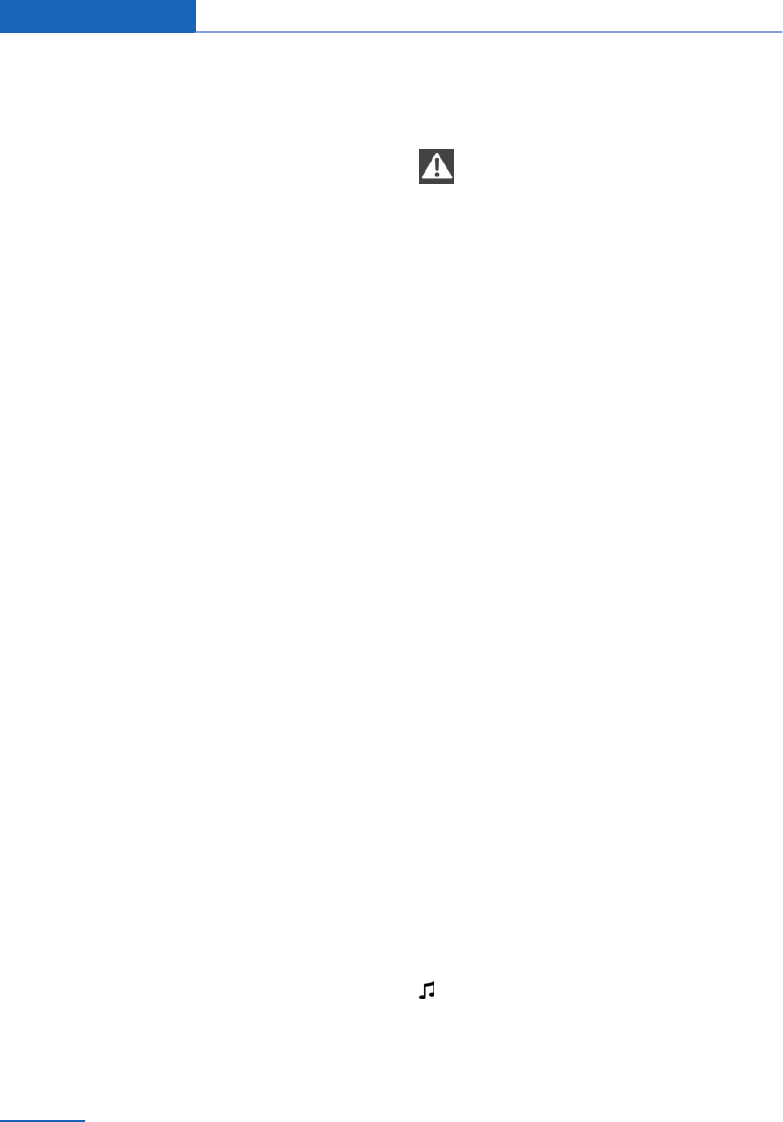
Notes on connecting
▷The connected audio device is supplied with
a maximum of 500 mA if the device supports
this. Do not, therefore, also connect the de
vice to a socket in the vehicle as otherwise
perfect playback cannot be guaranteed.
▷Do not insert the plug forcibly in the USB in
terface.
▷Do not connect any devices such as fans or
lights to the USB audio interface.
▷Do not connect up USB hard drives.
Bluetooth audio
Overview
▷Playback of music files from external devi
ces such as audio devices or mobile phones
via Bluetooth is possible.
▷The sound output is via the vehicle loud
speakers.
▷The volume of the sound output depends on
the device. If applicable, change volume set
tings on the device.
▷Up to four external devices can be registered
with the vehicle.
Requirements
▷Suitable device. Visit www.bmw.com/blue
tooth for more information.
▷Device ready for operation.
▷Ignition switched on.
▷Bluetooth in the vehicle, see page 79, and
device activated.
▷Bluetooth presettings must be made on the
device, for example connect without confir
mation or visibility, see Owner's Handbook
of the device.
▷A number with a minimum of 4 and a maxi
mum 16 positions is specified as the Blue
tooth passkey. Only required for non-recur
ring registration.
▷Vehicle is at rest.
Connecting
Connecting the device
Only connect the device when the vehicle
is stationary. Otherwise, you may become dis
tracted and endanger the vehicle occupants and
other road users.◀
1. "Settings"
2. "Connections"
3. "Bluetooth"
4. "Add new device"
The Bluetooth name of the vehicle is dis
played in the control display.
5. To perform other operations on the device;
see the Owner's Handbook of the device: for
example finding/connecting Bluetooth de
vice or new device.
The Bluetooth name of the vehicle is shown
on the display of the device.
6. Select the Bluetooth name of the vehicle on
the display of the device.
7. Request using the iDrive or mobile phone to
enter the same Bluetooth passkey. Enter
and confirm passkey.
Or
Compare the control number in the vehicle
display with the control number in the mo
bile phone display. Confirm the control num
ber in the mobile phone and on the vehicle.
"OK"
8. Select functions for which the device is to be
used, for example "Bluetooth audio".
9. "OK"
If connection was successful, the device is
shown as connected.
White symbol: device active as audio source.
If connection was unsuccessful: What to do if...,
see page 62.
Seite 60
Entertainment External devices
60 Online Edition for Part no. 01 40 2 912 836 - 07 12 510
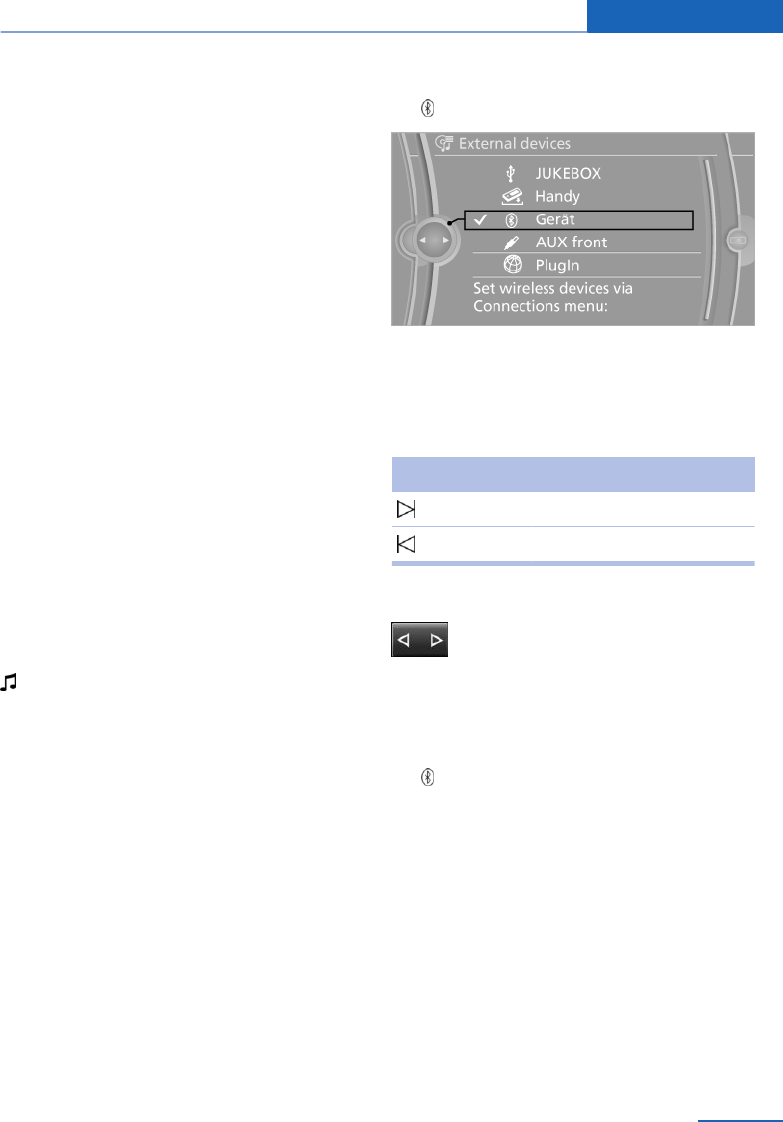
Connecting a certain device
An already connected device can be connected
as an active audio source.
Connection not possible if data is exchanged
using a mobile phone equipped with Bluetooth.
Requirements
If necessary, activate the audio connection of
the desired device from the list of connected
devices.
1. "Settings"
2. "Connections"
3. "Bluetooth"
4. Call up "Options".
5. "Configure device"
6. "Audio"
7. "OK"
Connecting a device
1. "Settings"
2. "Connections"
3. "Bluetooth"
4. Select the device to be connected.
White symbol: device active as audio source.
Playback
General
▷The following functions are dependent on
the device: display of track information, fast
forward/rewind, random playback.
▷Can be operated using the device or iDrive.
▷Playback is interrupted if data is exchanged
using a mobile phone equipped with Blue
tooth.
Starting play
1. Connecting a device.
2. "Multimedia"
3. "External devices"
4. Select the symbol.
Playback is automatically started.
Changing the track
Not all functions may be available, depending on
the device.
Symbol Function
Next track
Previous title
Fast forward/rewind
Keep button pressed.
Random playback
1. "Multimedia"
2. "External devices"
3. Select the symbol.
4. Call up "Options".
5. "Random"
Disconnecting audio connection
1. "Settings"
2. "Connections"
3. "Bluetooth"
4. Highlight the desired device.
5. Call up "Options".
6. "Configure device"
Seite 61
External devices Entertainment
61
Online Edition for Part no. 01 40 2 912 836 - 07 12 510

7. "Audio"
8. "OK"
Disconnecting a device
1. "Settings"
2. "Connections"
3. "Bluetooth"
4. Highlight the mobile phone to be discon
nected.
5. Call up "Options".
6. "Delete device"
What to do if...
Visit www.bmw.com/bluetooth for more infor
mation on compatible devices.
Compatible mobile phones, see page 78
Device not supported by the vehicle.
▷If applicable, perform a software update, see
page 62.
Device not registered or paired.
▷Do the Bluetooth passkeys for device and
vehicle match. Enter the same passkey on
the device and using iDrive.
▷Duration for passkey input longer than
30 seconds. Repeat the connection at
tempt.
▷Is the mobile phone in power-save mode or
is the battery low? Charge the mobile phone
using the snap-in adapter or the charging
cable.
▷Is the device no longer responding. Switch
the device off and on again.
▷Repeat the connection attempt.
No music can be played back.
▷Start the program for playing back music
files on the device and if necessary, select a
track via the device.
▷Switch the radio off and on again.
Music files are played back, but only at low vol
ume.
▷Adjust the volume controls on the device.
Playback is disrupted when a button is pressed
on the device or if other messages are issued via
the device.
▷Switch off keypad acknowledgement tones
and other audio output at the device.
Playback is interrupted by phone calls or traffic
announcements and does not resume automat
ically.
▷Switch the radio off and on again.
Playback is not possible if the mobile phone is
connected via Bluetooth Audio and via the USB
interface or snap-in adapter at the same time.
▷Disconnect one of the two pairing connec
tions, for example disconnect audio connec
tion, see page 61, and restart playback.
If all the points on the list have been reviewed
and the desired function cannot be run, contact
Hotline or Service Centre.
Software update
Depending on the current software, the vehicle
supports different external devices. A software
update may be supported, for example, by a new
mobile phone or new external devices of the ve
hicle, which may improve compatibility with the
vehicle.
The software is updated via:
▷USB.
Updates and related, up-to-date informa
tion is available on the website
www.bmw.com/update.
▷BMW TeleServices
The available software can be updated di
rectly through the vehicle.
Note
The installation must only be done when sta
tionary. To complete the installation, the ignition
must be switched off.
Seite 62
Entertainment External devices
62 Online Edition for Part no. 01 40 2 912 836 - 07 12 510
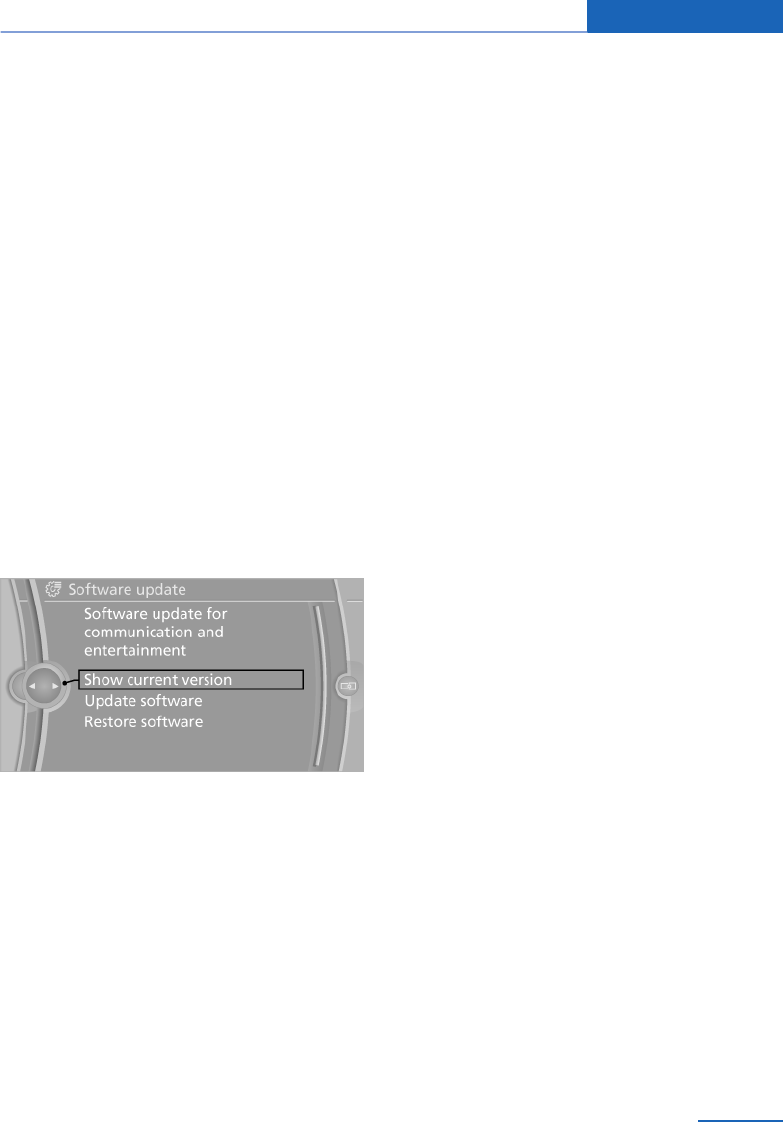
Show current version
The information about the version of the soft
ware currently installed is displayed.
1. "Settings"
2. "Software update"
3. "Show current version"
If an update has already been applied, select the
desired version to show additional information.
Update software via USB
Do not attempt to update the software unless
the vehicle is at a standstill.
1. Store the file for the software update onto a
USB data store in the main folder.
2. Connect USB drive to the USB interface in
the centre armrest.
3. "Settings"
4. "Software update"
5. "Update software"
6. If applicable, "USB"
7. "Install software"
8. "OK"
9. Switch of ignition and wait until the control
display is switched off.
Update software via BMW TeleServices
It is possible to transfer the software when trav
elling and is also automatically continued after
the trip is interrupted. The installation of the
software must only be done when stationary.
There must be mobile reception for the update.
1. Switch on ignition.
2. "Settings"
3. "Software update"
4. "Update software"
5. "BMW TeleServices"
6. "Transfer software"
7. Interrupt the trip as necessary, the installa
tion must only be done when stationary.
8. "Install software"
9. "OK"
10. Switch of ignition and wait until the control
display is switched off.
Restore software version
The software version before the last software
update or the version before the first software
update can be restored.
Do not attempt to restore the software unless
the vehicle is at a standstill.
1. "Settings"
2. "Software update"
3. "Restore software"
4. "Previous version" or "Software factory
settings"
5. "Remove software"
6. "OK"
7. Switch of ignition and wait until the control
display is switched off.
Seite 63
External devices Entertainment
63
Online Edition for Part no. 01 40 2 912 836 - 07 12 510
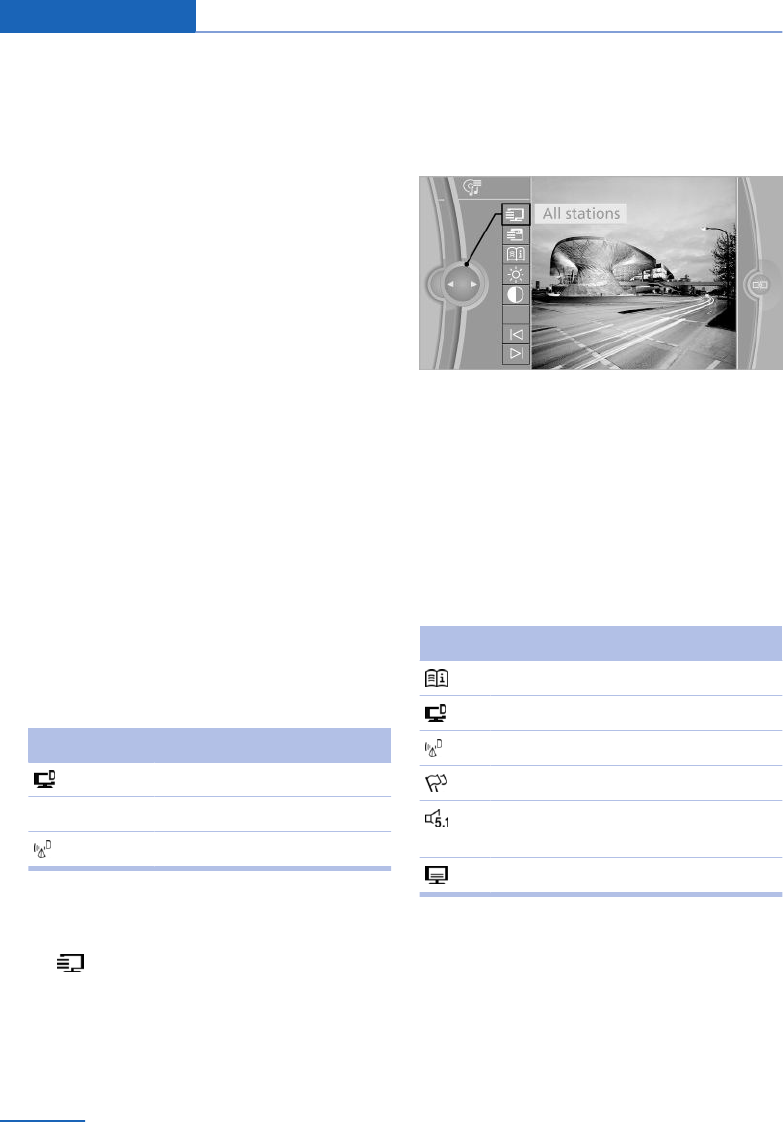
Television, TV
Vehicle Equipment
This chapter describes all standard, national and
special equipment provided in the model series.
Therefore equipment not available in a vehicle is
also described, for example the selected special
equipment or national version. That also applies
to safety-relevant functions and systems.
General
For your own safety, the TV picture is only dis
played up to approx. 3 km/h. On some national
versions, it is only displayed when the parking
brake is engaged or gear position P is engaged.
Selecting program
All receivable TV channels and radio station are
shown in a list. The radio stations are shown at
the end of the list.
In certain circumstances, the list of channels
that can be received might not be updated au
tomatically. Update the list with station search,
see page 64, if necessary.
Symbol Meaning
Digital TV channel
No symbol Analogue TV channel
Digital radio station
1. "Multimedia"
2. "TV"
3. "All stations"
The channel last seen is displayed.
4. Select the desired channel.
After a short time, the display changes to full
screen mode. To continue showing the naviga
tion bar: press controller.
Information box
After changing to a new channel, a box with in
formation on the selected channel is shown
briefly.
Symbol Meaning
Channel information available
Digital TV channel
TV radio station
Multiple sound tracks available
Sound track in multi-channel repro
duction, surround, available
Subtitles available
Station search
The station search takes up to 2 minutes de
pending on the number of channels offered. If
not all offered channels are listed, it might be
Seite 64
Entertainment Television, TV
64 Online Edition for Part no. 01 40 2 912 836 - 07 12 510
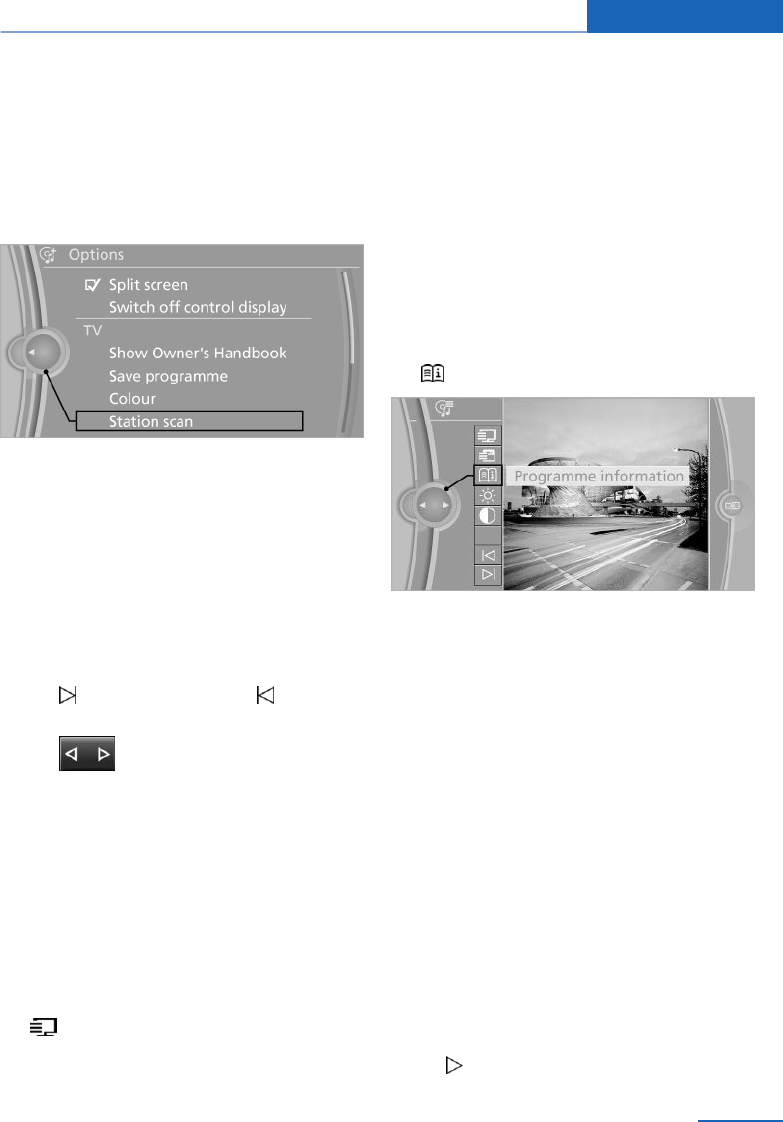
necessary to reset the TV region, see
page 66.
1. "Multimedia"
2. "TV"
3. Call up "Options".
4. "Station scan"
Cancelling the station search
"Cancel station search"
Changing the channel
1. "Multimedia"
2. "TV"
3. Carry out one of the following points:
▷ "Next programme" or "Previous
programme"
▷ Press the button.
▷Turn the controller.
The next or previous programme from the last
selected list of all programmes or saved pro
grammes is displayed.
Saving the channel
1. "Multimedia"
2. "TV"
3. "All stations"
4. Select the desired channel.
5. Call up "Options".
6. "Save programme"
7. Select the desired memory location.
The saved channels are stored for the remote
control currently in use.
Electronic Programme Guide
Many stations provide and electronic program
guide.
1. "Multimedia"
2. "TV"
3. "Programme"
The TV schedule for the programme on now and
next is shown.
If some characters are not correctly displayed
adjust TV region, see page 66.
Displaying daily schedule
Depending on the information the station trans
mits, the entire daily schedule of the station is
shown
Select station names to display the daily sched
ule.
Show programme information
Depending on the information a station trans
mits, more detailed information on a programme
can be shown.
Select programme to show the more detailed
information.
Or this can be change directly in the programme:
select symbol.
Seite 65
Television, TV Entertainment
65
Online Edition for Part no. 01 40 2 912 836 - 07 12 510
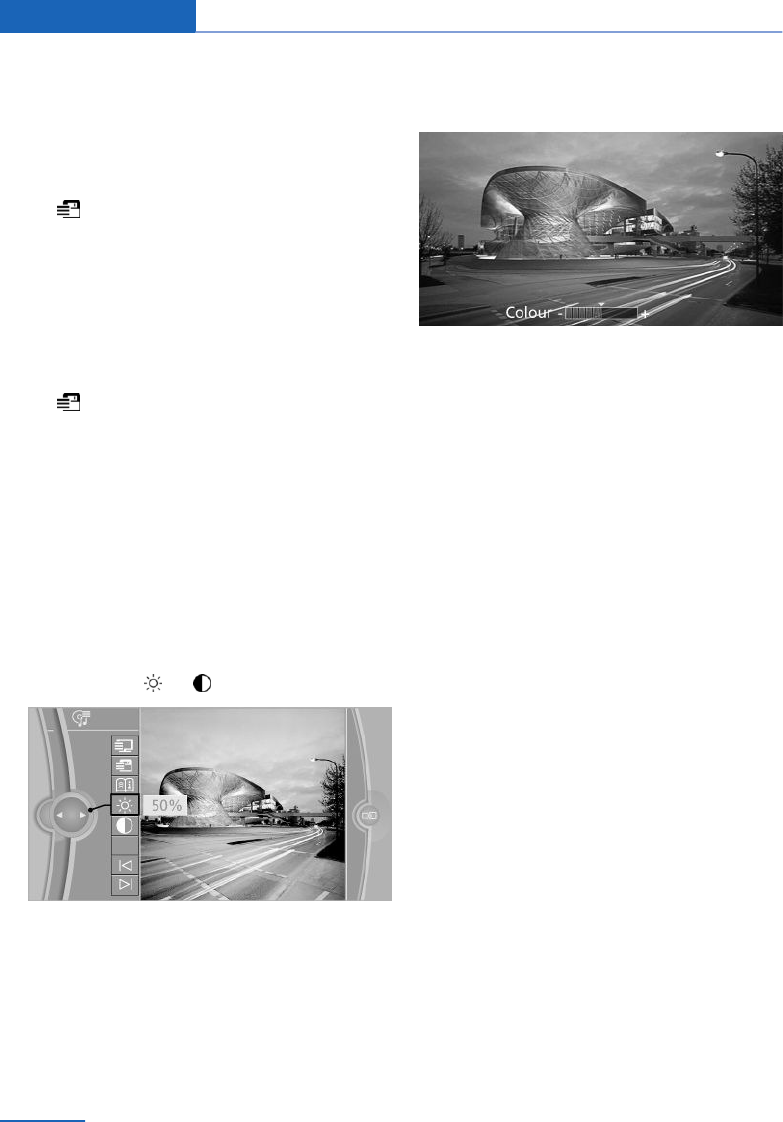
Saved channels
Twenty-five channels can be saved.
1. "Multimedia"
2. "TV"
3. "Saved programmes"
4. Select the desired channel.
Deleting channels
1. "Multimedia"
2. "TV"
3. "Saved programmes"
4. Highlight the channel to be deleted.
5. Call up "Options".
6. "Delete"
Adjusting TV
Brightness and contrast
1. "Multimedia"
2. "TV"
3. Select the or symbol.
4. Turn the controller until the desired setting
is reached and press the controller.
Colour
1. "Multimedia"
2. "TV"
3. Call up "Options".
4. "Colour"
5. Adjusting: turn the controller.
6. Saving: press the controller.
Zoom
Showing an enlarged TV image.
1. "Multimedia"
2. "TV"
3. Call up "Options".
4. "Zoom mode"
TV Region
The TV region is not the same in every country.
The TV receiver can be adjusted to the desired
region.
For more information: www.bmw.com/tvregion
1. "Multimedia"
2. "TV"
3. Call up "Options".
4. "TV region"
5. Select the desired region.
The setting is saved for the remote control cur
rently in use.
Selecting the audio track
The range of audio tracks available depends on
the TV programme and time of day.
1. "Multimedia"
2. "TV"
3. Call up "Options".
Seite 66
Entertainment Television, TV
66 Online Edition for Part no. 01 40 2 912 836 - 07 12 510

4. "Audio track"
5. Select the desired audio track.
Show subtitles
Showing subtitles depends on the TV channel
and time.
1. "Multimedia"
2. "TV"
3. Call up "Options".
4. "Subtitles"
5. Select the desired language or "Subtitles
off".
Seite 67
Television, TV Entertainment
67
Online Edition for Part no. 01 40 2 912 836 - 07 12 510
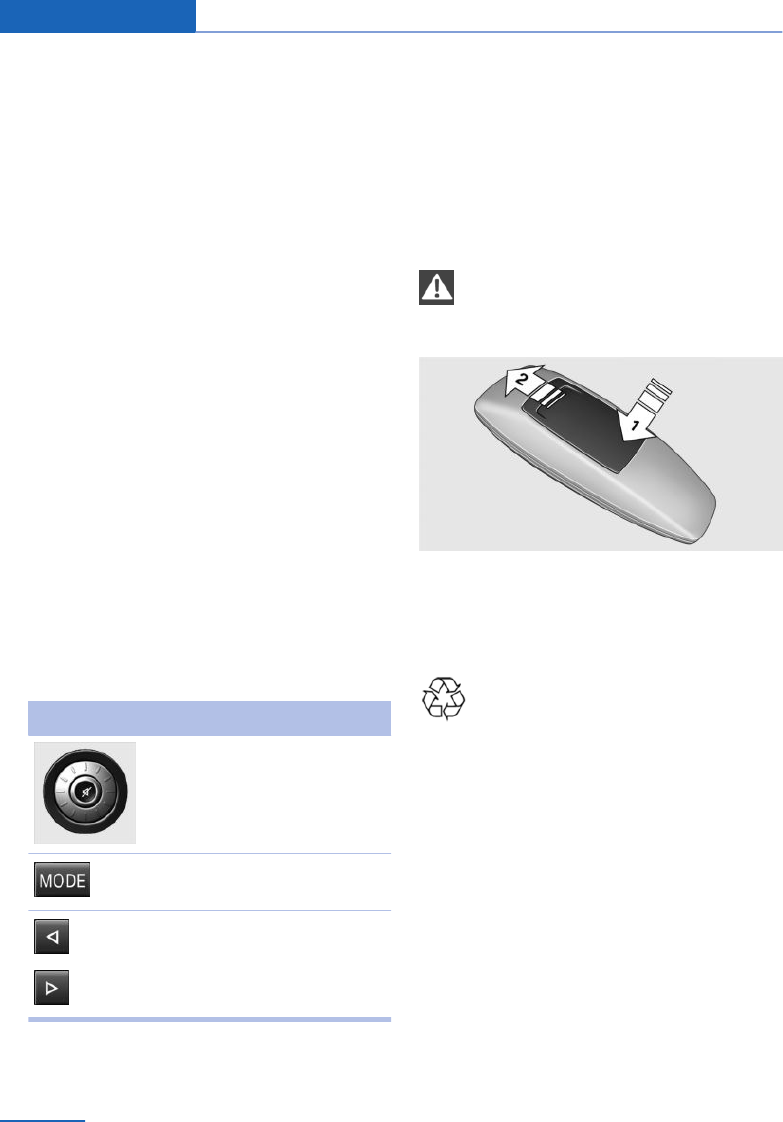
Audio remote control in the rear
Vehicle Equipment
This chapter describes all standard, national and
special equipment provided in the model series.
Therefore equipment not available in a vehicle is
also described, for example the selected special
equipment or national version. That also applies
to safety-relevant functions and systems.
Principle
The following audio functions at the front can be
controlled using the audio remote control in the
rear:
▷"Radio"
▷"Multimedia"
The operation is the same as for the corre
sponding keys on the CD/DVD player.
The remote control is accommodated in the
centre armrest in the back.
Menu guidance
Press the button Function
Turn the wheel: adjusts the
volume.
Press middle button:
switches the sound on/off.
Switches entertainment
sources.
Switches stations, tracks or
chapters.
Keep button pressed: fast
forward/rewind.
The send time of the remote control is limited in
accordance with legal regulations. Pressing or
turning the relevant button again allows a func
tion to be executed again.
Changing the batteries
No rechargeable batteries
Do not use rechargeable batteries, other
wise their contents can cause damage.◀
1. Remove the cover. To do so, press the
cover, arrow 1, and push forwards, arrow 2.
2. Insert batteries of the same type.
3. Close the cover.
Dispose of old batteries at an authorised
collecting point or hand them in to a
Service centre.
Seite 68
Entertainment Audio remote control in the rear
68 Online Edition for Part no. 01 40 2 912 836 - 07 12 510
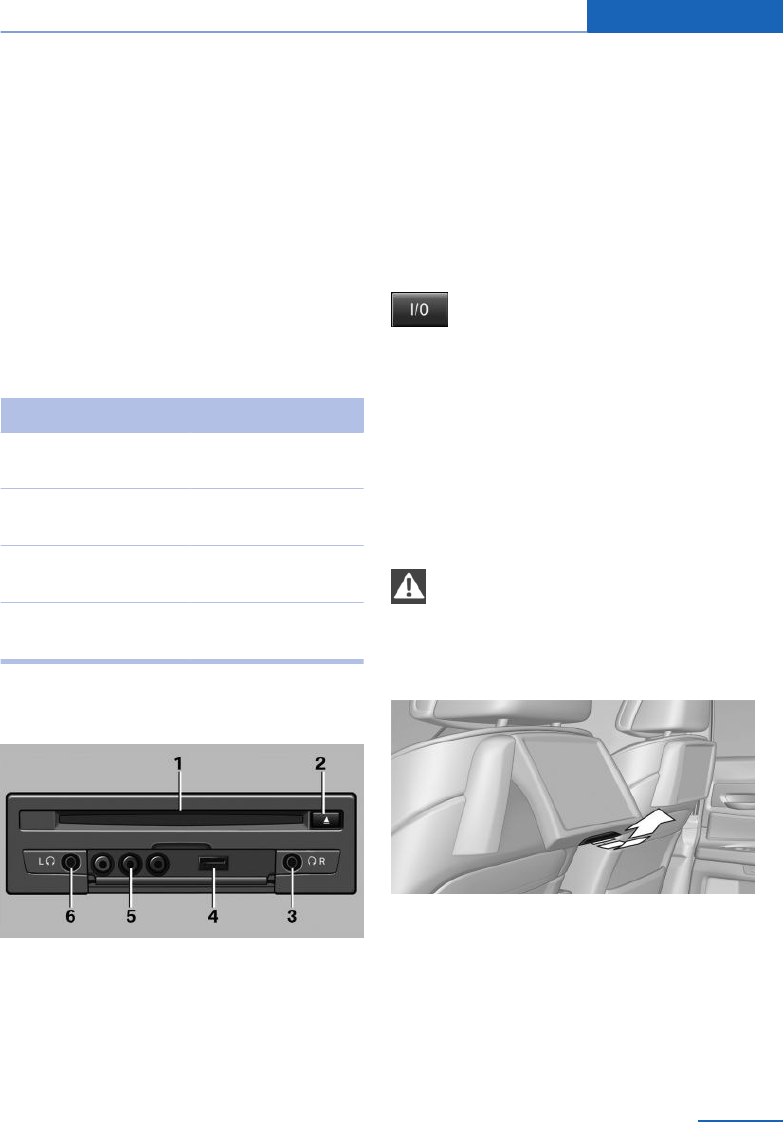
Rear entertainment
Vehicle Equipment
This chapter describes all standard, national and
special equipment provided in the model series.
Therefore equipment not available in a vehicle is
also described, for example the selected special
equipment or national version. That also applies
to safety-relevant functions and systems.
Control functions
Control Place of installation
Screens On the backrest of
the front seats.
CD/DVD player in the
rear
On the centre con
sole.
Controller in the rear Between the rear
seats.
Remote control In the centre armrest
in the rear
CD/DVD player in the rear
1CD/DVD compartment
2Ejecting CD/DVD
3Headphone connection, right
4USB interface
5Cinch sockets
6Headphone connection, left
Switching system on/off
Press the button on the lower edge of
the screen.
The rear entertainment and relevant screens are
switched on/off.
After the ignition is switched off the system
must be switched on again.
Screens
Adjusting
Risk of sustaining burns with the screen
folded out
Do not reach behind the screen; otherwise
burns could result. The back of the screen can
get very hot.◀
▷To fold out: pull the lower edge.
▷To fold in: press against the lower edge.
Notes
▷When loading the rear seats and adjusting
the backrests of the front seat, fold in the
screens.
Seite 69
Rear entertainment Entertainment
69
Online Edition for Part no. 01 40 2 912 836 - 07 12 510
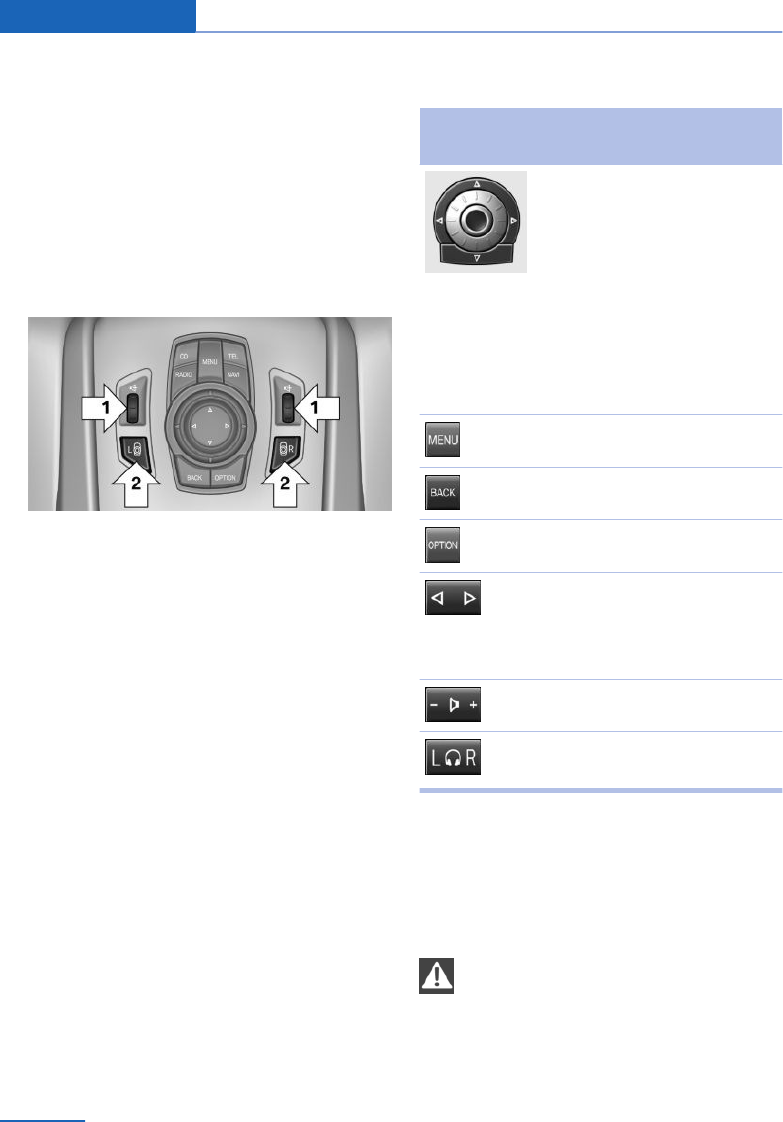
▷Please fold in the display screens when
making use of the through-loading system.
▷Fold in the display screens before folding
down the rear backrest.
▷To clean the screens, comply with the infor
mation regarding care, see Owner's
Handbook for the vehicle.
Controller in the rear
Operation is the same as for iDrive at the front.
▷To adjust the volume: turn, arrow 1.
▷Activate the controller and switch between
the screens: press the button, arrow 2.
A green LED indicates which side is active
and can be operated using the iDrive in the
rear.
Remote control
In the centre armrest in the rear
The remote control is in the centre armrest.
Menu guidance
Press the but
ton
Function
Operating principle as front
controller.
Turn the wheel: highlights a
menu item.
Press middle button: confirm
selection.
Pressing the arrow buttons
corresponds to tipping the
Controller, change between
screens.
Call up the main menu.
Displays the previous menu.
Calls up the "Options" menu.
Switches stations, tracks or
chapters.
Keep button pressed: fast
forward/rewind.
Adjusts the volume.
Toggling between the
screens.
The send time of the remote control is limited in
accordance with legal regulations. Pressing or
turning the relevant button again allows a func
tion to be executed again.
Changing the batteries
No rechargeable batteries
Do not use rechargeable batteries, other
wise their contents can cause damage.◀
Seite 70
Entertainment Rear entertainment
70 Online Edition for Part no. 01 40 2 912 836 - 07 12 510
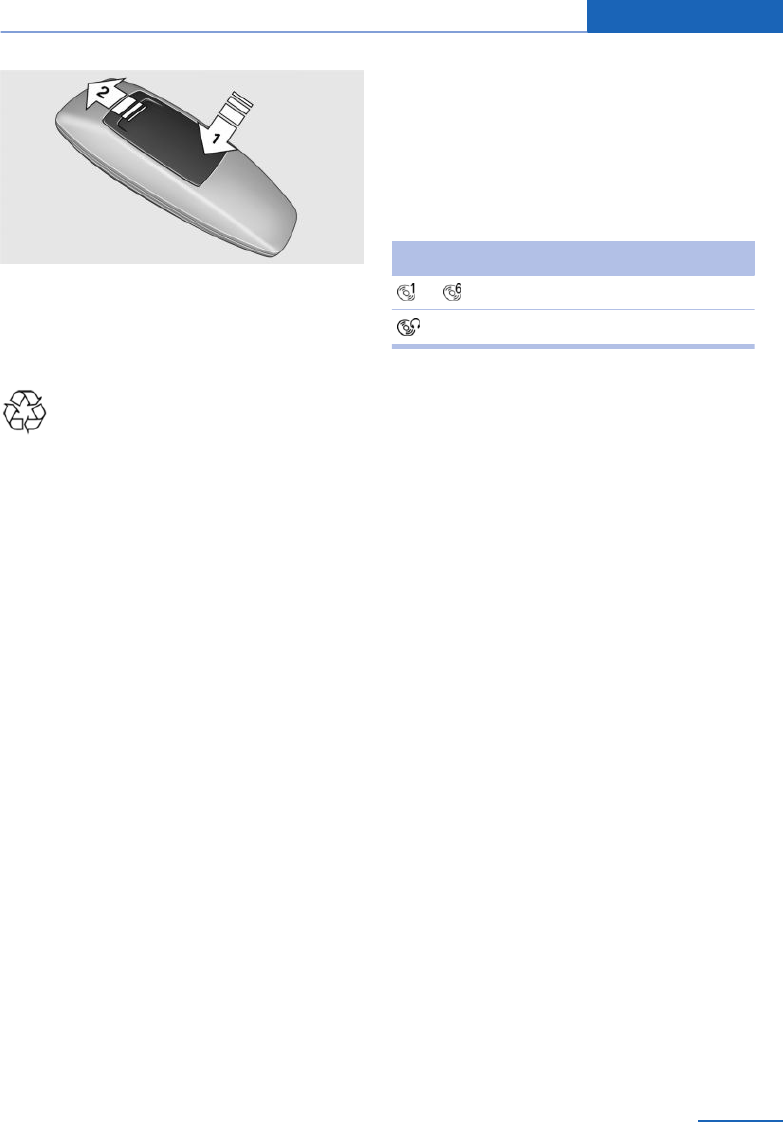
1. Remove the cover. To do so, press the
cover, arrow 1, and push forwards, arrow 2.
2. Insert batteries of the same type.
3. Close the cover.
Dispose of old batteries at an authorised
collecting point or hand them in to a
Service centre.
Controls
Almost all functions can be operated in the same
way as at the front. Special features of operation
in the rear are listed in the following section.
Audio/video playback
Audio and video can be played in the rear from
the following sources:
▷Radio
▷DVD changer
▷Music collection
▷Television, TV
▷CD/DVD player in the rear
▷USB audio interface in the rear
▷AUX-In port in the rear
Radio
If the same radio source is selected at the front
and in the rear (for example FM/AM), the same
radio station is played.
Operation is the same as for the radio at the
front.
Multimedia
CD/DVD
The same thing is shown in the front and rear
when the same box of the DVD changer is se
lected.
Operation is same as in front.
Symbol Meaning
... DVD changer
CD/DVD player in the rear
Music collection
It is only possible to save music or export and
import data via the CD/DVD player at the front or
via the USB interface in the centre armrest.
If the music collection is selected at the front and
in the rear, playback is independent.
Operation is the same as for music collection at
the front.
TV
If TV is selected at the front and in the rear, the
same channel is played.
Operation is the same as for TV at the front.
Sound
For headphones in the rear, only treble and bass
can be set. The setting is made separately for
the headphones on the left and right.
Operation is the same as for the sound settings
at the front.
Multi-channel playback, set surround
for headphones
1. "Settings"
2. "Sound"
3. "Headphones surround"
Telephone
Telephoning via the telephone in the rear.
Seite 71
Rear entertainment Entertainment
71
Online Edition for Part no. 01 40 2 912 836 - 07 12 510
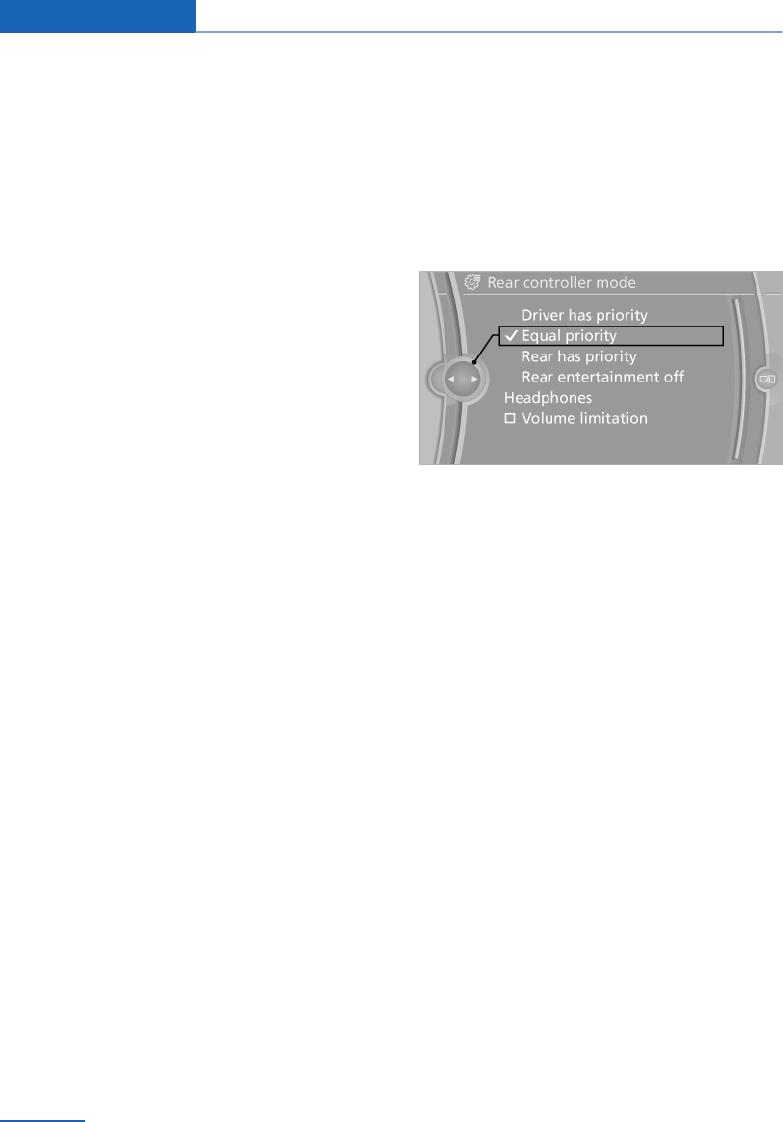
An incoming call can be accepted or rejected
without a telephone in the rear. Operation same
as front telephone.
Navigation
Route planning is possible separately in the rear
left/right. It is only possible to start the route
guidance at the front.
Operation is the same as for navigation at the
front.
Suggesting a destination
A destination or trip can be forwarded to the
front as a suggestion. The suggestion can be
accepted at the front and saved or cancelled.
This function is not available with the following
setting: "Driver has priority"
1. Enter destination.
2. "Suggest destination"
ConnectedDrive
Operation is the same as for ConnectedDrive at
the front.
Settings
The following settings are possible:
▷"Rear display"
▷"Language/units": the language can be set
jointly for all screens.
▷"Sound"
▷"Climate"
▷"Connections"
Vehicle information
Content of the on-board computer can be dis
played. Operation is only possible at the front.
Options menu
No split screen possible.
Operation is the same as for the options menu
at the front.
Enabling
Enabling the rear
Only possible using the iDrive at the front.
1. "Settings"
2. "Rear controller mode"
3. Select the desired priority.
Enable options
Driver has priority
▷The source selected at the front with iDrive
is played over the vehicle loudspeakers. It
can be selected from the rear passenger
compartment but it cannot be operated from
there. Other audio or video sources may be
operated.
▷Sound output in the rear is only possible via
headphones.
▷iDrive at the front can be used to select the
source that is to be displayed in the rear.
Setting the source in the rear using the iDrive at
the front:
1. "Multimedia" or "Radio"
2. "Rear"
3. Select the desired audio or video source.
Same priority
▷All the audio and video sources can be op
erated via the iDrive in the front or in the rear.
Seite 72
Entertainment Rear entertainment
72 Online Edition for Part no. 01 40 2 912 836 - 07 12 510
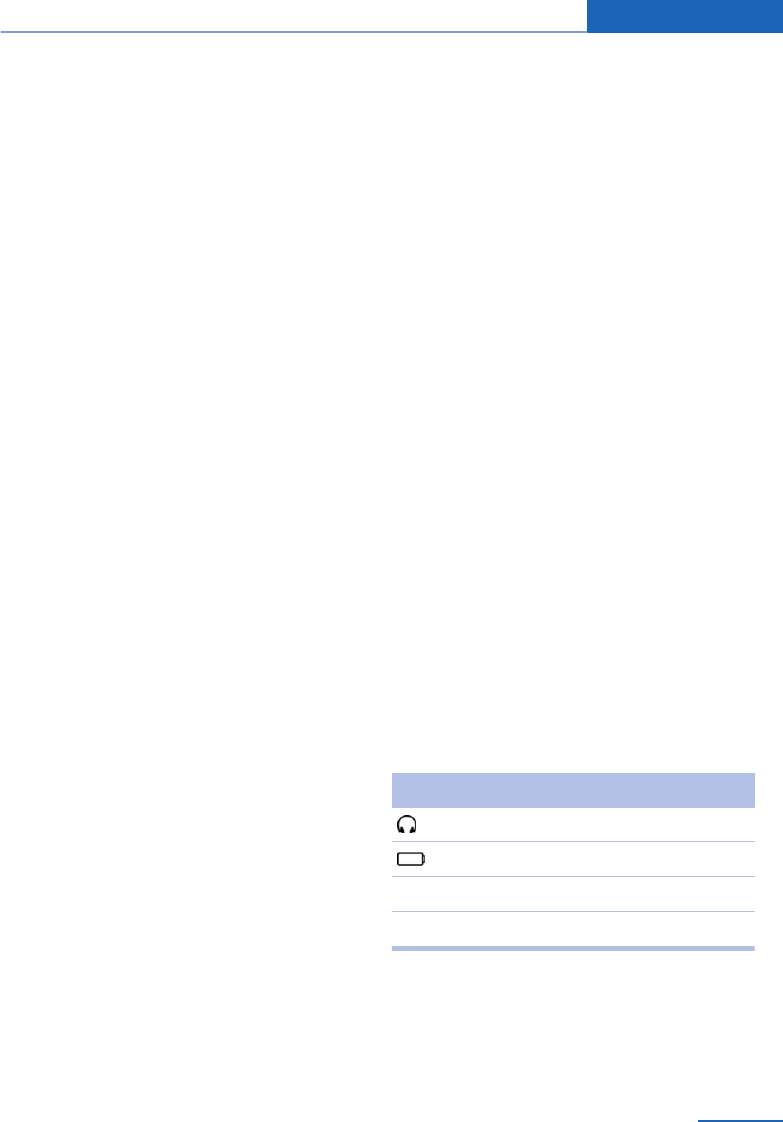
▷Sound output in the rear via headphones:
the source selected using the iDrive at the
front is output via the vehicle loudspeakers.
▷Sound output via loudspeakers: the source
last selected using the iDrive at the front or
in the rear is output via the vehicle loud
speakers.
Rear has priority
▷The source that was selected in the rear can
be selected from the front using iDrive.
However, it cannot be operated from there.
Other audio or video sources may be oper
ated.
▷Sound output in the rear via headphones:
the source selected using the iDrive at the
front is output via the vehicle loudspeakers.
▷Sound output via loudspeakers: the source
selected in the rear is output via the vehicle
loudspeakers. No audio or video sources
can be selected using the iDrive at the front.
Switching off the rear DVD
▷The rear entertainment is switched off.
▷Switching on rear entertainment again: se
lect another priority using the iDrive at the
front and switch on the system, see
page 69.
Volume limit for headphones
The maximum possible volume for the head
phones in the rear can be set.
1. "Settings"
2. "Rear controller mode"
3. "Volume limitation"
Headphones, vehicle
loudspeakers
Connecting headphones
Normal headphones
Connection is via jack connector 3.5 mm, see
page 69, on the CD/DVD player in the rear
Wireless headphones
You can get suitable wireless headphones from
your Service centre.
Connect headphones
Up to 3 sets of wireless headphones can be
connected.
1. Switch on headphones.
2. "Settings"
3. "Connections"
4. "Headphones/remote"
5. Hold down on button on headphones, LED
on the headphones flashes rapidly.
6. "Add new device"
7. Select with which side the headphones are
to be connected.
The headphones are shown on the list of con
nected devices. Information regarding the con
nected headphones is displayed.
Symbol Meaning
Headphones
Battery charge state
L Connection to left side
R Connection to right side
Seite 73
Rear entertainment Entertainment
73
Online Edition for Part no. 01 40 2 912 836 - 07 12 510

Rename headphones
The name shown with the headphones can be
changed.
1. "Settings"
2. "Connections"
3. "Headphones"
4. Highlight the headphones you want to re
name.
5. Call up "Options".
6. "Rename"
7. Enter desired names.
Deleting connection of the headphones
The connection with the vehicle may be deleted.
1. "Settings"
2. "Headphones"
3. Highlight the headphones you want to de
lete.
4. Call up "Options".
5. "Delete device"
Selecting page
A set of headphones can be connected to the
left or right side of the rear entertainment. The
side can be changed at any time. The head
phones need to be switched on.
1. "Settings"
2. "Headphones"
3. Highlight the headphones for which you
want to change sides.
4. Call up "Options".
5. "Switch side"
Sound output via headphones of
vehicle loudspeakers
Operation is only possible in the rear.
1. Call up "Options".
2. "Headphones" or "Loudspeakers"
With the following setting, sound output in the
rear is not possible using the vehicle loud
speaker: "Driver has priority".
External devices
General
▷Connection of external audio or video devi
ces or digital cameras using Cinch termi
nals, see page 69, to the CD/DVD player in
the rear. The operation is done via the ex
ternal device.
▷Connection of external devices via USB au
dio interface to the CD/DVD player in the
rear. Operation is the same as front, see
page 57.
Due to the large number of audio and video de
vices available on the market, faultless playback
via the screen cannot be ensured for every audio
and video device.
Connecting an external device
1. Fold down the cover of the cinch sockets on
the CD/DVD player.
2. Connect the external device to the cinch
sockets.
▷Video: yellow socket.
▷Audio: white and red socket.
Starting play
1. "Multimedia"
2. "External devices"
3. "AUX rear"
Volume control
The volume of the sound output depends on the
audio device. If this volume differs significantly
from other audio sources, it makes sense to bal
ance the volumes.
Seite 74
Entertainment Rear entertainment
74 Online Edition for Part no. 01 40 2 912 836 - 07 12 510

Adjust volume
1. "Multimedia"
2. "External devices"
3. "AUX rear"
4. "Volume"
5. Turn the controller until the desired volume
setting is reached and press the controller.
What to do if...
You can only see a black screen.
▷Switch on system.
Nothing can be detected on the screen.
▷Toggling between the screens.
Radio or TV channels are greyed out and cannot
be selected.
▷Function is restricted based on the selected
priority. Change priority.
DVD does not play back.
▷The disk does not begin to play automati
cally. Start DVD manually.
Vehicle loudspeaker volume cannot be adjusted
in the rear.
▷Sound output in the rear is done over the
headphones. Change any priority and out
put the sound over the vehicle loudspeak
ers.
Seite 75
Rear entertainment Entertainment
75
Online Edition for Part no. 01 40 2 912 836 - 07 12 510
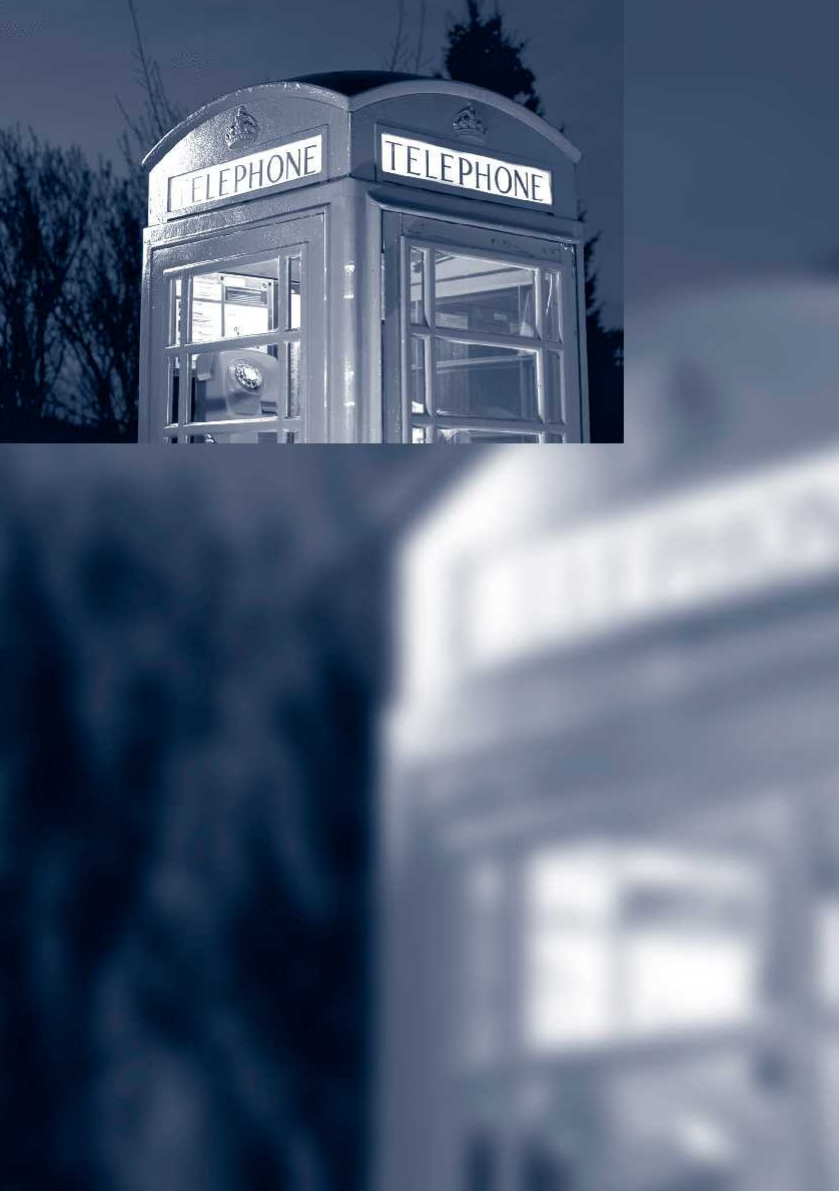
Online Edition for Part no. 01 40 2 912 836 - 07 12 510

Communication
All of the possibilities available for mobile
communication with your family, friends, business
partners or service providers are summarised in
this chapter.
Online Edition for Part no. 01 40 2 912 836 - 07 12 510
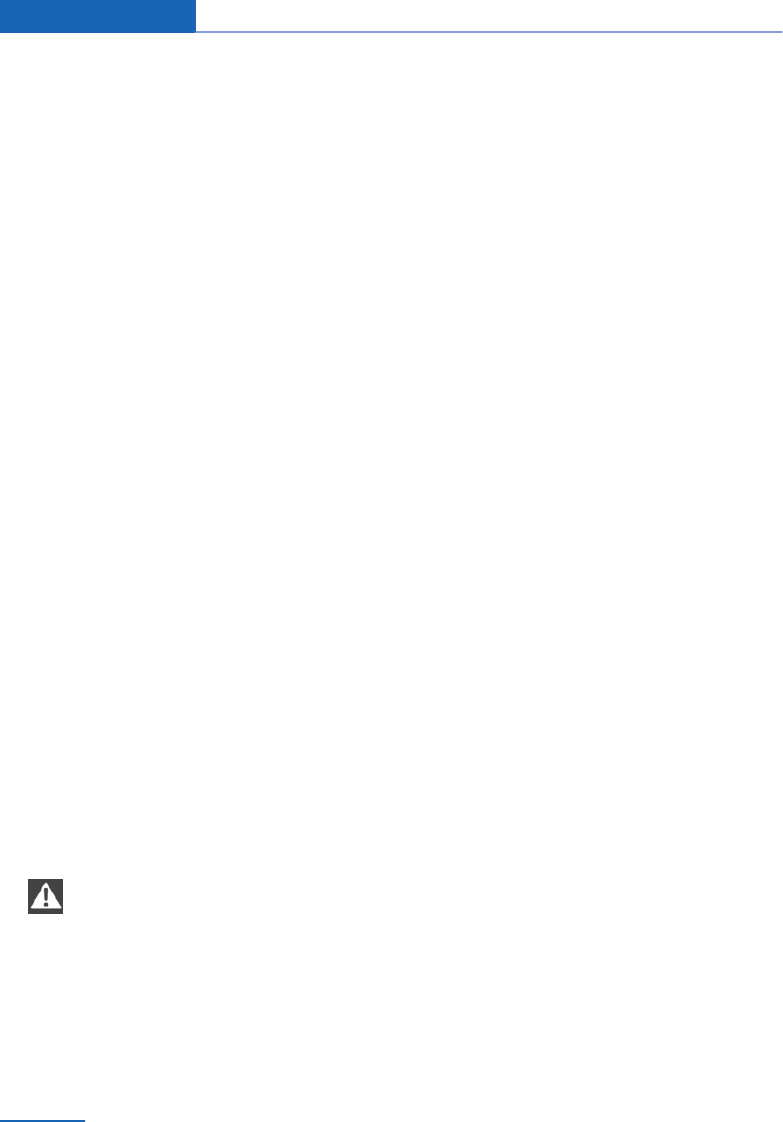
Telephone
Vehicle Equipment
This chapter describes all standard, national and
special equipment provided in the model series.
Therefore equipment not available in a vehicle is
also described, for example the selected special
equipment or national version. That also applies
to safety-relevant functions and systems.
Principle
Mobiles or other external devices, e.g. audio
player, can be connected to the vehicle by Blue
tooth.
After single registration, these devices are au
tomatically detected with the ignition switched
on. As soon as they are in the vehicle, they can
be operated through iDrive, the buttons on the
steering wheel and by voice.
General
External devices can be used depending on
functionality of the device as a telephone or as
an audio source through the vehicle.
Up to four external devices can be registered. If
the rear telephone is registered, three more ex
ternal devices can be registered.
Notes
Using the telephone while the vehicle is in
motion
Only make inputs when traffic activity permits.
As the driver, do not make telephone calls with
the mobile phone in your hand while the vehicle
is in motion; use the hands-free speaking sys
tem. The vehicle occupants and other road
users could otherwise be endangered.◀
It might be necessary to have certain functions
enabled by the mobile phone or service pro
vider.
At high temperatures, the charging function of
the mobile can be restricted and no longer op
erate.
When using the mobile through the vehicle, fol
low the user manual of the mobile.
Compatible mobile phones
Visit www.bmw.com/bluetooth for detailed in
formation about the mobile phones and external
devices with Bluetooth interface that are sup
ported by the mobile phone preparation option.
Viewing vehicle identification number
(VIN) and software part number
The vehicle identification number (VIN) and soft
ware part number are necessary so that you can
check which mobile phones are supported by
the mobile phone preparation option. You might
also need details about the mobile phone's soft
ware version.
1. "Settings"
2. "Connections"
3. Call up "Options".
4. "Bluetooth info"
5. "Display system information"
These suitable mobile phones have a certain
software version that supports the functions of
the vehicle described below.
Malfunctions may occur when using other mo
bile phones or software versions.
Do not operate a connected mobile phone with
the keypad of the phone to avoid malfunctions.
You have the option of performing a software
update, see page 62.
Seite 78
Communication Telephone
78 Online Edition for Part no. 01 40 2 912 836 - 07 12 510

Functions
The following functions can be assigned to a
mobile when registering.
Telephone and additional telephone
A mobile phone can be assigned the telephone
or supplementary telephone function.
Data transfer
A mobile phone assigned the telephone or sup
plementary telephone function may also be as
signed the data transmission function. For data
transmission, this can result in call charges, for
example, with a roaming connection.
A data transmission is displayed in the status
box, see Owner's Handbook for the vehicle.
The services breakdown assistance, hotline, tel
eservice call, automatic teleservice call, Internet
and BMW Live can be used via the mobile
phone. Using the services does not require a
valid BMW Assist contract.
The availability of the function depends on the
country and is series-specific. The mobile
phone must be compatible with and support the
required Bluetooth radio standards, equipped
with a corresponding mobile tariff and have suit
able Internet settings.
An existing data transmission can be terminated
immediately, for example, to avoid roaming
costs.
1. Call up "Options".
2. "Transferring data via device"
The data transfer supplementary function is de
activated and can be assigned to another tele
phone.
Bluetooth audio
A mobile phone can be assigned the Bluetooth
Audio function. The mobile phone can then be
used as an audio source, see page 60.
Connecting/disconnecting
the mobile phone
Operating requirements
▷Suitable mobile phone.
▷Mobile phone operational.
▷Ignition switched on.
▷Bluetooth in the vehicle and mobile phone
activated.
▷Bluetooth presettings must be made on the
mobile phone, for example connect without
confirmation or visibility; see Owner’s
Handbook of the device.
▷If applicable deactivate Bluetooth audio.
▷Any number with a minimum of 4 and a max
imum 16 positions is specified as the Blue
tooth passkey. Only required for non-recur
ring registration.
▷Vehicle is at rest.
Activating/deactivating Bluetooth
connection
Bluetooth use is not permitted everywhere.
Comply with relevant local laws.
1. "Settings"
2. "Connections"
3. "Bluetooth"
4. "Bluetooth"
Enabling/disabling functions
Activate functions before registering, to be able
to assign these to a mobile phone.
Information about suitable mobile phones that
support this function, see page 78.
1. "Settings"
2. "Connections"
3. "Bluetooth"
4. Call up "Options".
5. "Configure Bluetooth"
Seite 79
Telephone Communication
79
Online Edition for Part no. 01 40 2 912 836 - 07 12 510
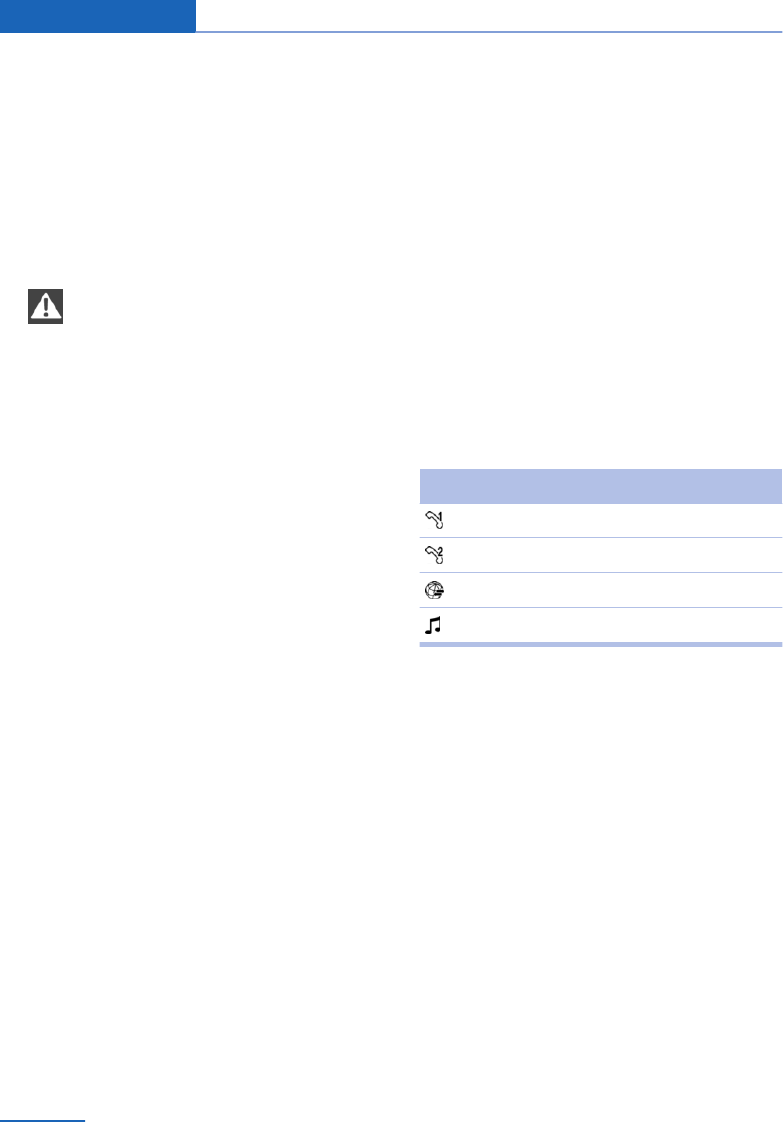
6. Select desired functions.
▷"Bluetooth audio"
▷"Office"
▷"Secondary telephone"
▷"Show pictures"
7. Tilt the controller to the left.
Connecting
Connecting the mobile phone
Only connect the mobile phone when the
vehicle is stationary. Otherwise, you may be
come distracted and endanger the vehicle oc
cupants and other road users.◀
Perform the connection in full at either the front
or rear control display.
1. "Settings"
2. "Connections"
3. "Bluetooth"
4. "Add new device"
The Bluetooth name of the vehicle is dis
played in the control display.
5. Perform other operations on the mobile
phone, see the Owner's Handbook of the
mobile phone: for example finding/connect
ing Bluetooth device or new device.
The Bluetooth name of the vehicle is shown
on the display of the mobile phone.
6. Select the Bluetooth name of the vehicle on
the display of the mobile phone.
7. Enter the same passkey on the mobile
phone and via iDrive and confirm.
Or
Compare the control number on the control
display with the control number in the mo
bile phone display. Confirm the control num
ber in the mobile phone and on the control
display.
"OK"
8. Select the function for which you would like
to use the mobile phone.
9. "OK"
The mobile phone is connected and shown
in the first position on the list of mobile
phones.
Up to three mobile phones can be connected to
the vehicle at the same time.
If the registration was unsuccessful: What to do
if..., see page 81.
Display of supported functions
Functions supported by the mobile phone are
shown as a symbol when registering.
White symbol: function is active.
Grey symbol: function is inactive.
Symbol Function
Telephone.
Additional telephone.
Data transfer.
Audio source.
After connecting for the first time
The mobile phone is paired in the vehicle after a
short delay when the engine is running or the
ignition switched on.
Phonebook entries on the telephone's SIM card
or the mobile phone itself are transferred to the
vehicle after it has been detected, depending on
the mobile phone.
For a few mobile phones, certain settings are
needed, for example, authorisation or secure
connection, see instruction manual of the mo
bile phone.
Connecting a certain mobile phone
1. "Settings"
2. "Connections"
Seite 80
Communication Telephone
80 Online Edition for Part no. 01 40 2 912 836 - 07 12 510

3. "Bluetooth"
4. Select the mobile phone to be connected.
Functions assigned to the mobile phone before
disconnection are reassigned to the mobile
phone upon reconnection. If applicable, this
function was deactivated for a previously con
nected mobile phone.
Configuring mobile phone
Functions can be activated or deactivated with
a registered and connected mobile phone.
1. "Settings"
2. "Connections"
3. "Bluetooth"
4. Highlight mobile phone to be configured.
5. Call up "Options".
6. "Configure device"
7. At least one function must be selected.
▷"Telephone"
▷"Secondary telephone"
▷"Data transfer"
▷"Audio"
8. "OK"
If a function is assigned to a mobile phone, then
this is deactivated for the already connected
mobile phone and the mobile phone is logged
off.
Switching telephone and additional
telephone
The function of the telephone and additional tel
ephone can be switched automatically.
1. "Settings"
2. "Connections"
3. "Bluetooth"
4. "Swap phone/second. phone"
Disconnecting a mobile phone
1. "Settings"
2. "Connections"
3. "Bluetooth"
4. Highlight the mobile phone to be discon
nected.
5. Call up "Options".
6. "Delete device"
What to do if...
Information about suitable mobile phones, see
page 78.
Mobile phone not registered or paired.
▷Is Bluetooth activated in the vehicle and the
mobile phone? Activate Bluetooth in the ve
hicle and the mobile phone.
▷Do the Bluetooth passkeys for the mobile
phone and vehicle match. Enter the same
passkey on the mobile phone and using
iDrive.
▷Duration for passkey input longer than
30 seconds. Repeat the connection at
tempt.
▷Does the control number on the mobile
phone and vehicle agree? Repeat the con
nection attempt.
▷Too many Bluetooth devices paired to the
mobile phone or the vehicle? If necessary
delete the pairing information for some
other device.
▷Is Bluetooth audio activated? Deactivate
Bluetooth audio.
▷Is the mobile phone in power-save mode or
is the battery low? Charge the mobile phone
using the snap-in adapter or the charging
cable.
▷If appropriate, only one mobile phone can be
connected to the vehicle, depending on the
mobile phone. De-register the mobile phone
from the vehicle and only register and con
nect one mobile phone.
The mobile phone is no longer responding.
Seite 81
Telephone Communication
81
Online Edition for Part no. 01 40 2 912 836 - 07 12 510

▷Switch the mobile phone off and on again.
▷Too high or low ambient temperatures? Do
not subject the mobile phone to extreme
ambient conditions.
Telephone functions not possible.
▷Configure mobile phone and connect with
the telephone or additional telephone func
tion.
No phone book entries, not all entries or incom
plete entries are displayed.
▷Transfer of the phone book entries has not
completed.
▷Under certain circumstances only the phone
book entries saved in the mobile phone or
on the SIM card are transferred.
▷It might be that phone book entries with spe
cial characters cannot be displayed.
▷Number of phone book entries to be stored
is too high.
▷Data volume of the contact too large, e.g.
due to stored information such as notes?
Reduce data volume of the contact.
▷Mobile phone connected as audio source?
Configure mobile phone and connect with
the telephone or additional telephone func
tion.
Quality of the phone connection is poor.
▷Bluetooth signal strength can be adjusted
on mobile phone, depends on the model.
▷Place the mobile phone in the snap-in
adapter or close to the centre console.
▷Adjust the volume of the microphone and
speaker separately.
If all the points on the list have been reviewed
and the desired function cannot be run, contact
Hotline or Service Centre.
Controls
Adjusting the volume
Turn the knob until the desired volume is
reached. The setting is saved for the remote
control currently in use.
Automatic volume equalisation
The vehicle adjusts the volume of the micro
phone on the telephone and the volume of the
other party automatically. Depending on the
mobile phone, it may be necessary to adapt the
volumes. Settings are possible only during a call
and must be adjusted separately for each mobile
phone. The settings are deleted as soon as the
mobile phone is de-registered.
1. "Settings"
2. "Sound"
3. "Volume settings"
4. Select desired setting: "Microphone" or
"Loudspeak."
5. Adjusting: turn the controller.
6. Saving: press the controller.
Incoming call
Receiving a call
If the number of the caller is saved in the tele
phone book and is transferred from the network,
the name of the contact and the telephone num
ber is displayed. Otherwise, only the phone
number is displayed.
Accepting a call
Using iDrive
"Accept"
Seite 82
Communication Telephone
82 Online Edition for Part no. 01 40 2 912 836 - 07 12 510
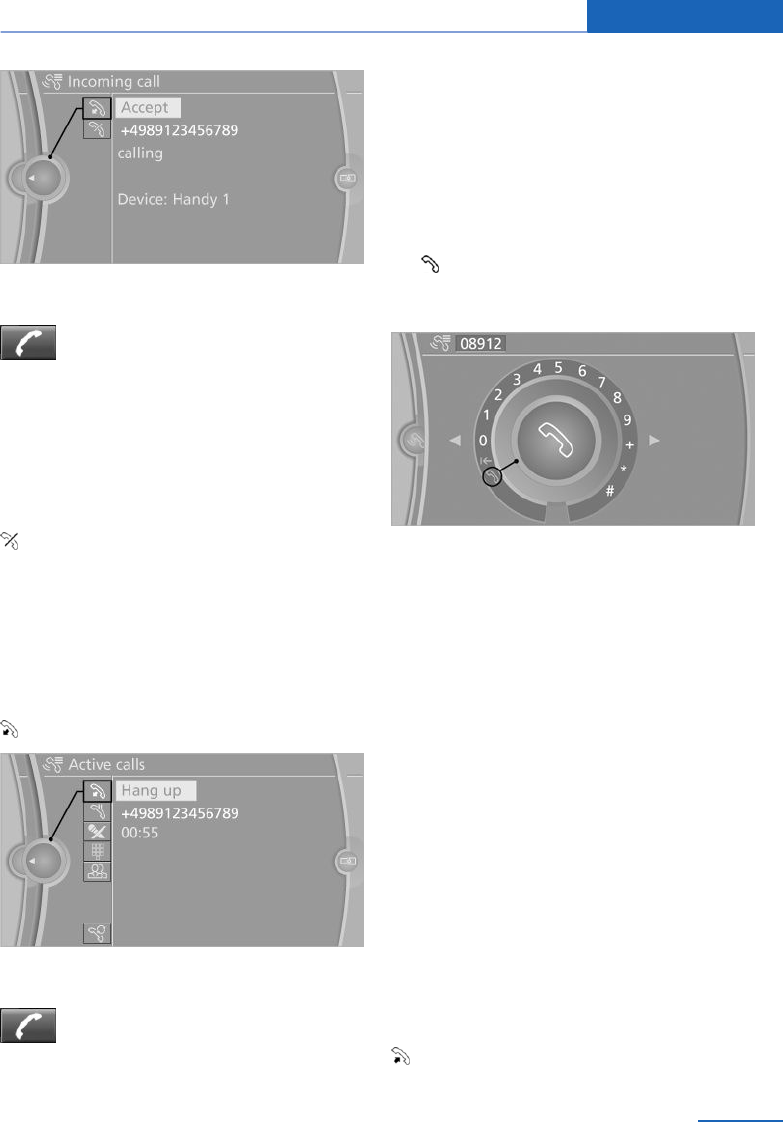
Via button on the steering wheel
Press the button.
Via instrument cluster
"Accept"
Rejecting a call
Using iDrive
"Reject"
Via instrument cluster
"Reject"
Ending a call
Using iDrive
"Hang up"
Via button on the steering wheel
Press the button.
Via instrument cluster
"Hang up"
Dialling a number
1. "Telephone"
2. "Dial number"
3. Select the digits individually.
4. Select the symbol. The call is made using
the mobile phone assigned to the telephone
function.
If a call is to be made through the supplementary
telephone:
1. Select the digits individually.
2. Call up "Options".
3. "via"
The phone number can also be entered using
the voice control system. The call is made using
the mobile phone assigned to the telephone
function.
Calls with a number of participants
General
It is possible to switch between calls or merge
two calls to set up a conference. The functions
must be supported by the mobile phone and
service provider.
Accepting a call during another call
If there is a second call during an ongoing call
you hear a call waiting signal, if applicable.
"Accept"
The call is accepted and the existing call is held.
Seite 83
Telephone Communication
83
Online Edition for Part no. 01 40 2 912 836 - 07 12 510
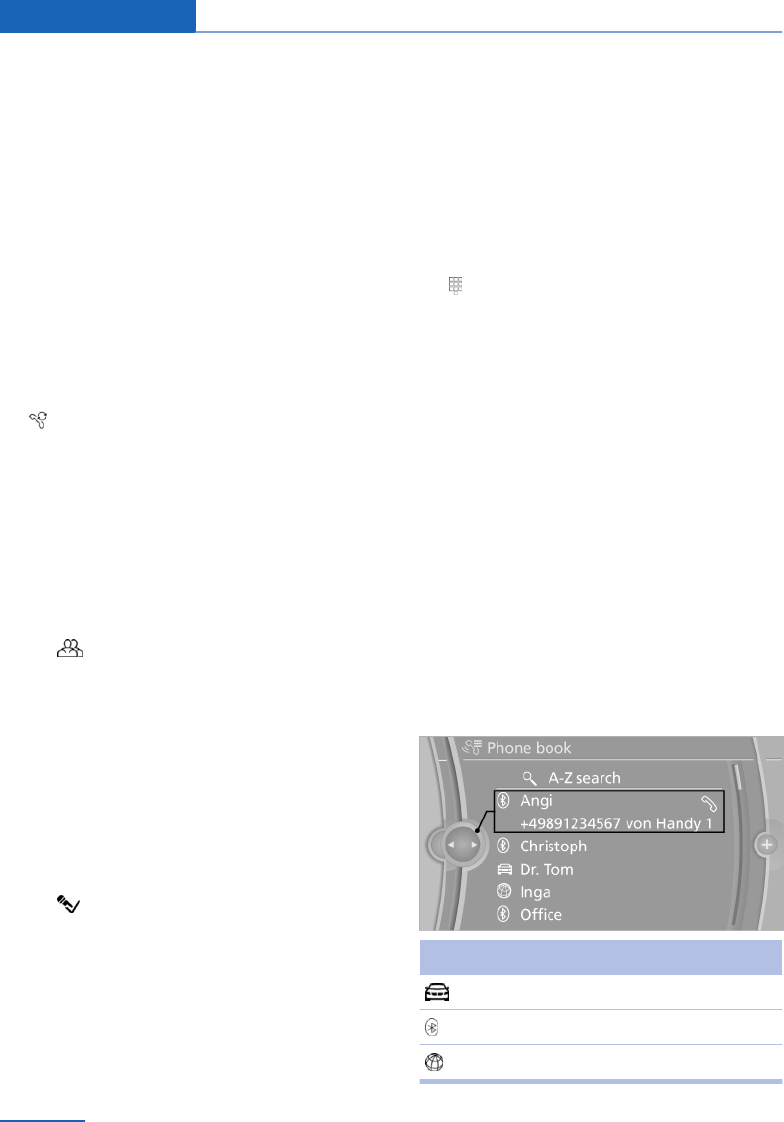
Setting up a second call
Set up another call during a call.
1. "Telephone"
2. "Active calls"
3. Dial a new phone number or select from a
list.
Switching between two calls,
alternating
You can switch between two calls. The calls can
be made using both connected mobile phones.
Active call is displayed in colour.
Call on hold is displayed in grey.
"Swap calls"
The phone switches to the call that is in pro
gress.
Setting up a conference
Two calls can be merged to set up a telephone
conference. The calls must be made through a
mobile phone.
1. Setting up two calls.
2. "Place conference call"
On termination, both calls are always termina
ted. If one call is terminated by another sub
scriber, the other call is continued, if required.
Setting the microphone to mute
The microphone can be muted during active
calls.
1. "Telephone"
2. "Active calls"
3. "Microphone muted"
The mute microphone is automatically activa
ted:
▷When a new call is set up.
▷When alternating between call parties.
DTMF overlap dialling
Using DTMF overlap dialling to access network
services or to control devices, e.g. remote an
swer phone access. This requires the DTMF
code.
1. "Telephone"
2. Selecting a contact from a list or "Dial
number".
3. "DTMF suffix dialling"
4. Enter DTMF code via iDrive.
Phone book
General
The phone book has access to the contacts
stored in the vehicle and contacts of the mobile
phones assigned the function telephone or sup
plementary telephone. All contacts for which a
phone number is entered are displayed. The
contacts saved with BMW Online are also
shown.
Displays
1. "Telephone"
2. "Phone book"
The symbols mark the storage location of the
contacts.
Symbol Storage location
Vehicle.
Mobile phone.
BMW Online address book.
Seite 84
Communication Telephone
84 Online Edition for Part no. 01 40 2 912 836 - 07 12 510
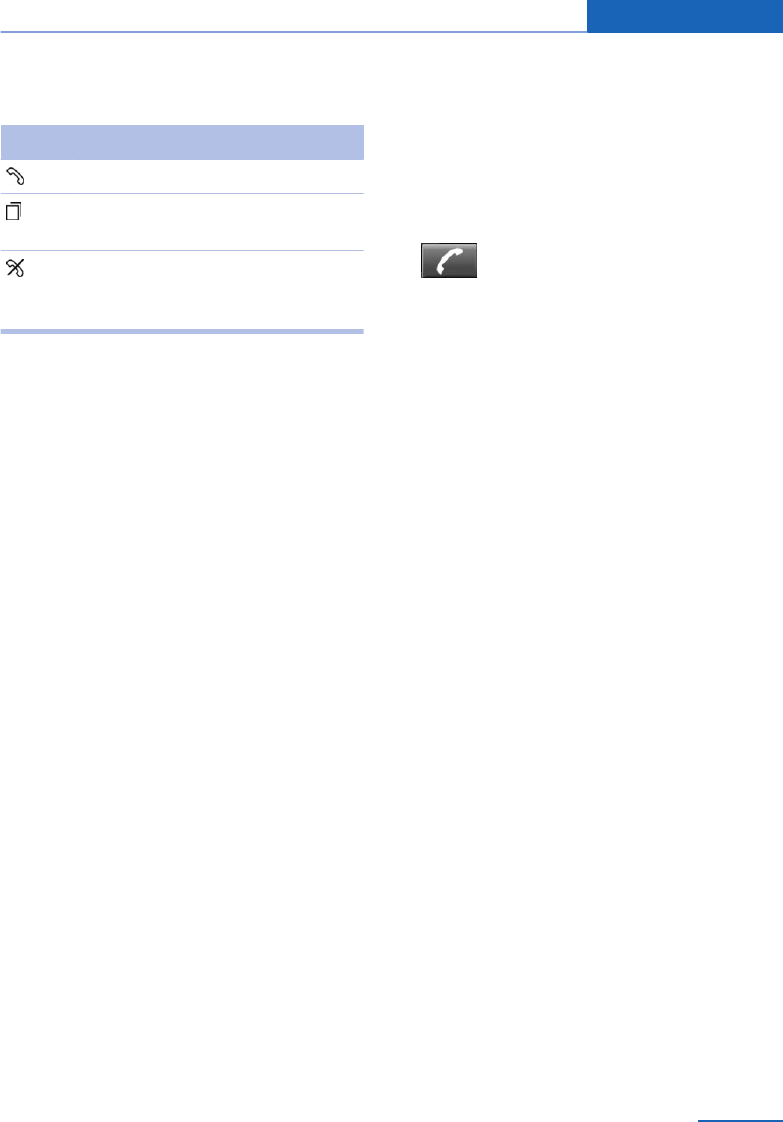
Making a call
The entries can be selected and a call set up.
Symbol Meaning
Contact with a stored number.
Contact with more than one stored
number.
Call not possible, mobile phone with
out reception or network, Teleser
vice Call or data transfer active.
Phone book entries with a stored phone num
ber: select desired entry.
Phone book entries with more than one stored
phone number: select desired entry and then
phone number.
The call is made using the mobile phone as
signed to the telephone function.
If the call is to be made using the mobile phone
assigned to the supplementary telephone func
tion:
1. Highlight contact, and highlight the desired
phone number if there are more than one.
2. Call up "Options".
3. "via"
Editing contacts
Changing the entries in the "Contacts" menu. If
a contact is changed, the changes are not saved
on the mobile phone. A copy of the entry is saved
in the vehicle.
1. Highlight the contact.
2. Call up "Options".
3. "Edit entry"
The contact can be edited.
Redialling
General
Lists of number dialled on the mobile phones
assigned the function telephone or supplemen
tary telephone, are transferred to the vehicle.
The last 20 numbers dialled are displayed for
each mobile phone.
Dialling numbers via the instrument
cluster
Possible if no call is currently active.
1. Press key on the steering wheel.
2. Select the desired phone number.
The call is made through the mobile phone from
the list of which the number comes.
Dial number using iDrive
1. "Telephone"
2. "Last number redial"
3. Select the desired entry and telephone
number as necessary.
The call is made using the mobile phone as
signed to the telephone function.
If the call is to be made using the mobile phone
assigned to the supplementary telephone func
tion:
1. Mark entry.
2. Call up "Options".
3. "via"
Saving an entry in Contacts
1. Mark entry.
2. Call up "Options".
3. "Save as contact" or "Add to contact"
4. If necessary, select contact.
5. Select the type of number: "Home", "Work",
"Mobile" or "Others"
6. If necessary, complete the entries.
7. "Save contact"
Seite 85
Telephone Communication
85
Online Edition for Part no. 01 40 2 912 836 - 07 12 510

Incoming calls
General
Lists of incoming calls on the mobile phones as
signed the function telephone or supplementary
telephone, are transferred to the vehicle. The
last 20 incoming calls are displayed for each
mobile phone.
Dial number using iDrive
1. "Telephone"
2. "Received calls"
3. Select the desired entry and telephone
number as necessary.
The call is made using the mobile phone as
signed to the telephone function.
If the call is to be made using the mobile phone
assigned to the supplementary telephone func
tion:
1. Mark entry.
2. Call up "Options".
3. "via"
Saving an entry in Contacts
1. Mark entry.
2. Call up "Options".
3. "Save as contact" or "Add to contact"
4. If necessary, select contact.
5. Select the type of number: "Home", "Work",
"Mobile" or "Others"
6. If necessary, complete the entries.
7. "Save contact"
Hands-free system
General
Calls taken via the hands-free system can be
continued via the mobile phone and vice versa.
From mobile phone to the hands-free
system
Calls that were started outside the Bluetooth
range of the vehicle can be continued via the
hands-free system when the ignition is switched
on.
Depending in the mobile phone, there is an au
tomatic switch to the hands-free mode.
If it is not automatically toggled, follow what is
displayed on the mobile phone screen, and also
see the instruction manual for the mobile phone.
From the hands-free system to the
mobile phone
Calls taken via the hands-free system can also
be continued via the mobile phone, depending
on the mobile phone.
Then follow what is displayed on the mobile
phone, and also see the instruction manual of
the mobile phone.
Snap-in adapter
Principle
The snap-in adapter enables:
▷Storage of the mobile phone.
▷Charging of the battery.
▷Connection to the external aerial of the ve
hicle.
This ensures better network reception and uni
form reproduction quality.
General
More detailed information on the snap-in adapt
ers which compatibly support the functions of
the handy can be obtained from the Service cen
tre.
Notes
At high temperatures, the charging functions of
the mobile can be restricted and no longer op
erate.
Seite 86
Communication Telephone
86 Online Edition for Part no. 01 40 2 912 836 - 07 12 510
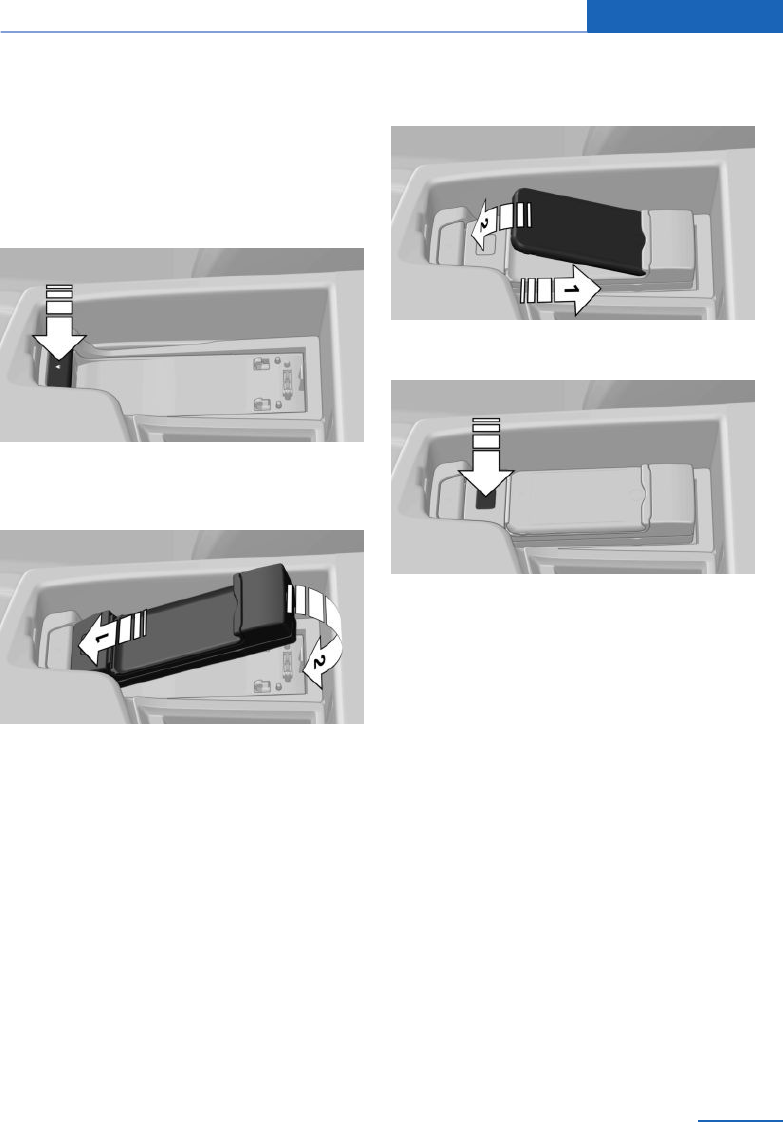
Installed position
In the front centre armrest. The direction of in
stallation in the centre armrest varies from vehi
cle to vehicle.
Inserting the snap-in adapter
1. Press the button and take out the cover.
2. Insert snap-in adapter at the front, arrow 1,
and press to the bottom, arrow 2, until the
adapter engages.
Inserting the mobile phone
1. Depending on the mobile phone, remove
the protective cap from the aerial connector
and from the USB port of the mobile phone
if necessary.
2. Push the mobile phone with buttons up
wards in the direction of the electrical con
nections, arrow 1, and push down, arrow 2,
until it engages.
Removing the mobile phone
Press the button and pick up the mobile phone.
Seite 87
Telephone Communication
87
Online Edition for Part no. 01 40 2 912 836 - 07 12 510
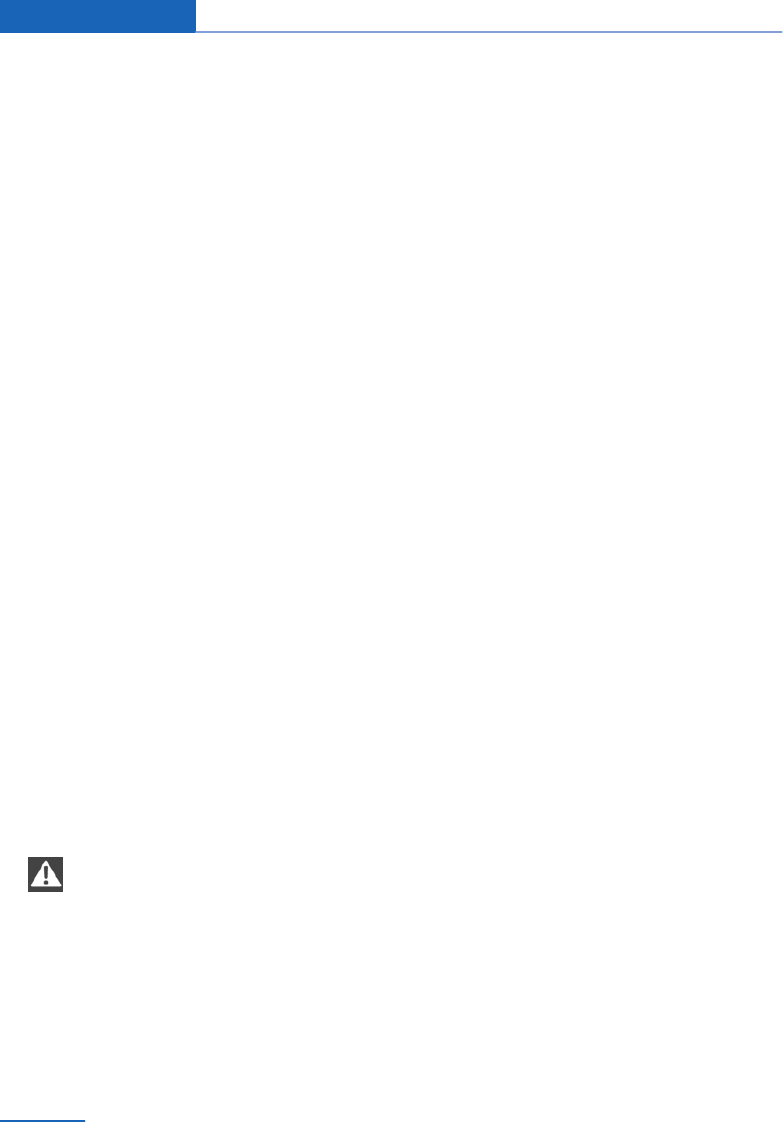
Office
Vehicle Equipment
This chapter describes all standard, national and
special equipment provided in the model series.
Therefore equipment not available in a vehicle is
also described, for example the selected special
equipment or national version. That also applies
to safety-relevant functions and systems.
Principle
Contacts, appointments, tasks, notes, text mes
sages and e-mails from the mobile phone can be
viewed on the control display if the mobile phone
supports these functions and is compatible with
the corresponding Bluetooth standards. Func
tions have to be released separately as required.
Transmission can take a few minutes after the
first time a mobile phone is paired.
General
Information on which mobile phones support
which Office functions can be found under
www.bmw.com/bluetooth.
Contents are completely displayed when the
vehicle is at standstill.
Notes
Do not operate Office while the vehicle is
in motion.
Only make adjustments if the traffic conditions
are appropriate. Otherwise, you may become
distracted and endanger the vehicle occupants
and other road users.◀
Operating requirements
▷Office is activated, see page 79.
▷A compatible mobile phone is registered
and connected to the vehicle. The mobile
phone is assigned the function telephone or
supplementary telephone.
▷For some mobile phones, data access must
be confirmed on the mobile phone.
▷Time, time zone and date are correctly set
on the Control Display and on the mobile
phone, for example to display appointments
correctly.
Updating
The data is updated every time the mobile
phone is connected to the vehicle. Appoint
ments, tasks, notes and reminders can be up
dated separately.
1. "Office"
2. "Office today", "Calendar", "Tasks",
"Notes/voice memos" or "Reminders"
3. Call up "Options".
4. "Update data"
Data from the mobile phone is transferred to
the vehicle again.
Office update
The number of unread messages and active
tasks as well as appointments coming up are
displayed.
1. "Office"
2. "Office today"
Seite 88
Communication Office
88 Online Edition for Part no. 01 40 2 912 836 - 07 12 510
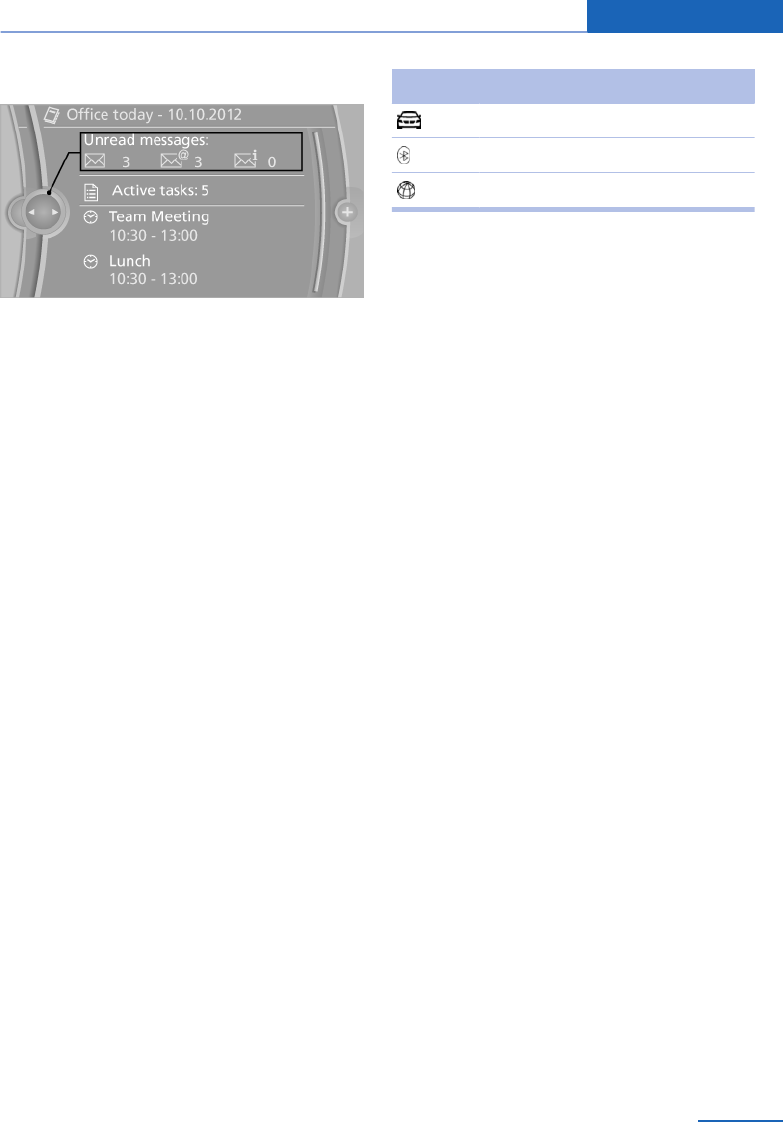
3. Select the desired entry to display details.
Contacts
General
Contacts can be created and edited. The con
tacts from the mobile phone assigned the func
tion telephone or supplementary telephone are
also shown, as are the contacts from the BMW
Online address book. The addresses can be
used as navigation destinations and the phone
numbers dialled directly.
Displaying contacts
1. "Office"
2. "Contacts"
All contacts are listed in alphabetical order.
The A-Z search function is offered, depend
ing on the number of contacts.
It can be selected whether the contacts are to
be transferred from a mobile. The contacts can
also be transferred from both connected mo
biles.
1. Call up "Options".
2. Select mobile from which the contacts are
to be transferred.
A symbol indicates the storage location of the
contacts:
Symbol Storage location
Vehicle.
Mobile phone.
BMW Online address book.
Displaying contacts from BMW Online
To display contacts from BMW Online, when
logging on to BMW Online the function "Log in
automatically" must be enabled.
Dial a phone number
1. Select the desired contact.
2. Select the phone number.
The connection is established.
If a call is to be made through the supplementary
telephone:
1. Select the desired contact.
2. Highlight phone number.
3. Call up "Options".
4. "via"
Editing contacts
Note
If a contact that comes from the mobile phone
or BMW Online is edited, the changes are not
saved on the mobile phone or at BMW Online. A
copy of the entry is saved in the vehicle.
Seite 89
Office Communication
89
Online Edition for Part no. 01 40 2 912 836 - 07 12 510
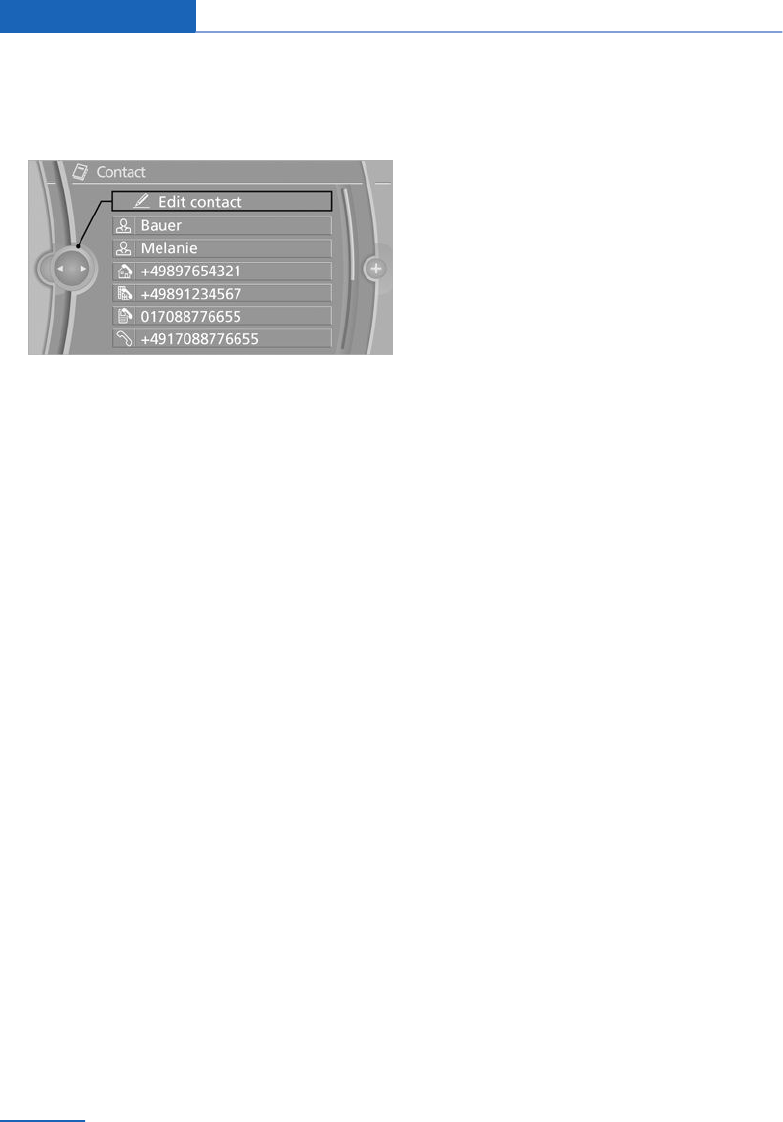
Edit
1. Select the desired contact.
2. "Edit contact"
3. Change entries.
4. "Save contact in veh."
Selecting a contact as navigation
destination
1. Select the desired contact.
2. Select address.
In the case of contacts from the mobile
phone and BMW Online address book, the
address might have to be matched to the
navigation data in the vehicle. If that is the
case:
Correct the address.
3. "Start guidance" or "Add as another
destination"
Checking address as destination
An address that is to be added to the route guid
ance must match the navigation data contained
in the vehicle. Here, the address can be
checked.
1. Select the desired contact.
2. Highlight address.
3. Call up "Options".
4. "Check as destination"
5. If necessary, correct and save the address.
If the address is corrected and saved, a copy is
created in the vehicle. The address is not
changed on the mobile phone or BMW Online.
Display the Internet address of a
contact
The Internet address stored for a contact can be
called up.
1. Select the desired contact.
2. Select Internet address.
The selected Internet address is displayed
in the browser.
Displaying additional information from
BMW Online
Display of additional information for a contact if
present at BMW Online.
1. Select the desired contact.
2. Call up "Options".
3. "Addit. info (BMW Online)"
New contact
Attaching
1. "Office"
2. "Contacts"
3. Call up "Options".
4. "New contact"
5. Input boxes still show previous input: "Clear
fields"
6. Complete input boxes: select input box.
7. Enter text and make any assignment.
8. In the navigation system: enter address.
Only addresses that are present in the car's
navigation data can be entered. This en
sures that route guidance is possible for all
addresses.
If applicable, "Accept"
9. "Save contact in veh."
The entries for a contact are assigned by the
following symbols.
Seite 90
Communication Office
90 Online Edition for Part no. 01 40 2 912 836 - 07 12 510
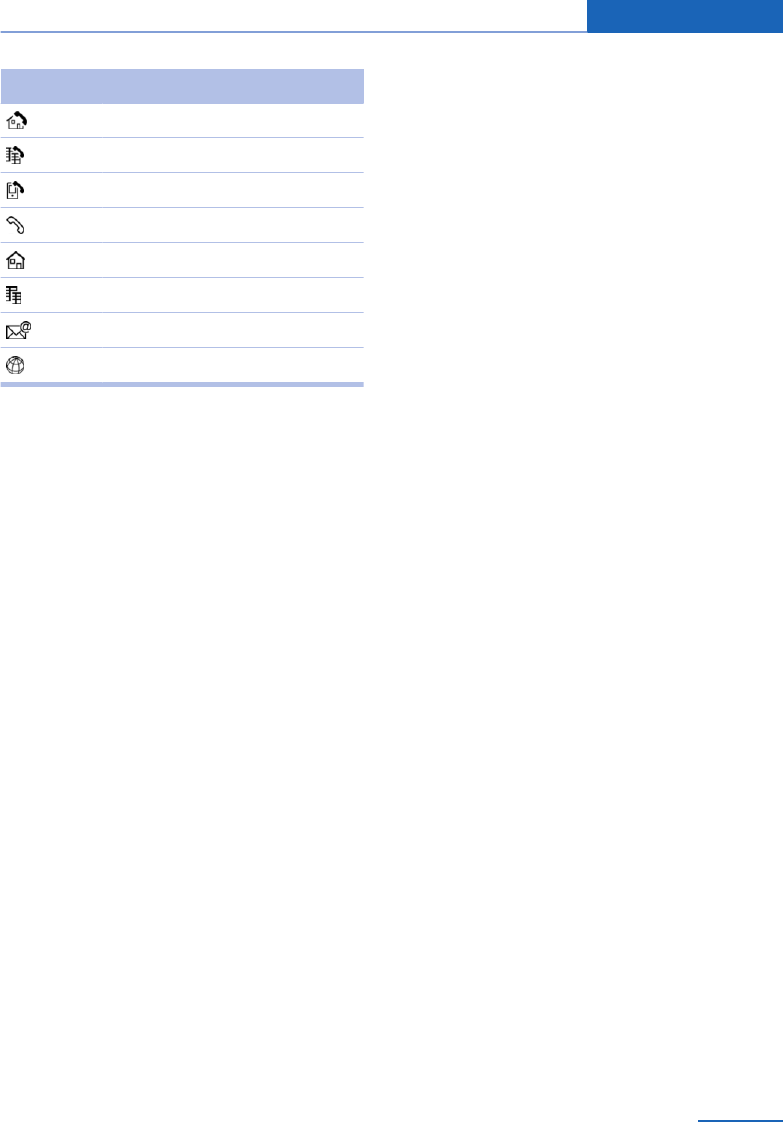
Symbol Meaning
Private phone number
Work phone number
Mobile phone number
Other phone number
Private address
Work address
E-mail address
Internet address
Specifying home address
A home address can be saved in memory. This
home address appears at the top of the list of
contacts.
1. "Office"
2. "Contacts"
3. "Home address"
4. Create contact.
5. "Save contact in veh."
Selecting sort order for names
Names can be displayed in a different order.
1. "Office"
2. "Contacts"
3. Call up "Options".
4. "Display surname first" or "Display first
name first"
The sort order for names might not be the same
as the selected sort order, depending on how
contacts are saved on your mobile phone.
Display contact images
Photos saved for contacts are saved in the ve
hicle when the mobile phone is connected to the
vehicle.
1. "Settings"
2. "Connections"
3. "Bluetooth"
4. Call up "Options".
5. "Configure Bluetooth"
6. "Show pictures"
Displaying all contact images is activated or de
activated.
Exporting/importing contacts
Contacts can be exported and imported via Per
sonal Profile. The contacts stored in the vehicle
are exported, not the contacts from the mobile
phone or BMW Online.
Deleting contacts
Only contacts saved in the vehicle are deleted.
The contacts from the mobile phone or BMW
Online cannot be deleted.
1. "Office"
2. "Contacts"
3. Highlight the contact.
4. Call up "Options".
5. "Delete contact" or "Delete all contacts".
6. If applicable, "Yes"
Messages
General
Messages are only displayed when they are
complete.
Displaying messages
1. "Office"
2. "Messages"
Seite 91
Office Communication
91
Online Edition for Part no. 01 40 2 912 836 - 07 12 510
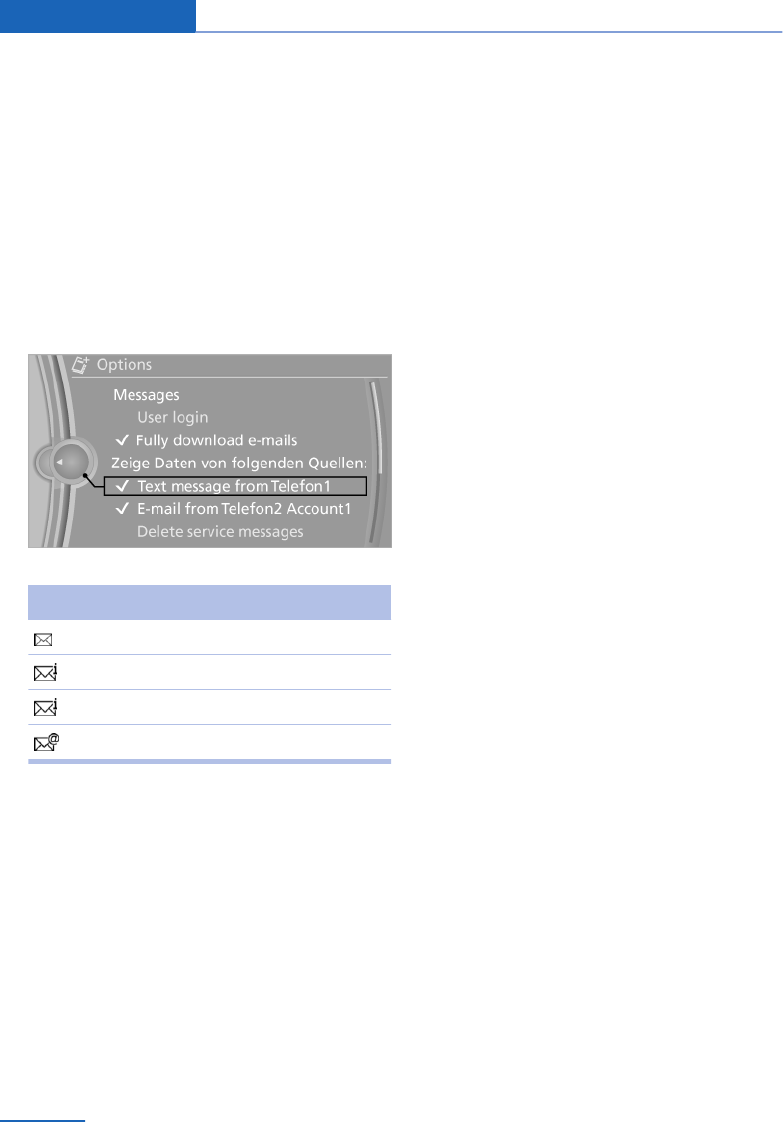
The latest messages are shown.
It can be selected whether the messages are to
be transferred from a mobile. The messages can
also be transferred from both connected mo
biles.
If a mobile phone is assigned to more than one
e-mail account, the desired e-mail account must
be selected.
1. Call up "Options".
2. Select mobile and which account from
which the messages are to be transferred.
A Symbol designated the message type.
Symbol Message type
SMS.
My Info
Message from information service.
E-mail from mobile phone
Select this to display a message.
Filter message list
The message list can be filtered if more than one
type of message is available. Filtering can be
combined between message type and message
status.
1. "Filter:"
2. Select type of message.
▷"All message types"
All messages are displayed.
▷"E-mail"
Only E-mails from the mobile phone are
displayed.
▷"Text message"
Only SMS messages are displayed.
▷"Service messages"
Only service messages are displayed.
Select message status.
▷"Unread messages"
Only unread messages are shown.
▷"Since start of journey"
All SMS and E-mails received since the
start of the trip are shown.
▷"All messages"
All messages are displayed.
Deleting messages
General
All message types can be deleted in the vehicle.
SMS and E-mails transferred from the mobile to
the vehicle are also deleted on the mobile.
Deleting a service message
1. Select the desired service message.
2. Call up "Options".
3. "Delete message"
Delete all service messages
1. Call up "Options".
2. "Delete all messages" or "Delete
messages"
SMS
General
SMS messages transferred from the mobile
phone to the vehicle.
Additional functions
The following functions are available when an
SMS message is selected:
Seite 92
Communication Office
92 Online Edition for Part no. 01 40 2 912 836 - 07 12 510
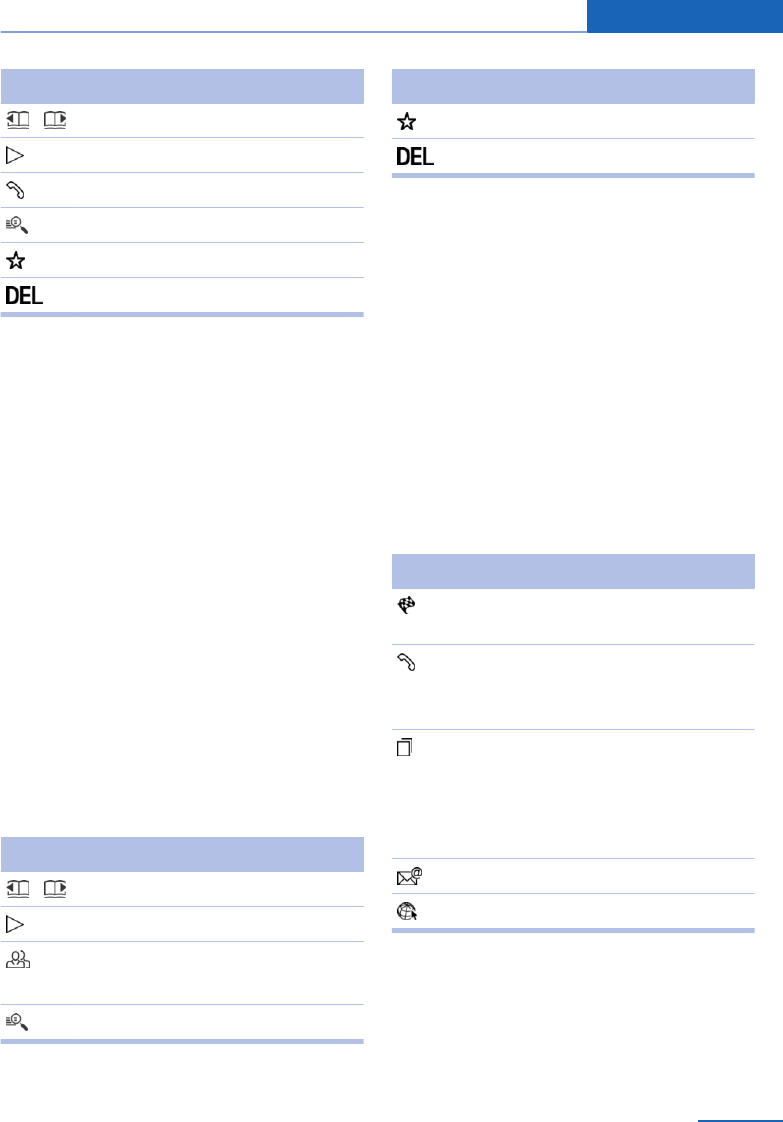
Symbol Function
Browse in the SMS
"Play", see page 97.
"Call sender"
"Use contact data", see page 97.
"Mark as unread"
"Delete message"
E-mail
General
E-mail messages transferred from the mobile
phone to the vehicle.
Deactivate complete display
Opening an E-mail in the vehicle completely
transfers it to the vehicle. This may be subject
to charges.
1. "Office"
2. "Messages"
3. Call up "Options".
4. "Fully download e-mails"
Only part of the E-mail is loaded from the
mobile phone into the vehicle.
Additional functions
The following functions are available when an e-
mail message is selected:
Symbol Function
Browse in the e-mail
"Play", see page 97.
"Sender/recipient"
Contact data are shown
"Use contact data", see page 97.
Symbol Function
"Mark as unread"
"Delete e-mail"
My Info
General
My Info messages from the BMW Assist Portal.
Replying
Send a predefined reply.
1. Select the desired message.
2. Call up "Options".
3. "Answer"
Additional functions
The following functions are available when a
message is selected:
Symbol Function
"Start guidance" or "Add as another
destination"
"Call"
A phone connection is established if
the message contains a number.
"Select phone number"
Select the desired number from the
list if the message contains more
than one number. Telephone con
nection is set up.
"Send e-mail (BMW Online)"
"Open link in browser"
Message from information service
General
Messages from BMW information service.
Seite 93
Office Communication
93
Online Edition for Part no. 01 40 2 912 836 - 07 12 510
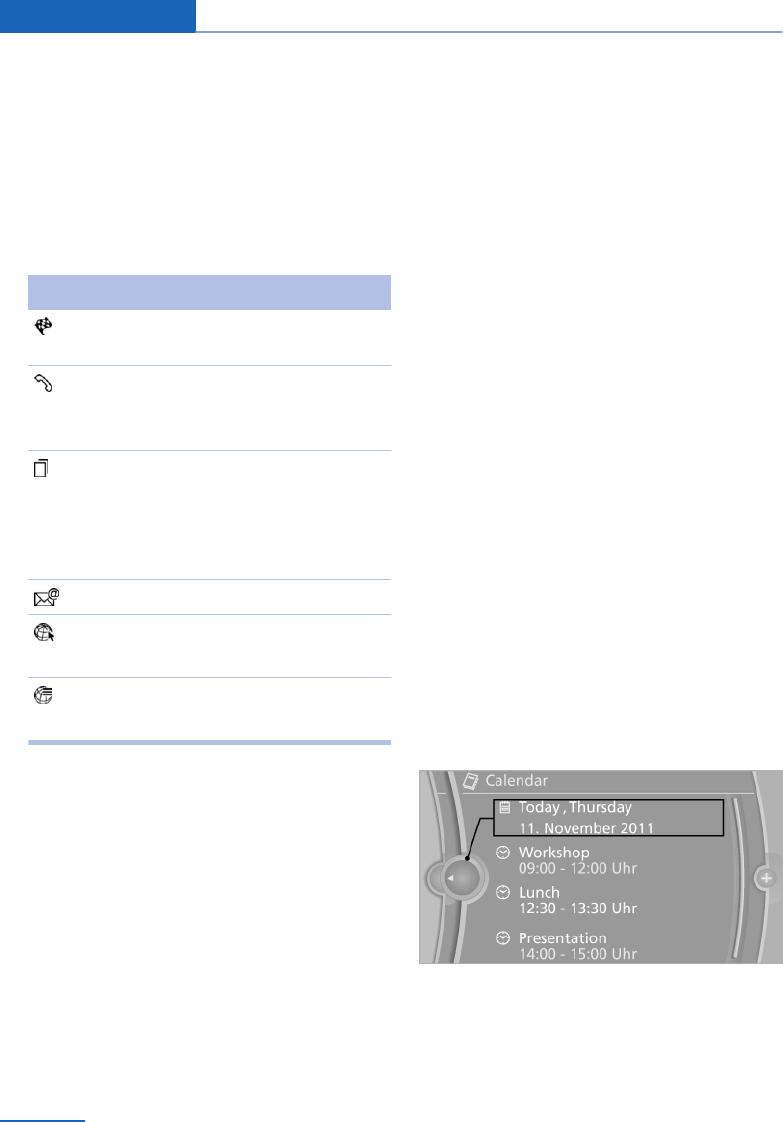
Saving an address
1. Select the desired message.
2. Call up "Options".
3. "Save contact in veh."
Additional functions
The following functions are available when a
message is selected:
Symbol Function
"Start guidance" or "Add as another
destination"
"Call"
A phone connection is established if
the message contains a number.
"Select phone number"
Select the desired number from the
list if the message contains more
than one number. Telephone con
nection is set up.
"Send e-mail (BMW Online)"
"Open link in browser"
Call up Internet address.
"Further information"
Display additional information
Calendar
Principle
The last 30 days and the next 90 days can be
displayed.
Displays
1. "Office"
2. "Calendar"
Yesterday, today and the next five days are
shown.
It can be selected whether the appointments are
to be transferred from a mobile. The appoint
ments can also be transferred from both con
nected mobiles.
1. Call up "Options".
2. Select mobile phone from which the ap
pointments are to be transferred.
Scroll to the current week, or
"Previous days": shows the last 7 days.
"Next days": shows the next 7 days.
Show calendar month
1. Select date.
The current month is shown. Appointments
are entered on the highlighted calendar
dates.
2. Turn controller until the previous or next
month is shown.
Show calendar day
1. Show calendar month.
2. Select desired day.
The appointments of the selected day are
shown.
Appointment
Displays
Select the desired appointment.
Additional functions
The following functions are available for the ap
pointment entry selected:
Seite 94
Communication Office
94 Online Edition for Part no. 01 40 2 912 836 - 07 12 510
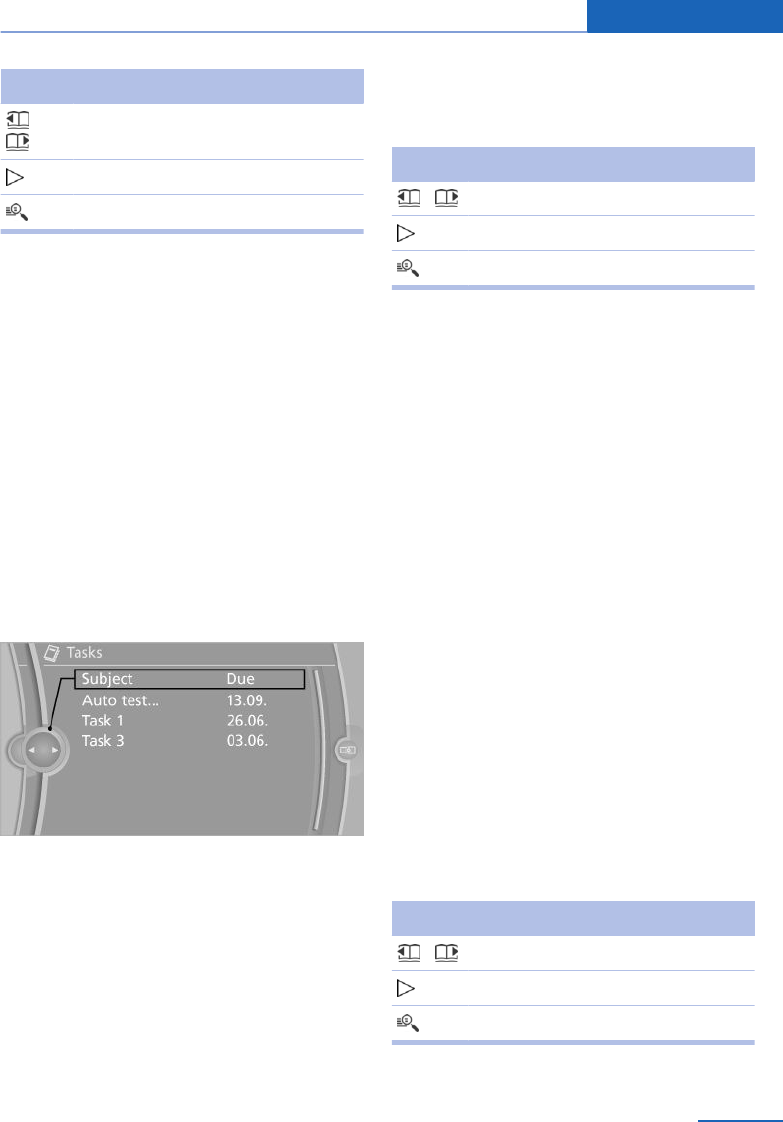
Symbol Function
Browse in the appointment
"Read out", see page 97.
"Use contact data", see page 97.
Tasks
Display task list
1. "Office"
2. "Tasks"
It can be selected whether the tasks are to be
transferred from a mobile. The tasks can also be
transferred from both connected mobiles.
1. Call up "Options".
2. Select mobile phone from which the tasks
are to be transferred.
Sort task list
1. Select headers in the task list.
2. Select sort criterion:
▷"Priority (!)"
▷"Subject"
▷"Due date"
Display task
Select the desired task.
Additional functions
The following functions are available when a
task is selected:
Symbol Function
Browse in the task
"Read out", see page 97.
"Use contact data", see page 97.
Notes
Display notes
1. "Office"
2. "Notes/voice memos"
All text memos from the mobile phone and
voice memos recorded in the vehicle are
shown.
It can be selected whether the notes are to be
transferred from a mobile. The notes can also be
transferred from both connected mobiles.
1. Call up "Options".
2. Select mobile phone from which the memos
are to be transferred.
Text memos
Show text memos
Select desired text memo.
Additional functions
The following functions are possible with a se
lected text memo:
Symbol Function
Browse in the memo
"Read out", see page 97.
"Use contact data", see page 97.
Seite 95
Office Communication
95
Online Edition for Part no. 01 40 2 912 836 - 07 12 510
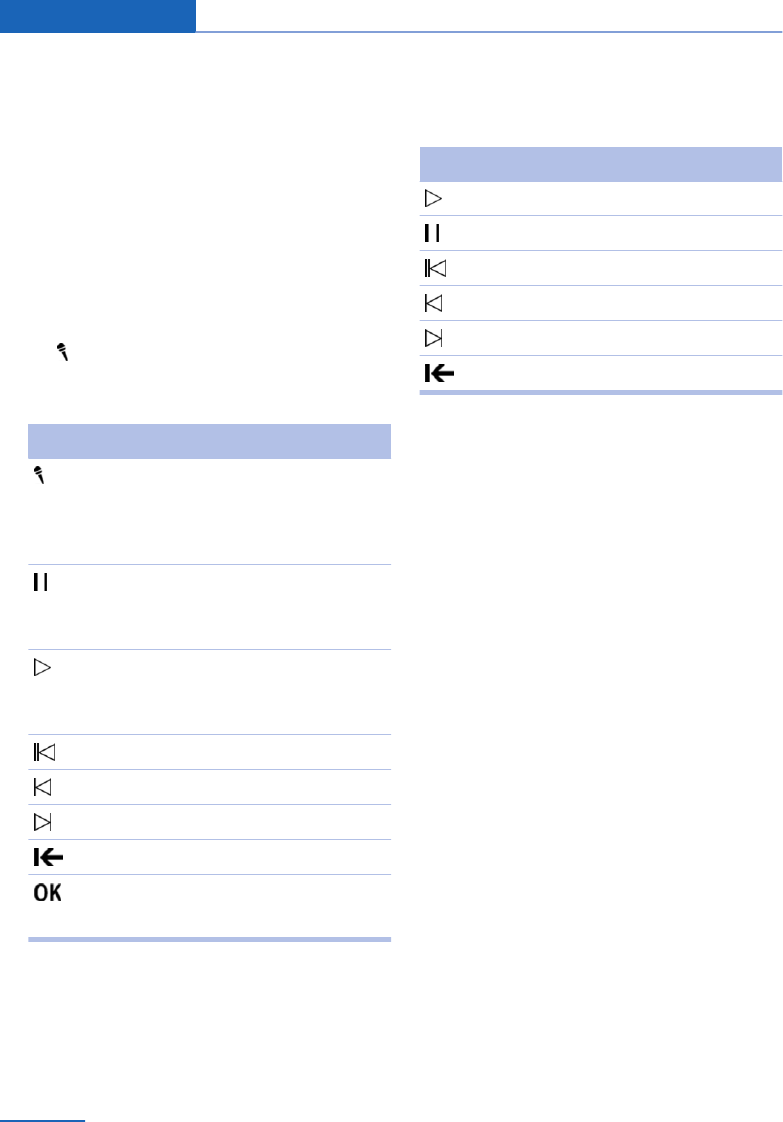
Voice memos
General
A voice memo can be recorded. These are
stored in the vehicle and can be exported
through the USB interface.
Record voice note
1. "Office"
2. "Notes/voice memos"
3. "New voice memo"
4. "Record voice memo"
Function selection
Symbol Function
"Record"
Start recording. After the voice
memo can be recorded after the
tone.
"Pause"
Pressing again restarts the record
ing.
"Play"
The recording cannot be continued
after starting playback.
"To beginning"
"Fast reverse"
"Fast forward"
"Delete"
"OK"
Finish recording.
Displaying voice memo
Select desired voice memo.
Additional functions
The following functions are possible with a se
lected voice memo:
Symbol Function
"Play"
"Pause"
"To beginning"
"Fast reverse"
"Fast forward"
"Delete"
Export voice note
To export voice memos through the USB con
nection in the centre console, a suitable medium
must be connected to the USB interface.
▷Suitable media: USB mass storage facilities,
for example USB memory sticks or MP3
players with USB interface.
▷Unsuitable media: USB hard disks, USB
hubs, USB memory card readers with a
number of bays, Apple iPod/iPhone.
▷File systems: current file systems for USB
devices are supported. FAT 32 format is
recommended.
1. Connect USB medium to the USB interface
in the centre armrest, see page 57.
2. "Office"
3. "Notes/voice memos"
4. Highlight desired voice memo.
5. Call up "Options".
6. "Export all memos (USB)" or "Export voice
memo (USB)"
All voice notes are exported and/or the pre
viously-marked voice note is exported.
Delete voice note
1. Mark desired voice note.
2. Call up "Options".
Seite 96
Communication Office
96 Online Edition for Part no. 01 40 2 912 836 - 07 12 510
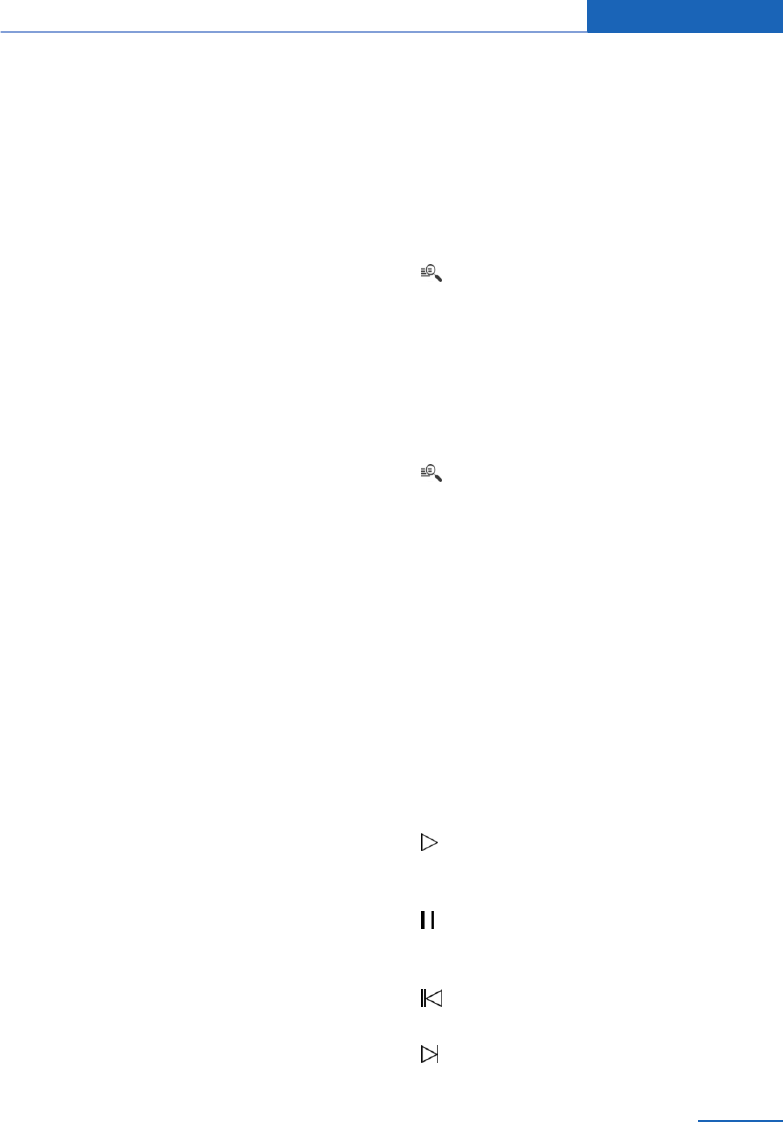
3. "Delete all voice memos" or "Delete voice
memo"
4. "OK"
Reminders
General
Reminders connected to appointments and
tasks are displayed. After an appointment or
task deadline has elapsed, the reminder is no
longer displayed.
Display reminders
1. "Office"
2. "Reminders"
3. Select the desired reminder.
The relevant appointment or task is dis
played.
It can be selected whether the reminders are to
be transferred from a mobile. The reminders can
also be transferred from both connected mo
biles.
1. Call up "Options".
2. Select mobile phone from which the remind
ers are to be transferred.
Activate/deactivate pop-up reminder
1. "Office"
2. Call up "Options".
3. "Reminder pop-up"
All reminders for appointments and tasks
are shown in a list on the control display
when they are due.
Close all reminders
1. "Office"
2. "Reminders"
3. "Close all reminders"
Use contact data
General
Contact data from appointments, tasks, SMS,
Emails and notes can be stored or selected.
Display contact or dial telephone
number
1. "Use contact data"
2. Display contact or dial telephone number:
▷Select contact to display a detailed view
of the contact.
▷Select telephone number to make a di
rect connection.
Store contact data
1. "Use contact data"
2. Highlight telephone number or e-mail ad
dress.
3. Call up "Options".
4. "Add to contact" or "Save as contact"
Reading out
General
SMS, E-mails, appointments, tasks, memos and
voice memos can be read out or played back.
Reading out
1. Select desired element.
2. "Read out"
The following possibilities are available when
reading out or playing back:
▷ "Pause"
Interrupt reading out. Select again to restart
reading out.
▷ "To beginning"
Read out again from the beginning.
▷ "Next paragraph"
Skip paragraph.
Seite 97
Office Communication
97
Online Edition for Part no. 01 40 2 912 836 - 07 12 510

▷ "Previous paragraph"
Return to last paragraph.
▷To end reading out or playback, tip the con
troller to the left.
What to do if...
Information about suitable mobile phones, see
page 78.
Appointments, tasks, reminders, memos, or
messages from the mobile phone are not dis
played?
▷Mobile phone is not suitable for the missing
function or it is not connected correctly?
▷Mobile phone is also connected by WLAN.
▷Office function is deactivated.
▷Mobile phone is not selected for transferring
the desired elements.
▷Appointments are more than 30 days old/
more than 90 days ahead.
▷Tasks are marked as done.
▷Not all stored appointments, tasks, notes,
messages in the mobile phone are displayed
in the vehicle, depending on the number of
stored appointments.
Are not all appointments, tasks and reminders
from the mobile phone displayed at the correct
time?
▷Time zone, time or date is not correctly set
on the control display and the mobile phone.
The E-mail attachment is not displayed.
▷E-mails are transferred without attach
ments.
Texts of entries are not fully displayed.
▷Texts are abridged before they are transfer
red from the mobile phone.
▷Synchronisation between mobile phone and
vehicle might take several minutes to com
plete.
Contact photos are not displayed.
▷For each mobile phone connected, a maxi
mum of 200 contact images are transferred
to the vehicle.
Are E-mails displayed with a delay?
▷Check E-mail settings on the mobile phone
and adjust, if applicable.
If all the points on the list have been reviewed
and the desired function cannot be run, contact
Hotline or Service Centre.
Seite 98
Communication Office
98 Online Edition for Part no. 01 40 2 912 836 - 07 12 510
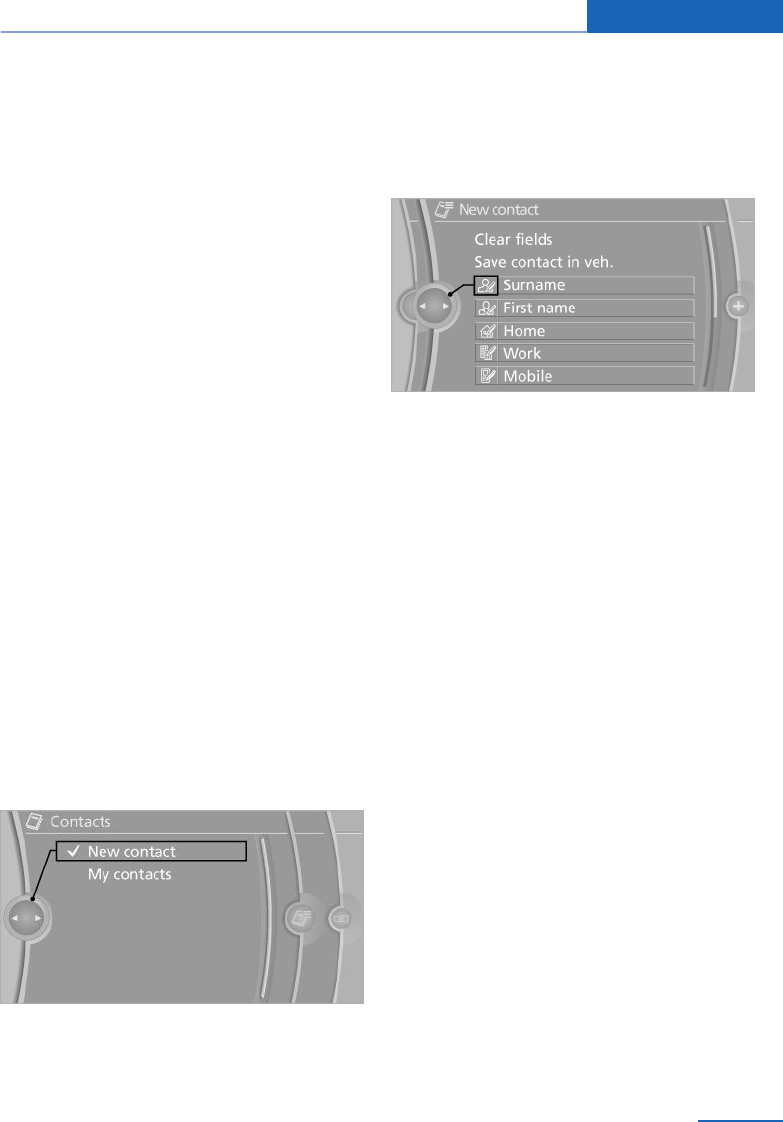
Contacts
Vehicle Equipment
This chapter describes all standard, national and
special equipment provided in the model series.
Therefore equipment not available in a vehicle is
also described, for example the selected special
equipment or national version. That also applies
to safety-relevant functions and systems.
General
Contacts can be created and edited. The con
tacts from the mobile are also shown. Addresses
can be used as navigation destinations and the
phone numbers dialled directly.
Operating requirements
This description of the contacts applied with
equipment with hands-free system with USB in
terface or without a mobile phone provision.
New contact
Attaching
1. "Contacts"
2. "New contact"
3. Input boxes still show previous input: "Clear
fields"
4. To complete the input fields: select the sym
bol beside the input field.
5. Enter text.
6. If equipped with navigation system: Enter
address. Only addresses that are present in
the car's navigation data can be entered.
This ensures that route guidance is possible
for all addresses.
7. If applicable, "Save"
8. "Save contact in veh."
Specifying home address
A home address can be saved in memory. This
home address appears at the top of the list of
contacts.
1. "Home address"
2. Create contact.
3. "Save contact in veh."
My contacts
General
List of all contacts saved in the vehicle.
Displaying contacts
1. "Contacts"
Seite 99
Contacts Communication
99
Online Edition for Part no. 01 40 2 912 836 - 07 12 510
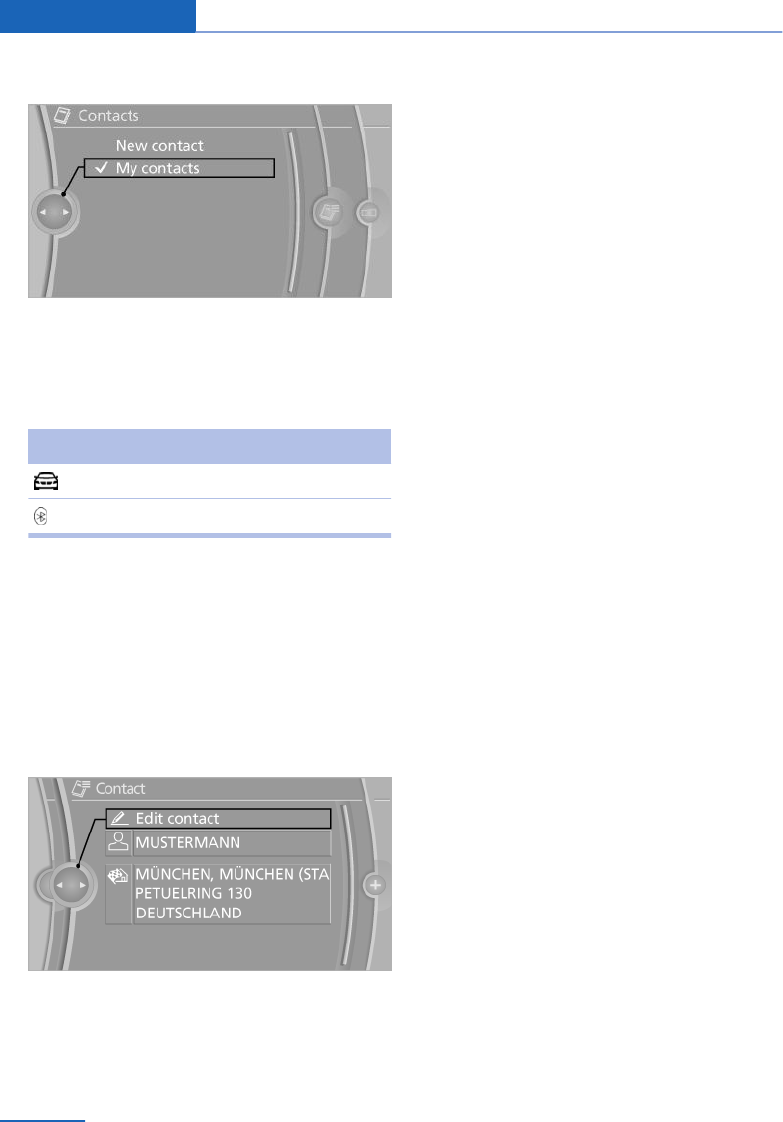
2. "My contacts"
All contacts are listed in alphabetical order. The
A-Z search function is offered, depending on the
number of contacts.
A symbol indicates the storage location of the
contacts:
Symbol Storage location
Vehicle.
Mobile phone.
Dial a phone number
1. Select the desired contact.
2. Select the phone number.
The connection is established.
Editing contacts
1. Select the desired contact.
2. "Edit contact"
3. Change entries.
4. Tilt the controller to the left.
5. "Yes"
If a contact that comes from the mobile phone is
edited, the changes are not saved on the mobile
phone. A copy of the entry is saved in the vehicle
and only the copy is displayed. Under certain
circumstances an identical contact entry is cre
ated.
Selecting a contact as navigation
destination
1. Select the desired contact.
2. Select address.
In the case of contacts from the mobile
phone, the address might have to be
matched to the navigation data in the vehi
cle. In this case: correct the address.
3. "Start guidance" or "Add as another
destination"
Checking address as destination
An address that is to be added to the route guid
ance must match the navigation data contained
in the vehicle. Here, the address can be
checked.
1. Select the desired contact and highlight the
address.
2. Call up "Options".
3. "Check as destination"
4. If necessary, correct and save the address.
If the address is corrected and saved, a copy is
created in the vehicle. The address is not
changed on the mobile phone.
Selecting sort order for names
Names can be displayed in a different order.
1. "My contacts"
2. Call up "Options".
3. "Display surname first" or "Display first
name first"
The sort order for names might not be the same
as the selected sort order, depending on how
contacts are saved on your mobile phone.
Seite 100
Communication Contacts
100 Online Edition for Part no. 01 40 2 912 836 - 07 12 510

Exporting/importing contacts
Contacts can be exported and imported via Per
sonal Profile, see Owner's Handbook for the ve
hicle.
Deleting contacts
Only contacts saved in the vehicle are deleted.
It is not possible to delete contacts from the mo
bile phone.
1. "My contacts"
2. Highlight the contact.
3. Call up "Options".
4. "Delete contact" or "Delete all contacts"
Seite 101
Contacts Communication
101
Online Edition for Part no. 01 40 2 912 836 - 07 12 510
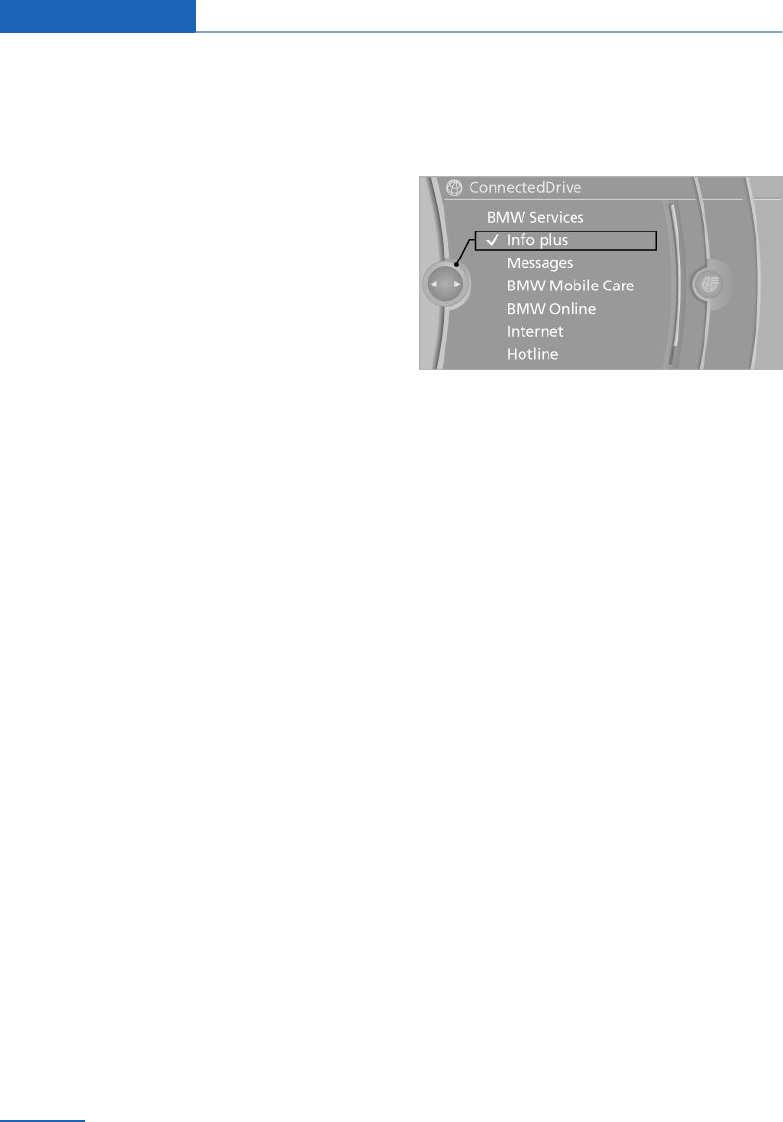
ConnectedDrive
Vehicle Equipment
This chapter describes all standard, national and
special equipment provided in the model series.
Therefore equipment not available in a vehicle is
also described, for example the selected special
equipment or national version. That also applies
to safety-relevant functions and systems.
BMW Assist
General
Assist provides certain services, for example an
information service.
The exact offering is country-specific. Your
Service centre will be glad to answer any ques
tions you might have.
Assist can also be used via the Internet, where
additional services are available:
www.bmw.com.
During a connection to Assist, it might be that
no telephone connection can be established via
the mobile phone. If the mobile phone is to be
used, disconnect it from the vehicle.
Information service
General
The information service provides information,
for example regarding hotels, emergency chem
ists, etc. and provides their telephone numbers
and addresses to the vehicle. To do this, a call is
made to the information service through the mo
bile phone. Phone numbers can be called di
rectly and addresses taken over as a destination
in the navigation.
Starting the information service
1. "BMW Services" or "ConnectedDrive"
2. "Info plus"
3. "Start service"
A voice connection to the BMW information
service is established.
BMW TeleServices
Principle
TeleServices supports communication with the
Service centre.
General
Data on the servicing needs of the vehicle can
be transferred directly to the Service centre. In
so doing, the Service centre can initiate the work
needed earlier. The workshop stay is shortened.
In the case of a breakdown, data on the vehicle
condition can be transferred to the Mobile Serv
ice. It might be that malfunctions can be rem
edied directly.
The offering is country-specific.
Connection charges can be incurred.
Services can be limited abroad.
Requirements
▷BMW Assist is activated.
If BMW Assist is not activated, a mobile
phone recommended by BMW for TeleSer
vices and configured for mobile data com
Seite 102
Communication ConnectedDrive
102 Online Edition for Part no. 01 40 2 912 836 - 07 12 510
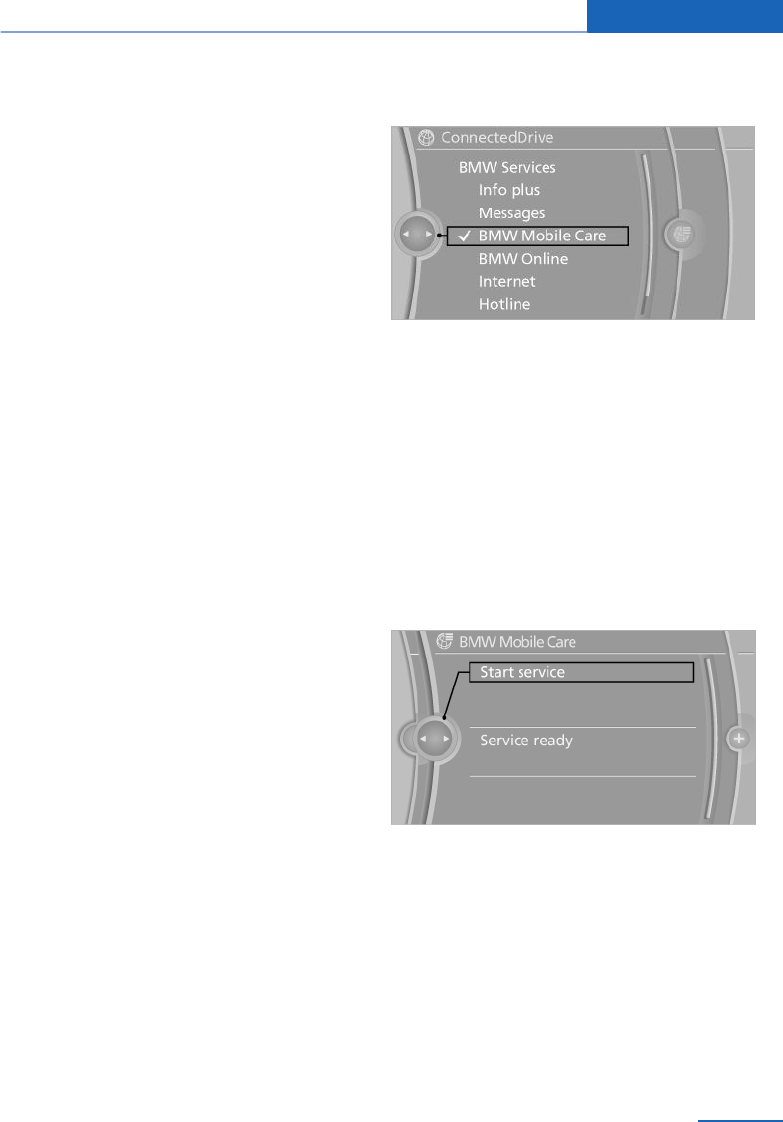
munication must be connected to the vehi
cle.
▷The SIM card is enabled for free service
numbers.
▷Mobile telephony reception must be guar
anteed.
▷The ignition is switched on.
Using BMW TeleServices
The TeleServices are generally activated in the
vehicle.
If the TeleServies are not active, it is possible to
make a call to the Mobile Service.
To continue to use it, or to deactivate the serv
ices, contact your service partner or the BMW
Customer Hotline.
Breakdown assistance
Principle
The Mobile Service offered by the BMW Group
can be contacted if you require help in the event
of a breakdown.
General
Contact with the Mobil en Service can also be
done with a Check Control Message, see Own
er's Manual for the vehicle.
Start breakdown assistance without
BMW Assist or BMW TeleServices
1. "BMW Services" or "ConnectedDrive"
2. "BMW Mobile Care"
The number for breakdown assistance is
displayed. If a mobile phone is connected, a
connection to breakdown assistance is es
tablished.
Start breakdown assistance with BMW
Assist or BMW TeleServices
Starting service
When equipped with BMW TeleServices, first
through the BMW Teleservice diagnosis and
then by the BMW Teleservice assistance, sup
port is provided.
1. "BMW Services" or "ConnectedDrive"
2. "BMW Mobile Care"
3. "Start service"
BMW Teleservice Diagnosis
Teleservice Diagnosis enables transfer of de
tailed vehicle data that are necessary for diag
nosis of the vehicle via mobile telephony. This
data is transferred automatically.
After transfer of the data, a voice connection to
the Mobile Service is established.
Seite 103
ConnectedDrive Communication
103
Online Edition for Part no. 01 40 2 912 836 - 07 12 510
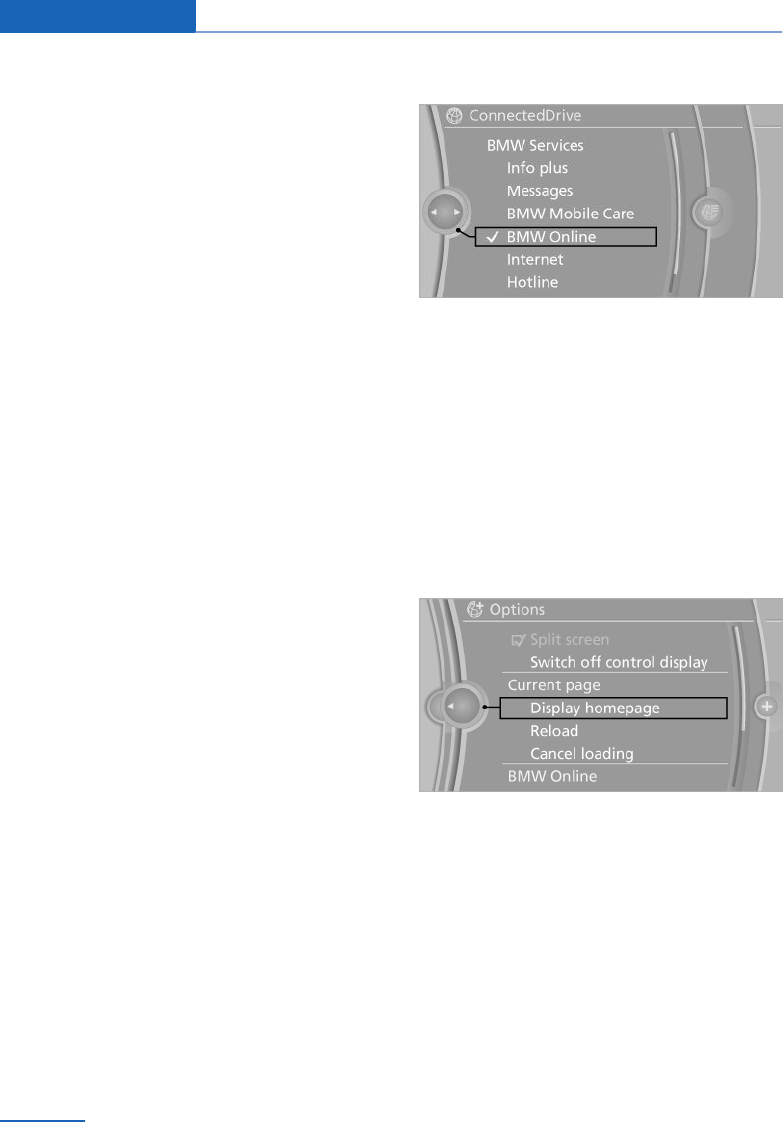
BMW Teleservice Assistance
The Teleservice Assistance enables a deeper
diagnosis of the vehicle to be gone through by
the Mobile Service.
As requested by the Mobile Service and on ter
minating the voice connection, the Teleservice
Assistance can be started.
Starting BMW Teleservice Assistance
1. Park the vehicle safely.
2. Apply the parking brake.
3. The ignition is switched on.
4. "Teleservice help"
After concluding the Teleservice Assistance, a
voice connection to the Mobile Service is es
tablished.
BMW Online
Principle
BMW Online is an online portal which provides
certain services for use in the vehicle, for exam
ple, weather forecasts, current news, stock mar
ket data, access to E-mails and personal ad
dress book.
Operating requirements
▷BMW Online is applied for at the Service
centre.
▷Mobile telephony reception must be guar
anteed.
▷For certain services, for example informa
tion on current location, the vehicle must be
able to determine your current location.
▷The correct date is set on the control dis
play, see Owner's Manual for the vehicle.
Starting
1. "BMW Services" or "ConnectedDrive"
2. "BMW Online"
3. If applicable, "OK"
The BMW Online start page is displayed.
Operating
To select and display content:
▷Turn the controller to highlight an element.
▷Press the controller to display an element.
Call up home page
1. Call up "Options".
2. "Display homepage"
Reloading a page
1. Call up "Options".
2. "Update"
Cancel
1. Call up "Options".
2. "Cancel loading"
Seite 104
Communication ConnectedDrive
104 Online Edition for Part no. 01 40 2 912 836 - 07 12 510
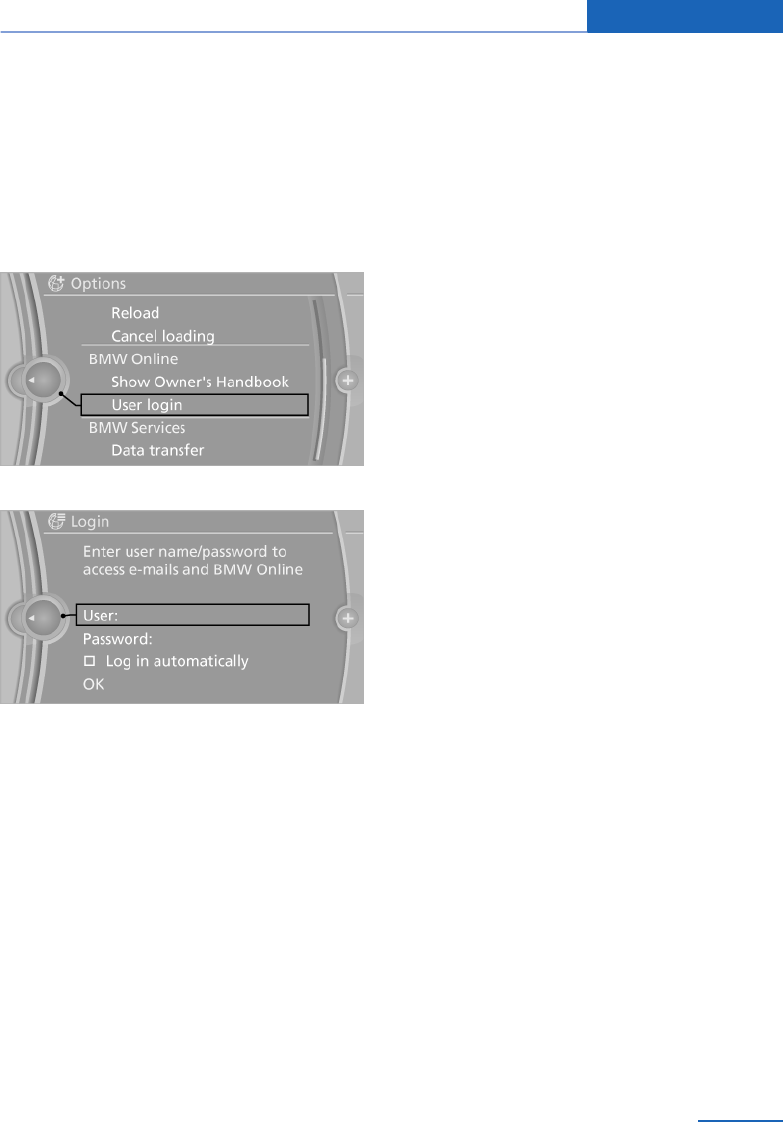
Log on
To display contacts of BMW Online or other per
sonal data, log on is required.
1. "BMW Services" or "ConnectedDrive"
2. "BMW Online"
3. Call up "Options".
4. "User login"
5. "User:"
6. Enter your user name and select "OK".
7. "Password:"
8. Enter your password.
9. "OK"
Automatic log on
The log on takes place automatically when BMW
Online is called up.
"Log in automatically"
Logging off
1. "BMW Services" or "ConnectedDrive"
2. "BMW Online"
3. Call up "Options".
4. "User logoff"
BMW Live
Principle
BMW Live is an online portal, providing certain
services available to use in the vehicle, e.g. in
formation on weather forecasts.
BMW Live is available through the SIM card in
the mobile phone.
Notes
Follow the data transfer instructions, see
page 79.
Operating requirements
Mobile telephony reception must be guaran
teed.
Some of the functions need an E-mail address
to be stored to be able to work.
For certain services, for example information on
current location, the vehicle must be able to de
termine your current location.
The correct date is set on the control display,
see Owner's Manual for the vehicle.
Starting
1. "BMW Services" or "ConnectedDrive"
2. "BMW Live"
The BMW Live home page is displayed.
Operating
To select and display content:
▷Turn the controller to highlight an element.
▷Press the controller to display an element.
Call up home page
1. Call up "Options".
2. "Display homepage"
Reloading a page
1. Call up "Options".
2. "Update"
Seite 105
ConnectedDrive Communication
105
Online Edition for Part no. 01 40 2 912 836 - 07 12 510
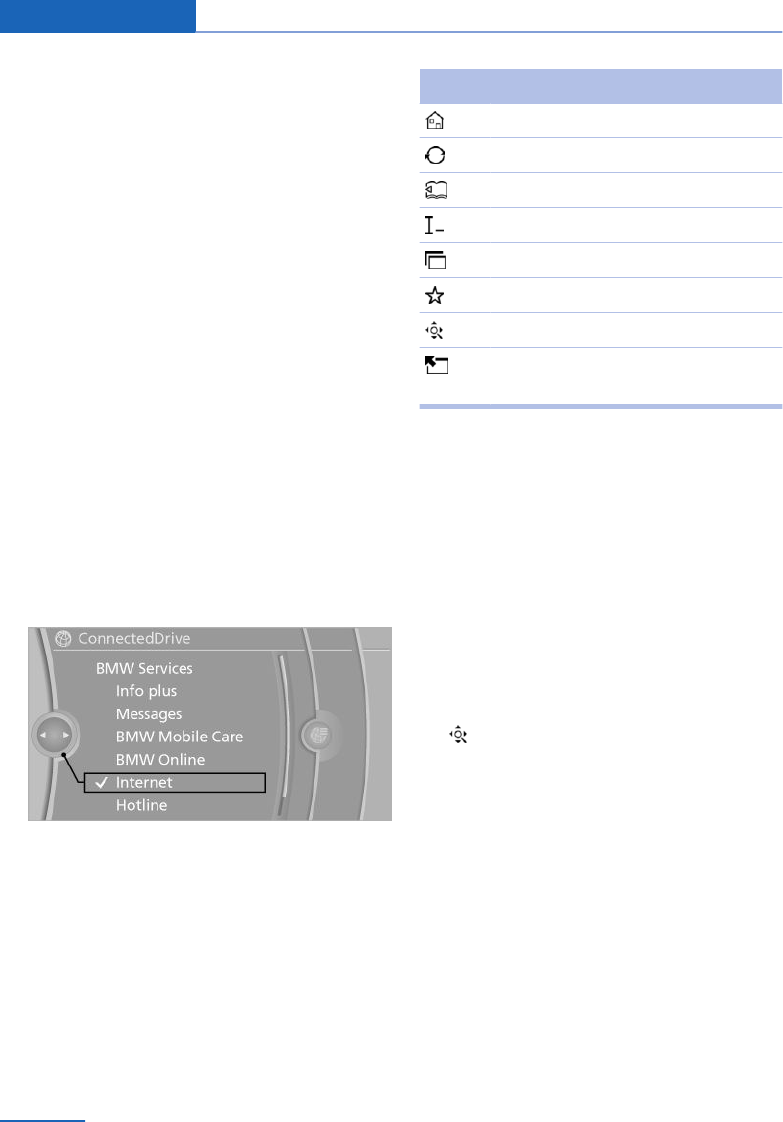
Cancel
1. Call up "Options".
2. "Cancel loading"
Internet
General
The Internet is available through the SIM card
installed in the vehicle or the SIM card in the
mobile phone. If the Internet is used through the
SIM card in the mobile phone, follow instruc
tions on data transmission, see page 79.
Note
For your own safety, the Internet is displayed
only at up to approx. 5 km/h; for some national-
market versions, only when the vehicle is at a
standstill.
Call up
1. "BMW Services" or "ConnectedDrive"
2. "Internet"
The home page is displayed. It is possible that
the Internet sites are not displayed in the same
way as on a PC. Flash or Java applications may
be displayed incorrectly.
Operating
Function bar
A toolbar for operation is displayed. To activate
the toolbar, tilt the controller to the left until the
cursor is located in the toolbar or press the
BACK button.
Symbol Function
Call up home page.
Refresh, reload
Back.
Entering Internet address.
Tabs.
Show favourites and history.
Zoom.
Leave browser and cut off data con
nection.
Navigating with the mouse pointer
▷To move the mouse pointer: tilt the control
ler in the corresponding direction.
▷To move the mouse pointer diagonally: tilt
the controller in the corresponding direction
and turn it.
▷To select an element: move the mouse
pointer onto the element and press the con
troller.
▷To scroll: turn the controller.
Zoom
1. "Zoom"
2. ▷Turn controller: enlarge or reduce web
page.
▷Tip controller: move the web page in four
directions.
3. Press the controller.
The setting is saved.
Status display
A symbol in the top left on the screen indicates
the following status:
Seite 106
Communication ConnectedDrive
106 Online Edition for Part no. 01 40 2 912 836 - 07 12 510
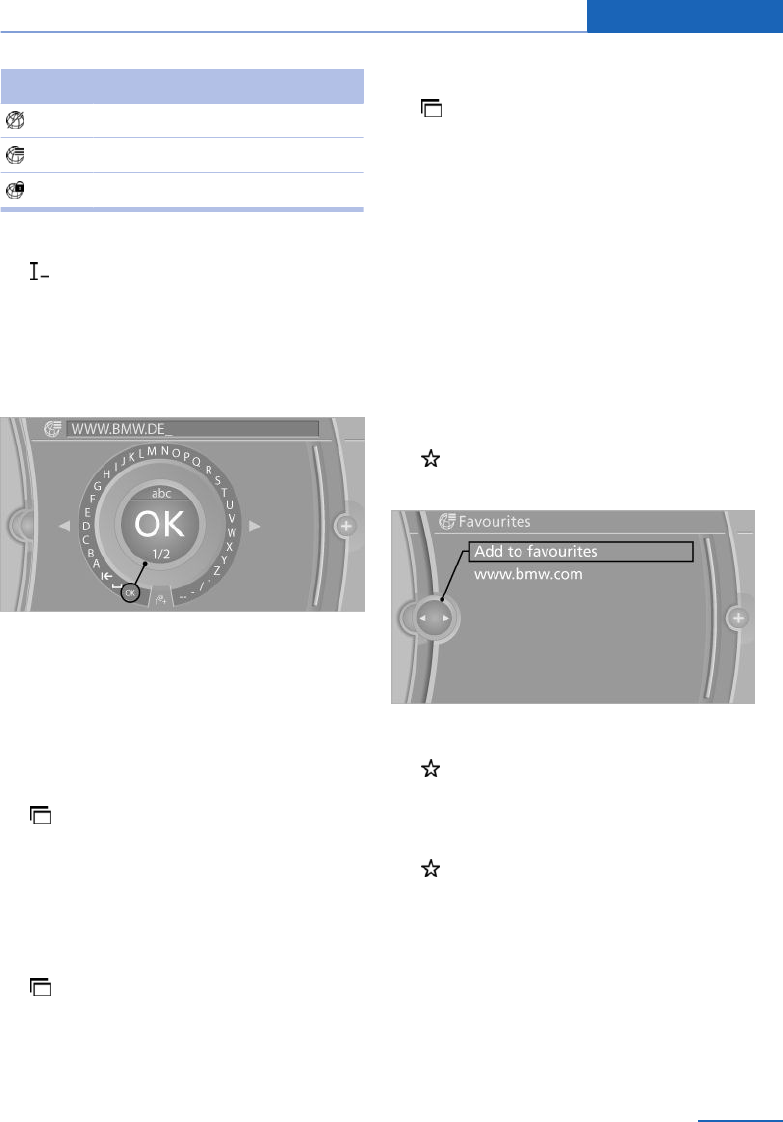
Symbol Meaning
No connection possible.
Data transfer/connection.
Secure connection.
Entering Internet addresses
1. Select the symbol.
2. Enter address and select "OK" or tip the
controller to the right. Select web page from
list and "OK".
Tilt the controller upwards to switch be
tween upper and lower case.
Tabs
General
Open a new tab, to show more than one web
page at a time.
Open web page in a new tab
1. "Tabs"
2. Press the controller.
3. Enter web address, select web address
through favourites or through history. The
web page is opened in a new tab.
Change between tabs
1. "Tabs"
2. Turn controller to the left or right.
3. Press controller to show selected tab.
Delete tab
1. "Tabs"
2. Call up "Options".
3. "Delete tab"
Current tab is deleted.
Favourites
General
Web pages can be stored in Favourites so they
can be called up quickly as needed.
Adding
The page currently shown is saved in Favour
ites.
1. "Favourites history"
2. "Add to favourites"
Selecting
1. "Favourites history"
2. Select desired favourites.
Delete
1. "Favourites history"
2. Highlight the favourite to be deleted.
Seite 107
ConnectedDrive Communication
107
Online Edition for Part no. 01 40 2 912 836 - 07 12 510
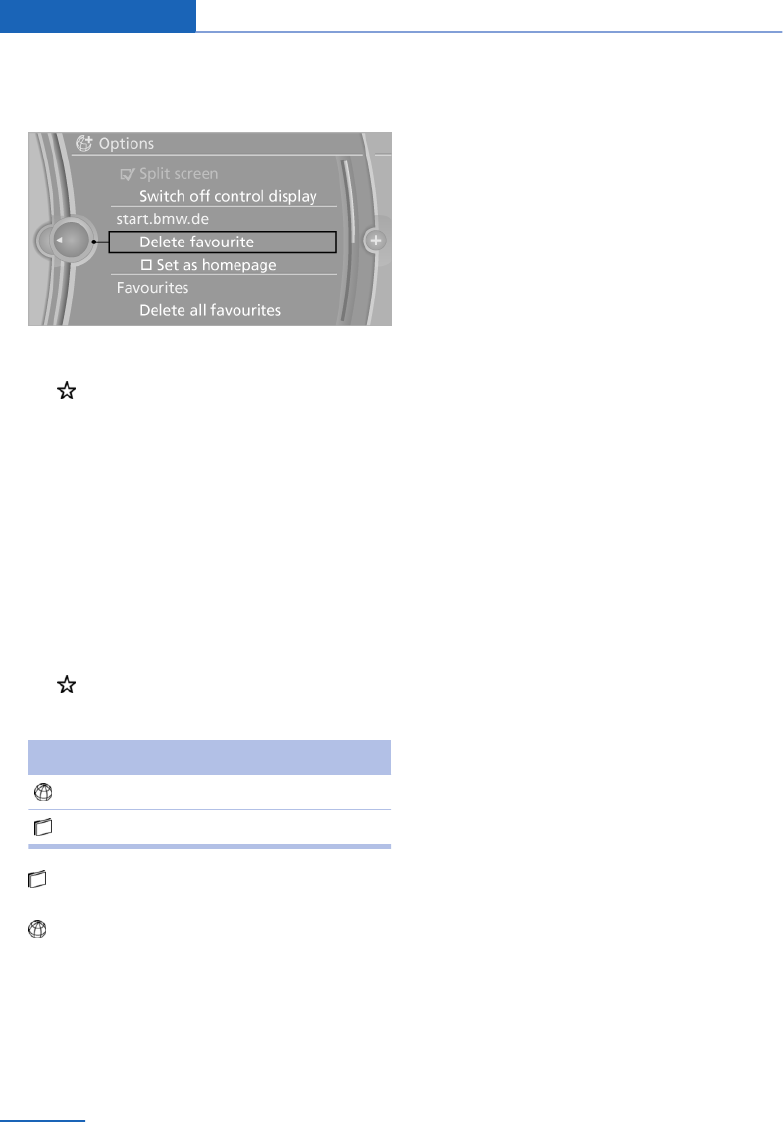
3. Call up "Options".
4. "Delete favourite" or "Delete all favourites"
Setting as home page
1. "Favourites history"
2. Highlight the desired favourite.
3. Call up "Options".
4. "Set as homepage"
History
Principle
The web pages called up are stored in the his
tory.
Displays
1. "Favourites history"
2. "History"
Symbol Meaning
Pages visited today
Pages visited earlier
Select the symbol. The web pages visited on
the selected date are shown.
Select the symbol. The web page is called up.
Deleting all entries
1. Call up "Options".
2. "Delete all entries"
Settings
Activating/deactivating sound
1. Call up "Options".
2. "Sound"
Suppressing cookies
1. Call up "Options".
2. "Block cookies"
Change to mobile web page view
1. Call up "Options".
2. "Mobile website view"
Suppressing pop-ups
1. Call up "Options".
2. "Block pop-ups"
Suppress HTTPS warnings
1. Call up "Options".
2. "Block warnings"
Delete personal settings
1. Call up "Options".
2. "Clear HTTPS settings"
HTTPS certificates and history are deleted.
Hotline
Overview
Contact the BMW Hotline for information cov
ering every aspect of the vehicle.
Calling the hotline
Without BMW Assist or BMW
TeleServices
1. "BMW Services" or "ConnectedDrive"
2. "Hotline"
The telephone number of the hotline is dis
played. Through the connected mobile, which is
Seite 108
Communication ConnectedDrive
108 Online Edition for Part no. 01 40 2 912 836 - 07 12 510
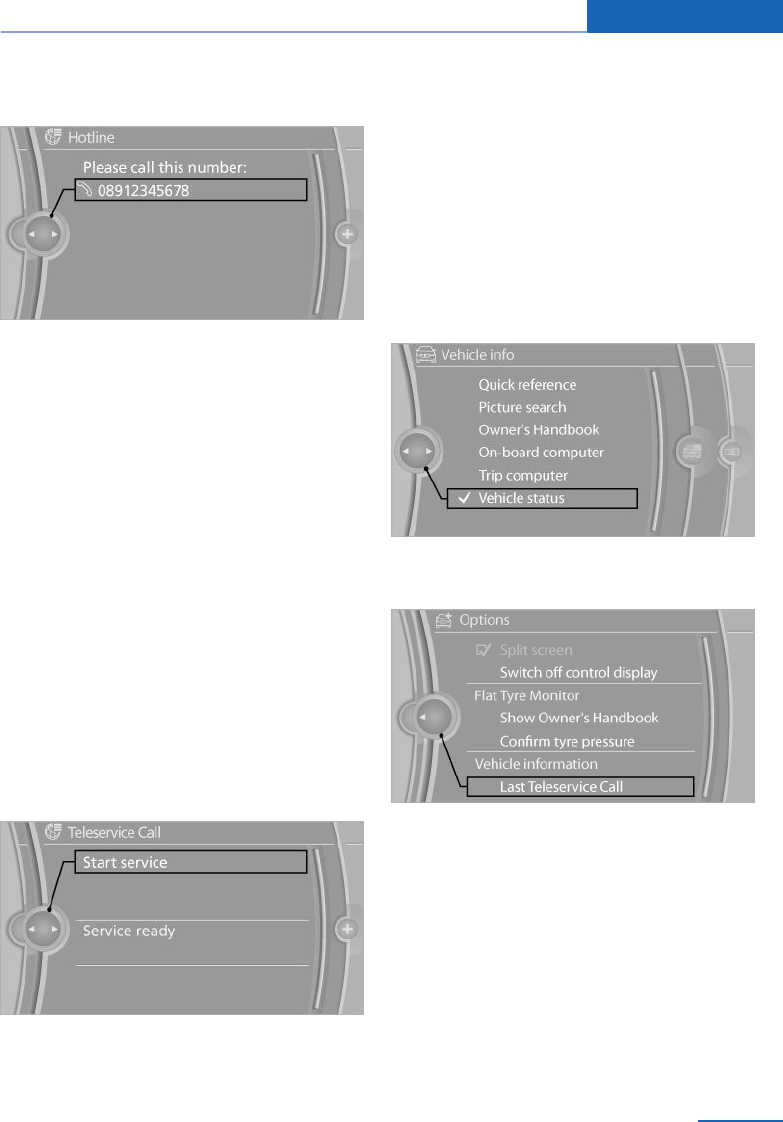
connected as a telephone, a connection is made
to the hotline.
With BMW Assist or BMW TeleServices
1. "BMW Services" or "ConnectedDrive"
2. "Hotline"
3. "Start service"
Teleservice Call
Principle
Sends information to your service partner indi
cating that a service appointment is to be
agreed. The Teleservice data is transferred. If
possible, your service partner will establish con
tact with you.
Starting a Teleservice Call
1. "BMW Services" or "ConnectedDrive"
2. "Teleservice Call"
3. "Start service"
A Teleservice Call can also be started through a
Check Control Message, see Owner's
Handbook for the vehicle.
Automatic Teleservice call
The Teleservice data on the service require
ment for the vehicle are transmitted to your serv
ice partner automatically when a service is due.
If possible, the partner will make contact and a
service appointment can be agreed.
Checking when your service partner was noti
fied:
1. "Vehicle information"
2. "Vehicle status"
3. Call up "Options".
4. "Last Teleservice Call"
Teleservice Report
Principle
As needed, transfers the technical data from
your vehicle to BMW at regular intervals. This is
used to evaluate the further development of
BMW products.
Seite 109
ConnectedDrive Communication
109
Online Edition for Part no. 01 40 2 912 836 - 07 12 510
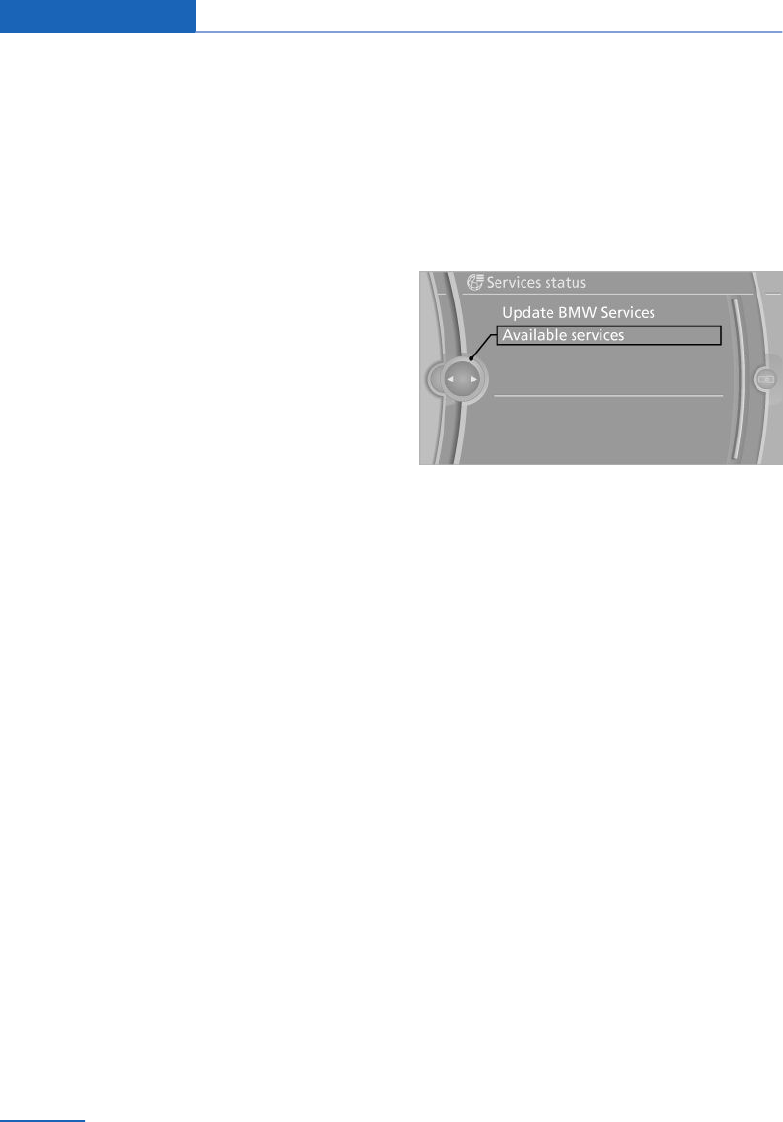
General
The Teleservice Report is activated free of
charge to you for vehicles with certain technical
requirements and with a valid Assist contract.
Neither personal information nor position data
are transferred.
Displays
Displays when the last Teleservice Report has
been transferred:
1. "Vehicle information"
2. "Vehicle status"
3. Call up "Options".
4. "Last Teleservice info"
Teleservice Battery Guard
Principle
If the battery charge status falls below a certain
level, in defined cases the BMW Teleservice
Battery Guard informs your Service Partner
when the vehicle is next started.
General
If required, they will contact you to agree a serv
ice appointment.
Note
Teleservice Battery Guard is only available for
vehicles with certain technical prerequisites and
with valid BMW ConnectedDrive contract.
Service partners
Possible contact with the Service Partner.
Displaying service partners
1. "BMW Services" or "ConnectedDrive"
2. "Your Service"
With the mobile phone registered, a con
nection is made to the Service Partner.
Service status
Display available services
Display of all services available in the vehicle.
1. "BMW Services" or "ConnectedDrive"
2. "Services status"
3. "Available services"
Updating BMW Services
Manual update of BMW TeleServices, BMW As
sist and BMW Online.
"Update BMW Services"
Data transfer
When updating BMW services, the status of the
data transfer is displayed.
1. "BMW Services" or "ConnectedDrive"
2. Call up "Options".
3. "Data transfer"
Apps
Overview
Certain software applications of a suitable mo
bile phone can be integrated into the vehicle.
These software applications are displayed on
the Control Display.
Operation is done using the iDrive.
Seite 110
Communication ConnectedDrive
110 Online Edition for Part no. 01 40 2 912 836 - 07 12 510
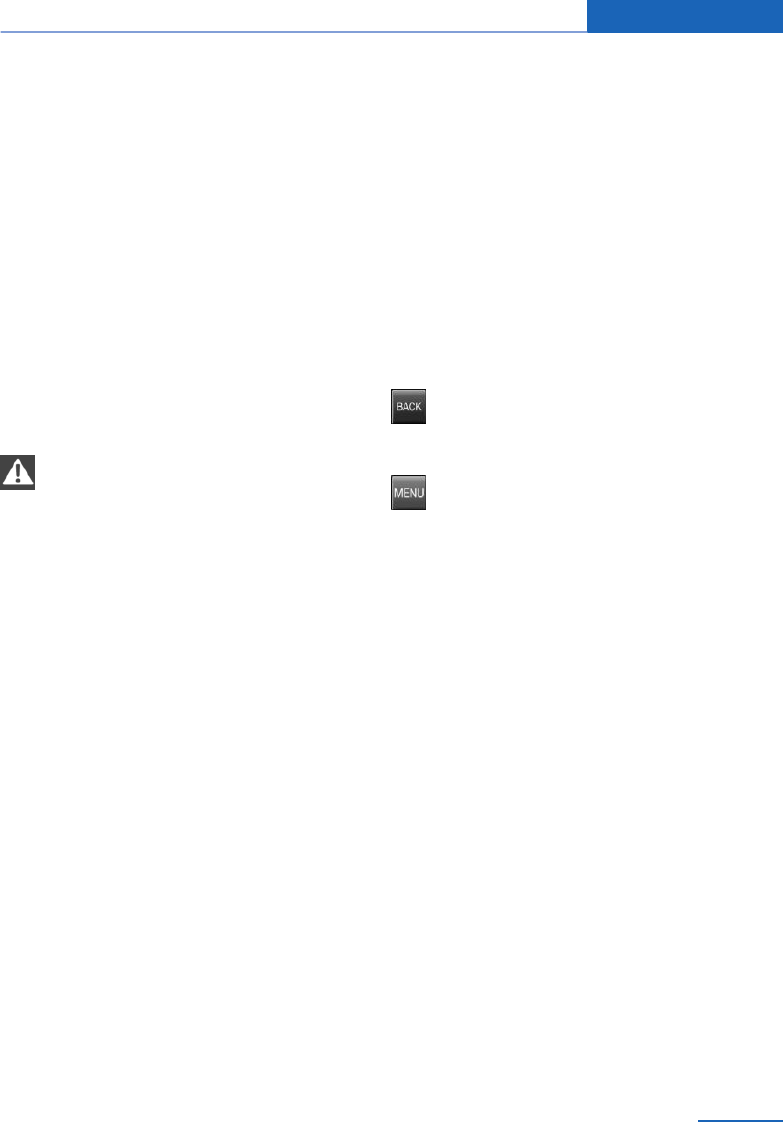
Requirements
▷Suitable mobile phone.
▷The operating system of the mobile phone
supports the software applications of Apps.
▷Software applications are installed on op
erational on the mobile phone.
▷Corresponding mobile radio contract.
Any additional costs incurred are not the
component of Apps.
▷Only use software applications approved by
BMW, otherwise there may be malfunctions.
Information on suitable mobile phone, available
software applications and their installation is
available under www.bmw.com/connectivity or
from your Service centre.
Input data
Only make inputs when traffic activity per
mits. The vehicle occupants and other road
users could otherwise be endangered due to
lack of concentration.
Some software applications can only be used
when the vehicle is stationary for safety rea
sons.◀
Operating Apps
1. Connect the mobile phone using the snap-
in adapter or the USB audio interface.
2. "ConnectedDrive"
3. Select the desired software application.
Display status
Information on the currently available software
applications can be displayed.
1. "ConnectedDrive"
2. "Connection status"
PlugIn
Selected functions of the mobile phone are
shown on the Control Display. Operation is done
using the iDrive.
1. Connect the mobile phone using the snap-
in adapter.
2. "ConnectedDrive"
3. "PlugIn"
4. "Activate PlugIn"
5. Using the controller, navigate in the desired
functions and, for example, selected the de
sire category or title.
Press the button to go one level higher or
back within the functions of the mobile
phone.
Press button twice to change back to the
main menu.
Notes
▷The extent of apps which can be shown on
the control display depends on the extent of
software applications installed on the mo
bile phone.
▷The data transfer of the software applica
tions from the mobile phone to the vehicle
may take a while. Some software applica
tions are dependent on the speed of the
available Internet connection of the mobile
phone.
▷Some mobile phones cannot use apps and
Bluetooth hands-free at the same time.
Restart the software application on the mo
bile phone after a telephone call as neces
sary.
Seite 111
ConnectedDrive Communication
111
Online Edition for Part no. 01 40 2 912 836 - 07 12 510

Extended BMW Online services
Vehicle Equipment
This chapter describes all standard, national and
special equipment provided in the model series.
Therefore equipment not available in a vehicle is
also described, for example the selected special
equipment or national version. That also applies
to safety-relevant functions and systems.
Principle
The extended BMW Online services provides
scope for exchanges of information and data
with the vehicle via BMW Online.
The following section lists the functions of the
extended BMW Online services.
Navigation
▷Importing trips, see page 17.
▷Information on points of interest from BMW
Online, see page 12.
▷Displaying current traffic regulations and
country information, see page 26.
CD/multimedia
▷Updating album information, see page 54.
Contacts
▷Show BMW Online address book, see
page 89.
▷Display additional information for a contact,
see page 90.
Personal Profile
▷For exporting/importing a user profile, see
Owner's Handbook for vehicle.
BMW Online and Internet
▷BMW Online, see page 104.
▷Internet, see page 106.
Seite 112
Communication Extended BMW Online services
112 Online Edition for Part no. 01 40 2 912 836 - 07 12 510

Rear telephone
Vehicle Equipment
This chapter describes all standard, national and
special equipment provided in the model series.
Therefore equipment not available in a vehicle is
also described, for example the selected special
equipment or national version. That also applies
to safety-relevant functions and systems.
Principle
The rear telephone consists of a handset and a
snap-in adapter.
Via a SIM card, it is used to phone like a mobile
phone, with the advantage of being able to use
the handset.
When the snap-in adapter is installed in the ve
hicle, it is possible to make phone calls via the
hands-free system in the front and via the hand
set in the rear.
Calls can be transferred from the handset to the
hands-free system and vice versa.
Through the integrated WLAN hotspot, various
devices, such as a notebook, for example, can
connect to the Internet wirelessly with WLAN.
Service providers
Many functions depend on your service provider
and contract.
If you have any other questions, contact the
service provider directly.
Options for use
Preparations
To be able to use the rear telephone, the
following must be carried out depending on the
type of use:
▷Connect the mobile phone via the SIM Ac
cess Profile (SAP) to the snap-in adapter,
see page 114.
▷Insert the SIM card into the snap-in adapter,
see page 115.
▷Install the snap-in adapter to the vehicle, see
page 115.
Operation via the handset
Principle
Calls can only be made directly via the handset.
Operating requirements
▷Snap-in adapter installed in the vehicle.
▷SIM card inserted in the snap-in adapter.
Or
Mobile phone connected via the SIM Access
Profile (SAP) to the snap-in adapter.
Operation via the hands-free system
Principle
Calls can be made from the front via the hands-
free system or directly via the handset.
Operating requirements
▷Snap-in adapter installed in the vehicle.
▷SIM card inserted in the snap-in adapter.
Or
Mobile phone connected via the SIM Access
Profile (SAP) to the snap-in adapter.
▷Snap-in adapter connected in the vehicle.
Seite 113
Rear telephone Communication
113
Online Edition for Part no. 01 40 2 912 836 - 07 12 510
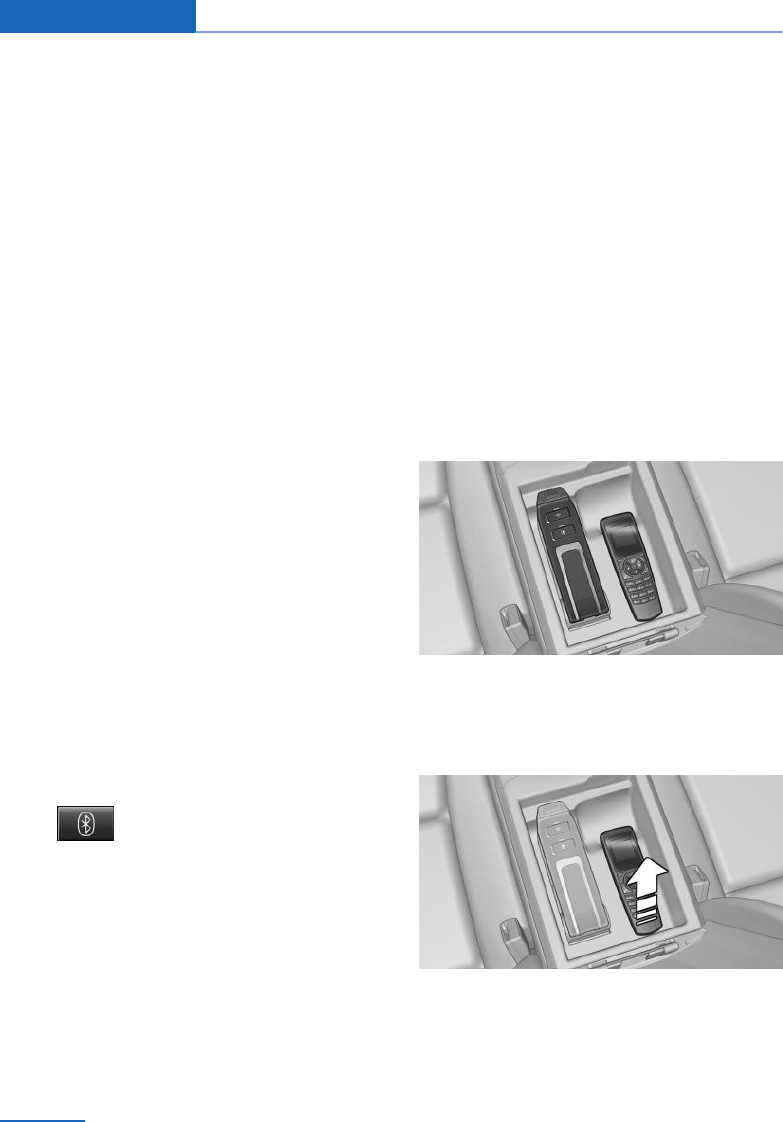
SIM Access Profile (SAP)
Principle
SAP means that the snap-in adapter uses Blue
tooth to access SIM card of the mobile phone
with Bluetooth capability.
The calls and the connection to the external aer
ial run via the snap-in adapter. Radiation which
is caused by the transmission operation is dis
sipated from the vehicle interior.
If the mobile phone is connected to the vehicle
and downloading the internal phone book en
tries of the mobile phone is supported, the in
ternal phone book can be displayed on the hand
set and on the control display.
General
The SIM Access Profile can be used to connect
your mobile phone to the handset via the snap-
in adapter.
Operating requirements
▷Mobile phone with SAP capability. Overview
of compatible models at www.bmw.com/
fond-telefonie.
▷Mobile phone is switched on with activated
Bluetooth interface.
▷No SIM card is inserted into the snap-in
adapter.
Connecting the mobile phone via SAP
1. Press the button on the snap-in
adapter for approx. 11 seconds.
The LED above the button flashes, alternat
ing green and orange.
2. The 16-digit SAP PIN is displayed on the
handset.
3. "Connect" with BMW GSM SIA.
4. Enter the displayed PIN in the mobile phone.
Breaking the connection
▷Disable the SAP connection on the mobile
phone. If the Bluetooth interface is not dis
abled, the connection is automatically re-
saved after approximately ten seconds.
▷Switch off the handset.
▷Switch off the ignition for longer than 3 mi
nutes.
▷Take the mobile phone to a distance ap
proximately ten metre away from the vehi
cle.
Overview
Handset and snap-in adapter
Snap-in adapter and handset are in the centre
armrest in the rear.
Removing handset
Pull the handset upwards.
Seite 114
Communication Rear telephone
114 Online Edition for Part no. 01 40 2 912 836 - 07 12 510
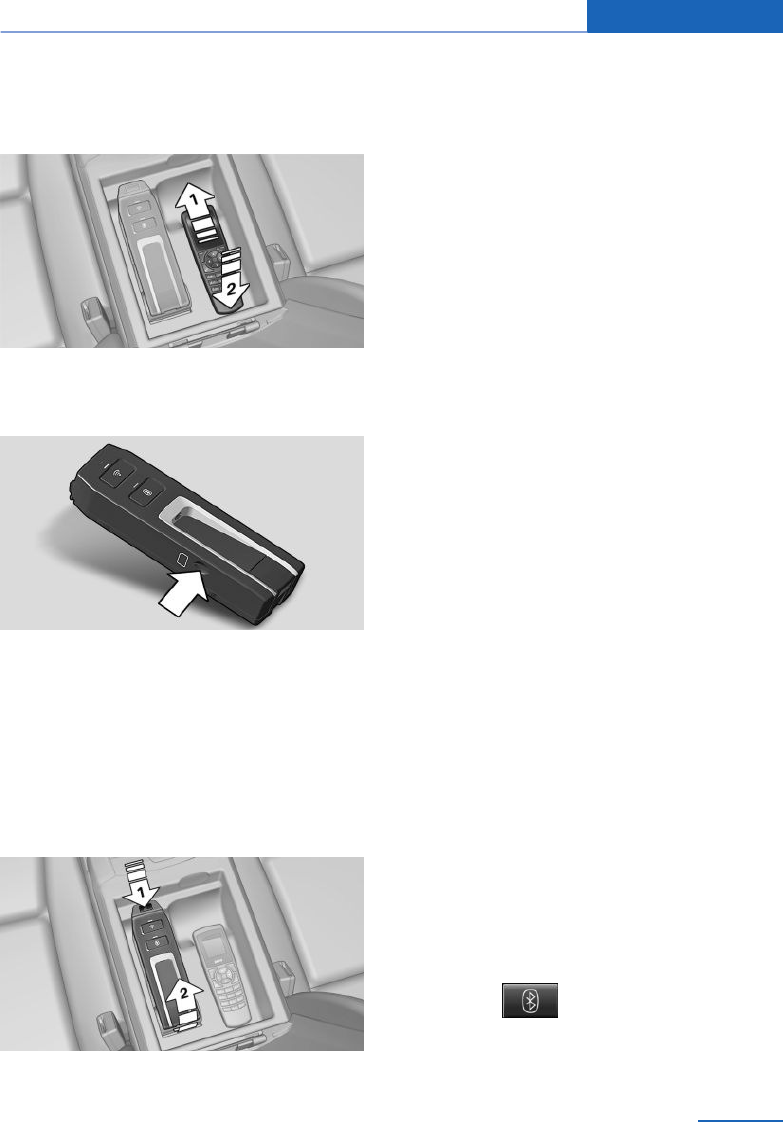
Inserting handset
1. Snap the handset into place at the top, ar
row 1.
2. Press the handset downwards, arrow 2.
Inserting/removing the SIM card
Insert SIM card as described on the side of the
snap-in adapter. Remove the SIM card to pull it
out.
Removing/installing the snap-in
adapter
Removing
1. Press the button, arrow 1.
2. Pull the snap-in adapter upwards and for
wards, arrow 2.
Installing
1. Snap into place at the lower end.
2. Press downwards until it snaps into place,
arrow 1.
Install the snap-in adapter to
the vehicle
Principle
Connect the snap-in adapter to the vehicle. The
phone book is shown on the Control Display and
the front hands-free system can be used.
Operating requirements
▷The Bluetooth passkey, see page 127, on
the back of the snap-in adapter is known.
▷The snap-in adapter is inserted in the centre
armrest.
▷The ignition is switched on.
▷The SIM card is inserted into the snap-in
adapter or the SIM Access Profile (SAP) is
active.
Install the snap-in adapter to the
vehicle
Activate the Bluetooth connection, see
page 79, in the vehicle. Up to four devices, in
cluding the handset can be connected.
1. "Settings"
2. "Connections"
3. "Bluetooth"
All connected mobile phones are listed.
4. "Bluetooth"
5. Press the button on the snap-in
adapter for approx. 5 seconds.
The LED above the button illuminates
green.
Seite 115
Rear telephone Communication
115
Online Edition for Part no. 01 40 2 912 836 - 07 12 510
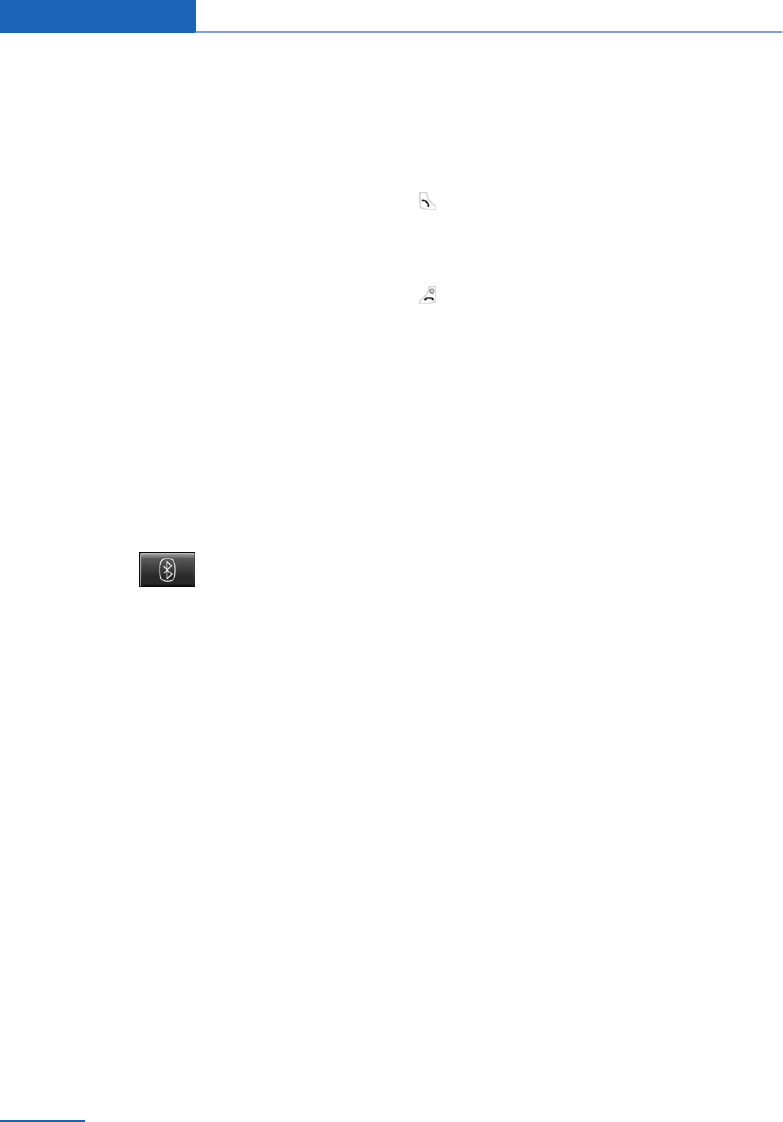
Connecting the handset
Principle
To be able to use the handset, it must be con
nected to the snap-in adapter. The handset is
already connected at the factory. The connec
tion is set up automatically each time the hand
set is switched on. Ensure that the battery on the
rear of the handset is correctly inserted.
Operating requirements
▷The Bluetooth passkey, see page 127, on
the back of the snap-in adapter is known.
▷The snap-in adapter is inserted in the centre
armrest.
▷The ignition is switched on.
▷The SIM card is inserted into the snap-in
adapter.
Connecting the handset
1. Press the button on the snap-in
adapter for approx. 17 seconds.
The LED above the button illuminates or
ange.
2. Switch on the handset.
3. "GSM-SIA"
4. "Ok"
5. "GSM-SIA BMW"
6. "Ok"
7. Enter the Bluetooth passkey.
8. "Ok"
9. The connection to the snap-in adapter is es
tablished.
Controls
Basic principles
Connect button
Press the button. Select the displayed or
highlighted phone number, accept the call.
On/off/exit button
Press and hold down button: switching on
and off.
Press button briefly: ends a call.
Information regarding switching on/off
If the handset is switched off and on again while
the vehicle is in motion, the Bluetooth connec
tion in the control display must be re-saved.
Functional requirement for readiness
displays
▷The SIM card is inserted into the snap-in
adapter or a mobile phone is connected via
the SIM Access Profile.
▷The handset is switched on.
▷The PIN for the SIM card has been entered
or the PIN query, see page 125, has been
suppressed.
▷Entering the PIN is also possible on the con
trol display if the snap-in adapter is connec
ted to the vehicle.
▷Mobile telephony reception must be guar
anteed.
▷PIN is entered or PIN query is incorporated.
Seite 116
Communication Rear telephone
116 Online Edition for Part no. 01 40 2 912 836 - 07 12 510
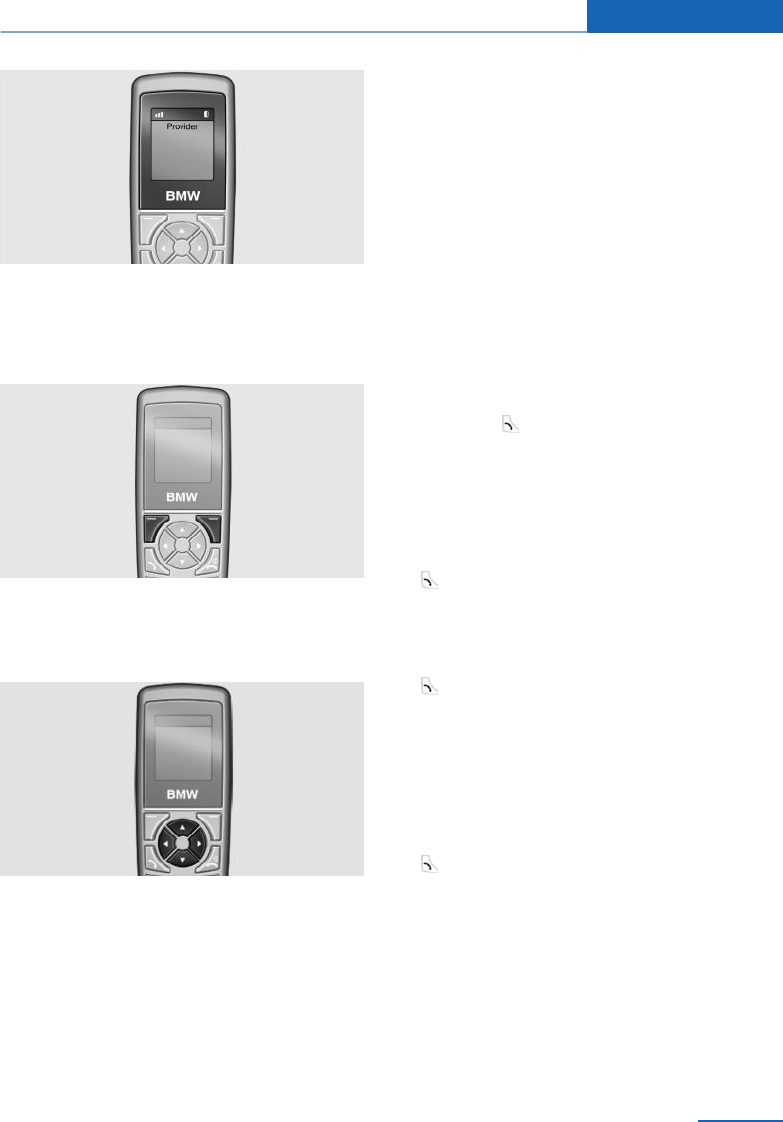
The standby indicator and name of the network
operator are displayed.
Display/arrow buttons
The current functions of these buttons are
shown in the bottom line of the display.
Press the button: selects the function.
Press the up/down arrow buttons: browses in
menus.
Press the left/right arrow buttons: sets the call
volume during a call.
Text input
▷Press a numerical key (1 to 9) repeatedly
until the desired character is displayed. If the
next letter is entered with the same key as
the current letter, wait briefly until the cursor
is displayed again.
▷Insert space: 0 key.
▷Switch between upper and lower case: #
key.
▷Insert symbols: 1 key.
▷Change to digit mode: press and hold # key.
Initiating a call
Via numerical keys
1. Enter the complete phone number with area
code/national dialling code.
2. Press the button or "Dial".
Delete last digit during input: "Delete"
Via repeat dialling
The last ten phone numbers dialled are auto
matically saved.
1. Press the button.
The phone number last dialled is displayed.
2. Use the arrow buttons to select the phone
number.
3. Press the button.
Via telephone book
1. "Ph.book"
2. Insert first letter of desired entry or browse
using arrow keys.
3. Use the arrow buttons to select an entry.
4. Press the button.
Via SMS
1. "Menu"
2. "Text messag."
3. "Ok"
4. "Inbox" or "Outbox"
5. "Ok"
6. Select an entry.
Seite 117
Rear telephone Communication
117
Online Edition for Part no. 01 40 2 912 836 - 07 12 510
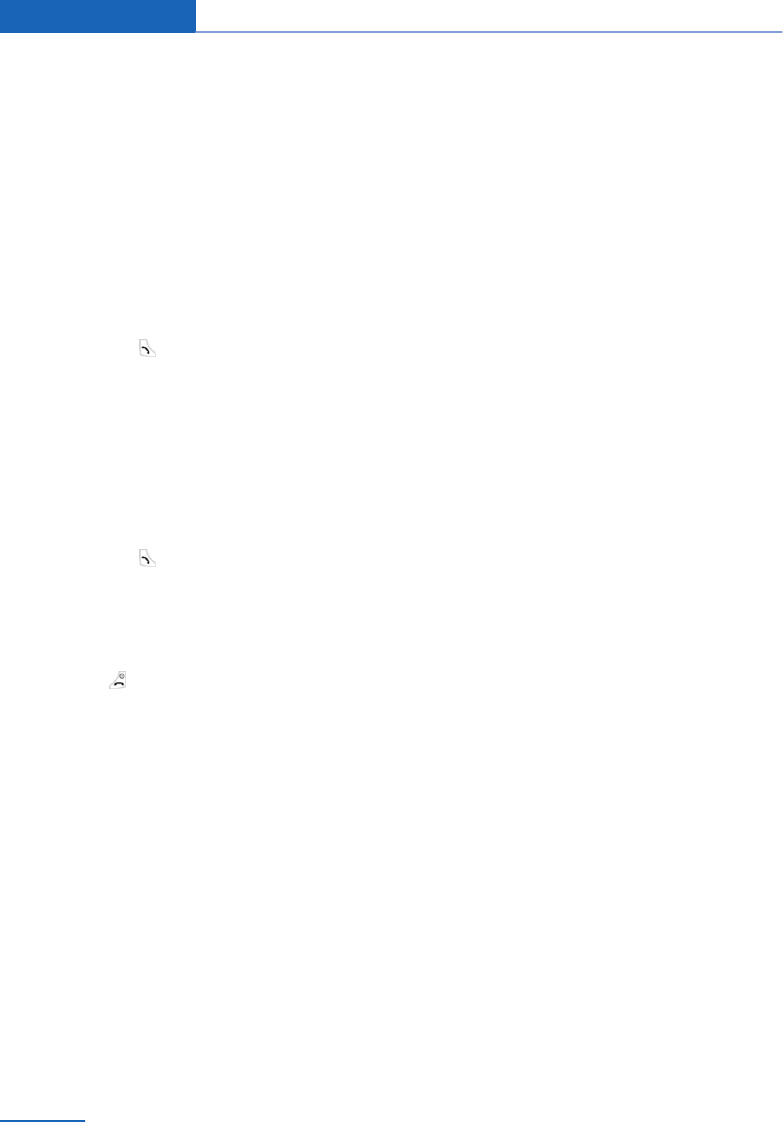
7. "Ok"
8. "Call"
9. "Ok"
Via the call list
1. "Menu"
2. "Last calls"
3. "Missed calls" or "Received calls"
4. "Ok"
5. Dial a phone number.
6. Press the button or "Call number".
Incoming call
Accepting a call
If the number of the caller is saved in the tele
phone book and is transferred from the network,
the name of the telephone book entry is dis
played.
▷Press the button or "Answer".
▷With call acceptance, see page 124, activa
ted, take the handset from its cradle.
Rejecting a call
Press the button or "End call".
Call Forward
Principle
Incoming calls are diverted to another telephone
number.
A password might be required to set this up.
Calling up the menu
1. "Menu"
2. "Settings"
3. "Ok"
4. "Call forward"
5. "Ok"
Diverting calls
In the "Call forward" menu:
1. "Voice calls"
2. "Ok"
3. "Forward all calls", "If busy", "If not avail." or
"If no answer"
4. "Ok"
5. "Deactivate" or "Activate"
6. Enter the phone number for the diversion.
7. "Ok"
Diverting fax and data inputs
In the "Call forward" menu:
1. "Fax calls" or "Data calls"
2. "Deactivate" or "Activate"
3. Enter the phone number for the diversion.
4. "Ok"
Checking the status
Select call forwarding.
1. "Status"
2. "Ok"
3. The status is displayed.
Disabling all diversions
In the "Call forward" menu:
1. "Deactivate"
2. "Ok"
Phone book
Select the storage location
If the mobile phone supports downloading of in
ternal phone book entries and this function is
active, the internal memory of the telephone
book is selected as the storage location. The
function "Memory place" is then not available.
Seite 118
Communication Rear telephone
118 Online Edition for Part no. 01 40 2 912 836 - 07 12 510

Select the SIM card or snap-in adapter as the
storage location.
1. "Menu"
2. "Ph.book"
3. "Ok"
4. "Memory place"
5. "Ok"
6. "SIM" or "GSM-SIA" or "Both"
7. "Ok"
Setting the display
1. "Menu"
2. "Ph.book"
3. "Ok"
4. "Private Ph.book"
5. "Ok"
Available memory
1. "Menu"
2. "Ph.book"
3. "Ok"
4. "Memory place"
5. "Ok"
6. "Status"
7. "Ok"
New entry
Save phone numbers in the international format.
Press the asterisk key until + is shown on the
display.
1. "Menu"
2. "Ph.book"
3. "Ok"
4. "New entry"
5. "Ok"
6. Enter the name.
7. "Ok"
8. Enter the complete phone number.
9. "Ok"
Entry from call lists
Save phone numbers from call lists in the tele
phone book.
1. "Menu"
2. "Last calls"
3. "Ok"
4. "Numbers dialled", "Missed calls" or
"Received calls"
5. "Ok"
6. Select an entry.
7. "Store number"
8. "Ok"
9. Enter the name and number and confirm
each with "Ok".
Entry from SMS
1. "Menu"
2. "Text messag."
3. "Ok"
4. "Inbox" or "Outbox"
5. "Ok"
6. Select SMS and confirm with "Ok".
7. "Options"
8. "Extract number"
9. "Ok"
Editing an entry
1. "Menu"
2. "Ph.book"
3. "Ok"
4. "Find entry"
5. "Ok"
6. Select SMS and confirm with "Ok".
7. "Edit"
Seite 119
Rear telephone Communication
119
Online Edition for Part no. 01 40 2 912 836 - 07 12 510

8. "Ok"
9. Edit the name and number and confirm with
"Ok".
Deleting an entry
1. "Menu"
2. "Ph.book"
3. "Ok"
4. "Find entry"
5. "Ok"
6. Select an entry.
7. "Ok"
8. "Delete"
9. "Yes"
Show details
1. "Menu"
2. "Ph.book"
3. "Ok"
4. "Find entry"
5. "Ok"
6. Select an entry.
7. "Ok"
8. "Details"
SMS
General
Received SMS messages are saved automati
cally. If necessary, delete saved SMS messages
so that you can receive new SMS messages.
Observe the memory status, see page 122, on
the SIM card.
Setting the SMS Service centre
The phone number of the Service centre is
saved.
1. "Menu"
2. "Text messag."
3. "Ok"
4. "Settings"
5. "Ok"
6. "Servicecentre"
7. "Ok"
8. Check the phone number.
9. "Ok"
Displaying SMS
1. "Menu"
2. "Text messag."
3. "Ok"
4. "Inbox"
All SMS are displayed.
To read an SMS, select both the message and
"Ok".
Writing an SMS
Creating and sending an SMS
1. "Menu"
2. "Text messag."
3. "Ok"
4. "Text messag."
5. Enter text, see page 117.
6. "Send"
7. "Ok"
8. Enter the phone number or use "Find
entry" to open the phone book and select an
entry.
9. Confirm with "Ok" and select "Send".
Forwarding an SMS
1. "Menu"
2. "Text messag."
3. "Ok"
4. "Inbox" or "Outbox"
5. Select SMS and confirm with "Ok".
6. "Options"
Seite 120
Communication Rear telephone
120 Online Edition for Part no. 01 40 2 912 836 - 07 12 510

7. Select "Forward" and change text if re
quired.
8. "Options"
9. Select "Send" and confirm with "Ok".
Replying to an SMS
1. "Menu"
2. "Text messag."
3. "Ok"
4. "Inbox"
5. "Options"
6. "Reply"
7. Enter text, see page 117.
8. "Options"
9. "Send"
Creating a template
Templates are saved SMS messages with fre
quently used texts.
1. "Menu"
2. "Text messag."
3. "Ok"
4. "Text messag."
5. Enter text, see page 117.
6. "Options"
7. "Insert symbol" or "Insert template"
8. "Ok"
9. Select the symbol or a template and confirm
with "Ok".
Editing templates
1. "Menu"
2. "Text messag."
3. "Ok"
4. "Templates"
5. "Ok"
6. Select the template and confirm with "Ok".
7. Edit the text of the template.
8. "Options"
9. "Send" or "Store"
Saving created SMS messages
Created SMS messages can be saved for future
use on the SIM card.
1. "Menu"
2. "Text messag."
3. "Ok"
4. "Text messag."
5. Enter text, see page 117.
6. "Options"
7. "Store"
8. "Ok"
Automatically store SMS
Save sent SMS messages automatically.
1. "Menu"
2. "Text messag."
3. "Ok"
4. "Settings"
5. "Ok"
6. "Store text msg"
7. "Ok"
Deleting an SMS
1. "Menu"
2. "Text messag."
3. "Ok"
4. "Inbox" or "Outbox"
5. Select an entry and confirm with "Ok".
6. "Options"
7. "Delete"
8. "Ok"
9. "Yes"
Seite 121
Rear telephone Communication
121
Online Edition for Part no. 01 40 2 912 836 - 07 12 510
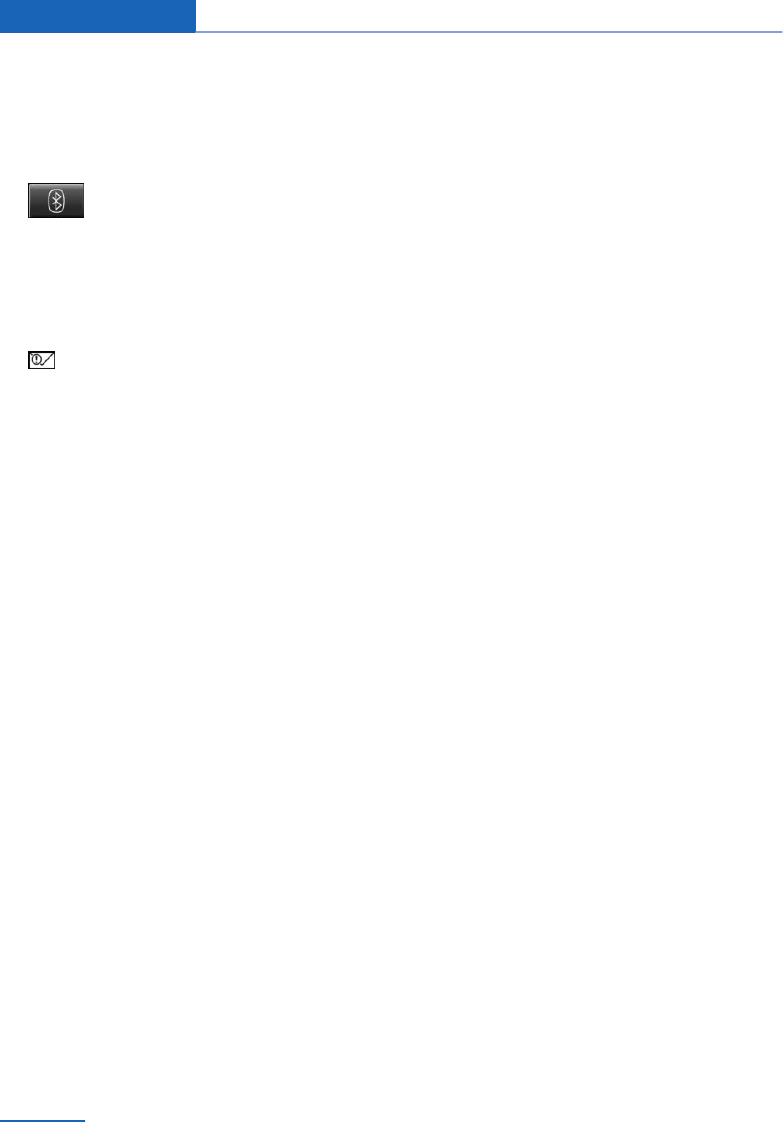
Delete oldest read text message
If the text message memory is full, the LED
above the key lights up orange.
The oldest read SMS can be deleted.
Press the button on the snap-in adapter
for approx 3 seconds until the LED
above the button lights up orange.
Options
Query memory status
Symbol indicates that memory capacity is
no longer available for SMS messages.
Delete, see page 121, stored SMS.
1. "Menu"
2. "Text messag."
3. "Ok"
4. "Settings"
5. "Ok"
6. "Memory capacity"
7. "Ok"
The number of occupied and free memory
slots is displayed.
Activate automatic status report
Show free memory when sending an SMS.
1. "Menu"
2. "Text messag."
3. "Ok"
4. "Settings"
5. "Ok"
6. "Status report"
7. "Ok"
Set transmission time
Validity period for attempts to send an SMS.
1. "Menu"
2. "Text messag."
3. "Ok"
4. "Settings"
5. "Ok"
6. "Validity"
7. Select a period of time.
8. "Ok"
Setting the language
Set the language for the SMS.
1. "Menu"
2. "Text messag."
3. "Ok"
4. "New text msg"
5. "Ok"
6. "Input language"
7. "Ok"
8. Select the language.
9. "Ok"
Calls with a number of participants
Call waiting
If there is a second call during an ongoing call,
you hear a call waiting signal.
"Answer"or "Reject".
Setting up a second call
1. "Options"
2. "Hold"
3. "Back"
4. Select entry from telephone book or the
number of another subscriber.
Switching between two calls,
alternating
1. "Options"
2. "Switch"
Seite 122
Communication Rear telephone
122 Online Edition for Part no. 01 40 2 912 836 - 07 12 510

Telephone conference
Merge two calls to set up a conference.
1. "Options"
2. "Conference"
Terminating a call
Terminating current call
"End call"
Terminating all calls
1. "Options"
2. "End call"
Terminating second call when conference
calling
1. "Options"
2. "Switch"
3. "End call"
Terminating conference call
1. "Options"
2. "Conf. participants"
3. Select the call.
4. "End active call"
Settings
Telephone
Call up settings menu
1. "Menu"
2. "Settings"
3. "Ok"
Activate/deactivate call number
transmission
Display call number on receiver.
In the "Settings" menu:
1. "Call options"
2. "Ok"
3. "Transmit caller ID"
4. "Ok"
5. "Activate", "Deactivate" or "Network-
depend."
Setting call waiting
Acoustic signal for a call during another call.
In the "Settings" menu:
1. "Call options"
2. "Ok"
3. "Call waiting"
4. "Ok"
5. "Activate" or "Deactivate"
6. "Ok"
Selecting the menu language
In the "Settings" menu:
1. "Telephone"
2. "Ok"
3. "Language"
4. "Ok"
5. "Menu language" or "Input language"
6. "Ok"
7. Select the language.
8. "Ok"
Deleting the call list
1. "Menu"
2. "Last calls"
3. "Ok"
4. "Delete"
5. "Ok"
6. "All calls" or select entry.
Seite 123
Rear telephone Communication
123
Online Edition for Part no. 01 40 2 912 836 - 07 12 510
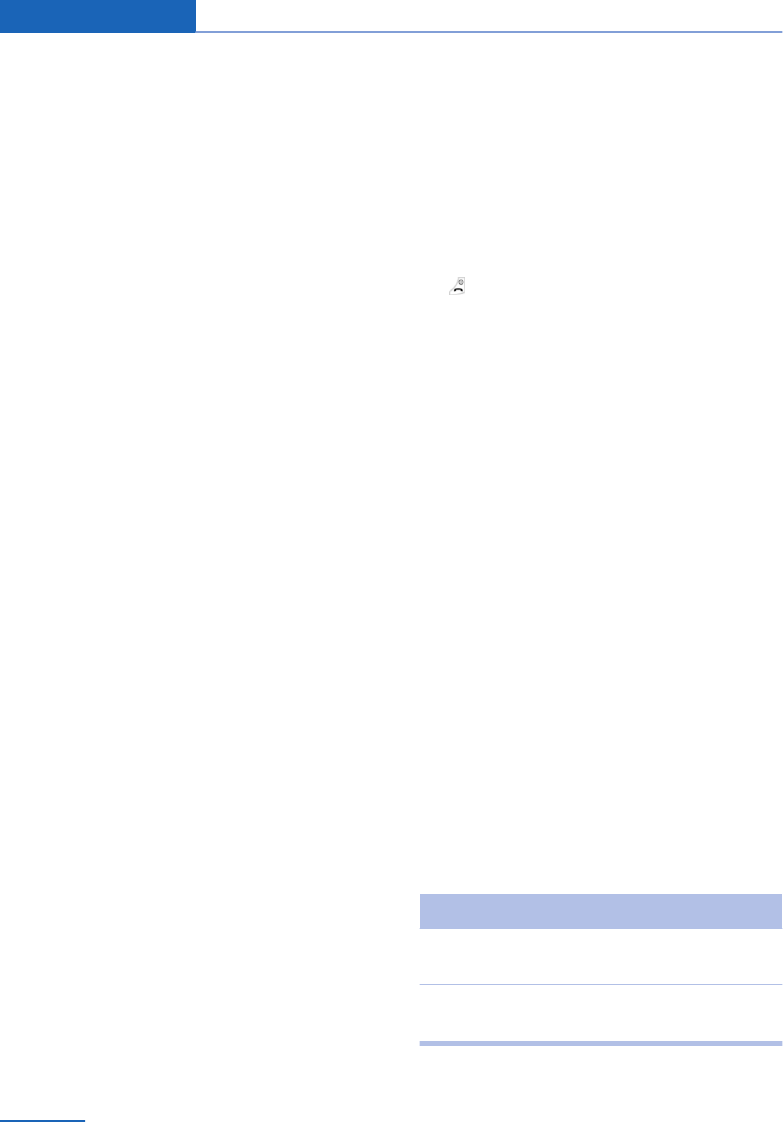
7. "Ok"
8. "Yes"
Call acceptance on lifting handset
The call is accepted when you lift the handset
from the cradle.
In the "Settings" menu:
1. "Call options"
2. "Ok"
3. "Answer on eject"
4. "Ok"
Set call volume
In the "Settings" menu:
1. "Telephone"
2. "Ok"
3. "Ring tone vol. SIA"
4. "Ok"
5. Make the setting.
6. "Ok"
Set brightness and lighting duration
Make the setting for the display.
In the "Settings" menu:
1. "Telephone"
2. "Ok"
3. "Brightness" or "Backlight durat."
4. Make the settings.
5. "Ok"
Automatic key lock
Locks the keypad automatically if no key has
been pressed for a certain time.
Providing protection against inadvertent opera
tion of the keys.
In the "Settings" menu:
1. "Telephone"
2. "Ok"
3. "Autom. keylock"
4. "Ok"
Cancelling the key lock
Follow the instructions on the handset display.
Resetting the language
Set the English language.
1. Press the button.
2. Press the button on the right below the dis
play.
3. Press the arrow button downwards three
times.
4. Press the right-hand arrow once.
5. Press the arrow button downwards once.
6. Press the right-hand arrow once.
7. Press the arrow button downwards three
times.
8. Press the right-hand arrow once.
9. Select the language and confirm with "Ok".
Restoring factory settings
If you reset the handset to the factory settings,
the following settings are made. This does not
affect the SIM card and network settings.
In the "Settings" menu:
1. "Telephone"
2. "Ok"
3. "Default settings"
4. "Ok"
5. "Yes"
Function Factory setting
Phone book. The telephone book is
deleted.
Display of the tele
phone book.
Both.
Seite 124
Communication Rear telephone
124 Online Edition for Part no. 01 40 2 912 836 - 07 12 510
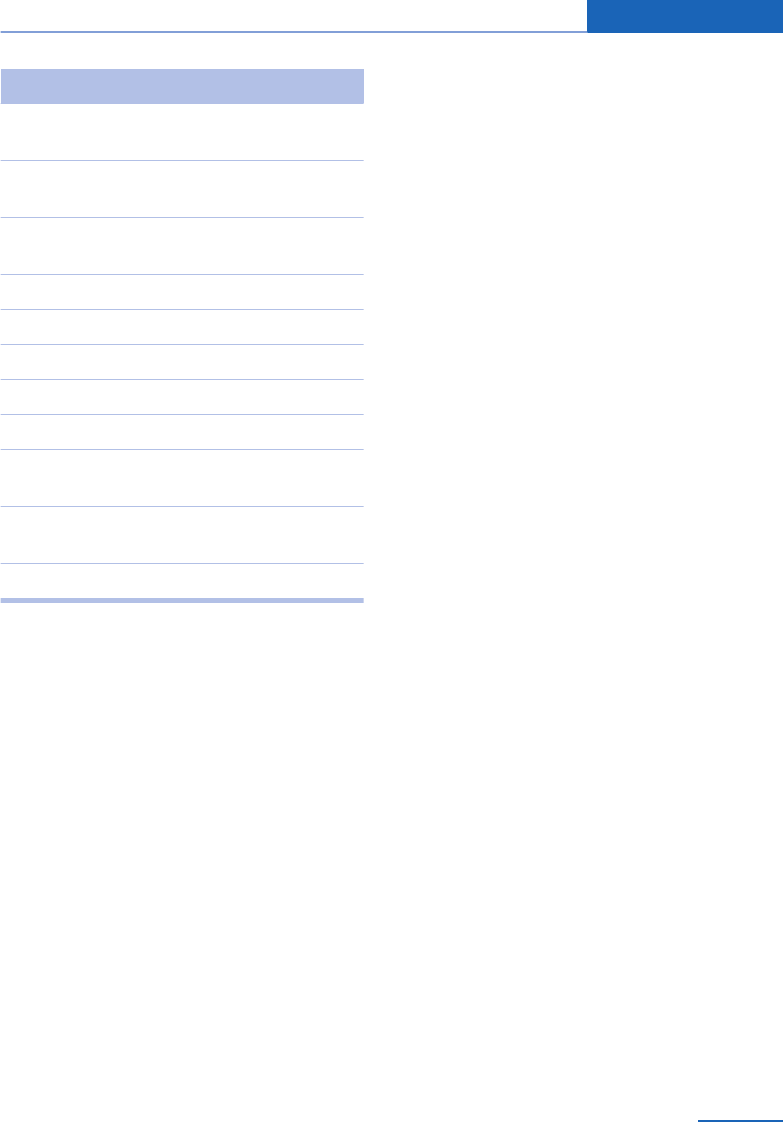
Function Factory setting
Save text messages
automatically.
Switched off.
Transfer duration of
text messages.
Maximum
Status report for text
messages
Switched off.
Key lock. Switched off.
Brightness 3
Lighting duration 3
Language English
Bluetooth name GSM SIA BMW
Call acceptance for
handset
Switched on
Private telephone
book
Switched off.
Ring sound volume 4
Network selection
Principle
On older SIM cards, it might be necessary to en
able roaming.
Roaming enables you to connect to other tele
phone networks abroad.
Automatic or manual network selection
With automatic network selection, the handset
connects to an available network.
With manual network selection, an available net
work can be selected. If the handset is connec
ted to another network, a triangle is shown on
the display.
To set the type of network selection:
1. "Menu"
2. "Settings"
3. "Ok"
4. "Network selection"
5. "Ok"
6. "Automatic" or "Manual"
7. "Ok"
Manual network selection
1. "Menu"
2. "Settings"
3. "Ok"
4. "Netw. select."
5. "Ok"
6. "Select network"
7. Select network.
8. "Ok"
Authorisation and security
Enabling/disabling the PIN query
PIN query is not deactivated, otherwise the SIM
card is not protected against abuse.
1. "Menu"
2. "Settings"
3. "Ok"
4. "Security"
5. "Ok"
6. "PIN query": confirm with "Ok".
7. "Activate" or "Deactivate"
8. "Ok"
9. Enter the PIN and confirm with "Ok".
Changing the PIN
If the PIN query is activated.
1. "Menu"
2. "Settings"
3. "Ok"
4. "Security"
5. "Ok"
Seite 125
Rear telephone Communication
125
Online Edition for Part no. 01 40 2 912 836 - 07 12 510
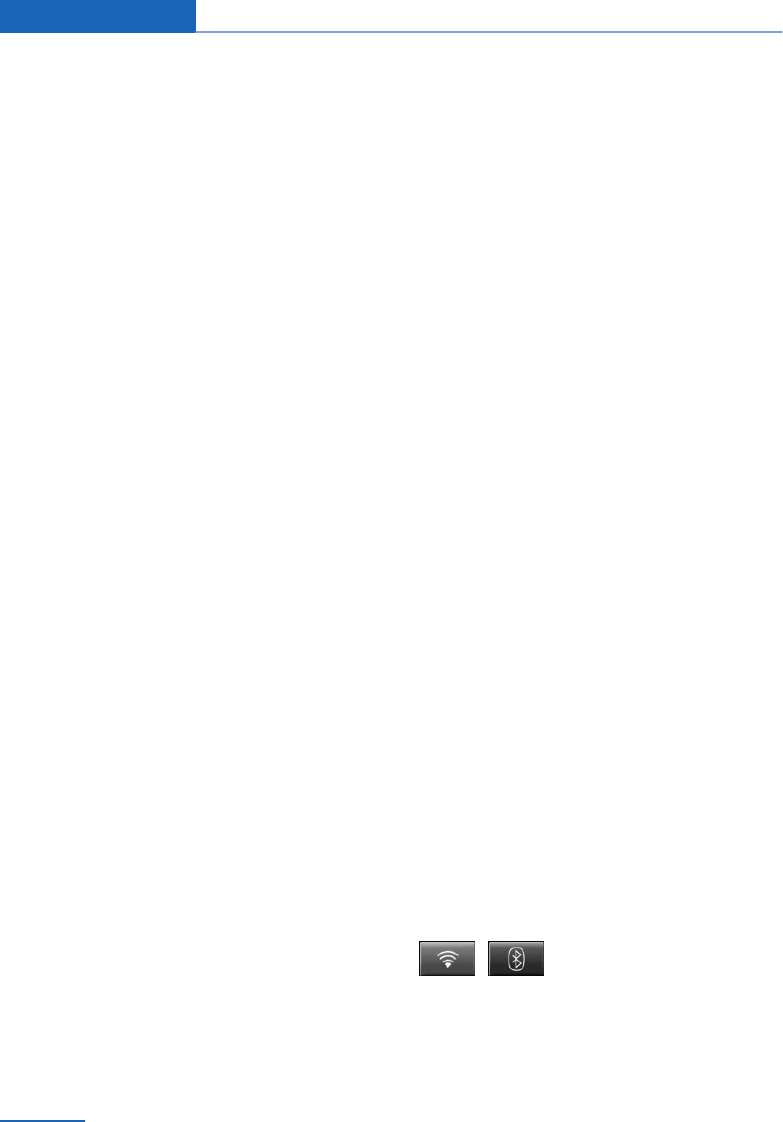
6. "Change PIN"
7. "Ok"
8. Enter the current PIN and confirm with
"Ok".
9. Enter the new PIN twice and confirm with
"Ok".
Reset SIM card block
If the incorrect PIN is entered three times, the
SIM card is blocked.
"Please enter PUK:" is shown on the display.
The PIN Unblocking Key (PUK) or Super PIN is
required. This can only be entered on the hand
set.
After entering the PUK, assign a new PIN, see
page 125.
Barring calls
Principle
These functions are protected with a password
against unauthorised use.
Calling up the menu
1. "Menu"
2. "Settings"
3. "Ok"
4. "Security"
5. "Ok"
6. "Call barring"
7. "Ok"
Outgoing calls
Outgoing calls can be suppressed:
▷All except for emergency call.
▷All international calls.
▷All international calls except home country.
1. "Call barring"
2. "Ok"
3. "All calls", "International calls" or "Int. exc.
homectry"
4. "Ok"
5. "Activate", "Deactivate" or "Status"
6. Enter your password.
7. "Ok"
Incoming calls
Incoming calls can be suppressed:
▷All calls.
▷All international calls.
1. "Incoming calls"
2. "Ok"
3. "All calls", "Int'l calls"
4. "Ok"
5. Enter your password.
6. "Ok"
Deactivating call barring
1. "Menu"
2. "Settings"
3. "Ok"
4. "Security"
5. "Ok"
6. "Call barring"
7. "Ok"
8. "Deactivate all"
9. Enter the password and confirm with "Ok".
Reset settings
All snap-in adapter settings are reset to factory
settings, see page 124. You must reconfigure
WLAN and re-establish Bluetooth connections.
Press buttons simultaneously.
Seite 126
Communication Rear telephone
126 Online Edition for Part no. 01 40 2 912 836 - 07 12 510
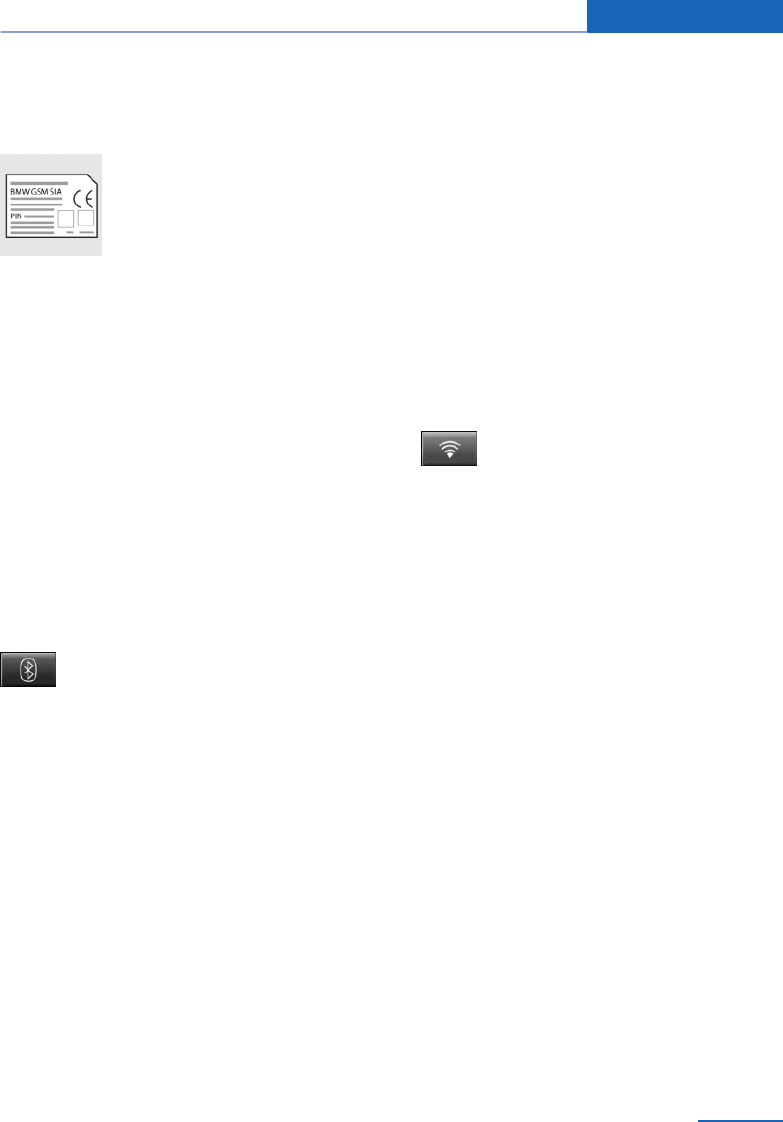
Bluetooth passkey
General
The Bluetooth passkey is located
on the back of the snap-in
adapter.
To read the passkey remove the
snap-in adapter, see page 115.
The number in the PIN line is the Bluetooth
passkey. A new PIN can be chosen.
Changing the Bluetooth passkey
1. "Menu"
2. "Settings"
3. "Bluetooth"
4. "Ok"
5. "Change Passkey"
6. "Ok"
7. Enter a new password.
8. "Ok"
Reset Bluetooth passkey
Press the button on the snap-in adapter
for approx. 23 seconds. The LED above
the button illuminates red. All Bluetooth pass
key connections are deleted.
WLAN
Principle
A device such as a notebook can be wirelessly
connected to the snap-in adapter using WLAN.
For this purpose, the device must be equipped
with a WLAN adapter.
Operating requirements
▷SIM card has been inserted into snap-in
adapter and snap-in adapter is ready for op
eration.
▷Device is on and ready for operation.
▷WLAN connection on device is switched on.
▷Access data from service provider available:
APN (access point of the service provider),
user name, password.
The APN is different when changing to an
other mobile phone network, e.g. abroad.
Please obtain information from the service
provider which APN is used in a different
mobile phone network.
▷WPA2 key and the name of the snap-in
adapter, SSID, are available. This data is
available on the back of the snap-in adapter.
Connect device with snap-in adapter
1. Check whether the bottom LED
above the WLAN button lights up green.
If the LED does not light up green:
Press the button on the snap-in adapter for
approx. 5 seconds until the bottom LED
above the WLAN button lights up green.
2. Start the program on the device to set up
wireless network, see Owner's Handbook of
the device.
3. Select from the list of wireless networks
"BMW Wireless" within range of the snap-in
adapter and connect.
4. Enter WPA2 key.
Bottom LED above WLAN button on the
snap-in adapter lights up green if a connec
tion has been established.
Configure connection to the Internet
To establish a connection to the Internet you
must configure the snap-in adapter.
1. Start Internet browser on the device.
2. Enter the following URL in the Internet
browser's URL line: http://192.168.1.1
The "Connectivity SIA" page is displayed.
3. Select "WAN".
Seite 127
Rear telephone Communication
127
Online Edition for Part no. 01 40 2 912 836 - 07 12 510
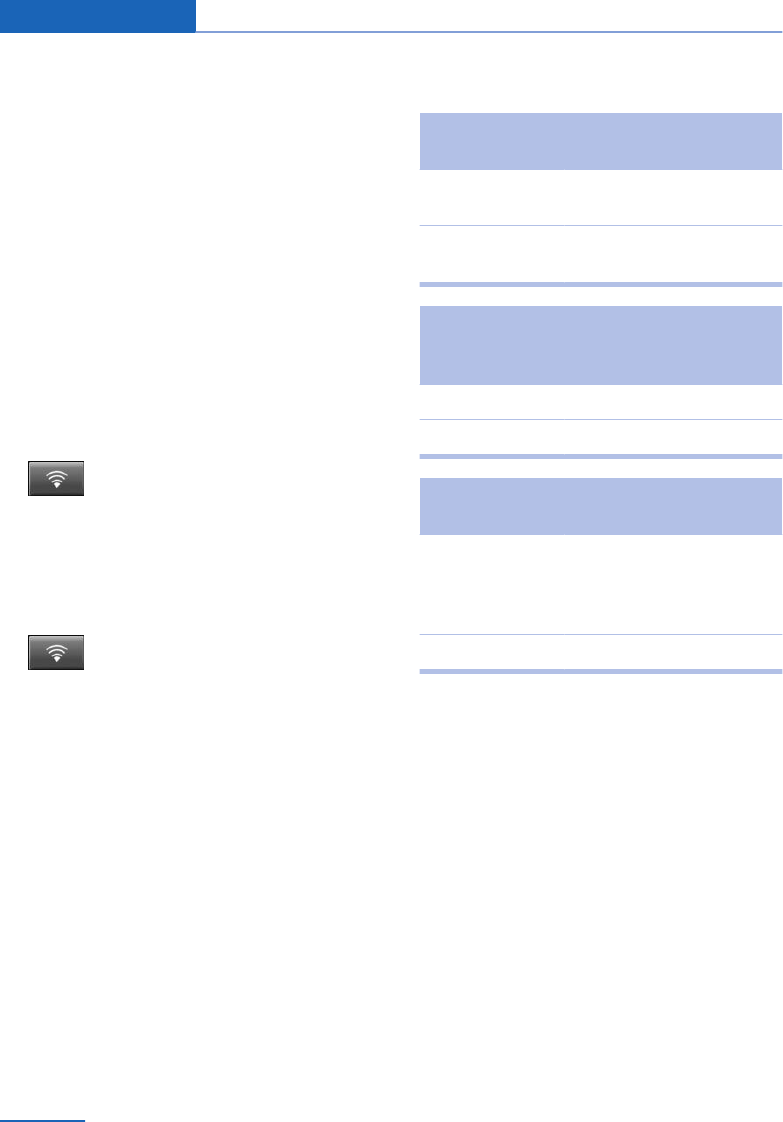
4. Input data. Data is provided by the service
provider.
"APN": access point of the service provider
"Username": user name
"Password": password
5. Confirm with "Submit".
6. Select"WLAN".
7. The name of the snap-in adapter is stated in
the "SSID" field. You can individually adapt
this name, if required.
8. Keep all other settings.
Reset WLAN settings
WLAN settings of the snap-in adapter are reset
to factory settings. You must reconfigure.
Press and hold WLAN button for ap
prox. 15 seconds until the bottom LED
over the button flashes red. Subsequently let go
of the button.
Switch WLAN on the snap-in adapter
on and off
To switch on: press WLAN button until
bottom LED lights up green.
To switch off: press and hold WLAN button until
bottom LED flashes green and then goes off.
What to do if...
▷No connection to the Internet can be estab
lished.
Check whether WLAN is switched on at the
snap-in adapter and on the device.
▷WLAN switched on on the snap-in adapter
and the device and no connection to the In
ternet can be established.
The UMTS network (3G) may be busy. In
such a case, change to another network, see
page 125, GSM (2G).
Status LEDs
Top LED above
WLAN button
Meaning
Lights up orange. Internet connection via
GSM (2G).
Lights up green. Internet connection via
UMTS (3G).
Bottom LED
above WLAN
button
Meaning
Does not light up. WLAN deactivated.
Lights up green. WLAN is activated.
LED above Blue
tooth button
Meaning
Lights up green. Bluetooth connection to
the vehicle, operating
handset or mobile phone
activated.
Lights up orange. Text message memory full.
Seite 128
Communication Rear telephone
128 Online Edition for Part no. 01 40 2 912 836 - 07 12 510

Seite 129
Rear telephone Communication
129
Online Edition for Part no. 01 40 2 912 836 - 07 12 510
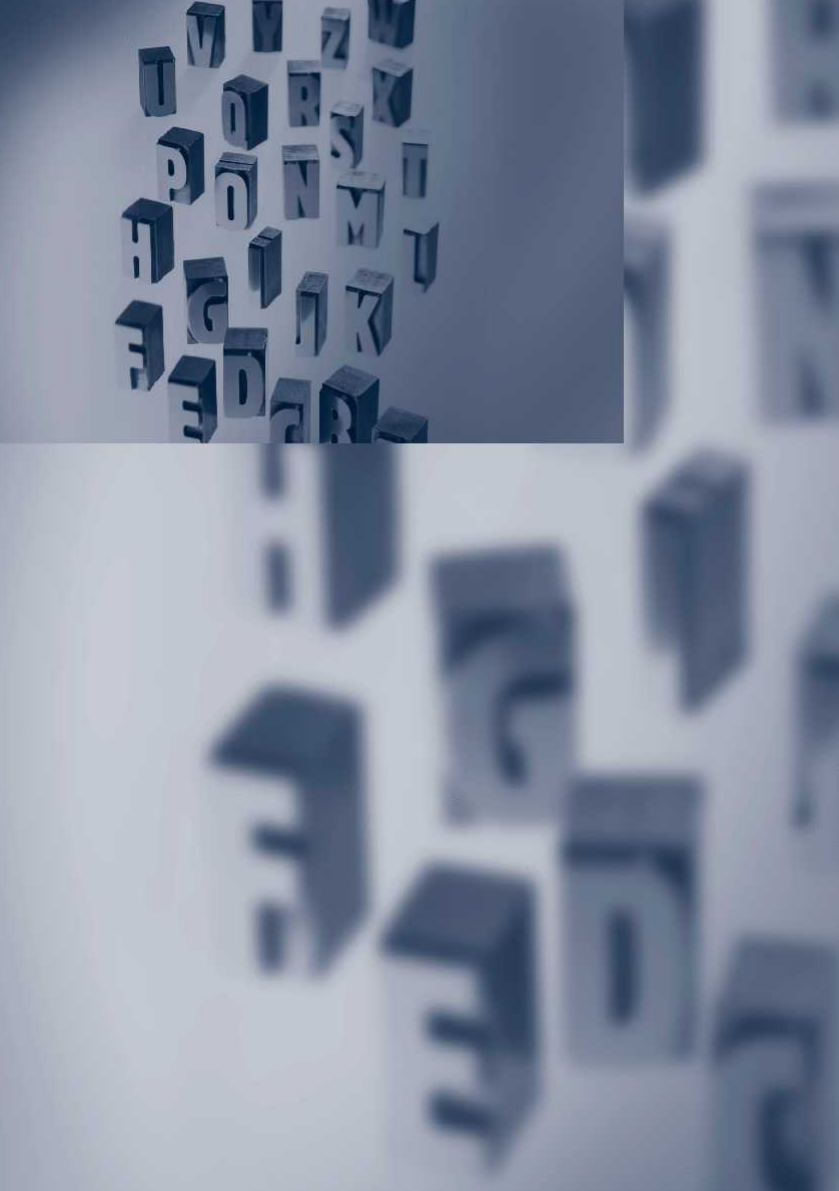
Online Edition for Part no. 01 40 2 912 836 - 07 12 510

Reference
The section contains the alphabetical index that
will lead you to the desired information in the
quickest manner possible.
Online Edition for Part no. 01 40 2 912 836 - 07 12 510

From A to Z
Index
A
Activating/deactivating Blue
tooth link 79
Additional telephone 78
AM-/FM stations 35
Applications 110
Appointments 94
Apps 110
Apps, video playback 59
Assist, BMW 102
Audio playback, Bluetooth 60
Audio remote control 68
AUX-IN port 56
Avoiding routes 18
B
Balance 32
Bang & Olufsen 33
Bass 32
Battery changing, audio re
mote control 68
Bluetooth audio 60
BMW Assist 102
BMW ConnectedDrive 102
BMW Live 105
BMW Online 104
BMW routes 17
BMW TeleServices 102
Breakdown assistance 103
Bypassing a section of the
route 20
C
Calendar 94
CD/DVD 41
CD/DVD player in the rear 69
CD memory 49
Center speaker 33
Central speaker 33
Changing the batteries, re
mote control for rear enter
tainment 70
Changing the scale in naviga
tion system 22
City input, navigation 9
ConnectedDrive 102
Contacts 89, 99
Country selection, naviga
tion 9
Course of route 19
D
DAB, digital radio 37
Destination input 9
Digital radio, DAB/DMB 37
Displaying the route 19
DMB, digital radio 37
DVD/CD 41
DVD/CD player in the rear 69
DVD changer 45
DVD settings 44
DVD, video 43
Dynamic route guidance 26
E
E-mail 91
Equaliser 32
Extended BMW Online serv
ices 112
External devices 56
F
Fader 32
FM-/AM stations 35
G
Gong, speaker equalisa
tion 33
GPS navigation 8
H
Handset 113
Headphones for rear enter
tainment 73
Hints regarding CD/DVD 47
Hotline 108
House number, input for navi
gation 10
I
Importing a trip, online 17
Importing a trip, USB 17
Information on navigation
data 27
Information service 102
Interactive map 14
Intermediate destinations 16
Internet 106
iPod/iPhone 57
J
Junction, entering for naviga
tion 10
M
Map, destination input 14
Map in the split screen 23
Map view 21
Message list, traffic informa
tion 24
Messages 91
Seite 132
Reference From A to Z
132 Online Edition for Part no. 01 40 2 912 836 - 07 12 510

Mobile phone 78
MP3 player 56
Music collection 49
Music memory 49
Music search 50
N
Navigation 8
Navigation announcement,
see Voice instructions 20
Navigation data 27
Notes 95
O
Office 88
Online, see BMW Online 104
P
Personal information 88
Playing audio tracks 42
PlugIn 111
Points of interest, naviga
tion 12
Postcode input, navigation 9
R
Radio 35, 41
Radio station buttons 40
Random 43
Random playback 43
RDS 37
Reading out 97
Real-Time Traffic Information,
RTTI 24
Rear entertainment 69
Rear passenger compartment,
selecting source, rear enter
tainment 72
Rear telephone 113
Recommended tours 17
Refuelling recommenda
tion 20
Registering, mobile 79
Register mobile 79
Reminders 97
Remote control, audio 68
Remote control for rear enter
tainment 70
Rename station 37
Route criteria, route 18
Route guidance 18
Route guidance with stop
overs, see Planning a
Trip 15
RTTI Real-Time Traffic Infor
mation 24
S
Saved stations 39
Saving current position 11
Saving DVDs 49
Saving position 11
Saving stations 36
Service partners 110
SMS 91
Snap-in adapter, mobile
phone 86
Software applications,
iPhone 110
Software update, update soft
ware 62
Sound 32
Speed Volume, speaker equal
isation 33
Split screen map settings 23
Stations AM-/FM 35
Street, entering for naviga
tion 10
T
Tasks 95
Telephone 78
Telephone, rear 113
TeleServices 102
Television, TV 64
The map is shown in grey 25
Toll routes, route 18
TP, traffic announcements 40
Traffic information, naviga
tion 24
Traffic reports 40
Treble, sound 32
TV 64
U
USB audio interface 57
V
Version of navigation data 27
Video playback, snap-in
adapter 59
Video replay 43
Voice instructions, naviga
tion 20
Voice memos 95
Volume, adjusting 32
Seite 133
From A to Z Reference
133
Online Edition for Part no. 01 40 2 912 836 - 07 12 510
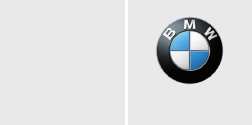
More about BMW
www.bmw.com
The Ultimate Driving
Machine
01 40 2 912 836 en
*BL291283600B*
Online Edition for Part no. 01 40 2 912 836 - 07 12 510
